The Seven Wonders of the 21st century "I was trapped in a floating coffin"
What your mobile-phone 4;‘, provider won't tell you ,14 The best of British... picnic spots PLUS Dom Joly

Boost your career Iron properly
Deborah Meaden Ed Stourton HOW TO Talk to your doctor
Soothe a sting
The Art of Camping by Matthew De Abaitua
JULY EXTRACTS
Everything Is Obvious by Duncan Watts
4,) This could be heaven ...or this could behell REBECCA ADLINGTON'S OLYMPICS COUNTDOWN STARTS HERE.. PAGE 36 readersd gest co.uk 9 /I 31101 11" JULY 20 3.49 REPOS OF RELA (5.10

mpact new BT Home Hub is designed to detect and avoid wi-fi interference. That's why it's the UK's most reliable wireless connection, compared to all other broadband providers. Call 0800 0223388 or visit bt.com/homehub The new Home Hub uses ins technology and Smart Wireless, which continually monitors your wi-fi channels selecting the strongest. This provides the most reliable wi-fi connection compared to other providers' standard routers.

JULY 2011 FEATURES
Digergt

"Some illnesses seem to draw the short straw," says Elizabeth Adlam, as she looks at why not all conditions are equal in the attention stakes.
"'Best of British' is a chance to uncover all kinds of gems," observes writer Lola Borg. "And I'm always fascinated to hear suggestions from our readers."
"Imagine a town full of handsome shop facades with useful spaces in them!" says Eda Akaltun, who illustrates "The Maverick" this month.
Want a view with your picnic? Turn to page 86
32 Reasons to Be Cheerful, Part 8 James Brown sings the praises of grisly page-turners
36 Ready, Steady, Go? Rebecca Adlington on the pleasure and pain of training for the Olympics
43 How to Be an Olympic Star—the Easy Way Why eating Big Macs may make an athlete of you yet!
46 The Seven Wonders of the 21st Century Check out the greatest sights of the new millennium
58 Attention, Please! We shine the spotlight on three illnesses that deserve more attention—and support
66 Trapped in a Floating Coffin The terrifying tale of a lone sailor's attempt to avoid a watery death
74 Dom Joly: "I Remember..."The king of offbeat comedy talks Beirut, bullets—and being punched by Lily Allen
80 Menu Magic Find out how Cornwall's hospitals are transforming the local economy and patients' health
86 Best of British: Picnic Spots Discover the perfect locations for a spot of alfresco eating
94 The Road Trip That Changed Our Lives A hairraising trip around America brought Melanie Gow closer to her children—and mended her broken heart
100 The Maverick: "Let the High Street Die" Is it really worth trying to save our local shops?
Stories featured on the cover are shown in red
• • JONTY WIL DE/Y ORK SHIRE SCULPTURE PARK 2 READERSDIGEST.CO.UK JULY 2011

SET FO THE DAY. ALL DAY. SINIKRIN THE UK'S MOST TRUSTED HAIRSPRAY.' Kantar World Panel Repeat Rate 52w/e September 2010.
REGULARS WELCOME
the front
Over to You...
Radar: Your Guide to July
You Couldn't Make It Up...
Word Power
In the Future...
28 Instant Expert
30 If I Ruled the World: Deborah Meaden ...at
the back
104 1,001 Things Everyone Should Know
110 Medicine: Max Pemberton
112 Health: Susannah Hickling
116 Beauty: Jan Masters
120 Consumer: Donal Maclntyre
122 Money: Victoria Bischoff
126 Food: Marco Pierre White
128 Drink: Nigel Barden
130 Gardening: Bob Flowerdew
132 Wildlife: Martin Hughes-Games
134 Digital: Martha Lane Fox
136 Motoring: Conor McNicholas •
138 Travel: Kate Pettifer
141 The Reader's Digest— our recommended reads of the month
149 Books That Changed My Life: Ed Stourton
154 Beat the Puzzler!
156 Laugh! With Alun Cochrane
160 Beat the Cartoonist

On our cover: Rebecca Adlington photographed by Wadey James for British Gas Swimming Sponsorship
This time next year, the nation will be in A&E with a severe outbreak of Olympics fever. For those hoping to take part, however, the temperature has already started to rise —especially if they're one of our big medal chances. So send some goodluck vibes in the direction of our cover star Rebecca Adlington, please, who turned from "Miss Nobody" to one of our biggest sports stars when she swam off with not just one but two gold medals at the 2008 Beijing games. It's not only the grinding training schedule or the rigorous diet that she has to contend with—it's also the weight of expectation, the sudden (and timeconsuming) elevation to sports spokeswoman, and the constant attention of the media. Turn to p36 to find out how she's getting on.
Gill Hudson
theeditor@readersdigest.co.uk
Infacebook.com/readersdigestuk readersdigest.co.uk/blogl/ rdmagazine twitter.com/rdigest
15
20
23
26
...at
11
•
•
136
Reader's Digest the World's Biggest Magazine published
in 50 editions in 20 languages
4 PHOTOGRAPHED BY SEAMUS RYAN
Making Farmhouse Cheddar in the heart of Somerset has been a tradition in our family for generations. That's me. John Clothier, on my first day of milking, a proud moment for my Mother, Ivy Today, I run the farm with her four Grandsons. She would love that.
TRADITION

Somerset is a place where people know that some things are best left unchanged. We still use Mother's award-winning secret recipe and milk from happy contented cows, on lush pasture. Which is why we are still the nation's favourite Farmhouse Cheddar.
SOMERSET FARMING SINCE 1861
YOU CAN TASTE IT IN EVERY BITE
WRITE ON...

Send us your stories, jokes and letters— if they're published, we'll pay
WE PAY r50 for the star letter, for normal letters and £15 for short extracts. Email readers letters@readersdigest. co.uk or write to Readers' Letters, Reader's Digest, 157 Edgware Road, London W2 2HR.
WE ALSO PAY £70 for the true stories, anecdotes, jokes in Laugh! and You Couldn't Make It Up..., and contributions to endof-article fillers, Travel and Gardening. Email excerpts@ readersdigest.co.uk or write to Excerpts, Reader's Digest, 157 Edgware Road, London W2 2HR
THE SMALL PRINT
Ensure submissions are not previously published. Include your name, email, address and daytime phone number with all correspondence. We may edit letters and use them in all print and electronic media. Contributions used become world copyright of Vivat Direct Ltd (t/a Reader's Digest).
SORRY! We cannot acknowledge or return unpublished items or unsolicited articlelength manuscripts. Do not send SAEs. Article-length stories, poetry and cartoons are not requested.
SUBSCRIBE!
Go online at readersdigest. co.uk or write to Reader's Digest, Freepost, NAT3782, Leicester LE55 8BA.
UK: £42 a year. Republic of Ireland: €74.39 a year. Europe: £50 a year. Rest of the world: £60 a year. Prices include delivery.
GIFT SUBSCRIPTION?
CHANGE OF ADDRESS?
Contact Customer Services for renewals, gifts, address changes, payments, account information and all other enquiries. Phone: 0871 351 1000* Email:cust_service @readersdigest.co.uk
Minicom:0870 600 1153
READER'S DIGEST PRIZE DRAW
(and you thought no one won!)
In the last 40 years, we've given away over £35 million to 487,633 winners. In addition to our £100,000 Grand Prize every six months, there's a wealth of other goodies up for grabs—from a few hundred pounds to a few thousand (not to mention cars, holidays, laptops and TVs)—so we have winners every month.
Lynne Priestly from Nottingham is the latest to scoop our £15,000 Speed Draw. "I was overwhelmed," says Lynne, a nursery nurse. "My family [husband Andy and children Kara and James, pictured] are so happy—it means we can go on holiday!"
This couId he heave. ...or this could behell from o t her p r ov iders may vary. cos t 9p a m inu te. Ca ll 'Ca lls from a BT lan dli
Readers -----Dige;-t
Visit readersdigest.co.uk/prizedraw or read more at readersdigest.co.uk/rdprizedrawblog

fresh tasting pressed teas from PG tips.
@READERSDIGEST.CO.UK
Online this month...
Be a part of our Best of British series (see p86)! Why not share your favourite British things with us? It can be anything from cakes to castles to hidden holiday spots. Send us your videos, photos or stories and we'll build up an online collection of the Best of Britain. Every month we'll be awarding spot prizes for your suggestions. Go to readersdigest.co.uk/magazine to join in.
0Want good food fast? Check out our new food video with RD's very own Rachel Smith and her 20-Minute Food Fixes. Move over Nigella... PLUS: Word Power Online—play for fun or for cash!

AMAZING WALKS
DON'T FORGET To check out our fabulous apps! Go to the itunes music store to download our iPad app and our new walking app.
Digest
EDITORIAL
Editor-in-Chief
GILL HUDSON
Managing Editor
CATHERINE HAUGHNEY
Design Director
MARTIN COLYER
Features Editor
SIMON HEMELRYK
Deputy Production Editor
TOM BROWNE
Assistant Features Editor
ELLIE ROSE
Editorial Assistant
RACHEL SMITH
Art Editor
HUGH KYLE
Picture Researcher
ROBERTA MITCHELL
Contributing Editors
CAROLINE HUTTON, HARRY MOUNT, JAMES WALTON
Health Editor
SUSANNAH HICKLING
Website Assistant
JASMINE BEGOM
ADVERTISING
Account Directors
DOMINIC EDDON, PAUL EYERS, NICKY NOBLE, CHRIS SHEPPERSON
Trade Marketing Manager (Magazines and Books)
SIMON NICOLL
Production Controller
CHRIS TRIBE
Magazine Marketing Manager
JUSTINE BURROWS
Finance Business Partner—Magazine
ANJLI MEHTA
Magazine Executive
MARINA JOANNOU
Publishing Director
JAMES MALLINSON
CHIEF EXECUTIVE OFFICER
THIERRY BOUZAC
THE READER'S DIGEST ASSOCIATION INC
President and Chief Executive Officer
TOM WILLIAMSPresident, RD Europe
DAWN ZIER VP, Global Editor-in-Chief
Reader's
111.M.0.411•• 1.1011•111•11 at moo* • wet ara imfamer.
WE ARE ALSO... On FACEBOOK.COM/READERSDIGESTUK On TWITTER.COM/RDIGEST Visit our online shop, where we have fantastic products for as little as £3.99 Reader's PUBLISHED BY VIVAT DIRECT LTD (T/A READER'S DIGEST), Digest 157 EGG GA PAPER FROM RROOMAD sLONDON sTAI SUSTAINABLE E W2 FORESTS. PLEASE RECYCLE 2011 Vivat Direct Ltd (t/a Reader's Digest). British Reader's Digest is published by Vivat Sired Ltd,157 Edgware Road, London W2 2HR. All rights reserved throughout the world. Reproduction in any manner, in whole or part, In English or other languages, Is prohibited. Readers Digest is a trademark owned and under license horn The Reader's Digest Association, Inc and is registered with the United States Patent and Trademark Office. All rights reserved. Reproduction by FMG. Printed by Polestar Chantry, Polestar UK Print Ltd. Newstrade distribution by Advantage. 8 READERSDIGEST.CO.UK JULY 2011
Digest PEGGY NORTHROP

25% OFF GLASSES AND LENSES FOR OVER 60s E69 range or above Specsavers Applies to one pair of glasses from Monday - Friday. Cannot be used with other offers. Excludes reglazes, safety eyewear, contact lens products, non-prescription sunglasses. Discount not transferable in whole or part for cash. SKU 25138498. V2011 Specsavers. All rights reserved. *141,11111k, specsavers.co.uk

Gram for gram,
IAMS`: has more high-quality nutrition than wet food, which will help keep me in tip top condition.
or Based on the average requirement of a 4kg cat. Always ensure fresh water is available
OVER TO YOU..
EMAILS, LETTERS, TWEETS AND FACEBOOK
f30 FO, _ACH PUBLISHED LETTER, £15 FOR SHORTER EXTRACTS, £50 FOR THE LETTER OF THE MONTH! SEE P6 FOR MORE DETAILS
NOT-SO-WEIRD SCIENCE
I wish Brian Cox had been my physics teacher at school —I might have paid attention and not been so quick to drop science subjects at 14. I'd never have believed that I'd grasp the Second Law of Thermodynamics after watching a short film of a man blowing bubbles. I forgot it the next day—but that's all the more reason to watch the repeat! Tracy Davidson, Warwickshire
LETTER OF THE MONTH
I felt really inspired by "Let's Get Physicsal", your article about Professor Brian Cox. Science underpins almost every aspect of our daily lives, even if it's seen as a difficult subject.
When I was at school, I was lucky to have some excellent science teachers, who made it fun and accessible. Some of them even gave up their own time to do extra teaching. My uncle, for example, is a retired physics teacher, who, despite being in his early seventies, continues to teach undergraduates, often for no pay.
So it's disturbing to read how the sciences have diminished in popularity—fewer and fewer people are studying them and university departments are closing. As your article points out, investment in this area produces substantial returns for the economy— and Britain has a fine legacy of scientific discoveries.
I wish Brian Cox all the best for his tour—and I hope he's successful in once again putting Britain in the lead.
Susannah Harrison, Brighton
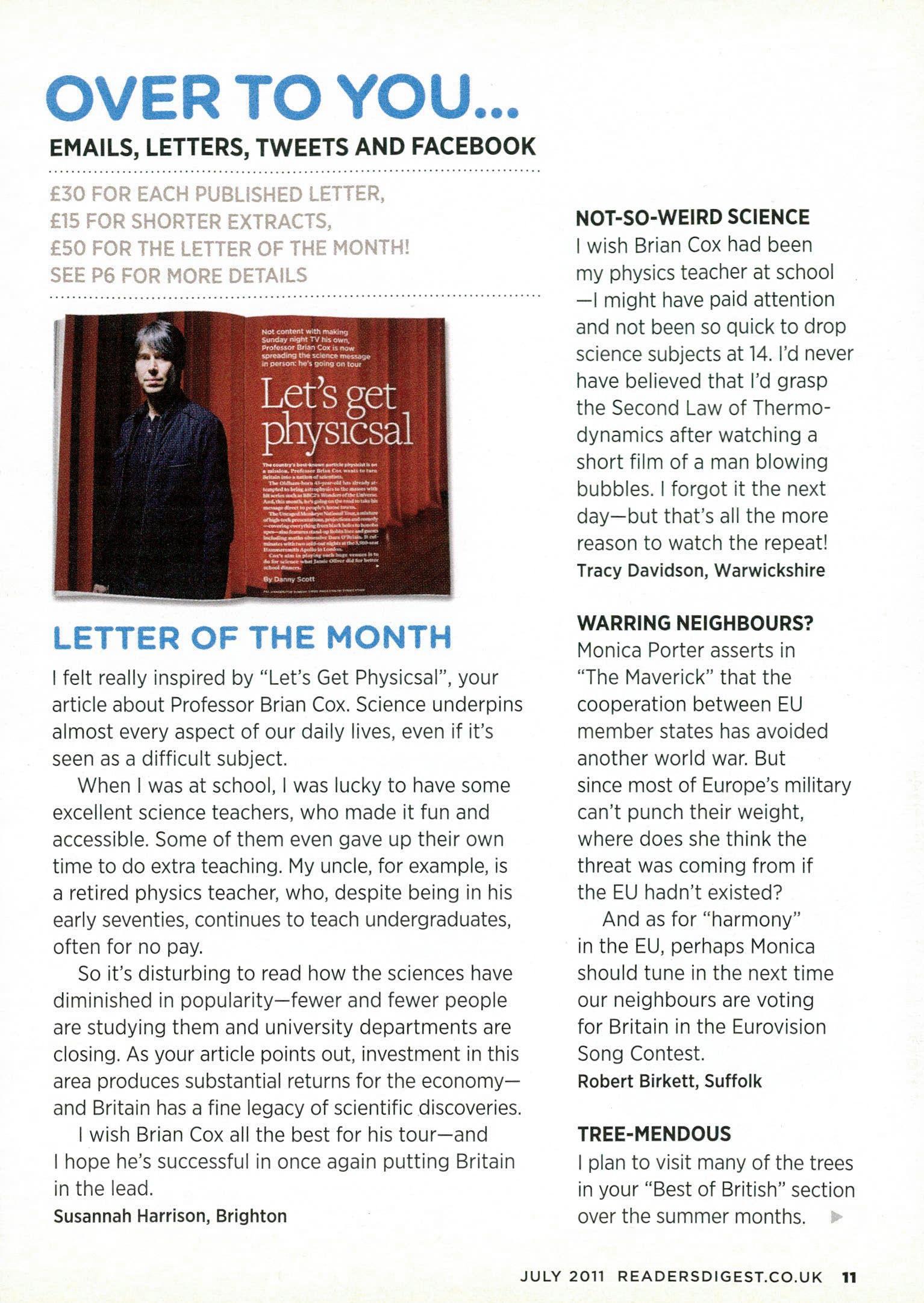
WARRING NEIGHBOURS?
Monica Porter asserts in "The Maverick" that the cooperation between EU member states has avoided another world war. But since most of Europe's military can't punch their weight, where does she think the threat was coming from if the EU hadn't existed?
And as for "harmony" in the EU, perhaps Monica should tune in the next time our neighbours are voting for Britain in the Eurovision Song Contest.
Robert Birkett, Suffolk
TREE-MENDOUS
I plan to visit many of the trees in your "Best of British" section over the summer months.
JULY 2011 READERSDIGEST.CO.UK 11
"We want to get you off disability benefit and back on the High Seas"
For any tree lovers out there, a well-kept secret is Avenue House in Finchley, north London*, which houses many exotic varieties, including a wonderful example of a Handkerchief Tree (pictured).
So if you find yourself in London, take the tube to Finchley Central and drop in—it's free of charge.
Alessandra Alonso, London
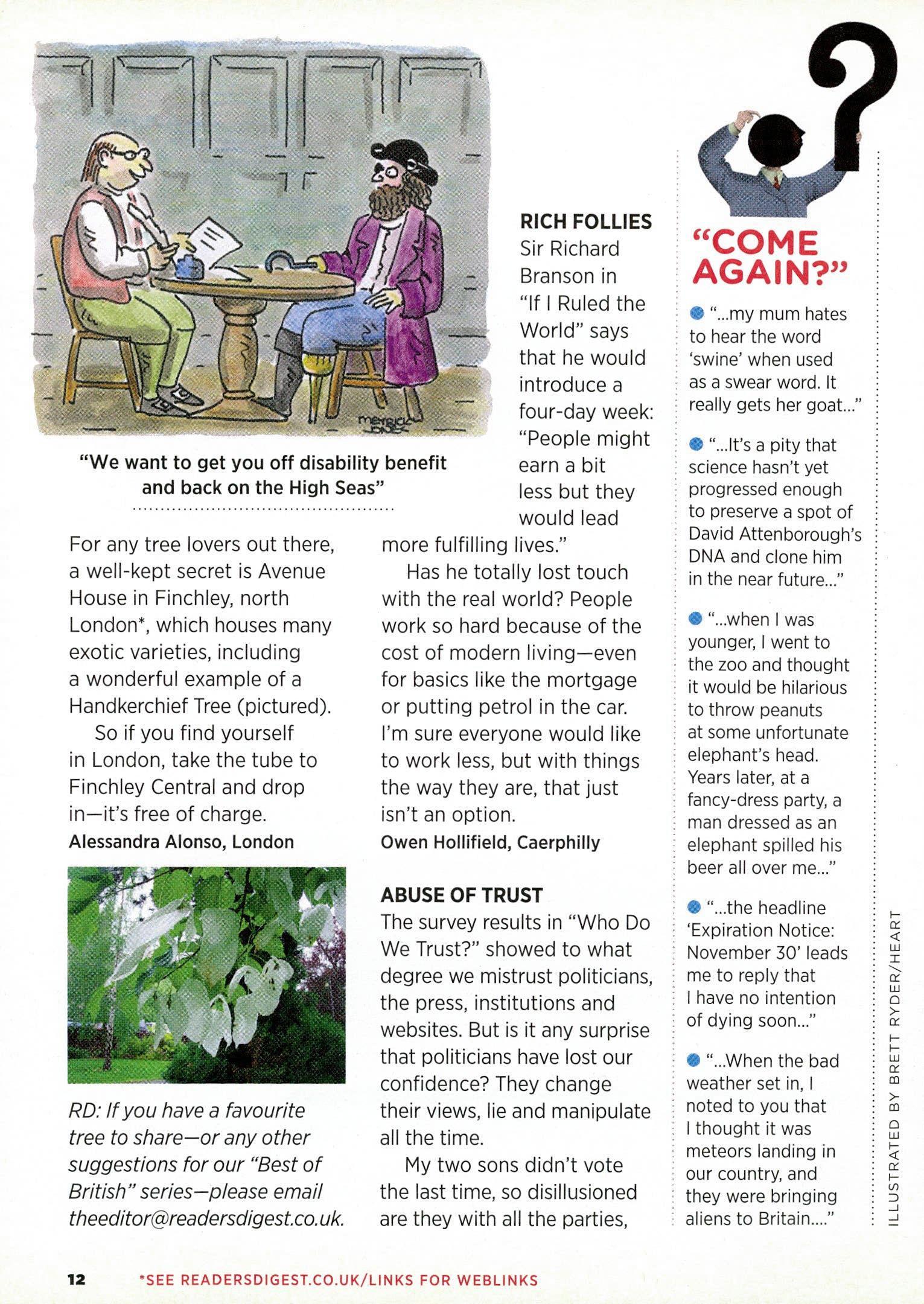
RD: If you have a favourite tree to share—or any other suggestions for our "Best of British" series—please email theeditor@readersdigestco.uk.
RICH FOLLIES
Sir Richard - Branson in "If I Ruled the World" says that he would introduce a four-day week: "People might earn a bit less but they would lead
more fulfilling lives." Has he totally lost touch with the real world? People work so hard because of the cost of modern living—even for basics like the mortgage or putting petrol in the car. I'm sure everyone would like to work less, but with things the way they are, that just isn't an option.
Owen Hollifield, Caerphilly
ABUSE OF TRUST
The survey results in "Who Do We Trust?" showed to what degree we mistrust politicians, the press, institutions and websites. But is it any surprise that politicians have lost our confidence? They change their views, lie and manipulate all the time.
My two sons didn't vote the last time, so disillusioned are they with all the parties,
(fy "COME AGAIN?"
• "...my mum hates to hear the word 'swine' when used as a swear word. It really gets her goat..."
• "...It's a pity that science hasn't yet progressed enough to preserve a spot of David Attenborough's DNA and clone him in the near future..."
• "...when I was younger, I went to the zoo and thought it would be hilarious to throw peanuts at some unfortunate elephant's head. Years later, at a fancy-dress party, a man dressed as an elephant spilled his beer all over me..."
• "...the headline 'Expiration Notice: November 30' leads me to reply that I have no intention of dying soon..."
• "...When the bad weather set in, I noted to you that I thought it was meteors landing in our country, and they were bringing aliens to Britain...."
ILLUSTRATED BY B RETT RYDER/HEART 12 'SEE READERSDIGEST.CO.UK/LINKS FOR WEBLINKS
and I sometimes wonder why I bother voting at all.
Jon Bryan, Liverpool
SPEECH PATTERNS
Until I read "Your Voice", I'd never realised that our speech is an indicator of our age. My mother is 84 and is often mistaken for her

granddaughter when she answers the phone. But my aunt, who was a teacher for 30 years, does sound older —probably due to all that non-stop talking and raising of her voice.
I've no doubt that your profession has something to do with how quickly your vocal cords age.
Alana Jacobs, Cheshire
I've worked with voices for nearly 40 years and it really is the "Cinderella" part of the body—we know next to nothing about it. Your article contained a lot of excellent information and advice. I'd also like to flag up the Voice Care Network*, a useful contact for anyone with complaints. After all, voice problems are more common than you'd think, especially among teachers and callcentre workers.
Priscilla Morris, by email
A WORD TOO FAR
At the risk of sounding ill-bred or ignorant, I refuse to take the advice in "How to Polish Up Your Manners" and use the word "loo" ("1,001 Things"). It's on a par with a child wanting to "do a poo". Why is this polite, but "toilet" is a no-no? Who made Matthew Lennox the arbiter of good taste? Soon you'll have us saying "baa-lambs" or "moo-cows".
K Punchard, Hampshire
twitter* TWEET OF THE MONTH
alI shadi Shadi Kiazi
Reading the new look Reader's Digest while waiting for bus near Victoria station in sunny London. Some classics are evergreen! #cool #london
YOU'RE STILL TALKING ABOUT...
...our various articles in April and May on the royal wedding.
• This wonderful event will boost the spirit of the nation and bring the royal family even more into our collective hearts. The antiroyal brigade should be thrown in the Tower for good. Stewart Cade, West Yorkshire
• I was astonished to read the facetious article about Wills and Kate by Shappi Khorsandi. Surely a feature published in the month of the wedding should be more serious.
May MacKay, Aberdeenshire
• OK, I realise that William and Kate had to have Camilla at their wedding— but, given the choice, I like to think they'd have left her off the guest list.
Joanne Aitch, Birkenhead, Wirral II
JULY 2011 READERSDIGEST.CO.UK 13
Protects your family and removes tough grease better than the leading cleaner.

Dettol Complete Clean powers through tough stains like burnt on food, limescale and soap scum. And as you'd expect from Dettol, it also kills 99.9% of bacteria. For more ideas on how Dettol can help you make your home healthier and happier, go to dettol.co.uld "onforhealth
Use banades safely. Always read the label and product :nfo,trat:on before use td
CLEAN
YOUR SHORT, SHARP GUIDE TO JULY

Author and BBC2 Review
Show critic Natalie Haynes on the new releases
IN CINEMAS
Harry Potter and the Deathly Hallows: Part 2. The eighth and final instalment of the Potter film series marks the end of an era. It's time to shout "Expelliarmus" one last time as our young heroes take on the evil Voldemort and his minions in the Battle of Hogwarts. Time to find out if Harry conquers his inner demons, if Snape is good or evil and whether Hermione and Ron ever actually kiss on the mouth.
You may be
too mature for all of this, but Potter is a phenomenon and I'm a fan. I haven't drawn a lightning bolt on my head yet, but it's only a matter of time.
Beginners. This sweet, sad romcom stars Ewan McGregor as Oliver, a 38-year-old with commitment-phobia caused by his parents' affectionateyet-loveless marriage. But Oliver's outlook changes when his father Hal (Christopher
15
Plummer) turns out to be gay— and terminally ill. Among the brilliant performances, Arthur the dog rivals Gromit as the great modern silent film star.
DVDS
Unknown. This classy thriller stars Liam Neeson as a man who wakes from a coma to find that someone has taken what he's sure is his identity. Even his wife thinks the other guy is him —and has snapshots to prove it. Submarine.
Richard Ayoade (Moss in The IT Crowd) makes his directorial debut in this coming-of-age story. Oliver (Craig Roberts) needs to impress his dream girl. He also needs to stop his oversharing mum leaving his dad for a creepy neighbour. A kooky, charming film that will make you very glad not to be 15 any more.
Gadgets and Ga
Resident Evil: The Mercenaries 3D (Nintendo 3DS), £39.99.
Technology expert and Answer
Me
This! podcaster Oily Mann reveals the latest must-haves
This is want I want from a shoot-'em-up. This latest incarnation of the legendary game series is short on character development and plot, but what purpose those when there are demonic, undead enemies lurking around each corner, waiting to be dispatched in glorious 3D? Let me pump some buttons, let me blow stuff up—let's not linger on ethics. Here are 30 action-packed levels, delivered in two-minute chunks so you can pause to have a cuppa when your palms get sweaty.
Frame X Frame App, fre Become the next Nick Park with this tool that helps you create and share stop-motion films on the iPhone4. Moshi Pop Phone Funky, fluorescent landline-style handset that plugs into any smartphone. fprtf Anr Chuck stationery at the most annoying person in the office (albeit only in animated form)—without receiving a P45!

Livescribe Echo Smartpen, £99/86, . /9. I haven't got excited about a pen since school, but the Echo has got my juices flowing again. It records your written scrawls via a camera in the nib and converts them into images on your computer. A mic also records audio. Ah, if only it had existed when I was a student. I could have skived even more lectures, then pillaged my friends' "pencasts" and fastforwarded through the boring bits.
16 READERSDIGEST.CO.UK JULY 2011
BBC 6
Music's Stuart Maconie's pick of the recent releases

So Beautiful Or So What by Paul Simon
Think mature reflection from the John Updike of pop. All sense of event seems to have drained from Simon's album releases since 1990's
The Rhythm of the Saints. But, though the musical settings of his latest are comfortable, the lyrics and subject matter really compel, with sardonic, literate musings on spirituality, leavened with Simon's trademark felicity of language. While Dylan gets all the attention these days, Simon is quietly turning in far better records.
Foster the People by Torches
Think a less-preppy Vampire Weekend go disco.
A youthful combo from Los
Angeles, exuberance and sunshine pervade this band's astonishingly good debut collection. There is quite a lot of this kind of music about of late, on both sides of the pond: slickly sophisticated, knowing pop with huge anthemic choruses. But Foster the People manage to sidestep the smart-alec trap and, on tunes like "Pumped Up Kicks" and "Houdini", simply radiate joy and sexiness.
Dog Man Star by Suede
Think Bowie from a sink estate. At this remove, it's hard to credit the incendiary—no, make that volcanic—nature of Suede's emergence during a sluggish and moribund rock scene in the early 1990s. Into a drab marketplace crowded with wannabe Nirvanas came a suburban quartet with lank bangs and whining songs whose swagger and passion saw them hailed as saviours. After their sexy, glamrock debut, Dog Man Star came as a sombre surprise, hinting at darker pleasures. But it remains their best album and the one that will endure. This terrific reissue is crammed with covetable extras.
FOSTERTHEPEOPLE
JULY 2011 READERSDIGEST.CO.UK 17
England vs India, First Test, Lords, _.:.: The start of a four-match battle between England's boys and the world's top Test team. England have home advantage, swing and Graeme Swann (above). But India have volcanic opener Virender Sehwag, the cast-iron cojones of captain M S Dohni, and Sachin Tendulkar, who returns to the country where he made the first of his recordobliterating 99 international centuries 21 years ago. He is, it's widely agreed, very good at hitting a ball with a bat.
Tour de France, ' `‘,, Cycling and drugs controversies continue to spend an alarming amount of time in each other's company. But Le Tour remains sport's most compelling

ESPNcricinfo cricket blogger, broadcaster and stand-up Andy Zaltzman previews the best of the month's action
endurance test. Three-time winner Alberto Contador (or "Bert from Accounts", to give him his English name) has proved that he knows one end of a mountain from another and how to cycle between them very quickly, while British sprint ace Mark Cavendish will seek to add the green jersey to his knitwear collection.
AND DON'T MISS...
Wladimir Klitschko vs David Haye, heavyweight boxing, July 2. The Open, Royal St George's, Kent, July 10-17.
ALSO ON OUR July 14-17 Latitude Festival, Southwold, Suffolk. July 15-September 10 The Proms, A AR London. July 19 Museum of Liverpool opens. July 1Princess Diana born 50 years ago.
Adrian Brewer, 51, farmer
LISTENING:
The Fall, Gorillaz. Apparently, Damon Albarn recorded this using iPad instruments. The man is so talented.
Nothing! I do use the Internet a bit, but there's too much choice and I prefer newspapers.
The Last Stand by Nathaniel Philbrick. Explores the mysteries surrounding General Custer's final moments—like why did he die with a smile on his face?
WATCHING: Countryfile (BBC1). I enjoy rural programmes, though I'd like to see a more dynamic, less Blue Peter-ish style to get more people interested in the countryside. ■
READER A AR
18 READERSDIGEST.CO.UK JULY 2011

QUALITY INCLUSIONS THAN ANY OTHER RESORTS ON THE PLANET
• The Caribbean's most sumptuous suites; some with Butler Service
• Gourmet dining in up to 14 restaurants
• Premium brand drinks and exclusive Beringer' wines
• Every land sport, including unlimited championship golf"'
• Water sports, including the most comprehensive scuba programme' in the Caribbean
• Nightly entertainment
• All airport transfers and tips
SAINT LUCIA ANTIGUA BAHAMAS
JAMAICA
FOR MORE INFORMATION OR TO BOOK
Call 0800 742 742
:ABTA -At selected resorts ABTA No.V000% For certified divers a
Visit www.sandals.co.uk
See your local travel agent
YOU COULDN'T MAKE IT UP...
1 I was having tea at home with a couple of friends, one of whom had brought her precocious seven-yearold son along. After an hour or so, he was getting rather fidgety and bored.
The conversation turned to weight, and my other friend (who is quite large) said that she thought she was suffering from water retention.
Suddenly, a voice piped up from across the room: "More like cake retention!"
You could have heard a pin drop.
Pip Faulks, Suffolk
1 My mother-in-law was working in a baker's when a customer she'd served the previous day arrived back at the shop.
"You know those croissants you sold me yesterday?" he said. "Well, I thought you might like them back. They're the plastic ones from the window display."
Jonathan Rowe, Sheffield
1 Our local supermarket offers a good delivery service, so my friend orders

"My fault—I went for the Henry the Navigator voice option"
1 ON A RECENT TRIP TO THE CHEMIST, I overheard an intriguing conversation between a very elderly couple in an adjacent aisle.
"So which do you think we should buy: smooth or ribbed?"
"You decide, dear, as you'll get the most benefit from it."
"Well, we'll both benefit from it, won't we?"
"In that case, we'll get ribbed."
Decision made, they went to the till.
Thinking that a couple of such advanced years surely didn't need the items I had in mind, I made my way round to where they'd been standing.
All became clear—they'd bought a hot-water bottle.
Lorraine Owen, Bridgwater, Somerset
-r.
\% • ` \ ..• •‘-0- \
LesNeive.67TURN
44EE S SINST or
20 READERSDIGEST.CO.UK JULY 2011
SEND YOUR TRUE, FUNNY STORIES TO EXCERPTS@ READERSDIGEST.CO.UK OR GO TO FACEBOOK. COM/READERSDIGESTUK
all her weekly provisions online. Just before delivering, they text the customer to give them an idea of when their groceries will arrive. Last time, their text read: "Your order will be with you in approximately one hour, and will be delivered by Jesus in a lemon van."
Now that's what I call an efficient service!
Brenda Price, Hertfordshire
I At a local school jumble sale recently, I overheard a pupil at the bric-a-brac stall doing his best to increase sales.
"Madam, do you know that proceeds from today's sale don't go towards school funds? All the money we raise today will be sent to the Leprechaun Colony we support in Nepal."
Jenny Halse, Sheffield
I "Scrap any post addressed to The Occupier," my son-in-law instructed my daughter. Fortunately, the recycling bins
1 THE DOCKS INDUSTRY is notorious for dishing out witty nicknames. Shortly after joining a shipyard in the north, I was told to go to a meeting to be chaired by a senior manager
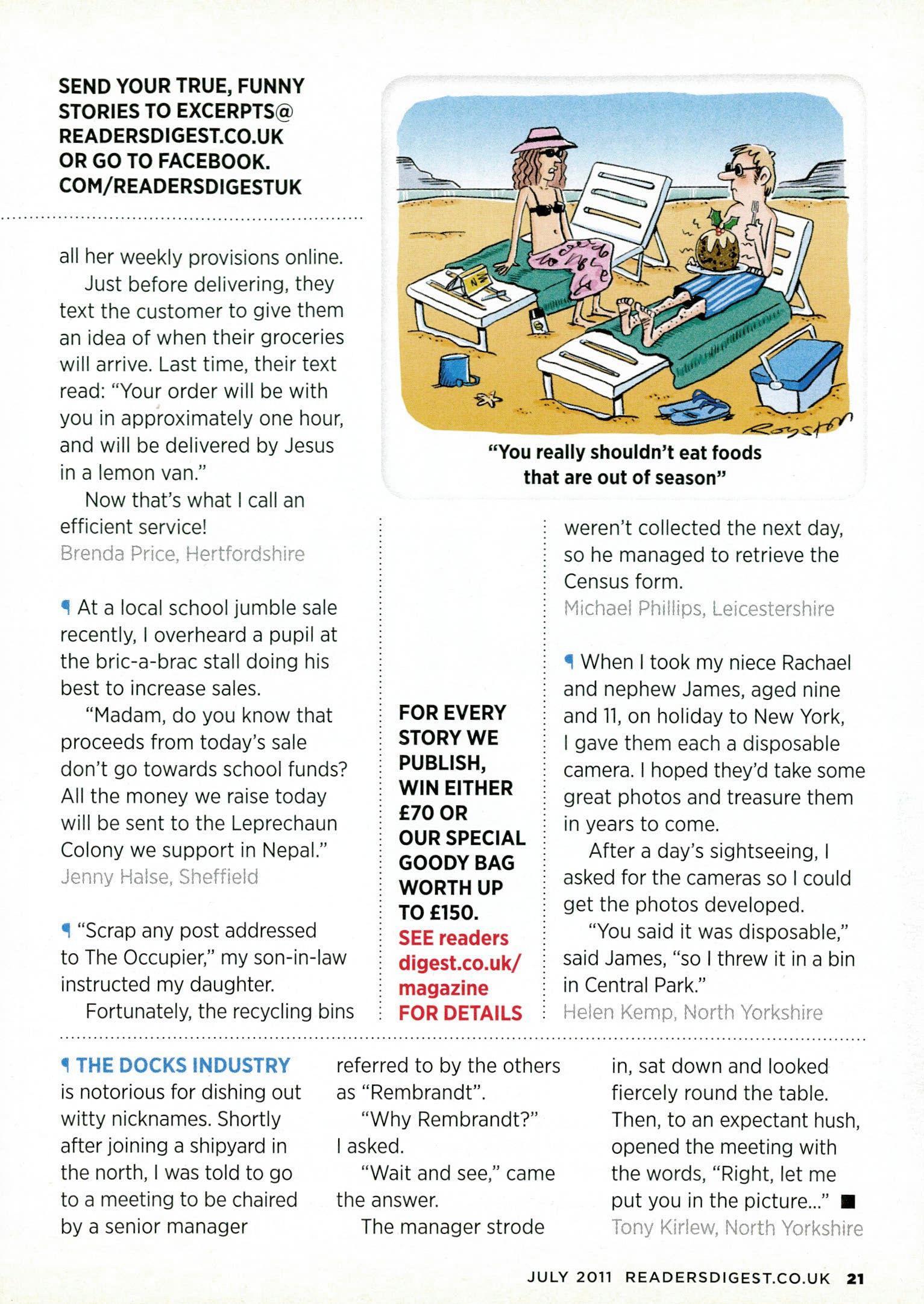
"You really shouldn't eat foods that are out of season"
weren't collected the next day, so he managed to retrieve the Census form.
Michael Phillips, Leicestershire
FOR EVERY STORY WE PUBLISH, WIN EITHER £70 OR OUR SPECIAL GOODY BAG WORTH UP TO £150. SEE readers digest.co.uk/ magazine FOR DETAILS
referred to by the others as "Rembrandt".
"Why Rembrandt?"
I asked.
"Wait and see," came the answer.
The manager strode
1 When I took my niece Rachael and nephew James, aged nine and 11, on holiday to New York, I gave them each a disposable camera. I hoped they'd take some great photos and treasure them in years to come.
After a day's sightseeing, I asked for the cameras so I could get the photos developed.
"You said it was disposable," said James, "so I threw it in a bin in Central Park."
Helen Kemp, North Yorkshire
in, sat down and looked fiercely round the table. Then, to an expectant hush, opened the meeting with the words, "Right, let me put you in the picture..." ■ Tony Kiriew, North Yorkshire
JULY 2011 READERSDIGEST.CO.UK 21
BREATH?

Plaque is a major cause of bad breath and gum disease. Corsodyl Daily Defence mouthwash contains fluoride plus chlorhexidine, an antibacterial ingredient that actively helps reduce plaque. With over 30 years of gum care expertise, Corsodyl knows healthy gums are at the root of healthy teeth.
HAVEYOUGOT TOTHEROOTOF BAD
DISCOVER MORE AT GUMSMART.00.1114 CORSODYL is a registered trade mark of the GlaxoSmithKline group of companies.
WORD POWER
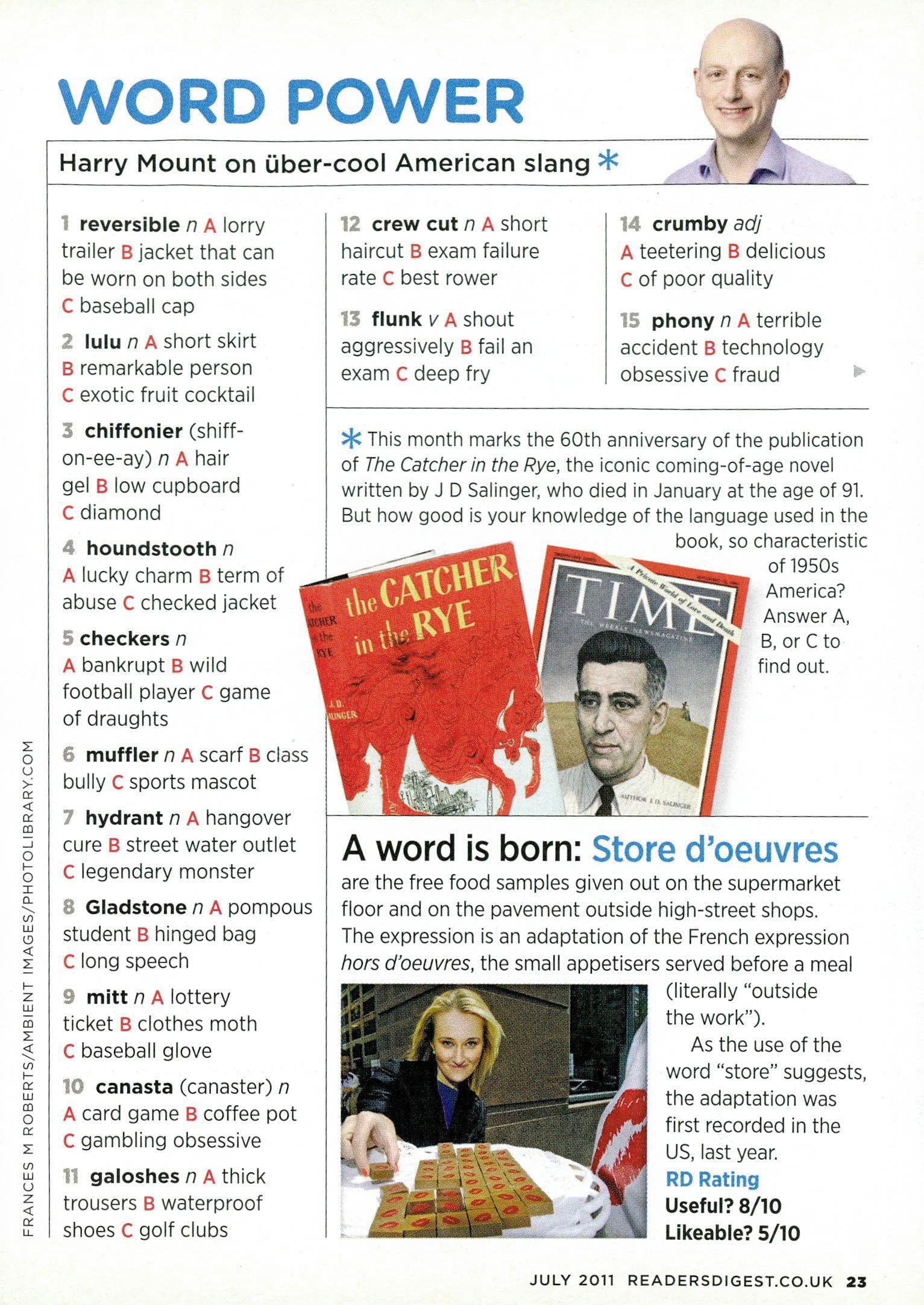
1 reversible n A lorry trailer B jacket that can be worn on both sides C baseball cap
2 lulu n A short skirt B remarkable person C exotic fruit cocktail
3 chiffonier (shiffon-ee-ay) n A hair gel B low cupboard C diamond
4 houndstooth n
A lucky charm B term of abuse C checked jacket
5 checkers n A bankrupt B wild football player C game of draughts
6 muffler n A scarf B class bully C sports mascot
7 hydrant n A hangover cure B street water outlet C legendary monster
8 Gladstone n A pompous student B hinged bag C long speech
9 mitt n A lottery ticket B clothes moth C baseball glove
10 canasta (canaster) n A card game B coffee pot C gambling obsessive
11 galoshes n A thick trousers B waterproof shoes C golf clubs
12 crew cut n A short haircut B exam failure rate C best rower
13 flunk v A shout aggressively B fail an exam C deep fry
14 crumby adj
A teetering B delicious C of poor quality
15 phony n A terrible accident B technology obsessive C fraud ►
* This month marks the 60th anniversary of the publication of The Catcher in the Rye, the iconic coming-of-age novel written by J D Salinger, who died in January at the age of 91. But how good is your knowledge of the language used in the book, so characteristic of 1950s America?
Answer A, B, or C to find out.
A word is born: Store d'oeuvres
are the free food samples given out on the supermarket floor and on the pavement outside high-street shops. The expression is an adaptation of the French expression hors d'oeuvres, the small appetisers served before a meal (literally "outside the work").
As the use of the word "store" suggests, the adaptation was first recorded in the US, last year.
RD Rating Useful? 8/10
Likeable? 5/10
M ROBERTS/ AMBIENT IMAGES/ PHO TOLIBRAR Y. COM U ULL
JULY 2011 READERSDIGEST.CO.UK 23
WORD POWER ANSWERS
9-11 getting there 12-13 impressive 14-15 word-power wizard!
1 reversible—B jacket that can be worn on both sides. Latin re (back) and vertere (to turn).
2 lulu—B a remarkable person. Nineteenth century, unknown origin (perhaps a pet form of Louise).
3 chiffonier—B low cupboard. "I had a bed and a chiffonier in my room." French chiffonier (chest of drawers).
4 houndstooth—C checked jacket. From the checked pattern, with notched corners, reminiscent of a canine tooth.
5 checkers—C game of draughts. From the checked pattern on the board.
6 muffler—A scarf. Old French moufle (thick glove).
7 hydrant—B street water outlet. "It got so hot in Greenwich Village that the kids opened up the hydrant." Greek hudor (water).
8 Gladstone—B hinged bag. "I packed two Gladstones and jumped on a bus to Newark." From the Victorian prime minister
WHY ST BERNARD DOGS?
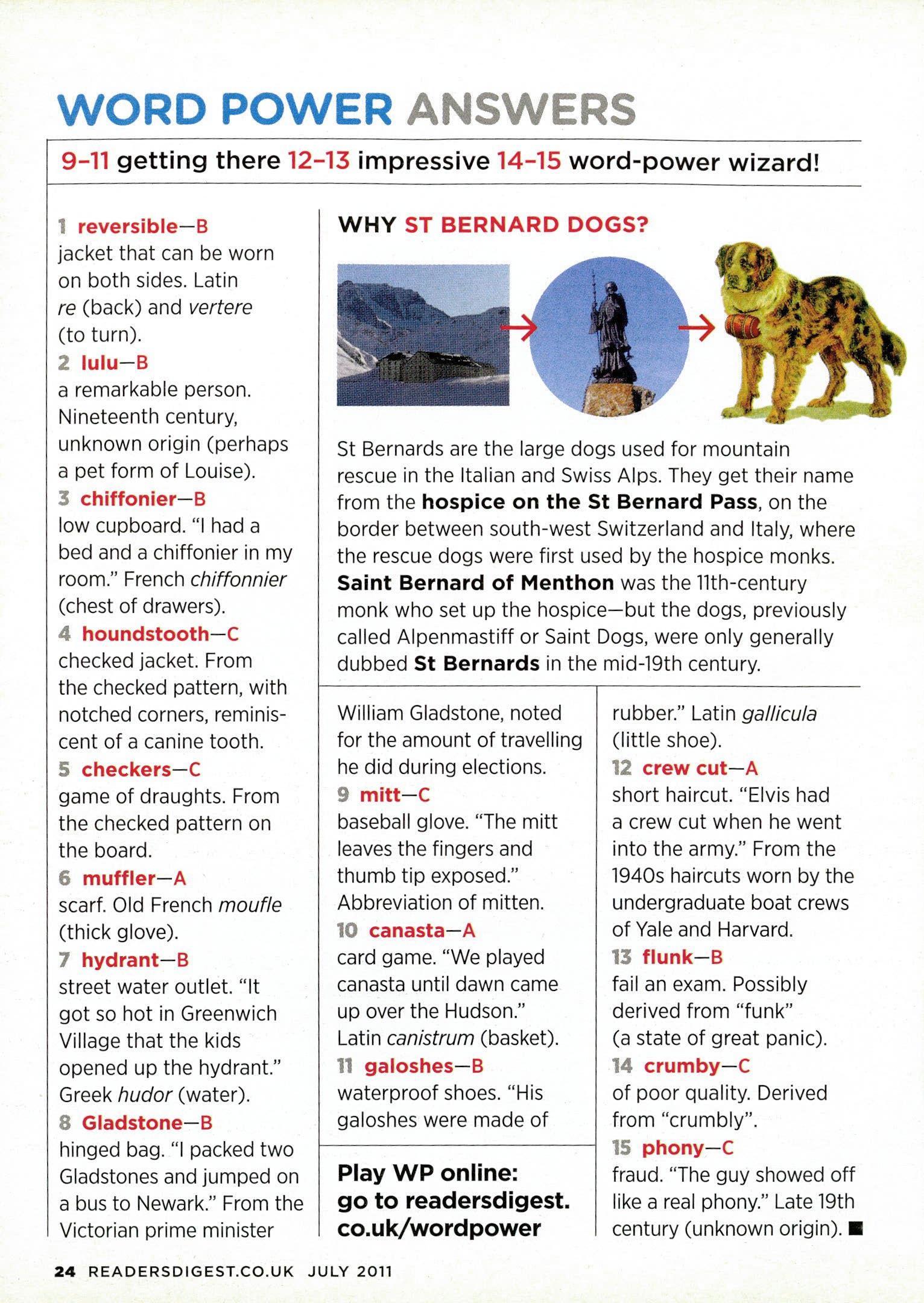
St Bernards are the large dogs used for mountain rescue in the Italian and Swiss Alps. They get their name from the hospice on the St Bernard Pass, on the border between south-west Switzerland and Italy, where the rescue dogs were first used by the hospice monks. Saint Bernard of Menthon was the 11th-century monk who set up the hospice—but the dogs, previously called Alpenmastiff or Saint Dogs, were only generally dubbed St Bernards in the mid-19th century.
William Gladstone, noted for the amount of travelling he did during elections.
9 mitt—C baseball glove. "The mitt leaves the fingers and thumb tip exposed." Abbreviation of mitten.
10 canasta—A card game. "We played canasta until dawn came up over the Hudson." Latin canistrum (basket).
11 galoshes—B waterproof shoes. "His galoshes were made of
Play WP online: go to readersdigest. co.0k/wordpower
rubber." Latin gallicula (little shoe).
12 crew cut—A short haircut. "Elvis had a crew cut when he went into the army." From the 1940s haircuts worn by the undergraduate boat crews of Yale and Harvard.
13 flunk—B fail an exam. Possibly derived from "funk" (a state of great panic).
14 crumby—C of poor quality. Derived from "crumbly".
15 phony—C fraud. "The guy showed off like a real phony." Late 19th century (unknown origin). ■
24 READERSDIGEST.CO.UK JULY 2011

Did you know that there is a herbal remedy available to help men with bladder symptoms of an enlarged prostate such as frequent urination, weak stream and having to get up at night for the toilet? FREE Prostate Check online avogel.co.uk/prostate-check-rd A. ogel Prostasan® Saw Palmetto capsules traditional herbal medicinal product used to relieve symptoms of an enlarged prostate Prostasan® Saw Palmetto capsules A traditional herbal medicinal product used for the relief of lower urinary tract symptoms in men who have a confirmed diagnosis of benign prostatic hypertrophy (BPH), based on traditional use only. Always read the leaflet. Available from health stores, pharmacies, Holland & Barrett and larger Boots stores. 608 5858 For further information please visit avogel.co.uk or call our helpline on
Prostate Problems?
IN THE FUTURE...
...we could all appear "live", says
Gary Rimmer
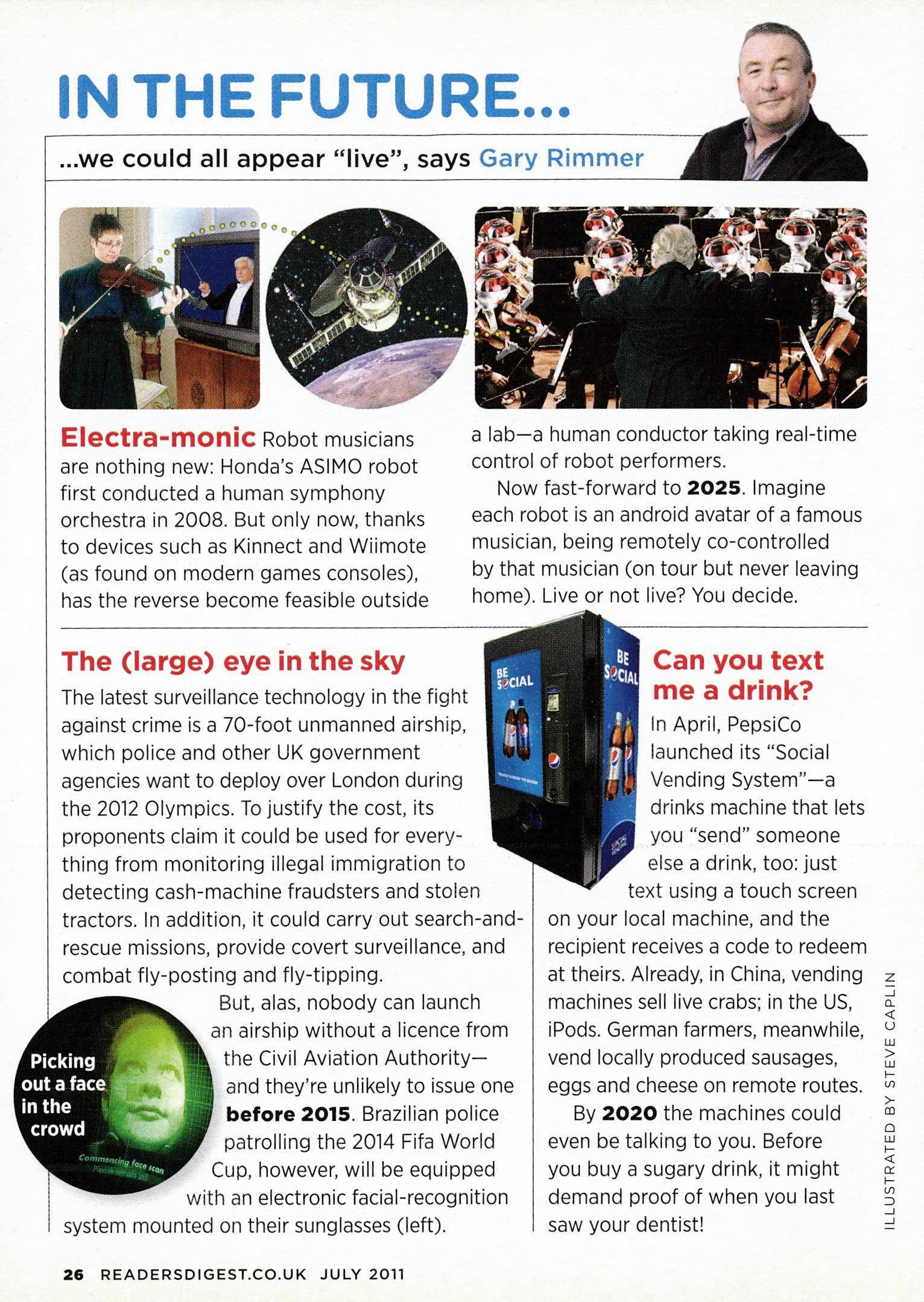
Electra-monic Robot musicians are nothing new: Honda's ASIMO robot first conducted a human symphony orchestra in 2008. But only now, thanks to devices such as Kinnect and Wiimote (as found on modern games consoles), has the reverse become feasible outside
The (large) eye in the sky
a lab—a human conductor taking real-time control of robot performers.
Now fast-forward to 2025. Imagine each robot is an android avatar of a famous musician, being remotely co-controlled by that musician (on tour but never leaving home). Live or not live? You decide.
The latest surveillance technology in the fight against crime is a 70-foot unmanned airship, which police and other UK government agencies want to deploy over London during the 2012 Olympics. To justify the cost, its proponents claim it could be used for everything from monitoring illegal immigration to detecting cash-machine fraudsters and stolen tractors. In addition, it could carry out search-andrescue missions, provide covert surveillance, and combat fly-posting and fly-tipping.
But, alas, nobody can launch an airship without a licence from the Civil Aviation Authority— and they're unlikely to issue one before 2015. Brazilian police patrolling the 2014 Fifa World Cup, however, will be equipped with an electronic facial-recognition system mounted on their sunglasses (left).
Can you text me a drink?
In April, PepsiCo launched its "Social Vending System"—a drinks machine that lets you "send" someone else a drink, too: just text using a touch screen on your local machine, and the recipient receives a code to redeem at theirs. Already, in China, vending machines sell live crabs; in the US, iPods. German farmers, meanwhile, vend locally produced sausages, eggs and cheese on remote routes. By 2020 the machines could even be talking to you. Before you buy a sugary drink, it might demand proof of when you last saw your dentist!
26 READERSDIGEST.CO.UK JULY 2011
IL LUS TRATED BY
STEVE CAPLIN
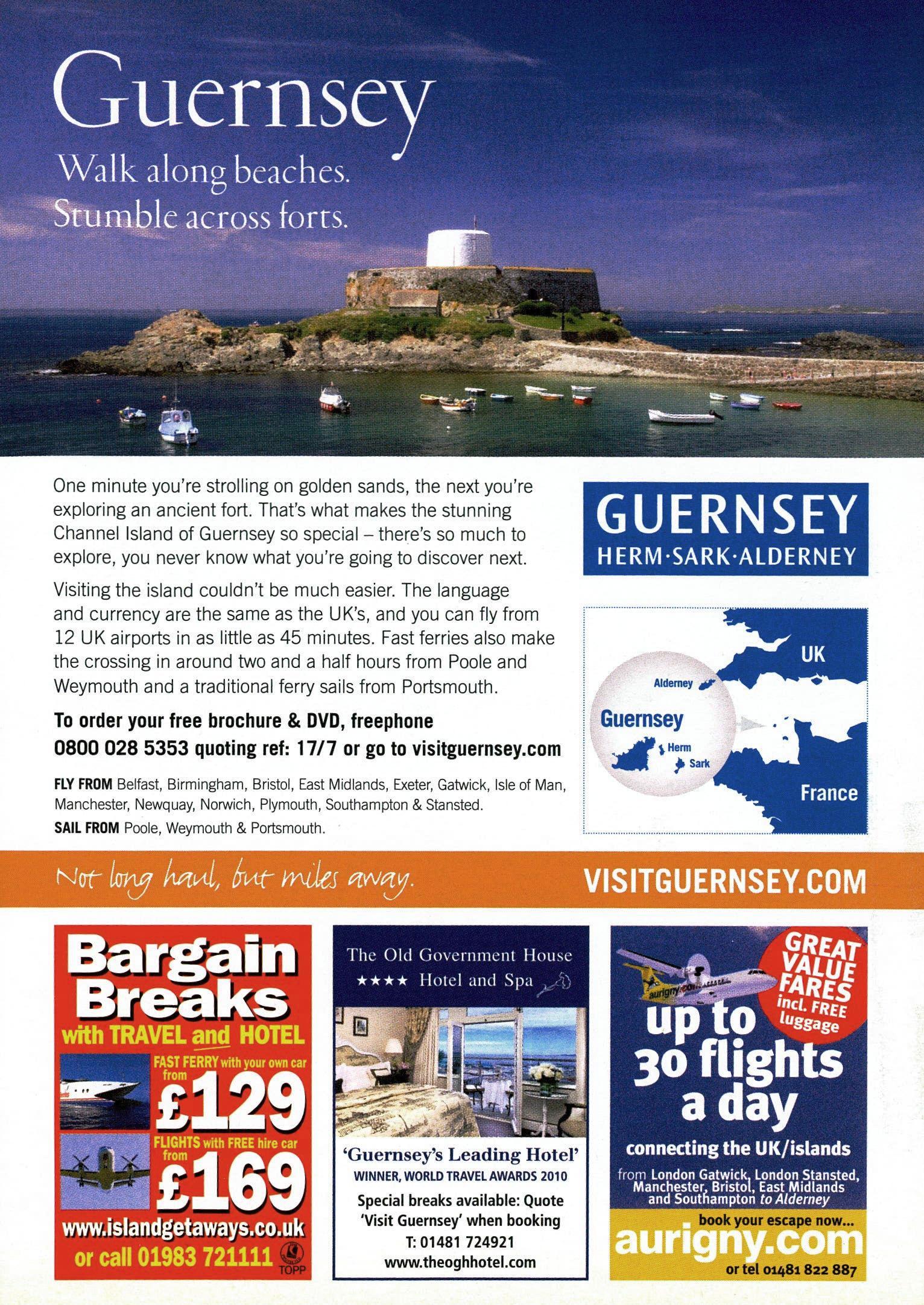
One minute you're strolling on golden sands, the next you're exploring an ancient fort. That's what makes the stunning Channel Island of Guernsey so special — there's so much to explore, you never know what you're going to discover next. Visiting the island couldn't be much easier. The language and currency are the same as the UK's, and you can fly from 12 UK airports in as little as 45 minutes. Fast ferries also make the crossing in around two and a half hours from Poole and Weymouth and a traditional ferry sails from Portsmouth.
To order your free brochure & DVD, freephone 0800 028 5353 quoting ref: 17/7 or go to visitguernsey.com
FLYFROM Belfast, Birmingham, Bristol, East Midlands, Exeter, Gatwick, Isle of Man, Manchester, Newquay, Norwich, Plymouth, Southampton & Stansted. SAIL FROM Poole, Weymouth & Portsmouth.
Guernsey Walk along beaches. Stumble across forts. Bargain Breaks with TRAVEL and HOTEL FAST FERRYwith your own car! from129 FLIGHTSwith FREE hire car X169 www.islandgetaways.co.uk or call 01983 721111 .40. `Guernsey's Leading Hotel' GREAT FARES Up to tglirgE.E 3o flights a day connecting the UK/islands from London Gatwick, London Stansted, Manchester, Bristol, East Midlands and Southampton to Alderney
GUERNSEY HERIVI•SA R K ALDERNEY The Old Government House **-k* Hotel and Spa Special breaks available: Quote 'Visit Guernsey' when booking T: 01481 724921 www.theoghhotel.com book your escape now... or tel 01480 822 887
INSTANT EXPERT
Harry Mount reveals the facts behind the news

It's the season for flower shows, and as well as offering a fabulous spectacle, they also bring in a huge amount of money (the Royal Horticultural Society made £15.5m from its shows last year). But how did the cult of the flower show begin?
Which is the world's biggest flower show?
Hampton Court Palace Flower Show takes the honours. It's set in the grounds of Hampton Court itself and this year's show (from July 5-10) includes the Royal Horticultural Society's Edible Garden, a festival of roses, a series of gardens inspired by English poets from Shelley to Kipling, and a fashion show with a Swinging Sixties theme. Among the conceptual gardens are designs connected to fungi, computer technology and the Renaissance.
1.4 million people visit RHS gardens annually
When was the first official flower show?
RHS shows began in 1833 in their own garden at Chiswick—the first official organised national flower show in the world.
The RHS was founded in 1804 in Hatchards bookshop, in London's Piccadilly, by Sir Joseph Banks and John Wedgwood (of the pottery dynasty).
JOHN ENOCH/ RHS ( ABOVE AND OPPOS ITE)
28 READERSDIGEST.CO.UK JULY 2011
Flower Shows

Which is the most famous flower show?
Despite the physical size of the Hampton Court show, it's still not as well known as the Chelsea Flower Show, which started in 1913. Until then, the RHS Great Spring Flower Show was held at the gardens of the Inner Temple in central London.
The lawyers of the Temple weren't happy with the disruption caused by the show, which had grown too enormous for the site anyway. A one-off Royal International Horticultural Exhibition at Chelsea in 1912 was such a hit that the spring flower show moved there—and it's stayed there ever since.
When was the flower border invented?
In 1800, landscape architect Sir Humphry Repton proposed that there should be "dressed ground"—or flower beds—to be seen from the principal rooms of grand country houses, so residents could enjoy them.
In 1830, the cylinder lawnmower was invented by Edwin Budding, a foundryman from Stroud, Gloucestershire. Previously, scythes cut grass, slowly and roughly, but the new machine cleared big areas of land, leaving behind neat, even boundaries—or borders—for flower growing.
The fashion for the border deepened with the invention of carpet bedding—highly patterned floral displays—dreamed up by John
Fleming, head gardener of Cliveden
House, Berkshire, in the 1840s. designs
When did the British first start to grow flowers?
Some garden historians have suggested that prehistoric plots of land, planted with henbane and opium, were the first British gardens—but this is all a little too far back in the mists of time to be sure. What is true is that in medieval towns, cottages had back gardens, and the chief characteristics of our modern gardens—long and thin, with private spaces fenced off from the neighbours—were in place even then. ■
•
One of Humphry
Repton's floral
JULY 2011 READERSDIGEST.CO.UK 29
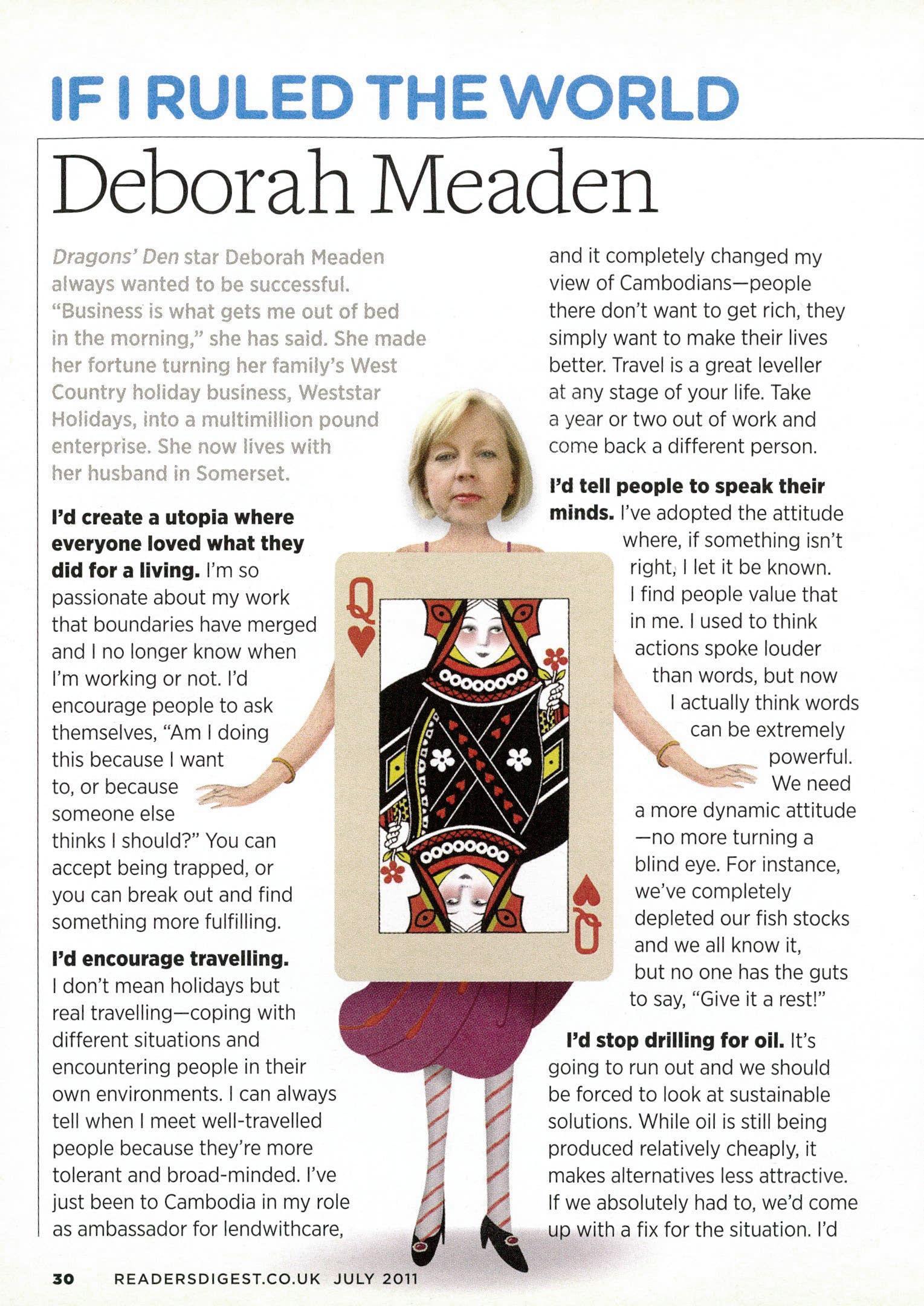
IF I RULED THE WORLD Deborah Meaden
Dragons' Den star Deborah Meader, always wanted to be successful. "Business is what gets me out of beu in the morning," she has said. She made her fortune turning her family's West Country holiday business, Weststar Holidays, into a multimillion pound enterprise. She now lives with her husband in Somerset.
I'd create a utopia where everyone loved what they did for a living. I'm so passionate about my work that boundaries have merged and I no longer know when I'm working or not. I'd encourage people to ask themselves, "Am I doing this because I want to, or because someone else thinks I should?" You can accept being trapped, or you can break out and find something more fulfilling.
I'd encourage travelling. I don't mean holidays but real travelling—coping with different situations and encountering people in their own environments. I can always tell when I meet well-travelled people because they're more tolerant and broad-minded. I've just been to Cambodia in my role as ambassador for lendwithcare,
and it completely changed my view of Cambodians—people there don't want to get rich, they simply want to make their lives better. Travel is a great leveller at any stage of your life. Take a year or two out of work and come back a different person.
I'd tell minds.
people to speak their I've adopted the attitude where, if something isn't right; I let it be known. I find people value that in me. I used to think actions spoke louder than words, but now I actually think words can be extremely powerful. We need a more dynamic attitude —no more turning a blind eye. For instance, we've completely depleted our fish stocks and we all know it, but no one has the guts to say, "Give it a rest!"
Pd stop drilling for oil. It's going to run out and we should be forced to look at sustainable solutions. While oil is still being produced relatively cheaply, it makes alternatives less attractive. If we absolutely had to, we'd come up with a fix for the situation. I'd
30 READERSDIGEST.CO.UK JULY 2011
look at lots of different sources: sun, wind, waves—it's very dangerous to have only one answer to a problem. Oil gives too much power to individuals, resulting in conflicts around the world. Why are we worried about Libya but not doing anything about the war in Ivory Coast? It all comes down to oil.
I'd magic "the best part of the day" to between 9-10am. I'm not an early riser—my background in the leisure industry means I can work all night but I'm sluggish first thing —and I'm fed up with everyone saying early morning is "the best part of the day"!
I'd use bonuses to motivate our entire workforce. What's happened with bankers' bonuses is that they're considered part of their package—and in numbers people can't even conceive as appropriate. But bonuses as a reward for going above and beyond the job description are t a great long-term incentive. Used correctly, bonuses can make a business more secure as people m want to stay with the firm and do well within it.
I'd value practical education. Too often our system takes the .r2 wonderfully open minds of young
It may sound odd coming from a Dragon, but life isn't all about money and celebrity!

For details of Deborah's ongoing work with microfinance site lendwithcare, please see readersdigest. co.uk/links.
people and narrows their vision. Exams force children to channel their energy into achieving academic results. I've got a cloth business and I can't find young people to work in the factory, as making things isn't valued any more. We've got plenty of aspiring designers, but where at school is there the opportunity for someone to flourish who is good with their hands?
I'd put trivia in perspective. The recession is hurting, but it's also forcing us to look at our priorities—good friends and family, and thinking about the future. It's about getting the balance right—I love talking about shoes, handbags and what's on TV as much as the next person, but we shouldn't be worrying about any of it. It may sound odd coming from a Dragon, but life isn't all about money and celebrity!
I'd tell the world to get into a culture of work.It's a skill, a discipline: learning how to be on time, knowing where to find and put things, interacting with others, understanding how an organisation works. Never make the mistake of getting used to not being busy every day. IN
As told to Caroline Hutton
tt
JULY 2011 READERSDIGEST.CO.UK 31
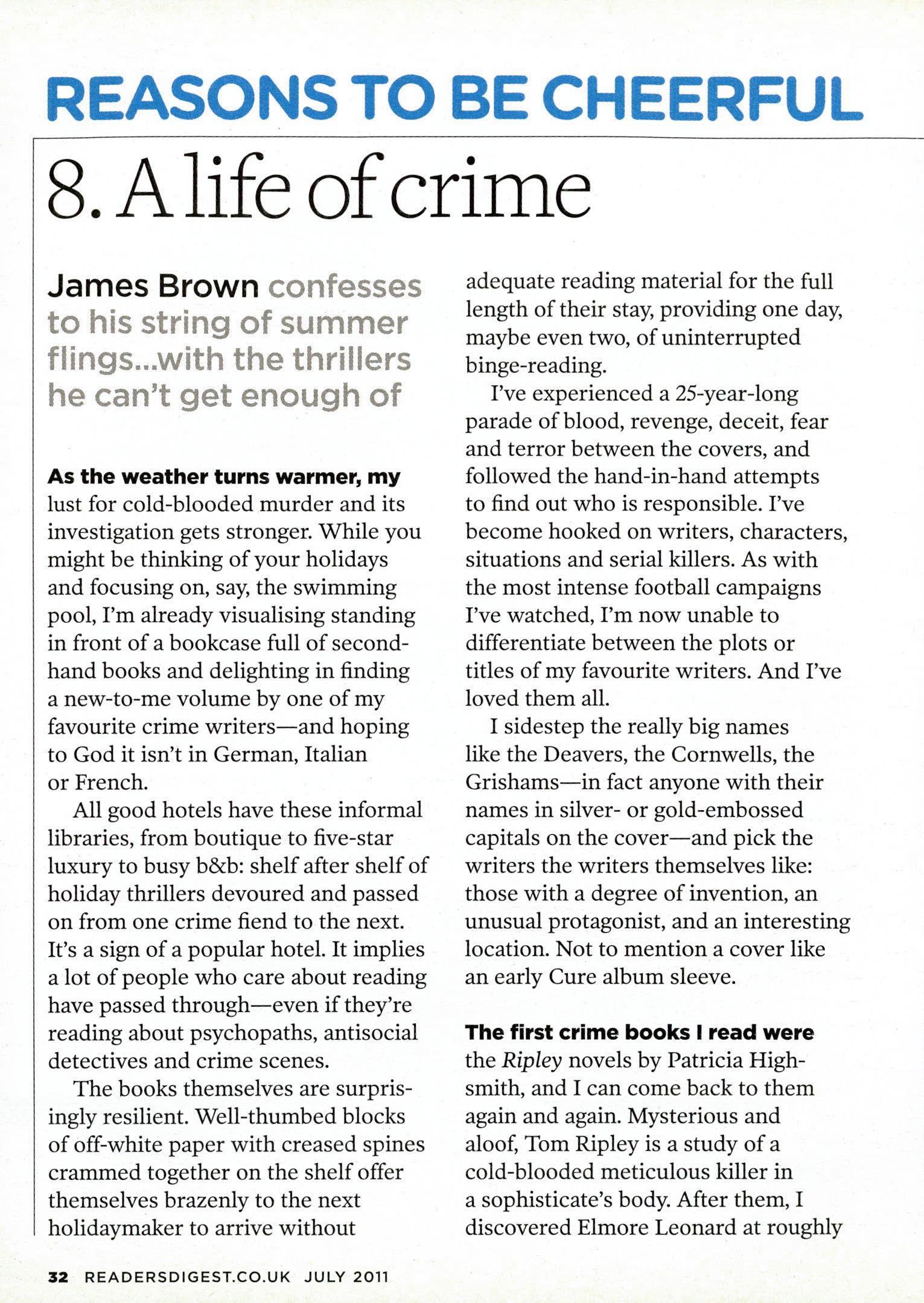
REASONS TO BE CHEERFUL
8. A life of crime
James Brown confesses to his string of summer flings...with the thrillers he can't get enough of
As the weather turns warmer, my lust for cold-blooded murder and its investigation gets stronger. While you might be thinking of your holidays and focusing on, say, the swimming pool, I'm already visualising standing in front of a bookcase full of secondhand books and delighting in finding a new-to-me volume by one of my favourite crime writers—and hoping to God it isn't in German, Italian or French.
All good hotels have these informal libraries, from boutique to five-star luxury to busy b&b: shelf after shelf of holiday thrillers devoured and passed on from one crime fiend to the next. It's a sign of a popular hotel. It implies a lot of people who care about reading have passed through—even if they're reading about psychopaths, antisocial detectives and crime scenes.
The books themselves are surprisingly resilient. Well-thumbed blocks of off-white paper with creased spines crammed together on the shelf offer themselves brazenly to the next holidaymaker to arrive without
adequate reading material for the full length of their stay, providing one day, maybe even two, of uninterrupted binge-reading.
I've experienced a 25-year-long parade of blood, revenge, deceit, fear and terror between the covers, and followed the hand-in-hand attempts to find out who is responsible. I've become hooked on writers, characters, situations and serial killers. As with the most intense football campaigns I've watched, I'm now unable to differentiate between the plots or titles of my favourite writers. And I've loved them all.
I sidestep the really big names like the Deavers, the Cornwells, the Grishams—in fact anyone with their names in silver- or gold-embossed capitals on the cover—and pick the writers the writers themselves like: those with a degree of invention, an unusual protagonist, and an interesting location. Not to mention a cover like an early Cure album sleeve.
The first crime books I read were the Ripley novels by Patricia Highsmith, and I can come back to them again and again. Mysterious and aloof, Tom Ripley is a study of a cold-blooded meticulous killer in a sophisticate's body. After them, I discovered Elmore Leonard at roughly
32 READERSDIGEST.CO.UK JULY 2011
the same time as I was discovering America in person. The idea that it was always the Average Joe passerby who intercepts the wayward, and often stupid, criminal at their most cruel made my early nights in US motels restless ones.
After Leonard, I found Chester Himes and the black Harlem detectives Grave Digger Jones and Coffin Ed Johnson, and I'd read about them while listening

to early Public Enemy. I stayed in New York with Andrew Vachss and a character who hated paedophiles, and then James Ellroy with his brilliant retelling of Hollywood's dark side and the social landscape that entwined the CIA, Mafia and politicians of the late 20th century.
Apart from Sherlock Holmes in London and Ripley in France, it was always America. Crime seemed bigger, more plausible, there—the novels more cinematic and distanced from the reality of the streets I grew up in where the Yorkshire Ripper dumped his victims' bodies.
For a long time my favourite crime writer was Boston-based Dennis Lehane, who went on to write screenplays for Clint Eastwood and episodes ofThe Wire. And then, having met Lehane, his publisher recommended I try Lee Child, and then Lee Child told me about Michael Connelly.
You see it's a chain: one all-consuming writer moves you on to another. You develop a friendship or affinity with the central characters. I always picture Lee Child's ex-military policeman Jack Reacher as a modern High Plains 0-
ILLUSTRATED BY MICK BROWNFIELD
JULY 2011 READERSDIGEST.CO.UK 33
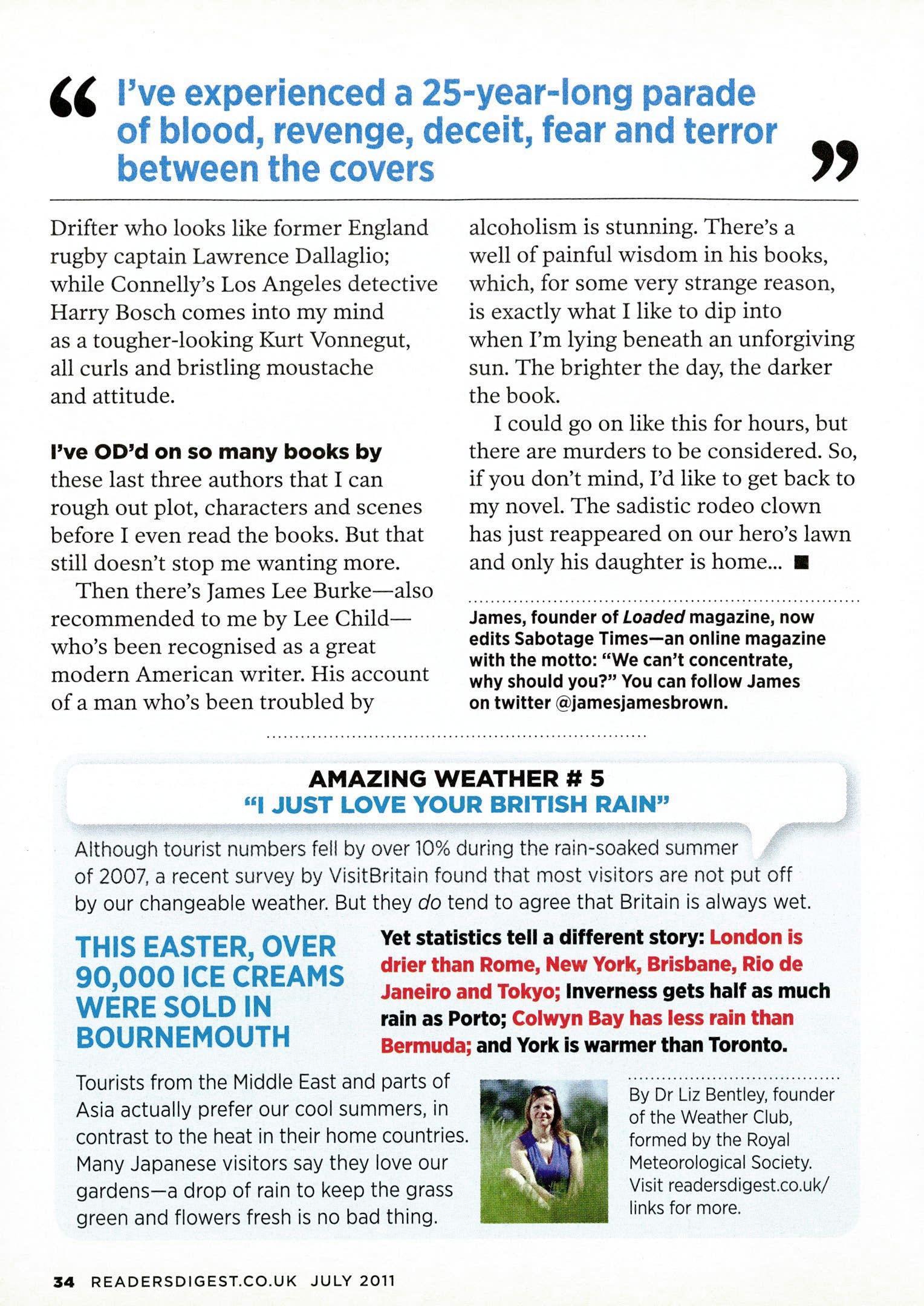
ttI've experienced a 25-year-long parade of blood, revenge, deceit, fear and terror between the covers ,/
Drifter who looks like former England rugby captain Lawrence Dallaglio; while Connelly's Los Angeles detective Harry Bosch comes into my mind as a tougher-looking Kurt Vonnegut, all curls and bristling moustache and attitude.
I've OD'd on so many books by these last three authors that I can rough out plot, characters and scenes before I even read the books. But that still doesn't stop me wanting more. Then there's James Lee Burke—also recommended to me by Lee Child— who's been recognised as a great modern American writer. His account of a man who's been troubled by alcoholism is stunning. There's a well of painful wisdom in his books, which, for some very strange reason, is exactly what I like to dip into when I'm lying beneath an unforgiving sun. The brighter the day, the darker the book.
I could go on like this for hours, but there are murders to be considered. So, if you don't mind, I'd like to get back to my novel. The sadistic rodeo clown has just reappeared on our hero's lawn and only his daughter is home... ■
James, founder of Loaded magazine, now edits Sabotage Times—an online magazine with the motto: "We can't concentrate, why should you?" You can follow James on twitter @jamesjamesbrown.
AMAZING WEATHER # 5
"I JUST LOVE YOUR BRITISH RAIN"
Although tourist numbers fell by over 10% during the rain-soaked summer of 2007, a recent survey by VisitBritain found that most visitors are not put off by our changeable weather. But they do tend to agree that Britain is always wet.
THIS EASTER, OVER 90,000 ICE CREAMS WERE SOLD IN BOURNEMOUTH
Yet statistics tell a different story: London is drier than Rome, New York, Brisbane, Rio de Janeiro and Tokyo; Inverness gets half as much rain as Porto; Colwyn Bay has less rain than Bermuda; and York is warmer than Toronto.
Tourists from the Middle East and parts of Asia actually prefer our cool summers, in contrast to the heat in their home countries. Many Japanese visitors say they love our gardens—a drop of rain to keep the grass green and flowers fresh is no bad thing.
By
Dr Liz Bentley, founder of the Weather Club, formed by the Royal Meteorological Society. Visit readersdigest.co.uk/ links for more.
34 READERSDIGEST.CO.UK JULY 2011
Discover the secret to cooler conservatory living this summer
Transform your conservatory into a summer oasis with 3 for 2 on made to measure conservatory blinds
Enjoy your conservatory to the full this summer and create a cool, calm relaxation oasis with tailor made conservatory blinds designed to transform your conservatory into a beautiful and comfortable living space all summer long.
Thomas Sanderson has an extensive range of fabrics and finishes including over 1000 colour and styling combinations. Their advanced solar reflective fabric technology will help you to control the temperature of your conservatory, keeping heat and glare at bay and protecting furniture from fading by reflecting the sun's rays away from the glass in the hot summer months.
Each conservatory blind is individually measured and then handcrafted in their UK factory before being installed by their team of experts to ensure a long lasting, precise fit.
So, if you're looking to get more out of your conservatory this summer, conservatory blinds are a practical, stylish and valuable addition that will allow you to enjoy year round conservatory living

Transform your conservatory for less with the Thomas Sanderson 3 for 2 summer sale, for every two conservatory blinds, choose a third absolutely FREE.
To claim this discount and to order your FREE brochure call 0800 220 603 and quote reference D275B.
Limited period only. Terms and conditions apply. www.tsoffer.co.uk
proripmmirwineur
Tho Won, An expression of individuality For more information call 0800 220 603
Complete your details below for your FREE brochure and to claim 3 for 2. Send to: Thomas Sanderson, FREEPOST, Hants P07 7UW NAME: TELEPHONE NUMBER: aw ADDRESS: POST CODE: Quote Ref: D2755 ----------------
With just a year to go until the Olympics, Rebecca Adlington talks t Alison Kervin about her gruelling training, the penis of partying, and how she may have OCD
The golden girl of British swimming lies across a soft cream sofa, her tanned limbs draped over the edge. She chats away in her giggly, sing-song voice as she poses for the cameraman in various glamorous outfits.
This sort of thing is second nature to Rebecca Adlington now The 22-year-old has been a bona fide celebrity since that magic moment in Beijing in 2008 when she won two Olympic gold medals.
Today, she's at our central London shoot, then it's off to a meeting with her sponsors British Gas and a GMTV interview. And tomorrow there's another photocall for one of the glossies.

But, in among all the show business, Rebecca is trying to focus on what really matters in her life—swimming. As the one-year countdown to the London Olympics—where she hopes to defend her 400m and 800m freestyle titles— starts, she's locked into a gruelling training schedule that requires up to four hours a day in the pool, 90-minute gym sessions and regular runs. She also has to eat every two hours—lean meat, healthy carbs, fruit and vegetables—just to keep going.
"I know the amount of work we do sounds like a real drag, and no one can figure out why I want to be up before
STEAIDY,
40) 36

Addicted
.V''DEY JAMES BRITISH GAS 37
to the pool: "Swimming is like chocolate cake to me"

5am every morning, but I love it," she says.
Her immediate goal is the World Championships, which start on July 16, and, though a good showing there will go a long way to ensuring her Olympic selection, she's doing her best to stop her mind drifting towards 2012 glory.
"The Olympics is huge, enormous, the biggest sporting event ever, but I can't allow myself to think about that at the moment," she says. "I have to concentrate on the current block of training, and that's all about success in the World Championships. Only if I improve as the months pass by, do I have a chance of gold in London."
Rebecca swam into the public consciousness after becoming the first British swimmer for 100 years to win two golds at an Olympic Games, breaking the 800m world record in the process. She was awarded an OBE, the mayor of her home town of Mansfield, Nottinghamshire, gave her the freedom of the city (and a pair of Jimmy Choo shoes), and a local pub even temporarily renamed itself "The Adlington Arms", with the publican promising her free burgers and chips for life.
In a split second, she'd been propelled from, in her words, "Miss Nobody" to Water ba "the one to beat". It was, she first trip acknowledges, very surreal. swimmin "For a swimmer surviving aged 14
on nothing and living with Mum and Dad, it was incredible. I'd never owned a pair of decent shoes and suddenly I was being given free Jimmy Choos. Then I made the top three on Sports Personality of the Year, got a sponsorship deal with British Gas and life felt brilliant."
But it didn't stay brilliant. She only won two bronze medals at the 2009 World Championships, and managed only one gold—in the 400m—at last August's European Championships. Interviewed afterwards by a foreign journalist, she broke down in tears. Her form improved at the Commonwealth Games two months later, where she won gold medals in the 400m and 800m, and bronzes in the 200m and 4x200m relay. But, she admits, that's not the same as the Olympics, and she has a lot to prove in the next 12 months.
Swimming has been harder for her since 2008, partly because her Olympic triumph made her a spokesperson for swimming, her country and the Olympic Games. For several months after her triumph, she felt dutybound to accept dozens of media requests and go to numerous events, both for her sponsors' benefit and to take a rare by: the opportunity to promote her to a sport. But this dramatically g pool, reduced her training time, so months her technique became "forced
CO UR TES Y OF ADLINGTON FAMILY 38 READERSDIGEST.CO.UK JULY 2011
4 ■ and mechanical", and she lost her "feel for the water".
Rebecca soaks up the adulation after her double-gold triumph at the 2008 Olympics
"Because I went to lots of parties, celebrated winning and ate loads, I put on weight," she adds. "Then, when I got back into the pool, I couldn't cope, and the intensity of my training sessions had to be reduced. I find it hard enough to keep my weight down, anyway. I'm a big girl, so I worry about it. I can't eat too much or it shows straightaway!"
Rebecca isn't really "big". She's much slimmer and far more attractive in the flesh than she appears on TV, with gentler features, ice-blue eyes, long, toned, supermodel legs and an aura of strength and invincibility.
But, though she's now balancing her
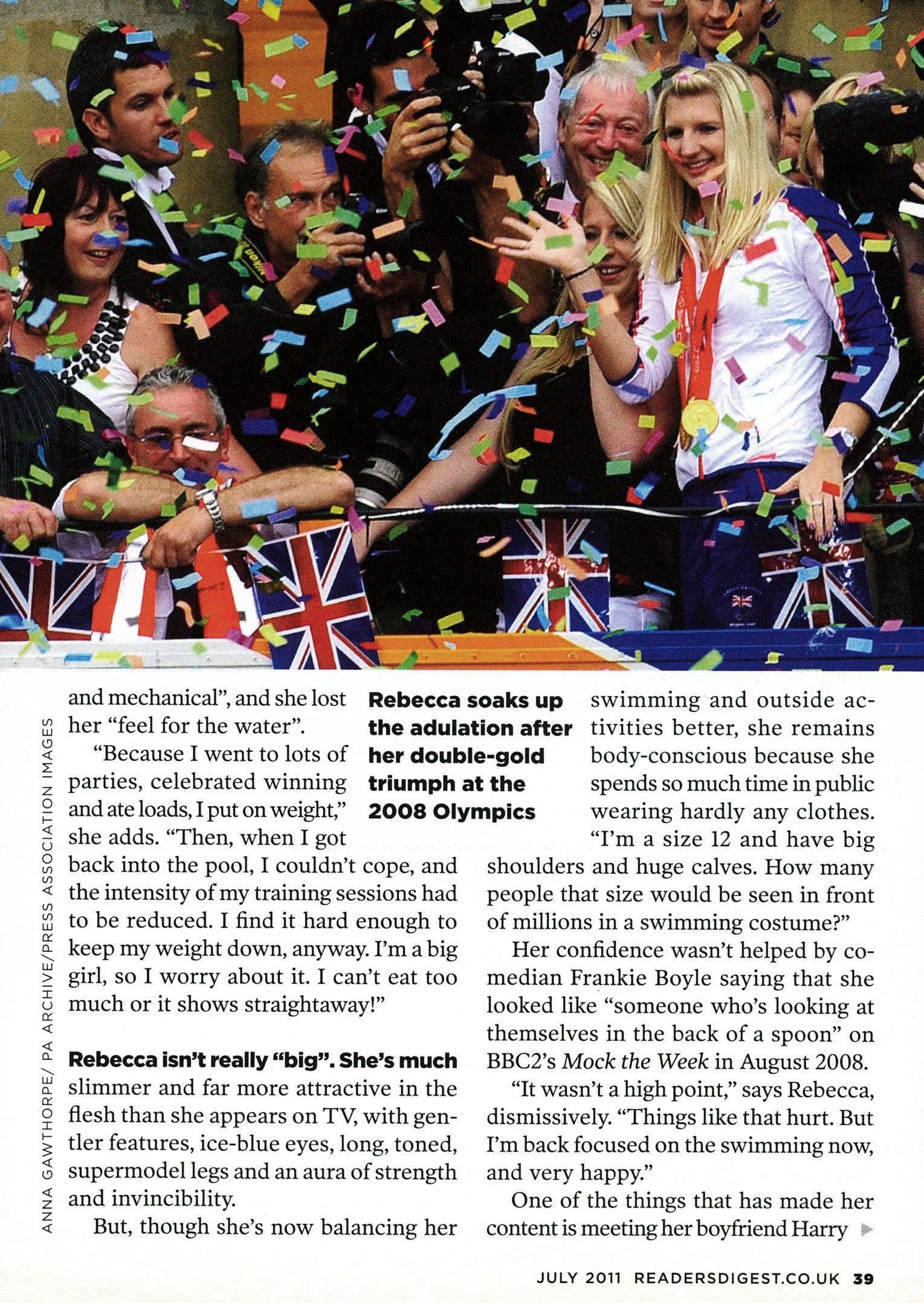
swimming and outside activities better, she remains body-conscious because she spends so much time in public wearing hardly any clothes. "I'm a size 12 and have big shoulders and huge calves. How many people that size would be seen in front of millions in a swimming costume?"
Her confidence wasn't helped by comedian Frankie Boyle saying that she looked like "someone who's looking at themselves in the back of a spoon" on BBC2's Mock the Week in August 2008.
"It wasn't a high point," says Rebecca, dismissively. "Things like that hurt. But I'm back focused on the swimming now, and very happy."
One of the things that has made her content is meeting her boyfriend Harry 0.
ANNA GAWT HORPE/ PA ARCHIVE/ PRESS ASSOCIATION IMA GES
JULY 2011 READERSDIGEST.CO.UK 39
41 Needs, also a swimmer. The 19-year-old moved to Nottingham from London at the beginning of the year to train with Nova Centurions, Rebecca's club, and the two hit it off right away.
"We train at the same time, so we see each other a lot, and neither of us wants to drink alcohol or have late nights out. We go for dinner and to the cinema—normal things."
Rebecca adores clothes, particularly admiring the style of Diana, Princess of Wales, and US actress Rachel Bilson (best known for E4 series The OC).
"But I'm not OCD about them like Harry," she says. "He's really tidy and organised. He always dresses with everything matching properly and colour coordinated, and I'm just chaotic about things like that—I put on whatever's there.
"I'm only OCD about numbers. I'm really funny about them—I hate odd numbers; everything has to be even. The volume on the remote control has to be 2, 4 or 6, but not 1 or 3, and definitely not O. Is that weird?"
It is slightly strange, but don't we all have these little foibles?
TUESDAY
MONDAY Two two-hour swims, sometimes a run as well. One two-hour swim, an hour-and-a-half gym session and another two-hour swim.
WEDNESDAY Two two-hour swims and a run.
THURSDAY One two-hour swim. One hour-and-a-half gym session.
FRIDAY One hour-and-a-half gym session in the morning, a two-hour swim and another gym session in the afternoon.
SATURDAY Two two-hour swims.
SUNDAY Day off!

"No, mine's not little; mine's big. Numbers have to be even. If I click my fingers once, I have to do it again, so it's even, then I have to do it on the other hand. I don't feel right otherwise—it's a bad omen."
Rebecca's superstitions extend to her
choice of swimming costume. She feels she has to change it for every race, unless she's won. "In Beijing, I wore the same one all the way through. I had to— it was lucky after I'd got gold once."
Where's the costume now?
"At Mum's house with the medals
40 READERSDIGEST.CO.UK JULY 2011
[which are kept in a Christian Louboutin dust bag]," she replies with a smile.

Competing in the 800m freestyle at the Commonwealth Games in 2010
When Rebecca first wore that costume, nothing was expected of her—but, these days, the nation assumes
she'll win and there's disappointment if she doesn't. Does this make competing a very different experience?
"Yes, it does. There's definitely more pressure but, to be honest, I put so much pressure on myself, no 0.
AFP/G ETTY IMAGES
JULY 2011 READERSDIGEST.CO.UK 41
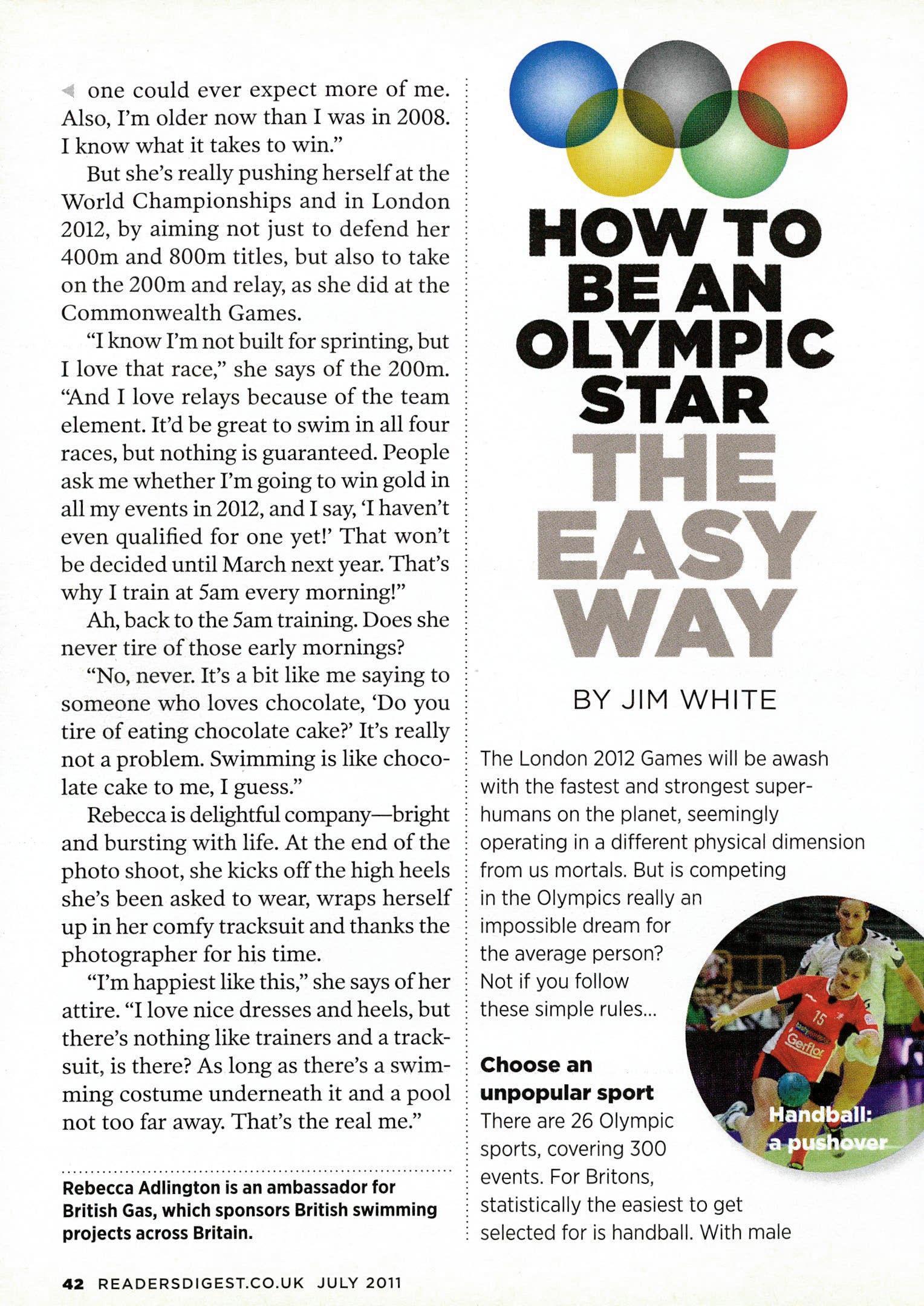
A one could ever expect more of me. Also, I'm older now than I was in 2008. I know what it takes to win."
But she's really pushing herself at the World Championships and in London 2012, by aiming not just to defend her 400m and 800m titles, but also to take on the 200m and relay, as she did at the Commonwealth Games.
"I know I'm not built for sprinting, but I love that race," she says of the 200m. "And I love relays because of the team element. It'd be great to swim in all four races, but nothing is guaranteed. People ask me whether I'm going to win gold in all my events in 2012, and I say, 'I haven't even qualified for one yet!' That won't be decided until March next year. That's why I train at Sam every morning!"
Ah, back to the Sam training. Does she never tire of those early mornings?
"No, never. It's a bit like me saying to someone who loves chocolate, 'Do you tire of eating chocolate cake?' It's really not a problem. Swimming is like chocolate cake to me, I guess."
Rebecca is delightful company—bright and bursting with life. At the end of the photo shoot, she kicks off the high heels she's been asked to wear, wraps herself up in her comfy tracksuit and thanks the photographer for his time.
"I'm happiest like this," she says of her attire. "I love nice dresses and heels, but there's nothing like trainers and a tracksuit, is there? As long as there's a swimming costume underneath it and a pool not too far away. That's the real me."
Rebecca Adlington is an ambassador for British Gas, which sponsors British swimming projects across Britain.
HOW TO BE AN OLYMPIC STAR THE EASY WAY
BY JIM WHITE
The London 2012 Games will be awash with the fastest and strongest superhumans on the planet, seemingly operating in a different physical dimension from us mortals. But is competing in the Olympics really an impossible dream for the average person?
Not if you follow these simple rules...
Choose an unpopular sport
There are 26 Olympic sports, covering 300 events. For Britons, statistically the easiest to get selected for is handball. With male
42 READERSDIGEST.CO.UK JULY 2011

and female Olympic squads of 14, and fewer than 1,000 league players, the dedicated newcomer has odds of roughly one in 35 of making the team—maybe not next year, but at least in 2016. This compares with odds of around one in 400,000 of getting into the England football squad.
Choose
a sport that involves a lot of sitting around
Traditionally, the British have been good at events that can be done without standing up—rowing, horse riding, sailing, canoeing, cycling. If your outlook is even more sedentary, you can actually lie down for some shooting events.
Choose a sport that uses skills found in everyday life
The former rower Rebecca Romero won the 3km individual pursuit cycling gold in Beijing, having only taken up the sport two years earlier. If you have the fitness and the nerve, cycling is as easy as riding a bike.
Don't stint on food
World-record-holding marathon runner Paula Radcliffe (right) devours hundreds of Mars bars a year, while her male equivalent Haile Gebrselassie loves a Big Mac. Lord David Burghley, on whom Nigel Havers' character in Chariots of Fire was based, won the 400m hurdles in the 1928 Games
in Amsterdam on a steady diet of champagne.
Change your nationality
Nauru has fielded but seven athletes in Olympic history, all of them weightlifters.
Nauru: no one That leaves to fly the flag? 25 other sports unrepresented, Provided you can make the basic Olympic standard
in your chosen event and are prepared to move to a tiny South Pacific island, the Nauruans would probably be very glad to have you. Similarly, Dominica had only two representatives in Beijing; Iraq just four.
Sometimes, smaller nations' athletes are allowed to compete, even if they're not quite up to Olympic standard. Remember 100m freestyle swimmer Eric "the Eel" Moussambani from the Sydney 2000 Games? He'd only learned to swim eight months earlier, but he was fast-tracked to represent Equatorial Guinea through a wildcard draw designed to encourage developing countries
POPPERF OTO/ GETTY IMA GES; PAUL ARADCLIFFE. COM; GETTY IMA GE S
JULY 2011 READERSDIGEST.CO.UK 43
4 without decent training facilities. Sure, he went at exactly half the pace of his rivals, but do you remember them?
Don't give up because you're over 30 Equestrian Mary King is expected to compete for Great Britain in 2012 in the three-day eventing—aged 50. But she's a mere stripling compared to Japan's Hiroshi Hoketsu, who participated in the showjumping at the 2008 games, aged 67.
King: still ing at 50

The top five easiest Olympic sports to break into:
1. Equestrianism As Lance Armstrong almost said, it's all about the horse.
2. Cycling Not much skill needed, just a huge pair of lungs and tungsten thighs.
3. Shooting If you can play Call of Duty: Black Ops, you're there.
4. Sailing What could be easier than pottering about in a boat?
5. Archery Get out your toy Robin Hood bow and sucker arrows and start practising on your bedroom door. ■
Jim White is a sports broadcaster and writer.
NATURAL WONDERS: UCK00 WASP
The cuckoo is not a creature that endears itself to the rest of the bird kingdom, given its parasitic habit of laying eggs in the nests of other birds. But this tendency can be found in other species as well—and it's what gives the cuckoo wasp its name.
These distinctive insects, pretty common across North America, also colonise other nests, feeding on the larvae of the unsuspecting hosts and stealing their food, causing them to starve to death. However, these disturbing birth pangs—combined with their shiny, metallic, red-green colour—make cuckoo wasps seem more vicious than they really are.
For instance, rather than buzz viciously, they're more likely to curl up in a ball when disturbed. And, even more comfortingly, their sting is a good deal milder than that of their British cousins.
44 READERSDIGEST.CO.UK JULY 2011 AL EX HYDE/ NATUR E PI CTURE LIBRAR Y
1 anchor

At Anchor, we're passionate about caring for older people in our retirement housing and care homes. And with our not-for-profit values and 40-year history, supporting the nation's older people is close to our heart.
So when our research revealed that ageism is still rife today, we made it our mission to campaign for older people.
Please support our Grey Pride campaign calling for a Minister for Older People and sign our petition at www.anchor.org.uk/greypride For more information:
8am-6pm, Sat 10am-4pm
us to give
Help
older people a bigger say
0845 140 2020 Mon-Fri
Happy living for the years ahead Care at home • Retirement properties Care homes
Pyramids? Been there, done that. The Hanging Gardens of Babylon? Can't even see 'em!
Meet the newest kids on the wonder block that are setting the tone for the new millennium
T IF SI-VF\ WONDERS OF T1 IF 21ST CI-\TRY
1
SPRING TEMPLE BUDDHA, CHINA

People have made pilgrimages to the Tianrui Spring in Lushan County, China, for centuries— its 60°C water is said to have curative powers. But now it finds itself in the shadow of a huge new neighbour: the Spring Temple Buddha, the tallest statue in the world. The 420-foot, £35m gold structure was built by the Chinese
government in 2002, in response to the Taliban's destruction of the Buddhas of Bamiyan in Afghanistan—thought to be the previous biggest buddhas in the world at 174 feet.
But even one of the Seven Wonders can't take anything for granted— a new 500-foot buddha in Uttar Pradesh, India, is being planned.
46 READERSDIGEST.CO.UK JULY 2011 TAO IMAGES/THE TRAVEL LIBRARY

-
CAVE OF CRYSTALS, MEXICO

Like a lost cathedral-sized jewellery box, buried 1,000 feet underground, this cavern full of huge selenite shards was only found by silver miners 11 years ago. Situated close to the
north Mexican town of Naica, the Cave of Crystals' sparkling obelisks are up to 37 feet long and can weigh around 500 tons. A huge pool of magma sits below the chamber,
48 READERSDIGEST.CO.UK JULY 2011 NATIONAL GEOGRAPHIC/GETTY IMAGES
so temperatures inside reach 50°C and humidity levels pass 90 per cent.
As the cavern has flooded over a period of 600,000 years, this oven-like environment has simmered

the water and solidified the minerals it contains, to form these remarkable crystals.
An iron door stops anyone breaking into the cave, so the only way to visit is with a guide and a
medical support team. A special cooling suit—with an ice vest and respirator pumping out chilled air—is essential, or you're likely to pass out within 15 minutes of entering.
►
JULY 2011 READERSDIGEST.CO.UK 49
3MUSEUM OF ISLAMIC ART, QATAR

When the ruling Emir of Qatar, Sheikh Hamad bin Khalida Al Thani, coaxed 91-year-old I M Pei—designer of the Louvre Pyramid—to do one more major commission, the pair decided to go large.
The Emir wanted to build an unrivalled museum celebrating Muslim culture, so before Pei settled on a design, he went on a world tour studying Islamic architecture. The result is a strikingly angular building that's both traditional and modernist—and, says Pei, "comes to life in the sun, with its shadows, shades and colours".
Features include a north-facing window that stretches over five floors and a 164foot-high domed atrium—with an oculus that reflects patterned light into the gallery (see below). Artefacts in the 400,000square-foot interior include Qurans and textiles, ceramics and jewels dating back as far as the seventh century.
The museum sits on a specially built island just off Doha, so it won't be encroached upon by any new buildings. Since it opened in 2008, it's had more than half a million visitors.
COURTESY MU SEUM OF ISLAMIC ART 50 READERSDIGEST.CO.UK MICHAEL WEBER/IMAGEBROKER.NEVPHOTOLIBRARY.COM

4BAHA'I TERRACES, ISRAEL
Religious sites have always dominated lists of Seven Wonders—and they feature heavily in our 21st-century rundown, too. This marvel, built by devotees of the Bahal faith, is such an extraordinary example of landscape horticulture that it's been nicknamed "The Hanging Gardens of Haifa".
The landmark in northern Israel is made up of 19 terraces running just under a mile up the slopes of Mount Carmel, and has 1,700 steps to the top. One of the faith's most venerated figures— the 19th-century spiritualist Bab—is buried in a shrine halfway up. The gardens contain 450 different plant species, designed to create a meditative feel.
The terraces, which were completed in 2001, frame spectacular panoramic views of the city, the Galilee Hills and the Mediterranean. Their construction was funded by voluntary donations from BahaTs five million followers worldwide. The faith promotes religious unity, so the gardens' 90 or so staff are drawn from a variety of ethnic and religious backgrounds.
PHOTOSTO CKIS RAE L/ PHO TOLIBRARY. COM;
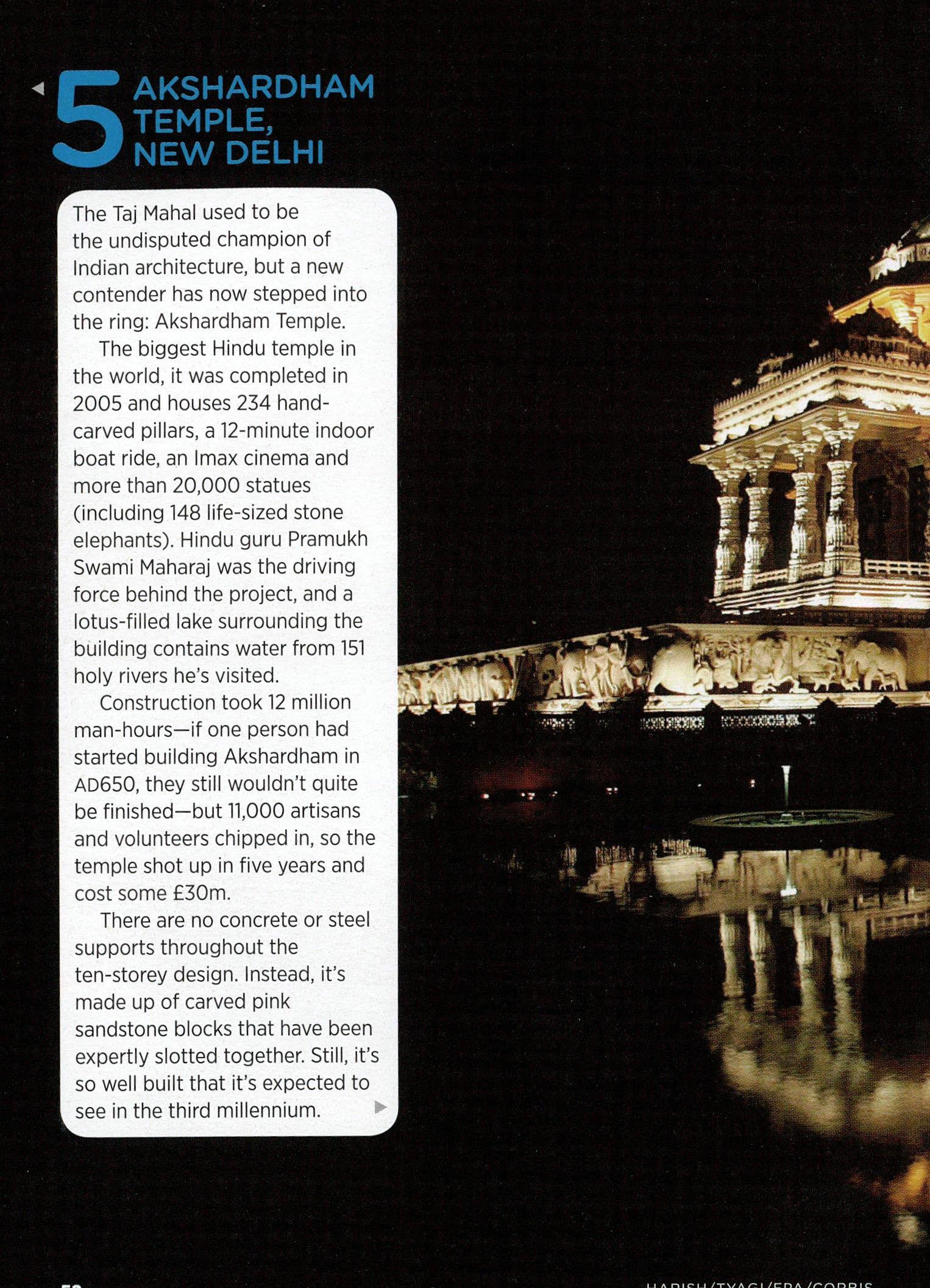
The Taj Mahal used to be the undisputed champion of Indian architecture, but a new contender has now stepped into the ring: Akshardham Temple.
The biggest Hindu temple in the world, it was completed in 2005 and houses 234 handcarved pillars, a 12-minute indoor boat ride, an 'max cinema and more than 20,000 statues (including 148 life-sized stone elephants). Hindu guru Pramukh Swami Maharaj was the driving force behind the project, and a lotus-filled lake surrounding the building contains water from 151 holy rivers he's visited.
Construction took 12 million man-hours—if one person had started building Akshardham in AD650, they still wouldn't quite be finished—but 11,000 artisans and volunteers chipped in, so the temple shot up in five years and cost some £30m.
There are no concrete or steel supports throughout the ten-storey design. Instead, it's made up of carved pink sandstone blocks that have been expertly slotted together. Still, it's so well built that it's expected to see in the third millennium.
T.? .021,Mrst

10-0"110,
r . -
•
•6THE DARVA7 GAS CRATER, IntemPNicl"
°
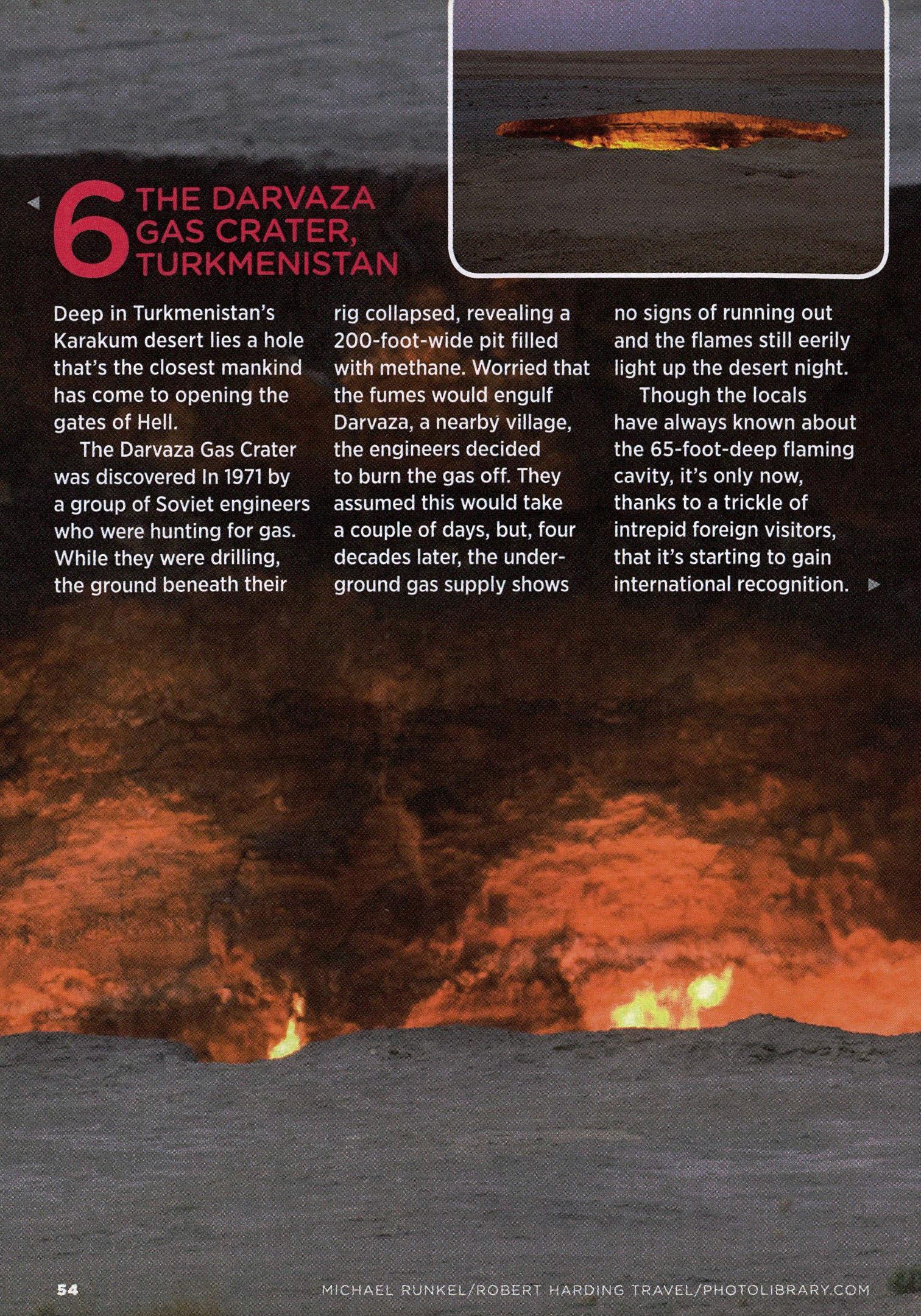
Deep in Turkmenistan's Karakum desert lies a hole that's the closest mankind has come to opening the gates of Hell.
The Darvaza Gas Crater was discovered In 1971 by a group of Soviet engineers who were hunting for gas. While they were drilling, the ground beneath their
rig collapsed, revealing a 200-foot-wide pit filled with methane. Worried that the fumes would engulf Darvaza, a nearby village, the engineers decided to burn the gas off. They assumed this would take a couple of days, but, four decades later, the underground gas supply shows
no signs of running out and the flames still eerily light up the desert night. Though the locals have always known about the 65-foot-deep flaming cavity, it's only now, thanks to a trickle of intrepid foreign visitors, that it's starting to gain international recognition.
54 MICHAEL RUNKEL/ROBERT. HARDING TRAVEL/PHOTOLIBRARY.COM

(INSET) IMAGE SOURCE/PROTOLIBRA
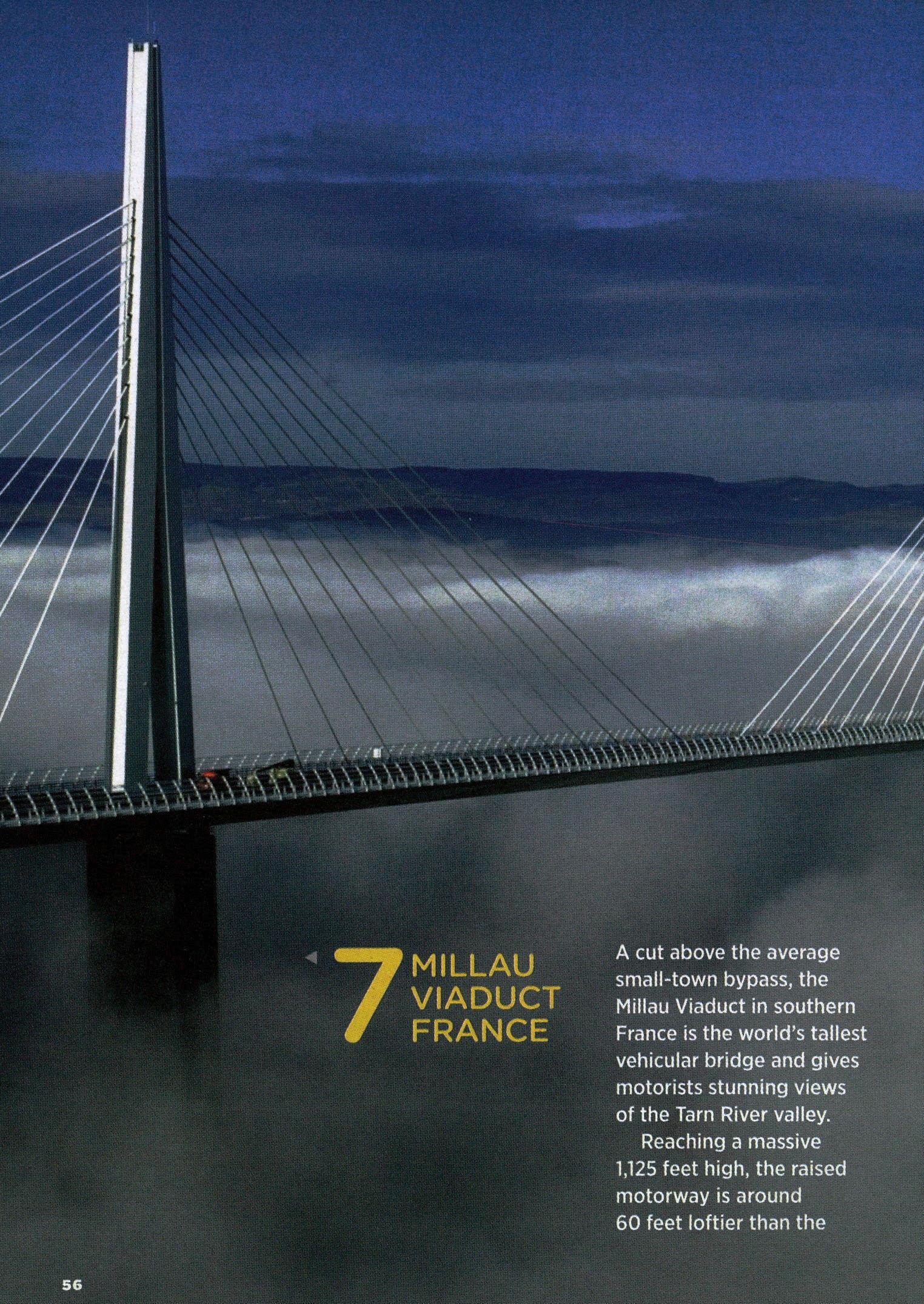
A cut above the average small-town bypass, the Millau Viaduct in southern France is the world's tallest vehicular bridge and gives motorists stunning views of the Tarn River valley. Reaching a massive 1,125 feet high, the raised motorway is around 60 feet loftier than the
Eiffel Tower, more than a mile and a half long and often sits above the clouds. After 14 years of planning, construction began in 2001, under the guidance of British architect Lord Norman Foster, and was finished three years later.
You might ask how a concrete structure that

slashes across unspoilt countryside can be classified as a "wonder", but the alternative was far less appealing. Before the bridge was completed, there was a phenomenon known as "The Millau Bottleneck": a notorious traffic hot spot where angry holidaymakers—
» What are your favourite 21st-century wonders? Let us know at readersletters a readersdigest.co.uk.
following a route that stretches from Paris to the Mediterranean—would stew in their cars in the crammed town for up to four hours.
Not only is the viaduct beautiful, but it also came in at just C300m—half its estimated cost. A modern wonder indeed. ■
57
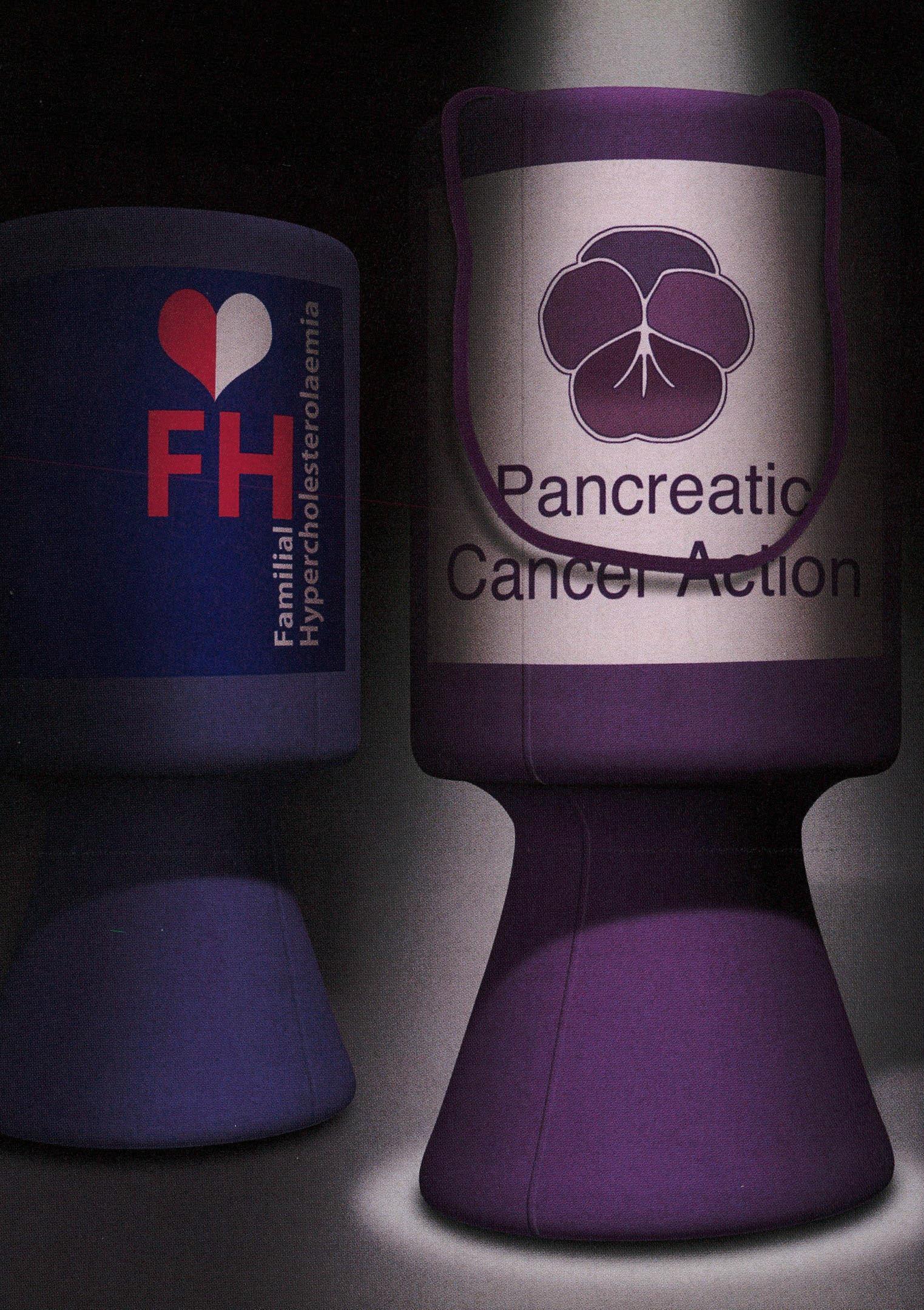

ATTENTION, PLEASE!
Some illnesses receive a lot of attention—and money. But many of those not in the spotlight affect huge numbers of people. So why, asks Elizabeth Adlam, are they so neglected?
There are some diseases that just seem to get pushed to the bottom of the heap—the kind you might not even notice until you know someone who's been affected.
Sometimes, it's because the illness isn't that common and just doesn't register on the radar. Sometimes, it's because you think of it pretty much as a death sentence, so push it to the back of your mind. Or sometimes it's because you hear about it a lot, but see it as a threat to later years— and hope it won't happen to you when you get there.
But many of these "Cinderella" conditions deserve more attention, especially when greater awareness can have a significant effect on treating them successfully.
ILLUS TRATED BY S TEVE C APLIN
► 59
Pancreatic cancer
Cancer of the pancreas— the gland that produces the hormone insulin as well as enzymes that help to digest food—is notoriously hard to diagnose, as 45-year-old All Stunt from Haslemere, Surrey, can testify. Four years ago, this healthy, trim, non-smoker developed severe and recurrent upper abdominal and back pain, which doctors put down to irritable bowel syndrome or dyspepsia. But after Ali ended up in A&E, a scan revealed a tumour in her pancreas. Yet just a month earlier, All had no symptoms.
Who's at risk? Pancreatic cancer is indiscriminate, but smoking increases risk (20 per cent of cases are caused by it), as can a family history of the disease. The majority of those diagnosed are over 60, and it's uncommon below 40 (Apple founder Steve Jobs was 49 when he announced he was suffering from it). Symptoms can be vague—unexplained weight loss, jaundice or abdominal pain, for example.
Why is it neglected? It's very often not diagnosed until it's spread, and is one of the most difficult types of cancer to treat. Optimum outcome depends on early diagnosis, but as yet there's no reliable diagnostic test for people at average risk of the disease. Such a test needs to be simple and cheap—last year's total spend on pancreatic cancer, estimated by the National

Ali Stunt was diagnosed with pancreatic cancer at 41, despite having no symptoms a month earlier
Pancreatic cancer is one of the most difficult types to treat. As yet, there's no reliable diagnostic test for those at risk
60 READERSDIGEST.CO.UK JULY 2011
Cancer Research Institute, was a mere 0.7 per cent of total cancer-research expenditure.
The treatment Pancreatic cancer is often diagnosed too late for surgery. Only ten per cent are eligible for an operation, but survival rates increase dramatically for those who have one. Ali Stunt was just in time—her cancer hadn't spread and only one lymph gland was affected. In September 2007, she had a five-hour operation to remove the tumour along with 80 per cent of her pancreas and spleen, followed by six months of chemo-radiotherapy. Since completion of the treatment, all follow-up CT scans and blood tests have continued to show no evidence of the disease. "I felt relief and elation rolled into one," she says. "Now I just have to wait it out."
The good newsA new study by scientists at Johns Hopkins Medical Institutions in Baltimore has found that pancreatic cancer develops and spreads much more slowly than scientists thought. "There's potentially a very broad window for screening," says Dr Christine Iacobuzio-Donahoe, one of the study's authors, which some estimates put at up to a decade. If this is true, says Dr Laura Bell of Cancer Research UK, there's "a chance to detect pancreatic cancer at an earlier stage when treatment might be more successful". A trial of an experimental vaccine aimed at boosting the immune system is also currently underway in some UK hospitals. The goal is now to develop a screening method similar to those used for breast and colon cancer. 1,
CELEBRITY SUFFERERS
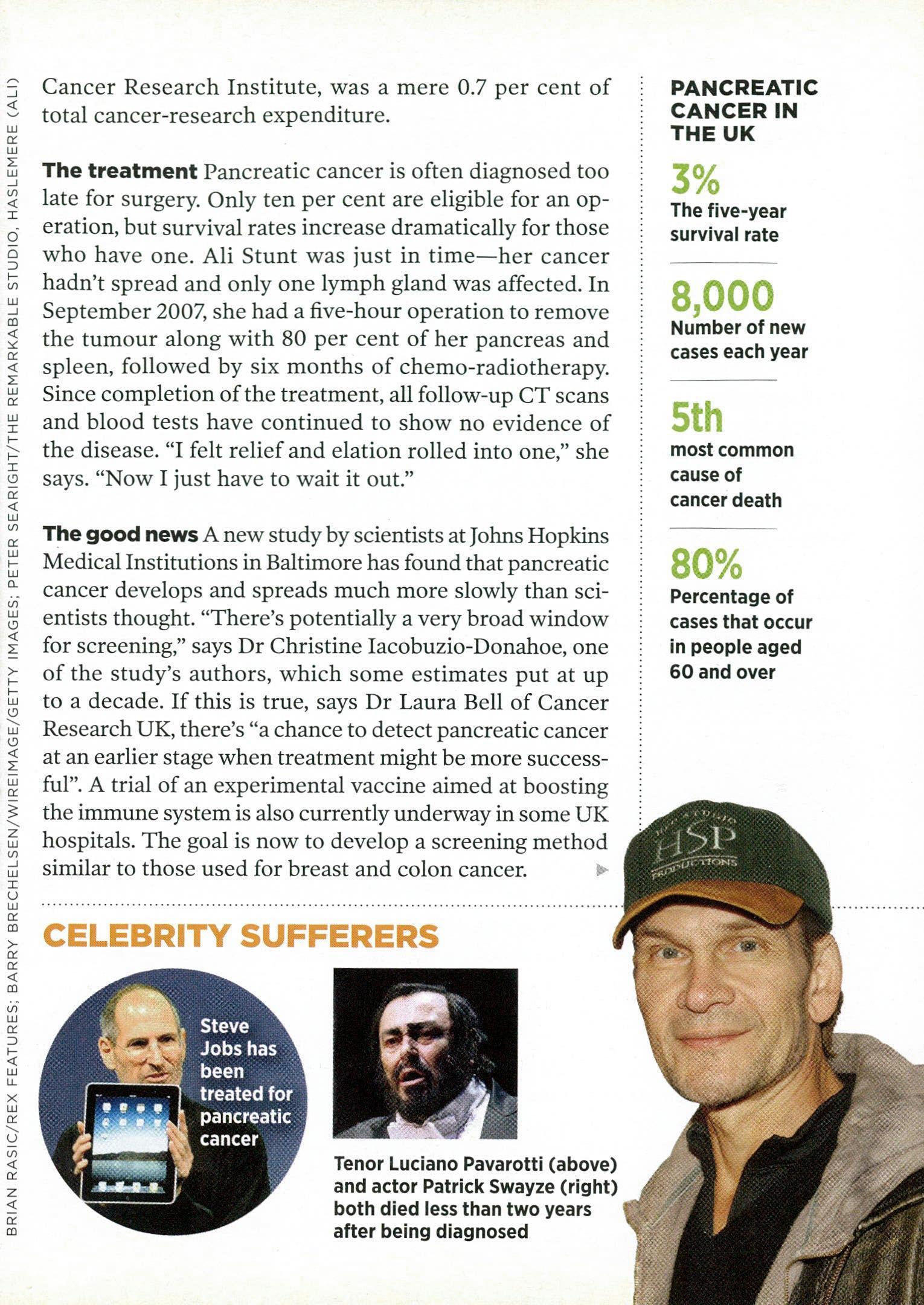
PANCREATIC CANCER IN THE UK
The five-year survival rate
8,000
Number of new cases each year
5th most common cause of cancer death
80%
Percentage of cases that occur in people aged 60 and over
FEATURES: BARRY BRECHEL SEN/ WIREIMAGE/ GETTY IMAGES; PETER SEARI GHT/ THE RE MARK ABLE ST UDIO, HAS LEMER E ( AL I) BRIAN RAS IC/R E Steve Jobs has been treated for pancreatic cancer
Tenor Luciano Pavarotti (above) and actor Patrick Swayze (right) both died less than two years after being diagnosed
Familial hypercholesterolaemia (FH)
FH is an inherited condition involving high levels of cholesterol in the blood from birth and, consequently, high risk of premature heart disease. "It affects one in 500—about as common as Type 1 diabetes," says Steve Humphries, British Heart Foundation professor of cardiovascular genetics at University College London. "But FH doesn't produce symptoms until your arteries are so furred up that you have a heart attack."
This is exactly what happened to Martin Keighley of Tarporley, Cheshire, when he was only 33. "One minute I was jogging down the high street," he says. "The next I woke up in a hospital bed. Later, someone told me they saw me stop, sit on a wall, then keel over."
Who's at risk?Siblings and children of someone with FH have a 50 per cent risk of developing the disease. Symptoms include high cholesterol in the blood. Outward signs are a ring of white cholesterol deposits around the iris (in old age only), white patches under the eye and lumpy deposits on the Achilles tendon or knuckles.
Why is it neglected? It's vital that FH patients are identified early. But 2008 National Institute for Health and Clinical Excellence (NICE) guidelines that recommend DNA screening of all firstdegree relatives of known FH patients—which would pick up a further 30,000 —are not being implemented. "This is shocking, when we know this works and is clinically effective and cost-effective," says Professor Humphries.
"Before the advent of statins, the rate at which FH patients were dying was as much as 30 times higher than the general population"
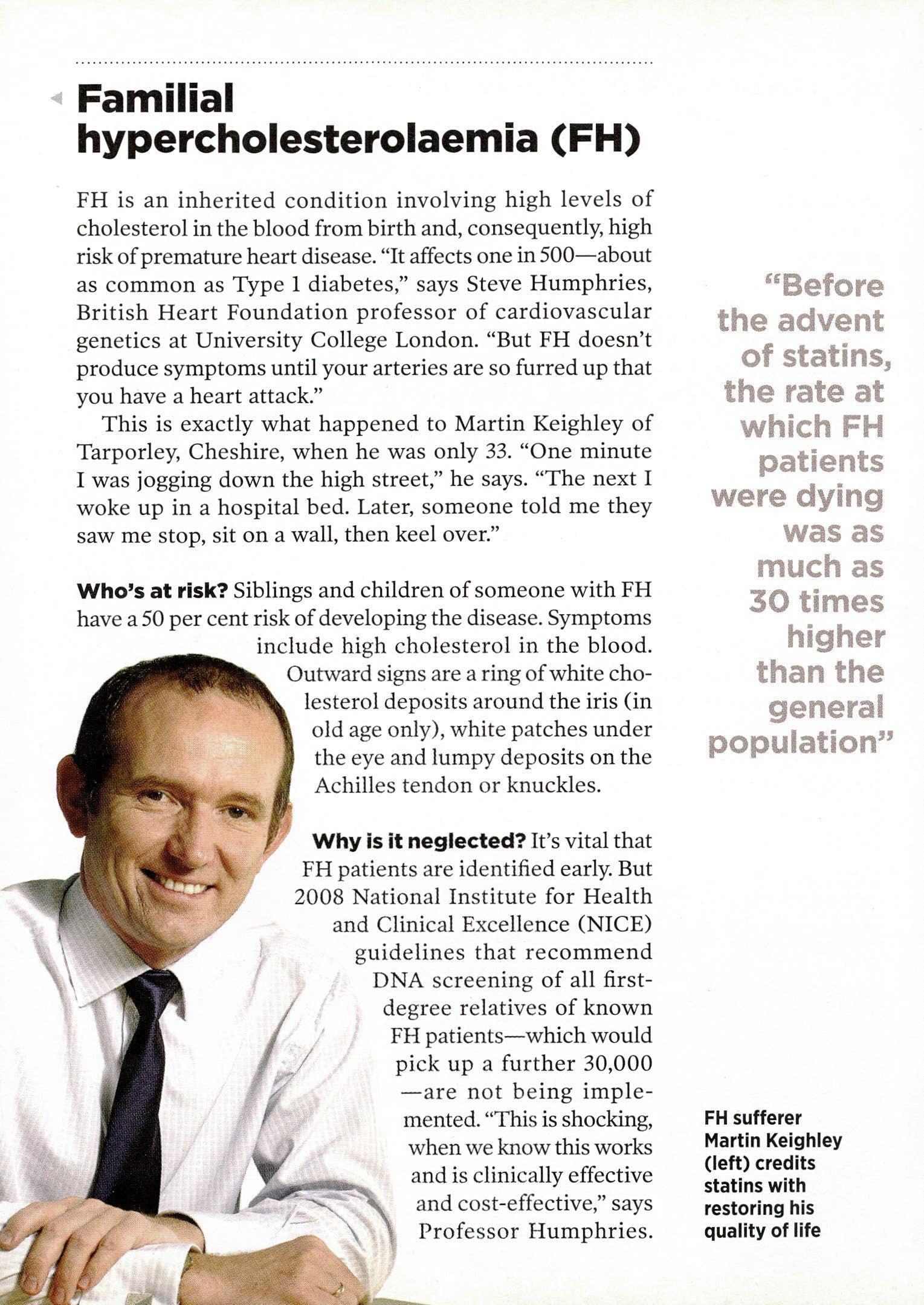
FH sufferer Martin Keighley (left) credits statins with restoring his quality of life
"The problem is, it will only save money in the long term by stopping people having heart attacks five years down the line. But you have to spend the money now."
The treatment Powerful statins lower cholesterol effectively for FH patients. Martin Keighley attributes his survival and continued quality of life to statins, plus the newer cholesterol-absorbing drug Ezetimibe—about 30 per cent of FH patients take this combination. "One problem is that doctors often prescribe simvastatin—the cheap statinbut it doesn't lower cholesterol anywhere near enough," says Humphries. "The expensive ones—atorvastatin and rosuvastatin—are much more effective."
The good news "Once an FH patient has been found, treated and advised, life expectancy is not significantly reduced at all," says Professor Humphries. "That's a really positive message when you think that, before statins, the rate at which FH patients were dying was as much as 30 times higher than the general population." And there are now at least some screening programmes in place: last December, a pilot programme was launched in Wales. 0.
FH IN THE UK
1 in 500
Proportion of people affected by FH
120,000
Estimated number of FH sufferers
20,000
Number of people actually diagnosed with FH
50%
Percentage of men with FH who will have a heart attack by 60. It drops to 30% for women
THE HEALTH SECRETS BEHIND A MASTERPIECE

Dr Leiv Ose from Norway has suggested that Lisa del Giocondo, the subject of Leonardo da Vinci's Mona Lisa, may have suffered from FH (see the telltale lumps on her hand and near her eye)
JULY 2011 READERSDIGEST.CO.UK 63
Dementia
Gradual, progressive loss of mental ability, dementia is caused by various diseases of the brain, resulting in loss of memory, mood changes and confusion. Alzheimer's disease is the most common form: "plaques" and "tangles" develop in the structure of the brain, leading to the death of brain cells. People with Alzheimer's also have a shortage of important chemicals involved with the transmission of messages—alarm bells rang for London cab driver Eric Croton when he began to forget familiar routes. The second most common is vascular dementia, typified by problems in the supply of blood to the brain.
Who's at risk? Only two per cent of 65- to 70-year-olds have some form of dementia, compared to one in five overeighties (Croton was 76 when he started having problems). There's also a possible genetic risk—certain genes have been shown to have an impact on Alzheimer's and vascular dementia, for example. Specific medical conditions that increase the risk include multiple sclerosis, Huntington's disease, Down's syndrome and HIV. Severe or repeated head injuries can quadruple risk, while unhealthy diet, lack of exercise, smoking and excessive alcohol consumption are lifestyle factors.
"GRADUAL, PROGRESSIVE LOSS"
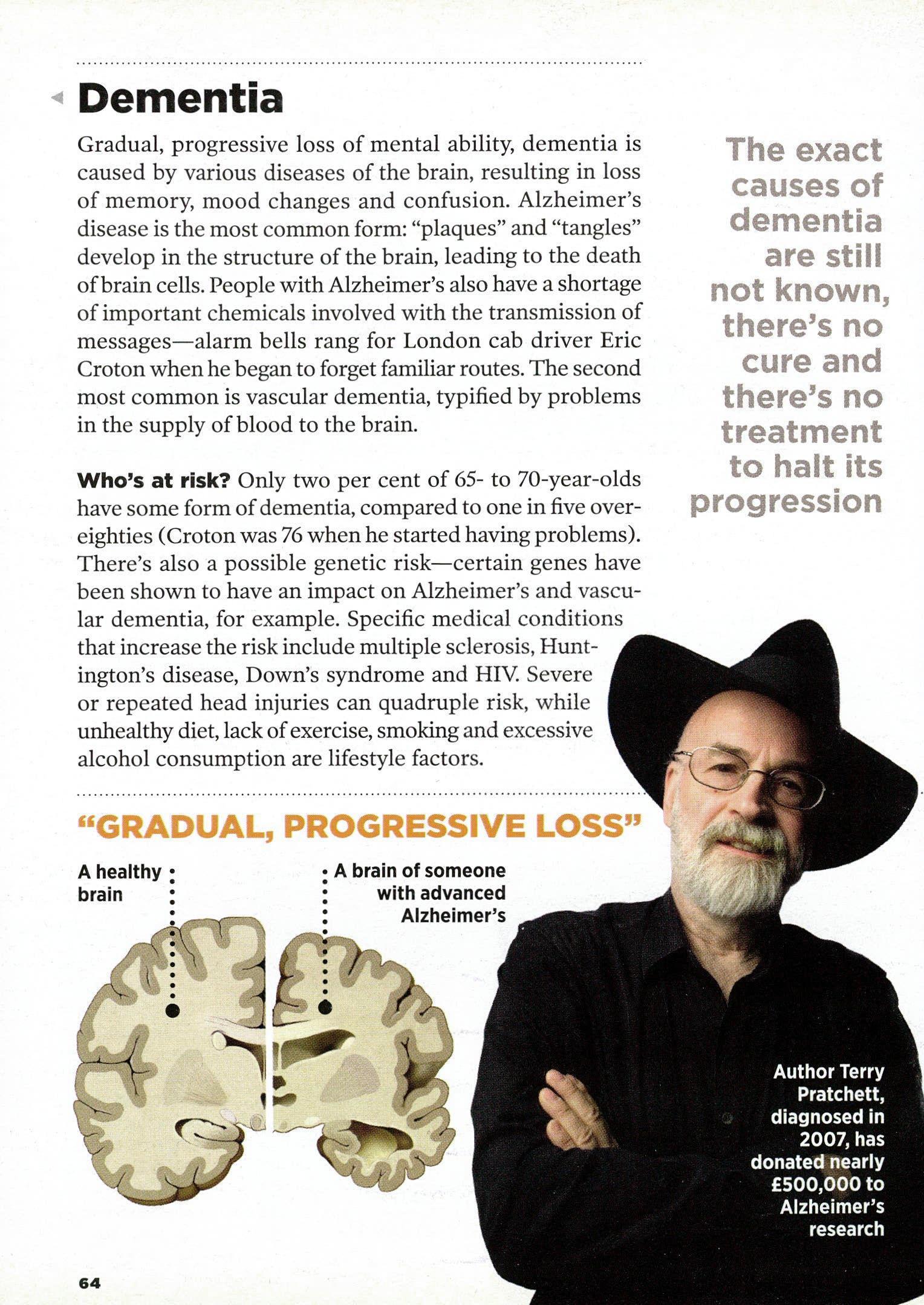
The exact causes of dementia are still not known, there's no cure and there's no treatment to halt its progression
A healthy brain
A brain of someone with advanced Alzheimer's
64
Author Terry Pratchett, diagnosed in 2007, has donated nearly £500,000 to Alzheimer's research
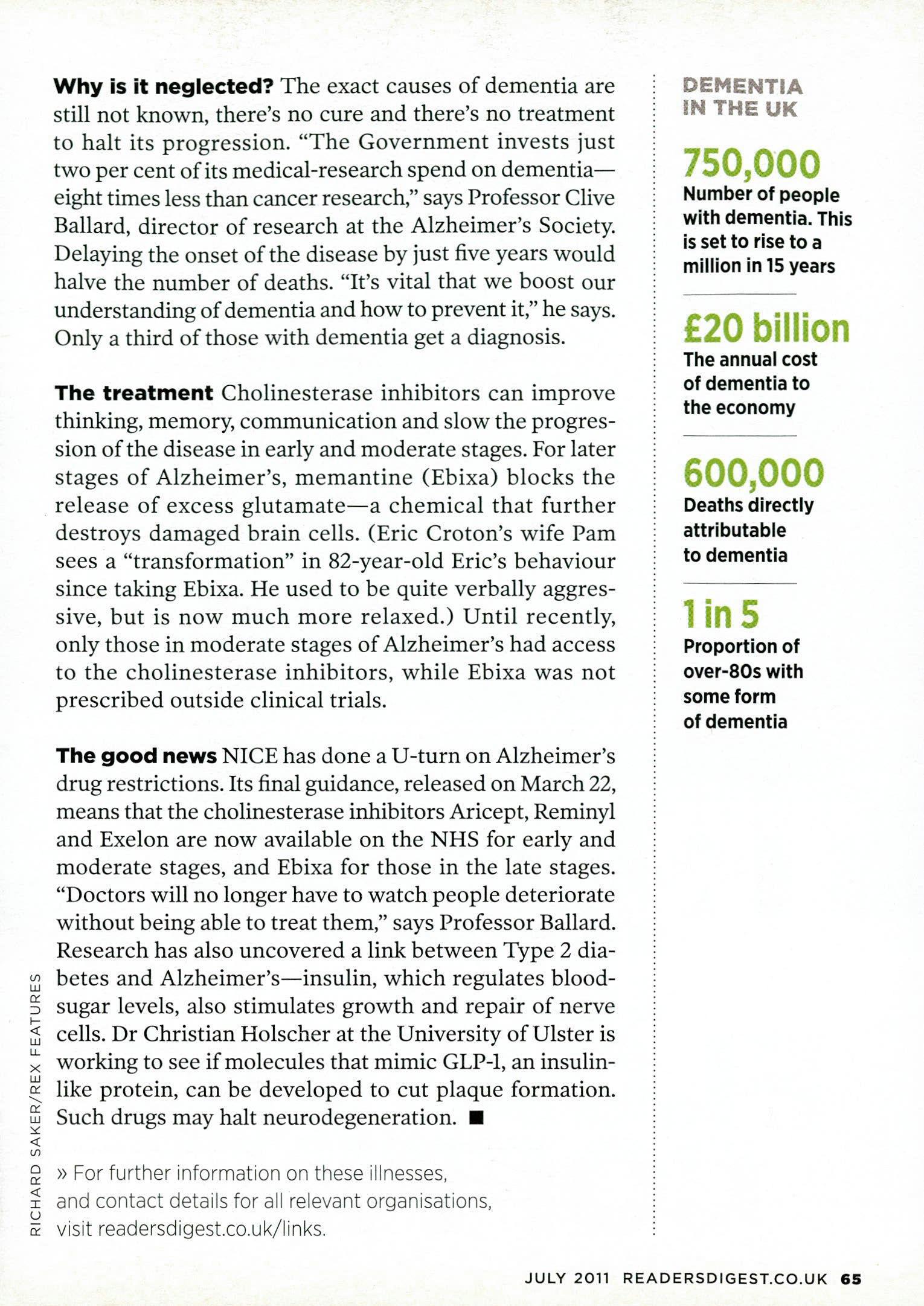
Why is it neglected? The exact causes of dementia are still not known, there's no cure and there's no treatment to halt its progression. "The Government invests just two per cent of its medical-research spend on dementia— eight times less than cancer research," says Professor Clive Ballard, director of research at the Alzheimer's Society. Delaying the onset of the disease by just five years would halve the number of deaths. "It's vital that we boost our understanding of dementia and how to prevent it," he says. Only a third of those with dementia get a diagnosis.
The treatment Cholinesterase inhibitors can improve thinking, memory, communication and slow the progression of the disease in early and moderate stages. For later stages of Alzheimer's, memantine (Ebixa) blocks the release of excess glutamate—a chemical that further destroys damaged brain cells. (Eric Croton's wife Pam sees a "transformation" in 82-year-old Eric's behaviour since taking Ebixa. He used to be quite verbally aggressive, but is now much more relaxed.) Until recently, only those in moderate stages of Alzheimer's had access to the cholinesterase inhibitors, while Ebixa was not prescribed outside clinical trials.
The good news NICE has done a U-turn on Alzheimer's drug restrictions. Its final guidance, released on March 22, means that the cholinesterase inhibitors Aricept, Reminyl and Exelon are now available on the NHS for early and moderate stages, and Ebixa for those in the late stages. "Doctors will no longer have to watch people deteriorate without being able to treat them," says Professor Ballard. Research has also uncovered a link between Type 2 diabetes and Alzheimer's—insulin, which regulates bloodsugar levels, also stimulates growth and repair of nerve cells. Dr Christian Holscher at the University of Ulster is working to see if molecules that mimic GLP-1, an insulinlike protein, can be developed to cut plaque formation. Such drugs may halt neurodegeneration. ■
» For further information on these illnesses, and contact details for all relevant organisations, visit readersdigest.co.uk/links.
DEMENTIA IN THE UK
750,000
Number of people with dementia. This is set to rise to a million in 15 years £20 billion
The annual cost of dementia to the economy
600,000 Deaths directly attributable to dementia 1 in 5
Proportion of over-80s with some form of dementia
RIC HARD SAKER/ REX FEATURES
JULY 2011 READERSDIGEST.CO.UK 65
Alone on a sinking boat, John Broadhead had to use his hand to try to plug the hole. Then his problems really started...
By John Dyson

IN A FLOATING COFFIN
66

"What's this for, Dad?" Lee Broadhead asked, picking up his father's new yellow diving torch. "Are we sailing a boat or a submarine?"
John Broadhead, 60, smiled at the 20-year-old's jibes. On April 30 this year the pair were happily preparing John's yacht Penny Diamond to sail from its moorings close to his home on the River Conwy, north Wales, to the Isle of Man, where they were competing in the annual IOMA Round the Island Race the next day. "And what's this, you old fool?" Lee, a navy mine specialist, asked, pointing at the waterproof radio with a red emergency button that his father had looped around his neck.
DAVE KNEALE PHOTOGRAPHY JULY 2011 READERSDIGEST.CO.UK 67
John (right) and son Lee in action on the Penny Diamond in this year's Round the IslandRace
4
"Listen, lad," John replied. "In this business, you have to be ready for anything—remember that night a couple of years ago..."
John always talked to his boat. On April 9, 2009, he had a lot to say to Penny Diamond as she was lowered into the sea at Glasson Dock, near Lancaster—where he kept her over the winter—for the first sail of the season.
"You're a lovely girl," he said. "I've given you new sails, a new propellorshaft coupling and new blue paint on your bottom. We're going to have a great sail home, so let's get going."
The sleek 27-footer slid neatly into the water. John, a burly figure in a yellow coat with a life jacket clipped around his big shoulders, climbed on
nine, he and John had sailed around Britain and, a year later, across the Bay of Biscay to Spain.
A semi-retired electrician, John had owned Penny Diamond for four years. He loved her and, though he'd once sold her to get a bigger craft, he'd missed her so much he'd swiftly had to buy her back again.
The first few hours of the trip passed without incident and, by late afternoon, John and his yacht had passed Blackpool and were heading for a distant gas platform—its flame lighting their way as the sun dipped lower. Sitting on the cabin roof while the boat steered herself, John spent the next few hours peacefully strumming his guitar and singing—something he particularly enjoyed at sea where there
To his horror, he found himself stand the stuff were spurting in around the
board and steered her out into the water. It was noon, and he reckoned that the 65-mile trip down the northwest coast of England to the boat's Welsh mooring would take him until midnight.
John found sailing one of life's last great freedoms. Though raised in Bradford, he'd bought his first dinghy aged just 15, and family holidays with his wife Joanna and two sons were spent at sea.
When his first son, Jack, was
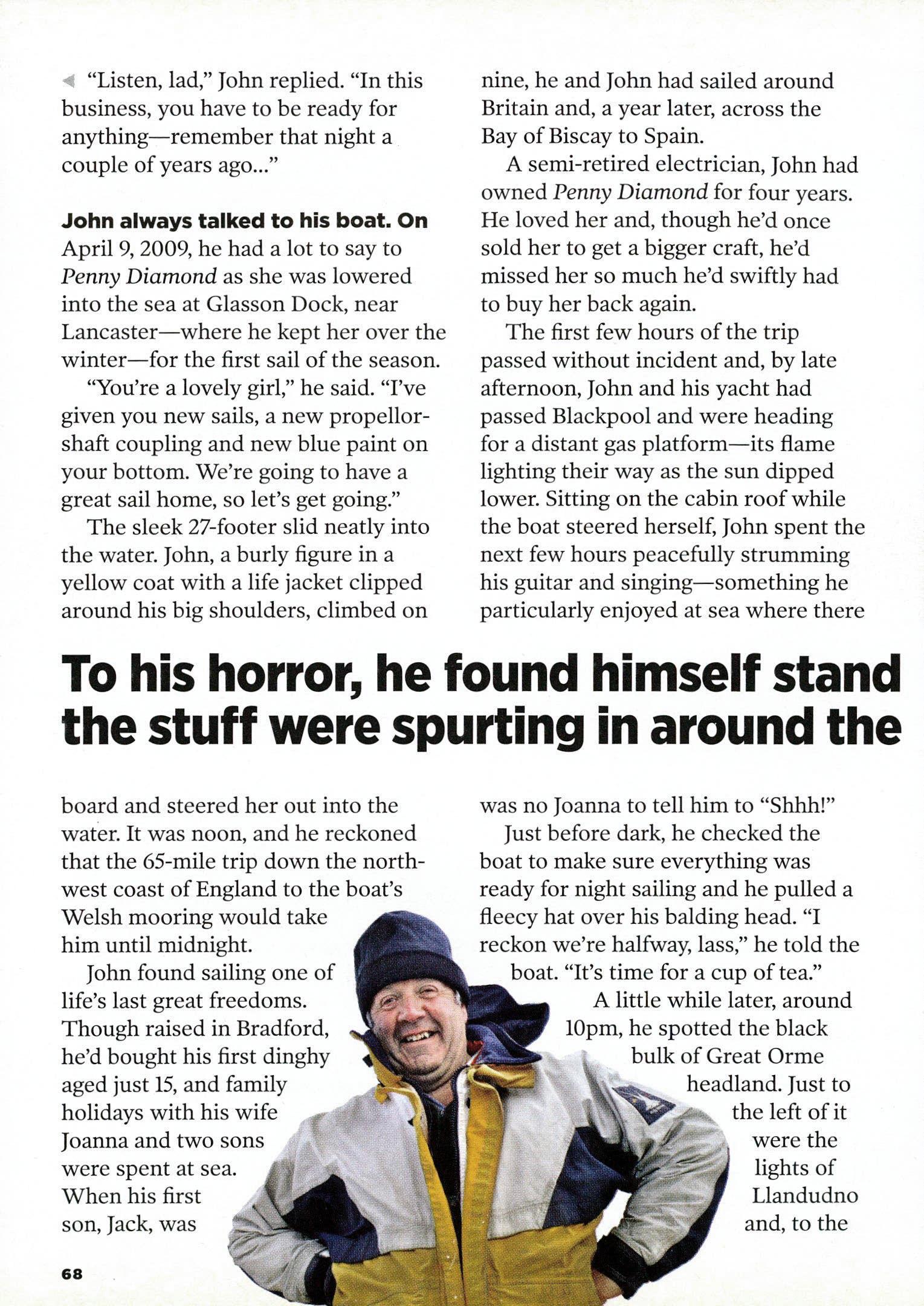
was no Joanna to tell him to "Shhh!"
Just before dark, he checked the boat to make sure everything was ready for night sailing and he pulled a fleecy hat over his balding head. "I reckon we're halfway, lass," he told the boat. "It's time for a cup of tea."
A little while later, around 10pm, he spotted the black bulk of Great Orme headland. Just to the left of it were the lights of Llandudno and, to the
68
The tombshaped cockpit locker where John was trapped

ing in six inches of water. Jets of door and the cabin was filling up fast
right, about five miles round the coast, was the mouth of the Conwy. "Soon be home," he told Penny Diamond.
Suddenly, a shrill beeping sounded—the automatic-steering pilot's alarm. That's strange, thought John and slid down a hatch from the deck into the cabin.
To his horror, he found himself standing in six inches of water. Jets of the stuff were spurting in around the door to the engine compartment, and the cabin was filling up fast.
John grabbed a torch from the chart table and made his way towards the
back of the boat. He shone his light into Penny Diamond's wake. Good God!
The propellor shaft had detached itself from the engine and slid out into the water, leaving a one-inch hole in the hull with nothing to stop the sea pouring in. The new coupling must have come loose, John realised. The shaft had also jammed into the rudder, which would make steering Penny Diamond slow and difficult—particularly with the engine out of action.
John's mind raced. He had a nasty sinking feeling in his gut. What do I do? He threw back the lid of the big
-r
PHO TOG RAPHED BY JOHN DYSON
JULY 2011 READERSDIGEST.CO.UK 69
cockpit locker. It went down to the bottom of the boat and, if he climbed into it, he might be able to reach the hole where the driveshaft had been— but it was filled with sailing gear. Frantically, he dragged out ropes, mooring fenders and spare sails. By the light of his torch he saw knee-high water sloshing back and forth in the hull. He lowered his
17-stone bulk in the chest-deep locker. Lying in the water on his side, his upturned face barely above the surface, he reached along the bottom of the boat. His fingers felt the stream of water pouring in. He tried to stretch for the source of the leak, but his arms weren't long enough. He adjusted his position and tried again. He strained every muscle and, with a last grunt of effort, his hand found the hole. He
NOT WAVING, BUT DROWNING
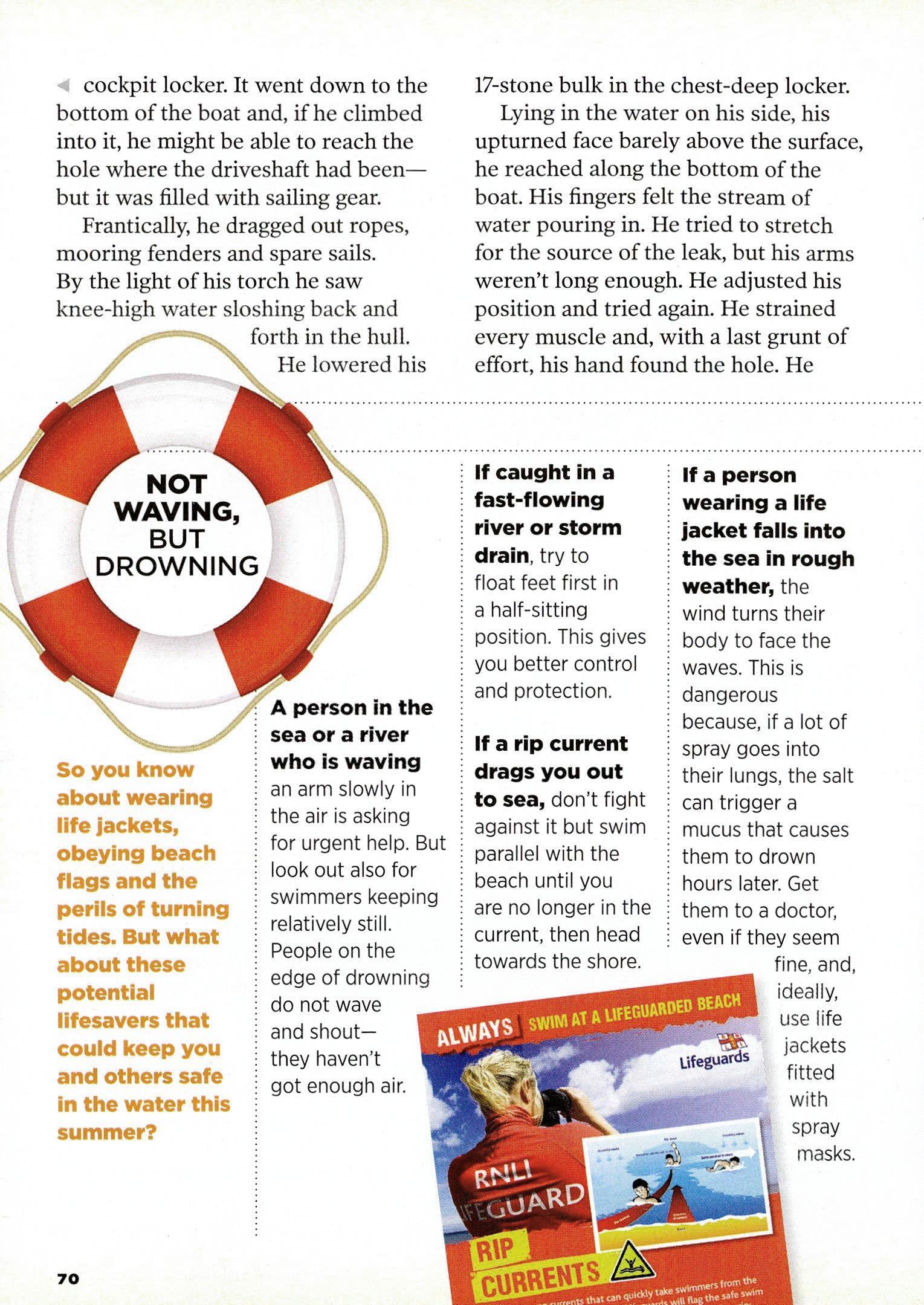
So you know about wearing life jackets, obeying beat.. flags and the perils of turning tides. But what about these potential lifesavers that could keep you and others safe in the water this summer?
A person in the sea or a river who is waving an arm slowly in the air is asking for urgent help. But look out also for swimmers keeping relatively still. People on the edge of drowning do not wave and shout— they haven't got enough air.
If caught in a fast-flowing river or storm drain, try to float feet first in a half-sitting position. This gives you better control and protection.
If a rip current drags you out to sea, don't fight against it but swim parallel with the beach until you are no longer in the current, then head towards the shore.
If a person wearing a life jacket falls into the sea in rough weather, the wind turns their body to face the waves. This is dangerous because, if a lot of spray goes into their lungs, the salt can trigger a mucus that causes them to drown hours later. Get them to a doctor, even if they seem fine, and, ideally, use life jackets fitted with spray masks.
70
pushed his fingers in to stem the flow. He knew he couldn't keep the sea out like this for long. The constant stretching was agony and, every time he moved his arm, the water rushed in again. Then things got a lot worse. With nobody steering, the boat had been sailing herself in circles. Now the wind caught the sail and threw it sideways. The boat lurched, and the lid of the locker slammed shut. John got
such a fright, he dropped the torch into the water and it went out.
Wriggling painfully in the tight space, he reached up and pushed on the bottom of the lid. It didn't move. The latch had locked itself and couldn't be opened from the inside. The boat rocked madly from side to side, and the sea was washing up the sides of the pitch-black tomb where John was imprisoned. He'd
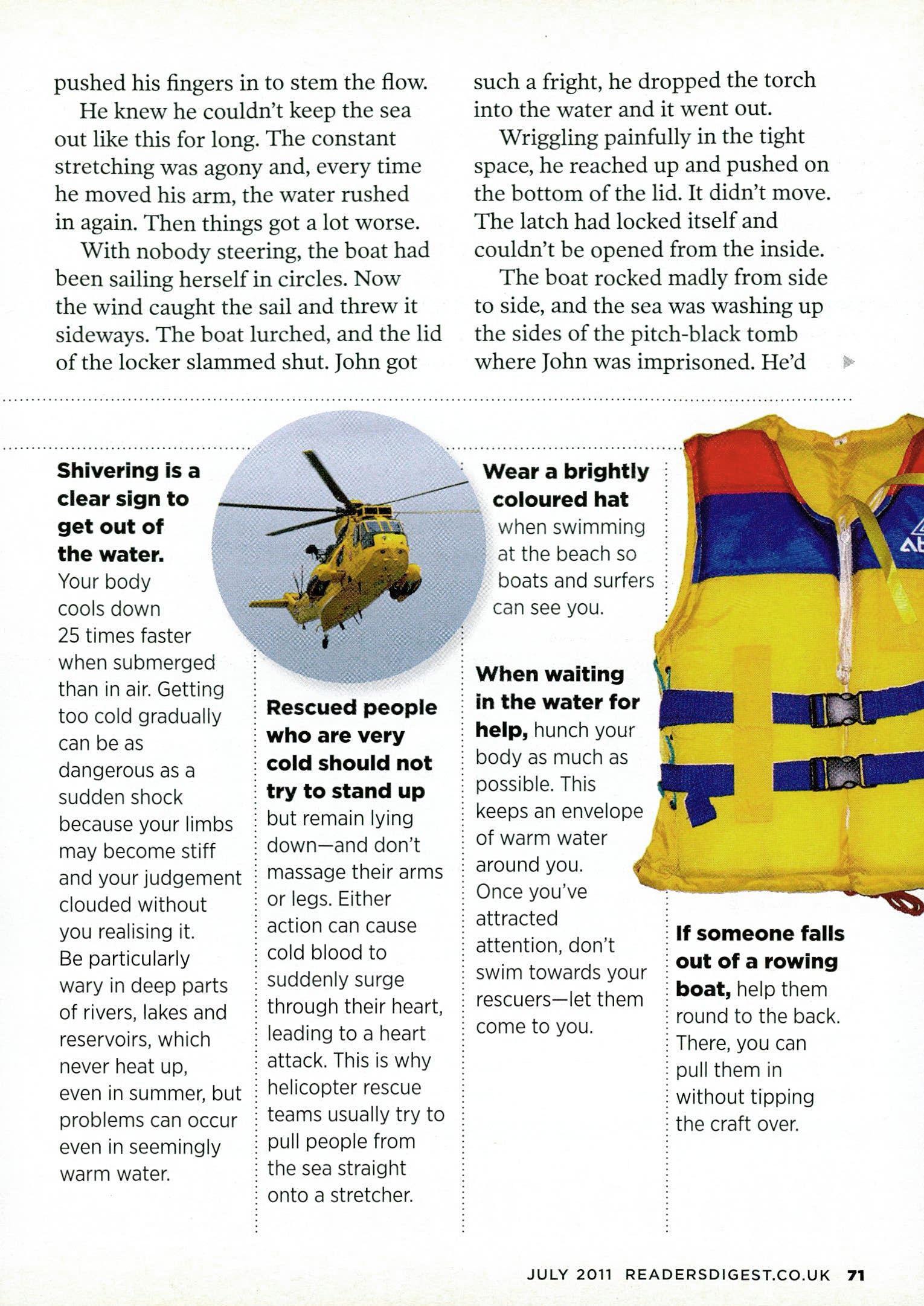
Shivering is a clear sign to get out of the water. Your body cools down 25 times faster when submerged than in air. Getting too cold gradually can be as dangerous as a sudden shock because your limbs may become stiff and your judgement clouded without you realising it. Be particularly wary in deep parts of rivers, lakes and reservoirs, which never heat up, even in summer, but problems can occur even in seemingly warm water.
Rescued people who are very cold should not try to stand up but remain lying down—and don't massage their arms or legs. Either action can cause cold blood to suddenly surge through their heart, leading to a heart attack. This is why helicopter rescue teams usually try to pull people from the sea straight onto a stretcher.
Wear a brightly coloured hat when swimming at the beach so boats and surfers can see you.
When waiting in the water for help, hunch your body as much as possible. This keeps an envelope of warm water around you. Once you've attracted attention, don't swim towards your rescuers—let them come to you. If someone falls out of a rowing boat, help them round to the back. There, you can pull them in without tipping the craft over.
JULY 2011 READERSDIGEST.CO.UK 71
been in there for five minutes and knew that, any moment now, the water would reach the loop in the toilet outlet pipe, filling and sinking the boat very quickly. Thoughts muddled his brain. I'm trapped. I can't get out. I can't let go. WHAT DO I DO?
Screwing up his eyes against the surge,John felt around the locker with his spare hand, hoping to find something to use to block the leak. Nothing. He put his hand to his head—then realised he had one last chance. Snatching off his fleece hat, he prodded it into the hole. The inrushing water forced it back out. He rolled it tighter, twisting it into a wedge, then pushed it deeper into

the hole. This time it held—but it was made of absorbent material, so he had no idea how long it would last out.
Rolling onto his back with his head and neck straining just out of the water, John drew both knees back to his chin and stamped upwards as hard as he could against the underside of the jammed lid. It didn't move.
He'd been trapped for around ten minutes, and the locker was filling up. Fear lending him strength, he tried again. All his weight went behind the kick, as if he were jumping off a wall.
The lid sprang upwards. In a flash, John was out of the locker, and breathing the sweet night air. He grabbed the handle of the bilge pump and frantically yanked it
HIGH QUALITY RISER RECLINERS
HALF PRICE*
Custom made to any size, any weight, any fabric 55°I0health sets •Family run business • 28 years manufacturing experience •Exceptional comfort • Factory direct so you pay less • Free home trial available • Matching sofas & chairs • Circulation enhancing • Lifetime warranty available Call us now for a free home trial or our full colour brochure 0800 917 0757 40, Selected lines only
backwards and forwards. Within a few minutes, the boat had emptied. But with no engine and the rudder jammed, reaching land before the hat gave way would be touch and go.
He adjusted the two sails to set a course, and hoped that the gentle following wind would guide him towards Llandudno. Shivering from the cold, but relieved to be sailing, he changed into warm clothes. Every few minutes he ducked down into the cabin to see if water was sloshing over the floor again. Amazingly, the cap seemed to be holding.
His makeshift steering technique worked and, though progress was painfully slow, he found himself heading for the river. At 3.30am
he rode the breeze into its mouth and landed on a shallow beach— as far as he could go against the tide. Penny Diamond was safe, barely half a mile from her usual mooring.
John breathed a huge sigh of relief, drank a large whisky and went to bed in the cabin. At dawn, he reattached the propellor shaft and motored home.
Lining up to start this year's Round the Island Race, John again had words with his boat. "You'd better do well or I'll have to sell you," he joked.
But Penny Diamond was on better form. Despite fierce squalls that forced most of the other boats to give up, she won her class in just under 13 hours. II

make your kitchen smile again
• Senior citizens discount
• 50% deposit balance on completion
• Less hassle, less time, less cost
From replacement doors to complete kitchens
10% OFF THIS MONTH
When you quote READERS DIGEST DREAM DOORS°' NEW LIFE FOR OLD KITCHENS Please call: 0800 822 3848 www.dreamdoors.co.uk illbrill A national network of (494 local showrooms , View our credentials at Cheekatrade.com Where reputation matters
•
DomJay
...GROWING UP IN BEIRUT AND
BEING ON EDGE a lot of the time. It was a war zone and I lived with the sound of constant shelling.
BEING SENT
OUT OF THE CLASSROOM and waiting in the corridor. There was a horrible teacher who used to wander around looking for children who'd committed misdemeanours. He'd smack you over the hand really hard with a ruler. Just as he hit me, the bell rang for break and all the classes rushed out to the
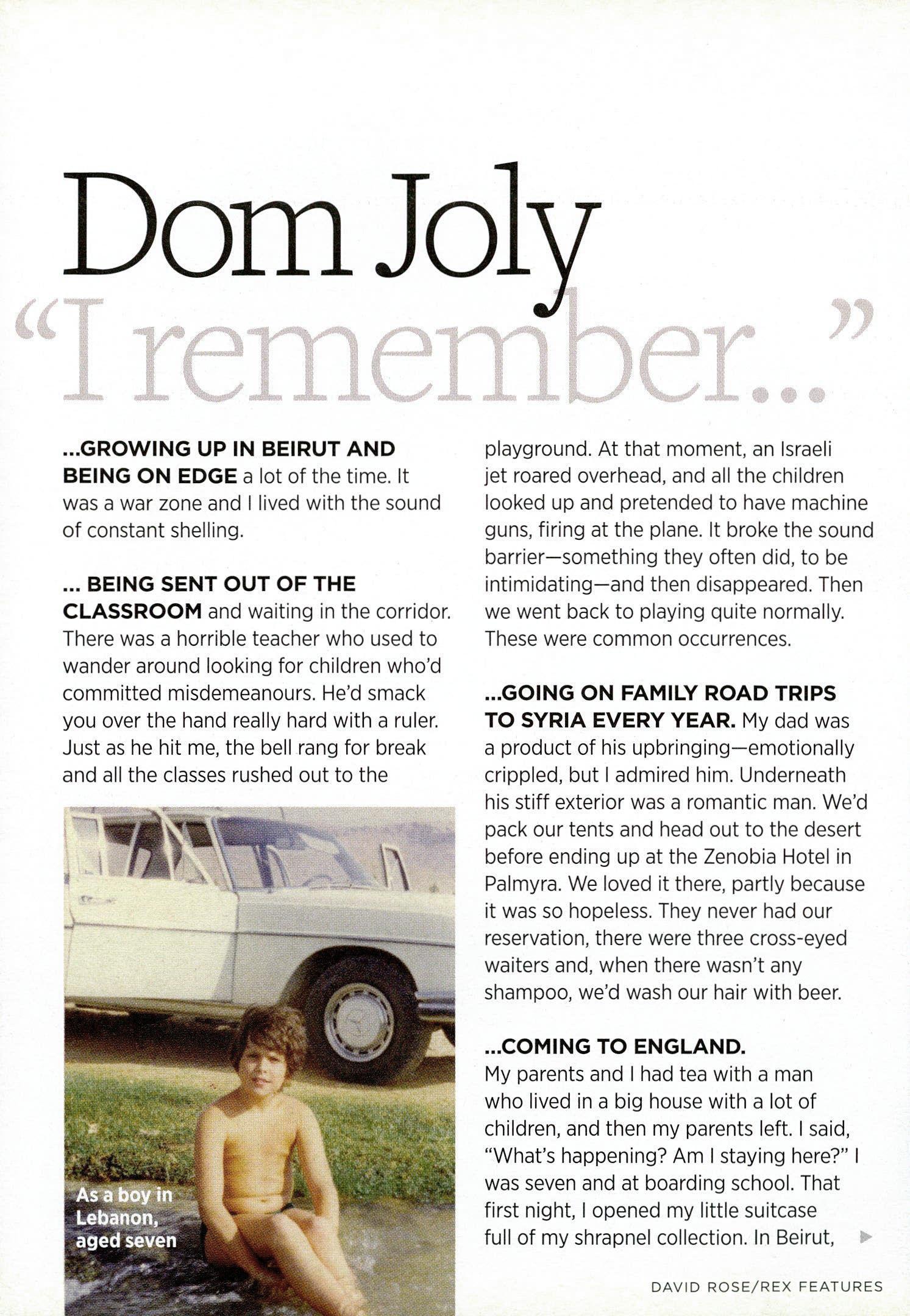
playground. At that moment, an Israeli jet roared overhead, and all the children looked up and pretended to have machine guns, firing at the plane. It broke the sound barrier—something they often did, to be intimidating—and then disappeared. Then we went back to playing quite normally. These were common occurrences.
...GOING ON FAMILY ROAD TRIPS TO SYRIA
EVERY YEAR. My dad was a product of his upbringing—emotionally crippled, but I admired him. Underneath his stiff exterior was a romantic man. We'd pack our tents and head out to the desert before ending up at the Zenobia Hotel in Palmyra. We loved it there, partly because it was so hopeless. They never had our reservation, there were three cross-eyed waiters and, when there wasn't any shampoo, we'd wash our hair with beer.
...COMING TO ENGLAND.
My parents and I had tea with a man who lived in a big house with a lot of children, and then my parents left. I said, "What's happening? Am I staying here?" I was seven and at boarding school. That first night, I opened my little suitcase full of my shrapnel collection. In Beirut,
DAVID ROSE/REX FEATURES

The sound of gunfire and shells didn't give us reason to pause in our conversation. We lived a strange life
we collected bits of shrapnel and bullets and swapped them as other kids might with marbles. But a teacher rushed in and confiscated it, saying I couldn't have explosives at school—and I was slippered.
...GOING BACK TO LEBANON FOR A TV PROGRAMME, MANY YEARS LATER. The producers thought it'd be interesting to visit my old school. It was set up by Quakers from Darlington in about 1870. We met the headmistress and I was introduced as a "famous old boy". She said, "We've a much more famous old boy than you—Osama Bin Laden." It turned out we'd been there for a year together, when I was six and he was 16. I think the school deny the association now—after all, he wasn't the best example of a Quaker education.
...SITTING AT OUR KITCHEN TABLE BACK HOME IN BEIRUT with a friend from school who'd come to visit during the holidays. The sound of gunfire and shells dropping didn't give us reason to pause in our conversation, but my friend just sat there shaking. It was then that I realised we lived a slightly strange life.
...THE BBC WORLD SERVICE BEING ON THE WHOLE TIME. My mum would have her radio in the garden, and there were others by the pool and in the house. It was always on in the car, too. I remember once in Syria driving to the top of a huge
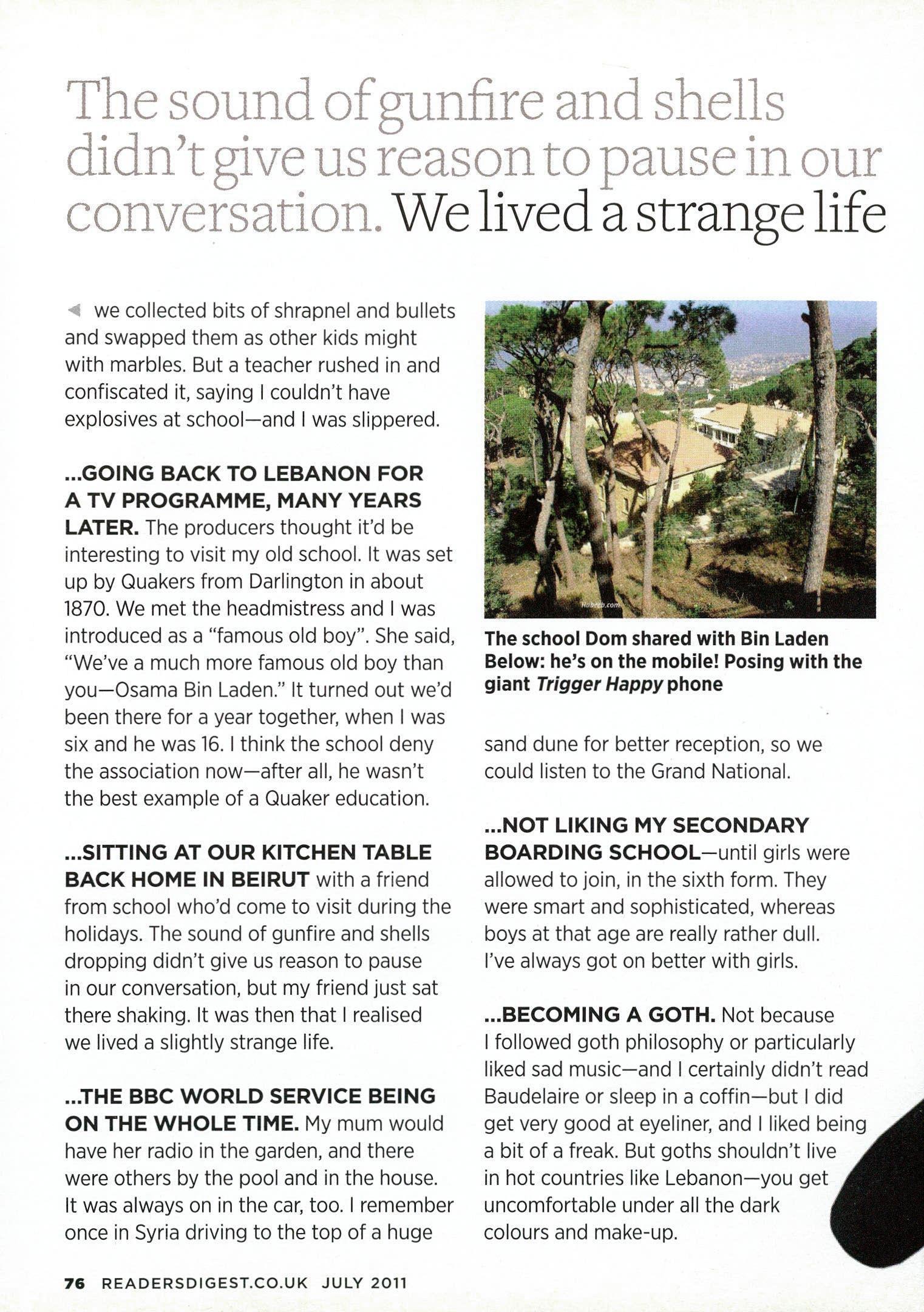
The school Dom shared with Bin Laden Below: he's on the mobile! Posing with the giant Trigger Happy phone
sand dune for better reception, so we could listen to the Grand National.
...NOT LIKING MY SECONDARY BOARDING SCHOOL—until girls were allowed to join, in the sixth form. They were smart and sophisticated, whereas boys at that age are really rather dull. I've always got on better with girls.
...BECOMING A GOTH. Not because I followed goth philosophy or particularly liked sad music—and I certainly didn't read Baudelaire or sleep in a coffin—but I did get very good at eyeliner, and I liked being a bit of a freak. But goths shouldn't live in hot countries like Lebanon—you get uncomfortable under all the dark colours and make-up.
76 READERSDIGEST.CO.UK JULY 2011
...THE SOUNDTRACK
TO A LIFE IN LEBANON WAS POLITICS. So after university, I became a diplotat in Prague and then worked for ITN. I was often sent to do boring interviews with politicians, so I started to make them a bit more interesting. Once, I was talking to Paddy Ashdown while a couple of my friends, dressed as clowns, had a fight behind us. ITN thought it was a bit peculiar that things always happened when I had the microphone, but it wasn't until David Mellor was hit on the head by a football that I got the sack. I like pointless humour. The sort of things about which my dad might say, "Why on earth would you want to do that?" are the things I find funniest.
By 16, Dom was a dab hand at applying eyeliner

...AFTER
THE SUCCESS OF
TRIGGER
HAPPY TV, I started to get incredible offers that hardly seemed like work. I did other TV programmes, began to write for newspapers and, best of all, do travel articles. Deep down, I'd always wanted to be a foreign correspondent.
...PRETENDING TO BE A PAPARAZZO FOR ITV SHOW DEADLINE, and getting punched in the face by Lily Allen. I got stamped on by Pierce Brosnan while he smiled for the cameras, and Pete Doherty
smashed a guitar over my head. I loved it.
...MY FIRST TRAVEL FEATURE was on finding the tallest redwood in California. As I drove north from San Francisco, I thought, This is what I've always wanted—to be on my own, travelling and writing.
...FEELING VERY PROUD OF MY
BOOK The Dark Tourist: Sightseeing in the World's Most Unlikely Holiday Destinations. It was published last year. If you can get somewhere by easyJet and find a Starbucks at the other end, I don't want to go there. I hate the homogenisation of the world.
_VISITING THE CHERNOBYL POWER
PLANT and Pripyat, the town next to it. There's been an exclusion zone in place since the disaster 25 years ago, but I found a guy willing to take me there. I had to pass through a weird machine called a dosimeter to test my exposure to radiation. But none of it made sense—why was I being tested on entering rather than on the way out? I also had to carry a Geiger counter, which bleeped non-stop— that was slightly disconcerting.
I felt a strange sense of déjà vu in Pripyat. It had once been a town of 50,000 people, but they were told to leave a couple of days after the Chernobyl accident, and had all received huge doses of radiation. Everything was left exactly as it had been; a snapshot of Soviet Russia frozen on that day. But I felt I knew the layout of the town, and it dawned on me that a computer game I'd played called
PERSONAL P HOTOG RAPHS COU RTESY OF DO M J OLY
JULY 2011 READERSDIGEST.CO.UK 77
Call of Duty 4 was set in Pripyat. So I kept showing my confused guide all the best sniper positions.
..VISITING THE INTERNATIONAL FRIENDSHIP EXHIBITION HALL
IN NORTH KOREA, a building housing official presents from other countries. Its purpose is to show the huge esteem in which North Korea is held by the rest of the world. It's mad. There's a rhino horn from Mugabe that looks as though it was ripped straight out of a rhino's head, and a huge alligator standing on its back legs, holding a drinks tray. North Korea is infamous for its oppressive regime. In the
The phrase Mel:Dana-111v has never been so apt

The man with capital, Pyongyang, Pol Pot's shoes. the brutalist Right, Dom in architecture with the celeb jungle its hideous concrete buildings is designed to make the individual insignificant. In the squares, during their lunch hours, workers dance in formation to the commands of their foremen's megaphones, while others cut the grass with scissors.
...I WAS APPROACHED BY A MAN IN CAMBODIA who asked if I wanted to see Pol Pot's shoes. After waiting a long time outside a house in the middle of nowhere, a little guy came out with a Brownie box camera and a pair of shoes. He turned out to be the photographer who'd taken the pictures of every one of the 17,000 people interned at Tuol Sleng prison prior to being tortured and executed; the terrified images of these people are on show at Tuol Sleng Genocide Museum in Phnom Penh. I left there pretty quickly.
...GETTING INTO THE COURTROOM to watch the war trial of the Khmer Rouge leader and prison chief, Comrade Duch. At first they wouldn't let me in because I was
78 READERSDIGEST.CO.UK JULY 2011
wearing shorts, so I had to bribe a policeman outside to lend me his trousers, and I showed my PADI Scuba Diving card as ID. The phrase "the banality of evil" has never been so apt—Duch committed so many terrible crimes but he looked like an ordinary, small man. At one point he stood up, caught my eye and smiled at me and, out of some strange social awkwardness, I found myself smiling back.
...LOVING BEING IN THE JUNGLE FOR I'M A CELEBRITY...GET ME OUT
OF HERE! I lost two and a half stone.

I rather liked being hungry all the time. The boredom was intense but it forced me to find some inner calm, as I'm normally really fidgety.
I think it's the closest I'm going to get to the hostage experience.
Now that I'm doing my first live tour, I get really nervous before going on stage. Some people want to see me in a huge squirrel costume, some to hear my extreme travel stories. I have an odd life. ■
As told to Caroline Hutton
» Dom Joly's stand-up show Welcome to Wherever I Am tours until July 31.
BUDDING AUTHORS, TAKE A BOW!
This tense tale from reader Martin Hughes is the second of the many 100-word stories submitted in our recent competition that just missed out on the big prizes, but which we felt deserved a wider audience.
The good citizen
He was disgusted. This was the type of behaviour that destroyed public order. The country had not fought two wars so that people could behave as they liked. There had to be points of reference. There had to be boundaries. No one around reacted. If others were not prepared to do so, then he would have to intervene. But he would have to be sure of his ground; establish the facts—and that meant getting nearer. He edged forward. Appearing casual; feeling purposeful. All was clear now and his proposed intervention was vindicated. She definitely had more than ten items. Submitted by Martin Hughes, Warrington, Cheshire
Martin says: / came up with the story having witnessed some friction in the selfservice queue in the supermarket. The incident got me thinking about perspective: what things are worth reacting to and what aren't. I think we can often get that wrong at an individual and collective level. Martin will receive a cheque for £70
TV/RE X F EATURES
JULY 2011 READERSDIGEST.CO.UK 79
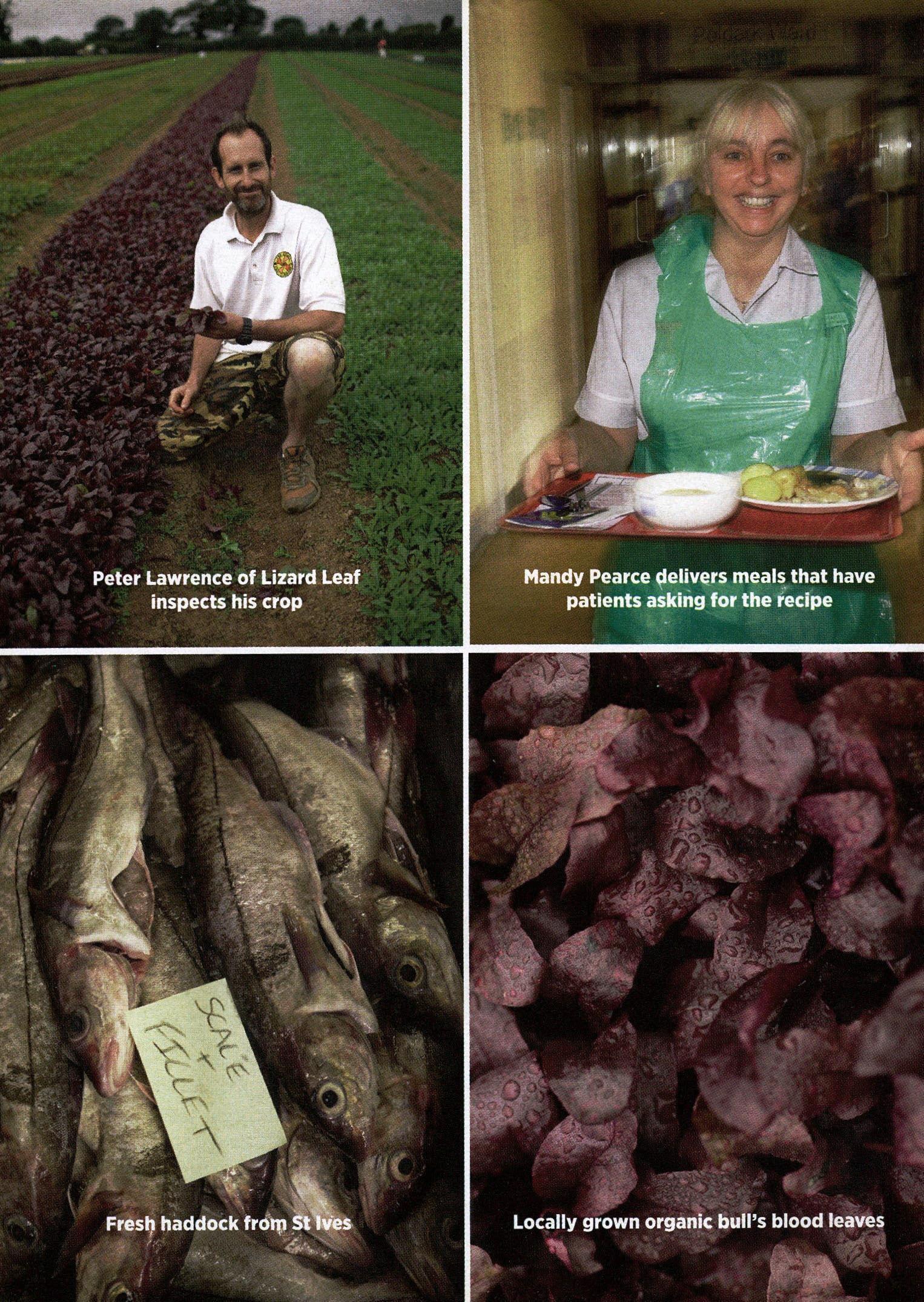 Fresh haddock from St)Ves
Peter Lawrence of Lizard Leaf inspects his crop
Mandy Pearce delivers meals that have patients asking for the recipe
Locally grown organic bull's blood leaves
Fresh haddock from St)Ves
Peter Lawrence of Lizard Leaf inspects his crop
Mandy Pearce delivers meals that have patients asking for the recipe
Locally grown organic bull's blood leaves
What could make you better, faster, in hospital—as well as transform the local economy?
MENU MAGIC
BY ANGELA NEUSTATTER
PHOTOGRAPHED BY SAM FROST
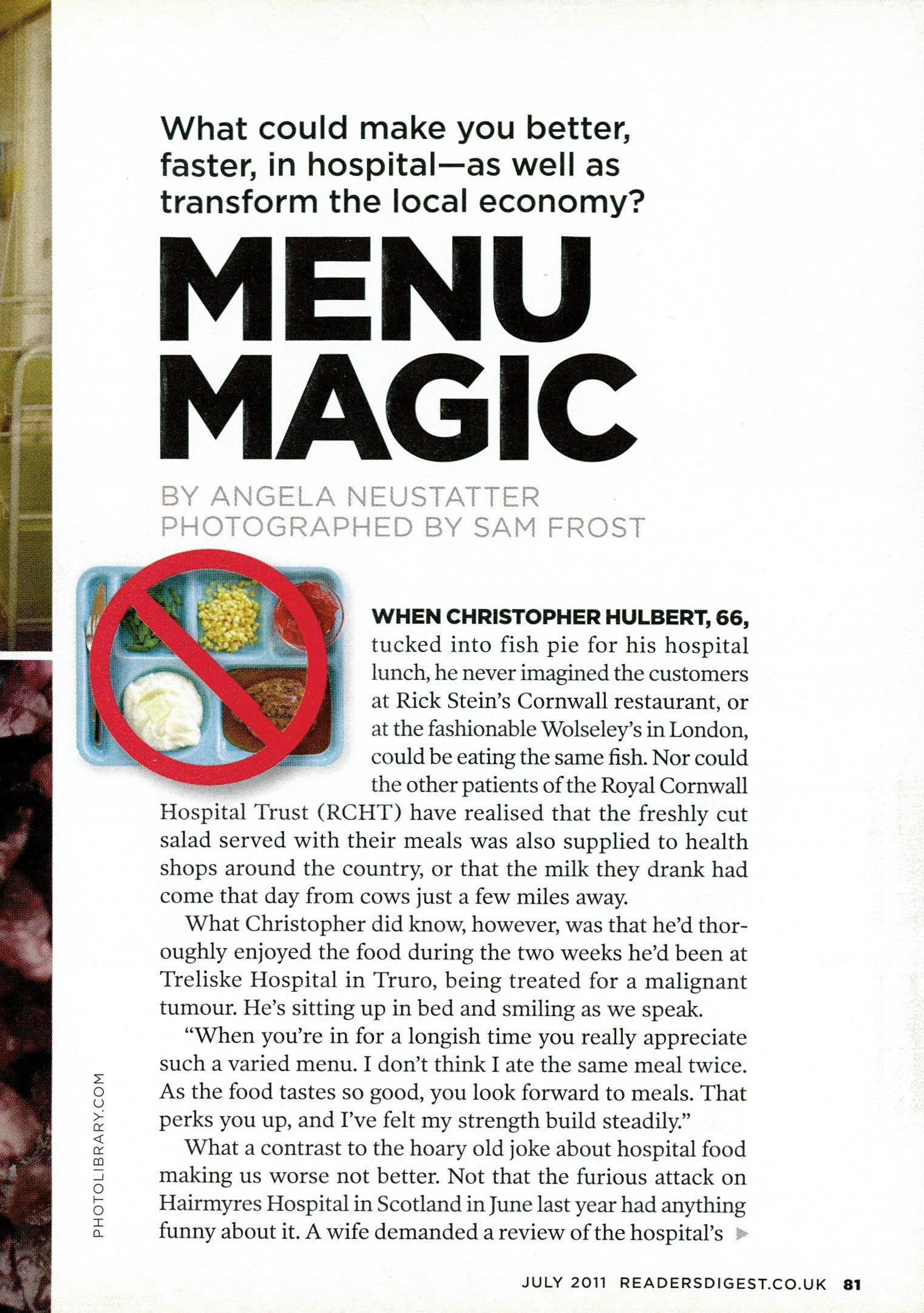
WHEN CHRISTOPHER HULBERT, 66, tucked into fish pie for his hospital lunch, he never imagined the customers at Rick Stein's Cornwall restaurant, or at the fashionable Wolseley's in London, could be eating the same fish. Nor could the other patients of the Royal Cornwall Hospital Trust (RCHT) have realised that the freshly cut salad served with their meals was also supplied to health shops around the country, or that the milk they drank had come that day from cows just a few miles away.
What Christopher did know, however, was that he'd thoroughly enjoyed the food during the two weeks he'd been at Treliske Hospital in Truro, being treated for a malignant tumour. He's sitting up in bed and smiling as we speak.
"When you're in for a longish time you really appreciate such a varied menu. I don't think I ate the same meal twice. As the food tastes so good, you look forward to meals. That perks you up, and I've felt my strength build steadily."
What a contrast to the hoary old joke about hospital food making us worse not better. Not that the furious attack on Hairmyres Hospital in Scotland in June last year had anything funny about it. A wife demanded a review of thehospital's '4),
PH OTO LIBRARY. COM
JULY 2011 READERSDIGEST.CO.UK 81
Cornwall Food Production Unit
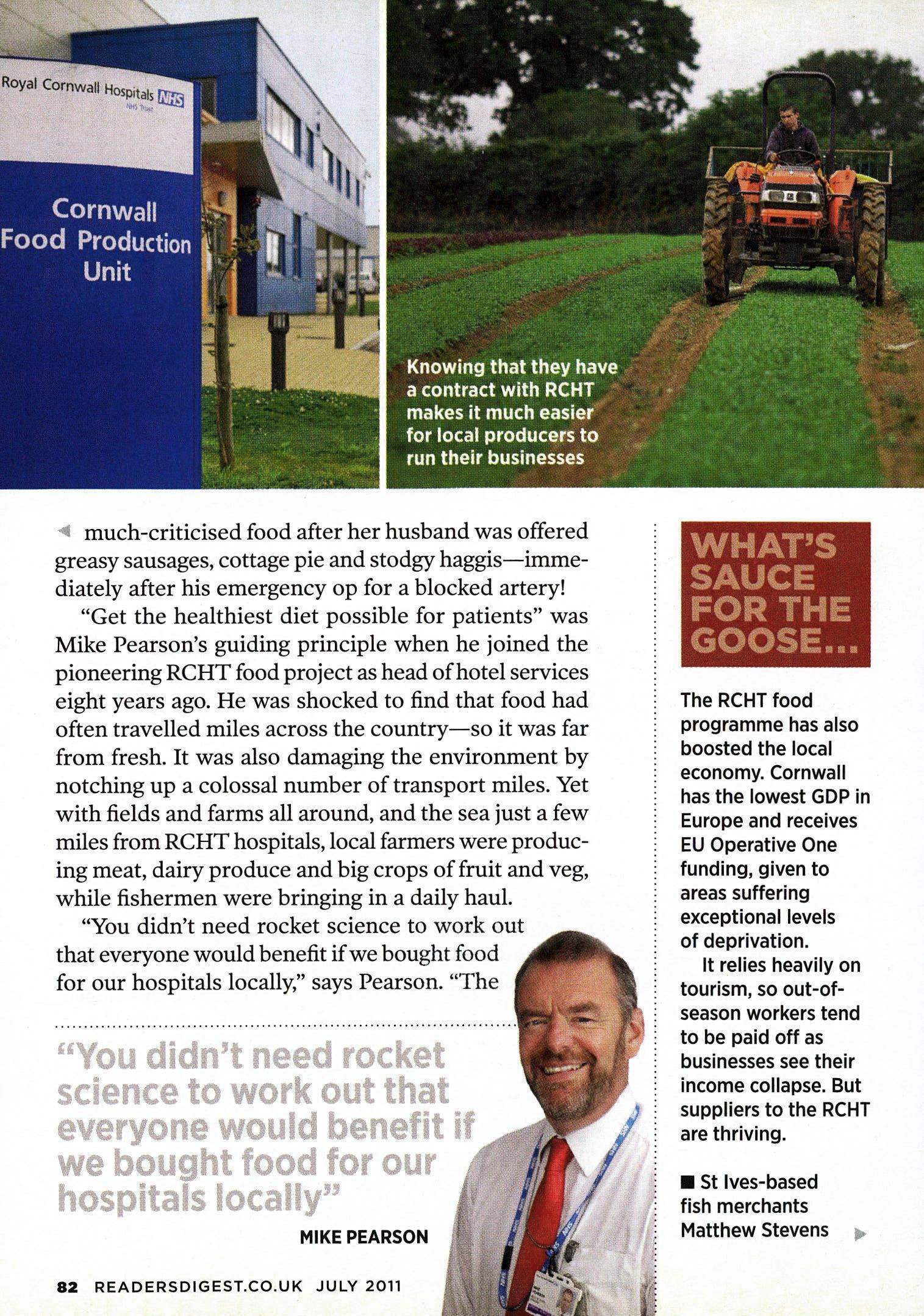
Knowing that they have a contract with RCHT makes it much easier for local producers to run their businesses
much-criticised food after her husband was offered greasy sausages, cottage pie and stodgy haggis—immediately after his emergency op for a blocked artery!
"Get the healthiest diet possible for patients" was Mike Pearson's guiding principle when he joined the pioneering RCHT food project as head of hotel services eight years ago. He was shocked to find that food had often travelled miles across the country—so it was far from fresh. It was also damaging the environment by notching up a colossal number of transport miles. Yet with fields and farms all around, and the sea just a few miles from RCHT hospitals, local farmers were producing meat, dairy produce and big crops of fruit and veg, while fishermen were bringing in a daily haul.
"You didn't need rocket science to work out that everyone would benefit if we bought food for our hospitals locally," says Pearson. "The
WHAT'S
SAUCE FOR THE GOOSE...
The RCHT food programme has also boosted the local economy. Cornwall has the lowest GDP in Europe and receives EU Operative One funding, given to areas suffering exceptional levels of deprivation. It relies heavily on tourism, so out-ofseason workers tend to be paid off as businesses see their income collapse. But suppliers to the RCHT are thriving.
■ St Ives-based fish merchants
Matthew Stevens
MIKE PEARSON
Hospitals
82 READERSDIGEST.CO.UK JULY 2011
A
Director James Mills is now testing his fresh-food revolution in schools
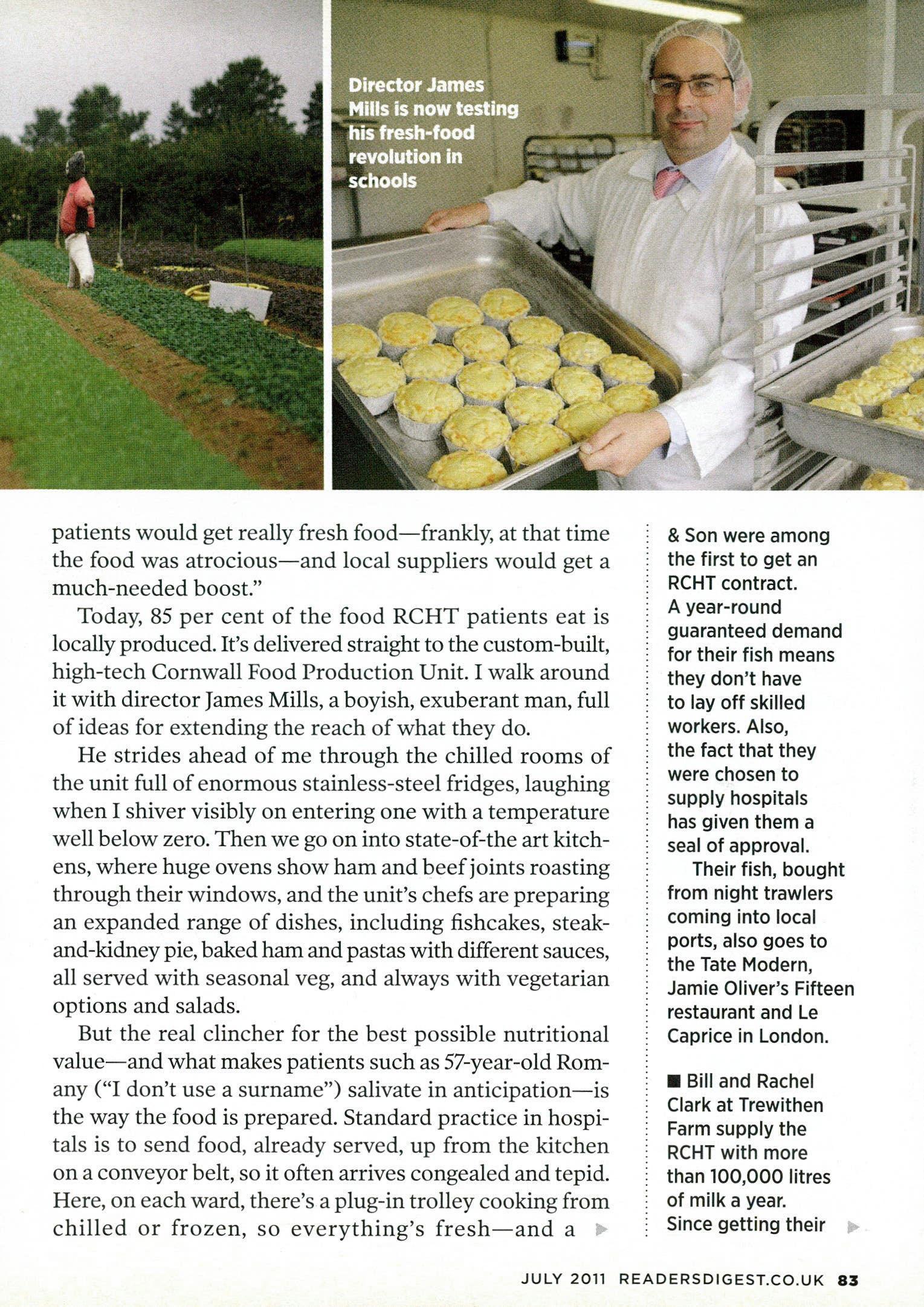
patients would get really fresh food—franldy, at that time the food was atrocious—and local suppliers would get a much-needed boost."
Today, 85 per cent of the food RCHT patients eat is locally produced. It's delivered straight to the custom-built, high-tech Cornwall Food Production Unit. I walk around it with director James Mills, a boyish, exuberant man, full of ideas for extending the reach of what they do.
He strides ahead of me through the chilled rooms of the unit full of enormous stainless-steel fridges, laughing when I shiver visibly on entering one with a temperature well below zero. Then we go on into state-of-the art kitchens, where huge ovens show ham and beef joints roasting through their windows, and the unit's chefs are preparing an expanded range of dishes, including fishcakes, steakand-kidney pie, baked ham and pastas with different sauces, all served with seasonal veg, and always with vegetarian options and salads.
But the real clincher for the best possible nutritional value—and what makes patients such as 57-year-old Romany ("I don't use a surname") salivate in anticipation—is the way the food is prepared. Standard practice in hospitals is to send food, already served, up from the kitchen on a conveyor belt, so it often arrives congealed and tepid. Here, on each ward, there's a plug-in trolley cooking from chilled or frozen, so everything's fresh—and a
& Son were among the first to get an RCHT contract. A year-round guaranteed demand for their fish means they don't have to lay off skilled workers. Also, the fact that they were chosen to supply hospitals has given them a seal of approval. Their fish, bought from night trawlers coming into local ports, also goes to the Tate Modern, Jamie Oliver's Fifteen restaurant and Le Caprice in London.
■ Bill and Rachel Clark at Trewithen Farm supply the RCHT with more than 100,000 litres of milk a year. Since getting their
JULY 2011 READERSDIGEST.CO.UK 83
• s enjoy being ecipes to taste before they're included in the menu
delicious smell of cooking titillates patients' taste buds.
The RCHT worked with the Soil Association when it set out to improve its food. In its report "A Fresh Approach to Hospital Food", the Soil Association stated that: "If hospitals were models of healthy eating, they could cut NHS costs directly by reducing patient stays and encourage the kind of lifestyle change that might have a significant impact on both health and the public purse." Some 700 patients are fed each day throughout the trust's hospitals and James is liaising with a leading university to see if they can measure how far good nutrition may cut the cost of patients' readmittance, or reduce stays.
Natasha Trewhela is the sister on the ward I visit. "I've seen quite a dramatic change in patients' attitudes as the food here has improved," she says. "Getting patients to eat and take in a good number of calories is the way we can rehabilitate them. We used to have a percentage who wouldn't eat, but that rarely happens now In fact, patients quite often ask for recipes. The men are a bit cheeky and say they'll 'Get the missus to make it'!"
A recent survey showed 80 per cent of patients were happy with the food, while 68 per cent said it was good or excellent.
I'm offered tiny samples of everything on the menu. If I still doubted that hospital food could really be that good, I'm proved deliciously wrong. I'd happily be served more - of the same any day of the week.
contract, they've secured a grant to invest further in their dairy; they're also building up their workforce and their regional contract with Asda.
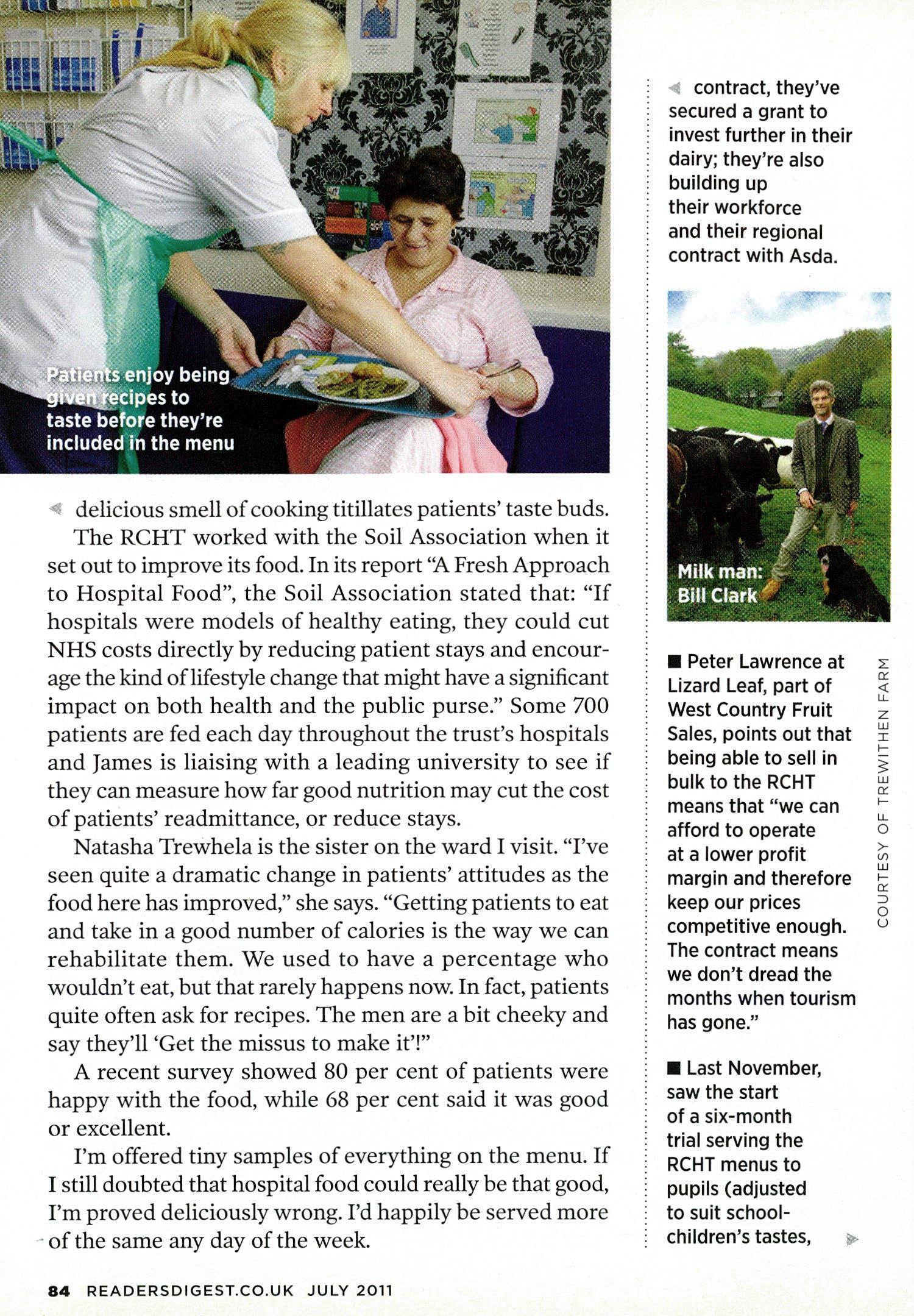
■ Peter Lawrence at Lizard Leaf, part of West Country Fruit Sales, points out that being able to sell in bulk to the RCHT means that "we can afford to operate at a lower profit margin and therefore keep our prices competitive enough. The contract means we don't dread the months when tourism has gone."
■ Last November, saw the start of a six-month trial serving the RCHT menus to pupils (adjusted to suit schoolchildren's tastes,
OF TREWITH EN FARM
COURTESY
84 READERSDIGEST.CO.UK JULY 2011
THE REAL COST OF LOW-QUALITY FOOD
Hospital food has had a stunningly bad press so far this year. The Soil Association in its survey "First Aid for Hospital Food" was horrified: "Hospital food is all too frequently more appropriate to a disease service than a health service." And a Dispatches TV programme, using NHS figures, reported the highest number of people ever—some 10,000 patients—leaving hospital malnourished.
The NHS spends around £500m a year on food—some 300 million meals. It set up the £50m Better Hospital Food initiative at the start of the millennium to help raise standards— but according to Sustain, the alliance for better food and farming, in spite of setting up 17 different initiatives, the Government has wasted the money, failing to improve hospital food. In a 2009 survey,

400 health-care professionals found that nutritional care in hospitals had improved "not at all" or "not much".
One third of people who stayed in hospital or had a close family member there last year deemed the food unacceptable, while 29 per cent said it was "unrecognisable", according to the Soil Association. Almost a quarter opted out of hospital food and had their own brought in.
The irony is, says nutrition expert Dr Michael Stroud, that lowering the malnutrition rate by ten per cent could reduce the overall NHS bill by £1.3bn.
Peter Melchett, policy director at the Soil Association, concludes: "Overall hospital food is a national scandal...commitment is needed from those in charge, and catering staff with real skill in sourcing and cooking simple, good-quality meals." but with the same focus on good nutrition). If this is a success, James Mills has 130 schools in Devon in his sights that don't have kitchens of their own.
Sylvia Mitch, a delicate 82-year-old, has for three years had a weekly appointment at Treliske Hospital for her osteoporosis. "I've been in other hospitals and I haven't liked the look of the food," she says "Here it looks good and tastes very fresh, and there's almost always something I want. If not, they do good sandwiches. My favourite? It has to be the beef pie. They make the pastry themselves and it's as good as the one I make at home!" ■
WHO'S DOING WHAT AROUND THE GLOBE: FINANCIAL WOES
► Zimbabwe's economy is such that you can now become a "trillionaire" for a few pence. Hyperinflation and the suspension of its currency (foreign currencies are now used instead) means that sets of notes are trading on eBay—this bill was worth about 50p.
louganom RESERVE BANK l'ZIPARABWE JULY 2011 READERSDIGEST.CO.UK 85
Is that really the sun peeking out?
Quick! Grab some vittles and a rug and head off to one of these fabulous locations for a spot of alfresco dining...
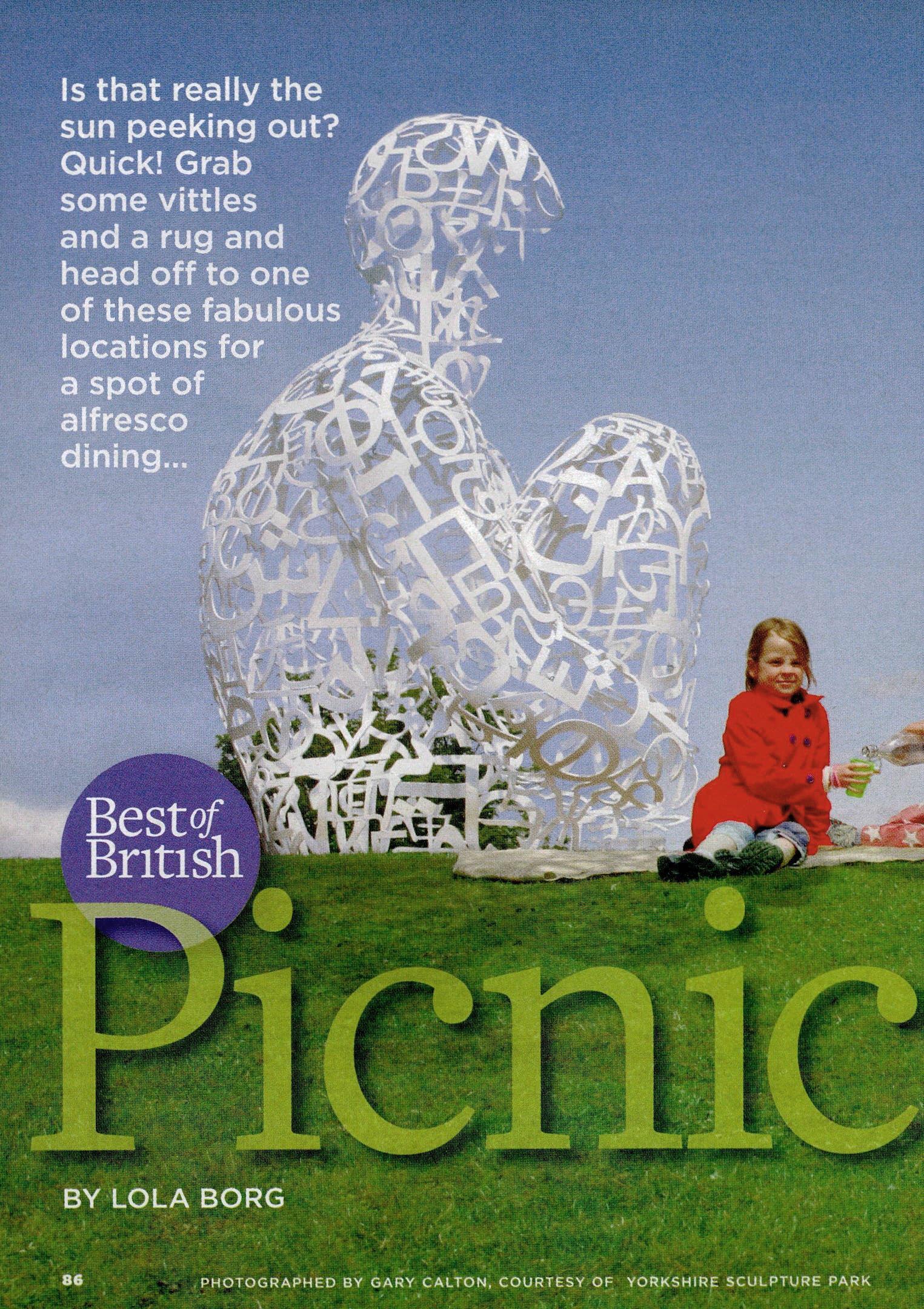 BY LOLA BORG
BY LOLA BORG
86 PHOTOGRAPHED BY GARY CALTON, COURTESY OF YORKSHIRE SCULPTURE PARK

FOR CULTURE
Fancy some art with your cucumber sandwiches? Then the Yorkshire Sculpture Park will hit the spot. Picnic at designated areas in the 00 acres of grounds (tables provided) and soak up the sculpture overlooking 4,4f:t the lakeside, including ten or so Henry Moore bronzes (you get the chance to see ■
Picnic sight: a family tucks in beside Spanish artist Jaume Plensa's sculpture&.
his work in the open air, as he intended). There are around 70 sculptures in the grounds, with prominent British names represented— Barbara Hepworth, Anthony Caro and usually a spooky Antony Gormley, too.
Download a guide to the park and sculptures before you go—found on the Resources section of their website*—or enjoy the calendar of events, which includes talks from visiting artists. There's a nice restaurant and shop, and it's free to enter (although you pay for the car park).
Yorkshire Sculpture Park, West Bretton, Wakefield, West Yorkshire

FOR ANCIENTSTONE
WORSHIPPERS
A sacred location for druids and the New Age movement, Avebury consists of three Neolithic stone circles with a henge (or ditch) running around them. Unlike Stonehenge, though, you can picnic right inside while sheep look on—touch the stones and surrender to the spooky atmosphere.
It's open all day, so any alfresco meal becomes a possibility (breakfast at sunrise, perhaps?). The village of Avebury, with a pub and shops, lies within the circle. There's a small museum nearby and a cafe specialising in vegetarian and gluten-free food. (Well, there would be, wouldn't there?)
z 0 Z Z Lu 0 w 0 Z 0 0 5 5 00 0. 0. zz Z Z
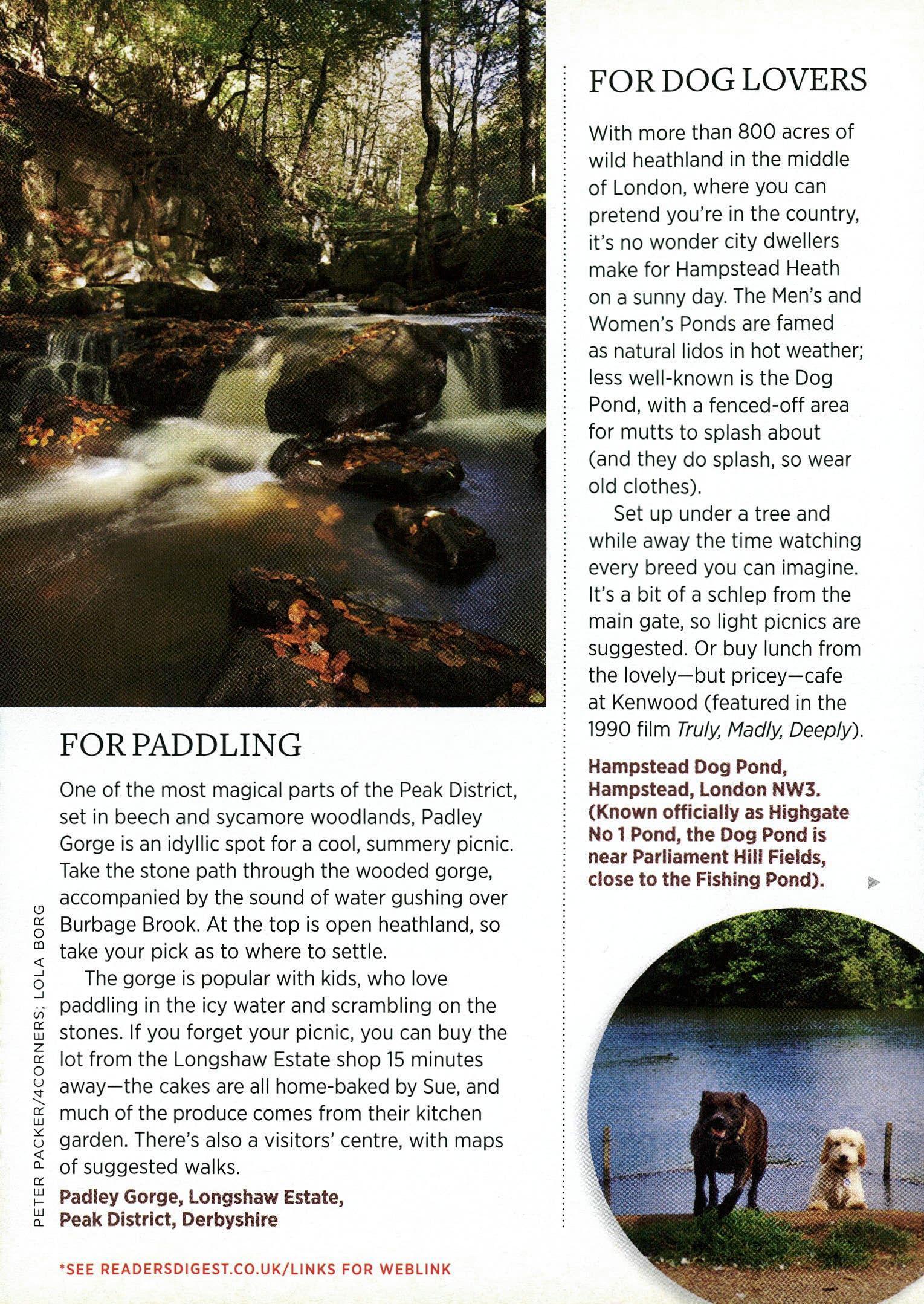
FOR PADDLING
One of the most magical parts of the Peak District, set in beech and sycamore woodlands, Padley Gorge is an idyllic spot for a cool, summery picnic. Take the stone path through the wooded gorge, accompanied by the sound of water gushing over Burbage Brook. At the top is open heathland, so take your pick as to where to settle.
The gorge is popular with kids, who love paddling in the icy water and scrambling on the stones. If you forget your picnic, you can buy the lot from the Longshaw Estate shop 15 minutes away—the cakes are all home-baked by Sue, and much of the produce comes from their kitchen garden. There's also a visitors' centre, with maps of suggested walks.
Padley Gorge, Longshaw Estate, Peak District, Derbyshire
FOR DOG LOVERS
With more than 800 acres of wild heathland in the middle of London, where you can pretend you're in the country, it's no wonder city dwellers make for Hampstead Heath on a sunny day. The Men's and Women's Ponds are famed as natural lidos in hot weather; less well-known is the Dog Pond, with a fenced-off area for mutts to splash about (and they do splash, so wear old clothes).
Set up under a tree and while away the time watching every breed you can imagine. It's a bit of a schlep from the main gate, so light picnics are suggested. Or buy lunch from the lovely—but pricey—cafe at Kenwood (featured in the 1990 film Truly, Madly, Deeply).
Hampstead Dog Pond, Hampstead, London NW3. (Known officially as Highgate No 1 Pond, the Dog Pond is near Parliament Hill Fields, close to the Fishing Pond).
PETER PACKER/ 4CORNE RS; LO LA BORG
'SEE READERSDIGEST.CO.UK/LINKS FOR WEBLINK

FOR WINE BUFFS
lckworth House and gardens can offer all kinds of picnicking pleasures—views of the quirky 19th-century rotunda, Italianate gardens (pictured) and a lily-strewn lake. But the real lure is the award-winning wine, so pick up a bottle or two at the estate shop and set up camp in the grounds. There's a wine for all tastes: red (the sweetly named Earl Bishop's Reserve), white, and even a sparking rosé (the Suffolk Pink) in limited quantities. All are grown and made on the estate, so you really are doing your bit for food miles by quaffing it—honest!
You can round off your day with a tour of the vineyard in the estate's walled kitchen garden—which has great views of the lake —or organise a wine tasting by arrangement.
Ickworth, Horringer, Bury St Edmunds, Suffolk. Standard ticket for park and gardens: 0.60 for adults, 90p for children.
NTPL/ ANDR EW BU TL ER
90

FOR BOOK LOVERS
In the Jane Austen novel Emma, the heroine sings the praises of Box Hill (the famous picnic scene in the book was captured on film in the 1996 adaptation, with actress Gwyneth Paltrow in a flowing white dress).
Named after the box trees that have grown in the area for centuries, it's a fantastic spot on the summit of the North Downs to picnic, walk, cycle, search for wildlife, or just flop on a blanket and look at the sky. Salomons Memorial (pictured) offers one of the best viewing points.
Box Hill, Tadworth, Surrey
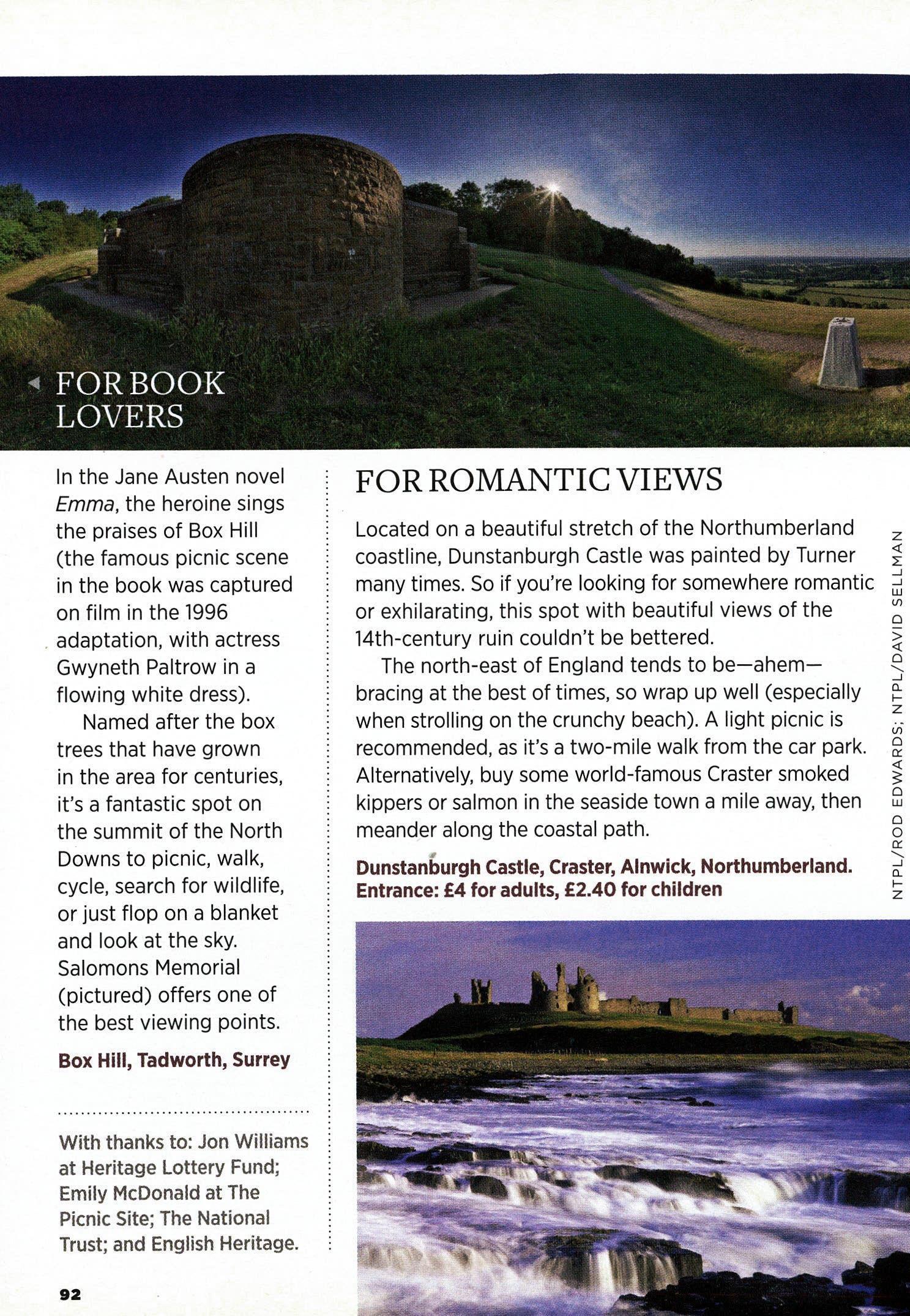
With thanks to: Jon Williams at Heritage Lottery Fund; Emily McDonald at The Picnic Site; The National Trust; and English Heritage.
FOR ROMANTIC VIEWS
Located on a beautiful stretch of the Northumberland coastline, Dunstanburgh Castle was painted by Turner many times. So if you're looking for somewhere romantic or exhilarating, this spot with beautiful views of the 14th-century ruin couldn't be bettered. The north-east of England tends to be—ahembracing at the best of times, so wrap up well (especially when strolling on the crunchy beach). A light picnic is recommended, as it's a two-mile walk from the car park. Alternatively, buy some world-famous Craster smoked kippers or salmon in the seaside town a mile away, then meander along the coastal path.
Dunstanburgh Castle, Craster, Alnwick, Northumberland. Entrance: £4 for adults, £2.40 for children
92
NTPL/ RO D ED WARDS; N TPL/ DAVID S EL LMAN
FOR GETTING AWAY FROM IT ALL
Go through Sandbanks —one of the most expensive property areas in the UK—and take the ferry to Brownsea Island, , a tranquil, car-free nature reserve and the largest of the islands nestling inside Poole Harbour. Once there, take your pick from beaches, meadows, grassy flats with views of the harbour, picnic tables and even a sheltered area, should the weather not favour you (though most of the island is pine-and-oak woodland, so you can always spread your lunch out under a tree). If you forget everything, there's a cafe.
Famous as the birthplace of scouting, there's a Baden-Powell Outdoor Centre with suitably gung-ho activities, plus guided walks and sometimes even overnight camping. Look out for the red squirrels—because it's an island, they flourish here.
Brownsea Island, Poole, Dorset
...AND WHAT TO TAKE
Award-winning food writer Debora Robertson's tips fora great picnic:
DON'T TAKE TOO MUCH. Consider just three or four lovely things, rather than loads of dishes—preferably sturdy foods that travel well, such as chicken legs or Scotch eggs.
A PICNIC CAN BE REALLY SIMPLE. I might take a really delicious pork pie with something fresh—a bag of green salad and dressing in a jam jar. Then fresh fruit and some cheese and bread. That's it. Take a sweet item, too. Cakes are better than tarts, which are a bit fragile. Spoon ice cream or sorbet into a wide-necked Thermos flask.
If you have a better picnic spot than the ones mentioned here, why not let us know? Send us an email—with a picture if possible —to theeditord) readersdigest.co.uk.
There's much more in our Best of British series—including picnicking sites— at readersdigest. co.uk/magazine.
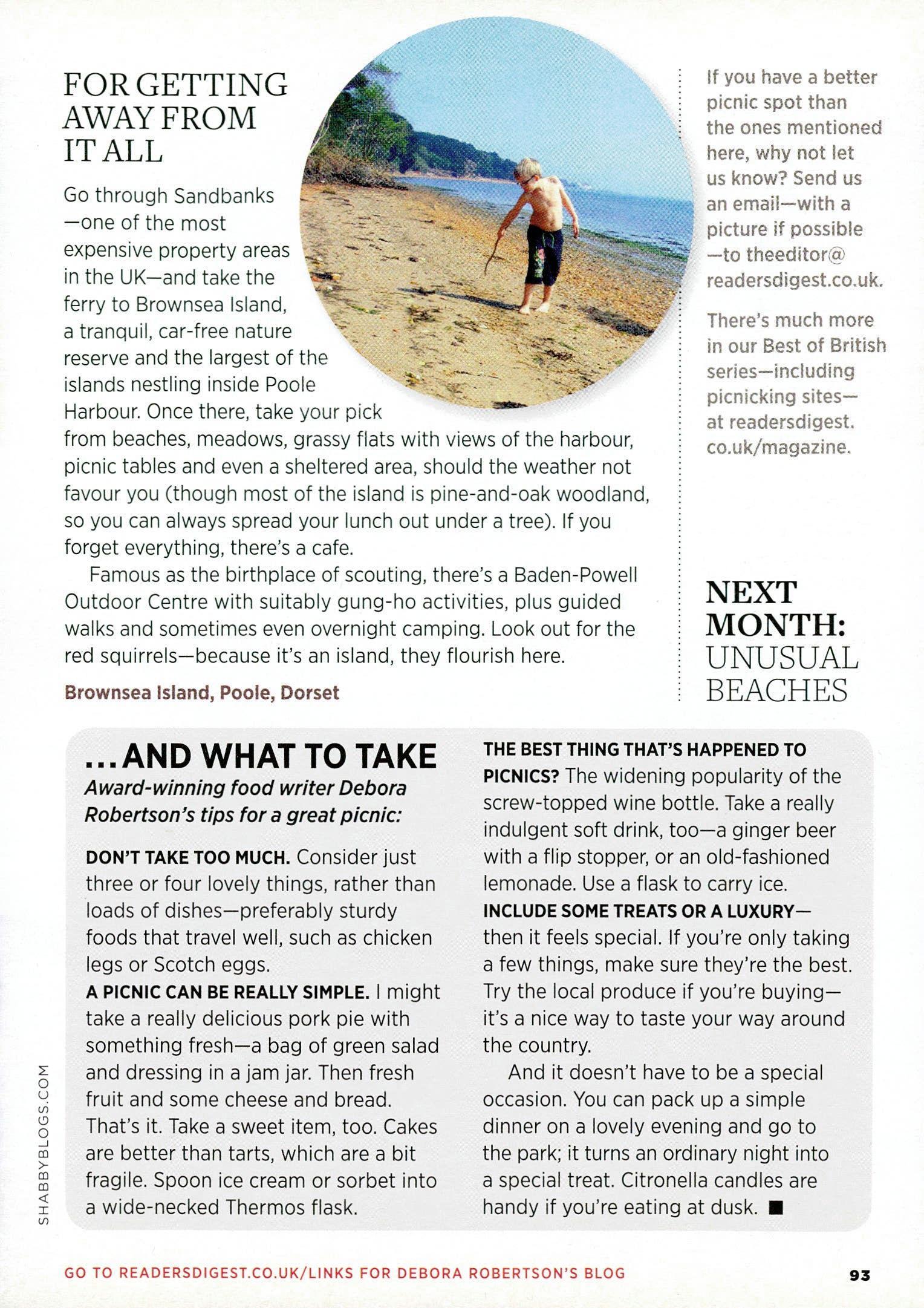
NEXT MONTH: UNUSUAL BEACHES
THE BEST THING THAT'S HAPPENED TO PICNICS? The widening popularity of the screw-topped wine bottle. Take a really indulgent soft drink, too—a ginger beer with a flip stopper, or an old-fashioned lemonade. Use a flask to carry ice.
INCLUDE SOME TREATS OR A LUXURY— then it feels special, If you're only taking a few things, make sure they're the best. Try the local produce if you're buying— it's a nice way to taste your way around the country.
And it doesn't have to be a special occasion. You can pack up a simple dinner on a lovely evening and go to the park; it turns an ordinary night into a special treat. Citronella candles are handy if you're eating at dusk. ■
SHABBYBL OGS. COM
GO TO READERSDIGEST.CO.UK/LINKS FOR DEBORA ROBERTSON'S BLOG 93
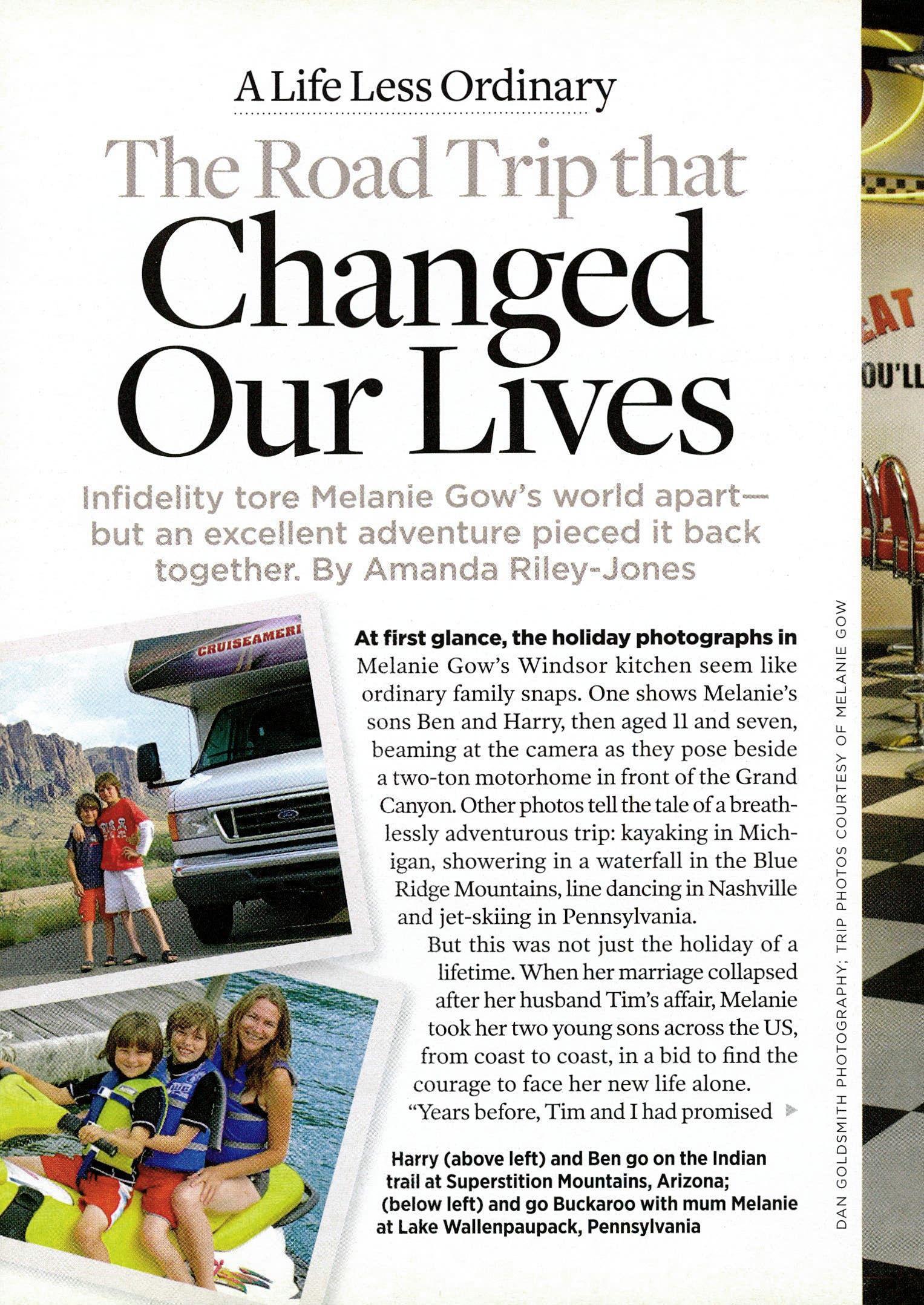
A Life Less Ordinary The Road Trip rho Change Our Lives
Infidelity tore Melanie Gow's world apPH--but an excellent adventure pieced it together. Rv lonPc
At first glance, the holiday photographs in Melanie Gow's Windsor kitchen seem like ordinary family snaps. One shows Melanie's sons Ben and Harry, then aged 11 and seven, beaming at the camera as they pose beside a two-ton motorhome in front of the Grand Canyon. Other photos tell the tale of a breathlessly adventurous trip: kayaking in Michigan, showering in a waterfall in the Blue Ridge Mountains, line dancing in Nashville and jet-skiing in Pennsylvania. But this was not just the holiday of a lifetime. When her marriage collapsed after her husband Tim's affair, Melanie took her two young sons across the US, from coast to coast, in a bid to find the courage to face her new life alone. "Years before, Tim and I had promised
Harry (above left) and Ben go on the Indian trail at Superstition Mountains, Arizona; (below left) and go Buckaroo with mum Melanie at Lake
OU'Ll
Wallenpaupack, Pennsylvania

Yankee doodle! The intrepid trio went Stateside to find a new way of living back home
nt iiNsCe
wiLeig4 g "Z
.WAYS
44,4t.
RETUR
we'd take them to America one day, and I felt it was important that I kept this promise. I wanted us to plan something we'd remember forever. Instead of fearing for the future, I wanted my sons to see all the wonder and good there is in the world," says Melanie, now 45. Travelling by plane, train and automobile (not to mention five days in a motorhome), Mel took on 15 states, over 6,000 miles and eight time zones in 53 days. "We camped out, dodged tornadoes and stayed with strangers we'd befriended on the way. The old me never really took risks. I even preferred to let my husband drive the family car! But now it was my turn to take the driving seat."
When Melanie met Tim in 1995, she was an independent filmmaker and he was a reporter on the local paper. "I fell for him instantly," she says. "He had a way of looking at me as if I was the only person in the world." They had Ben, got married in 1998, and their family was complete when Harry arrived three years later.
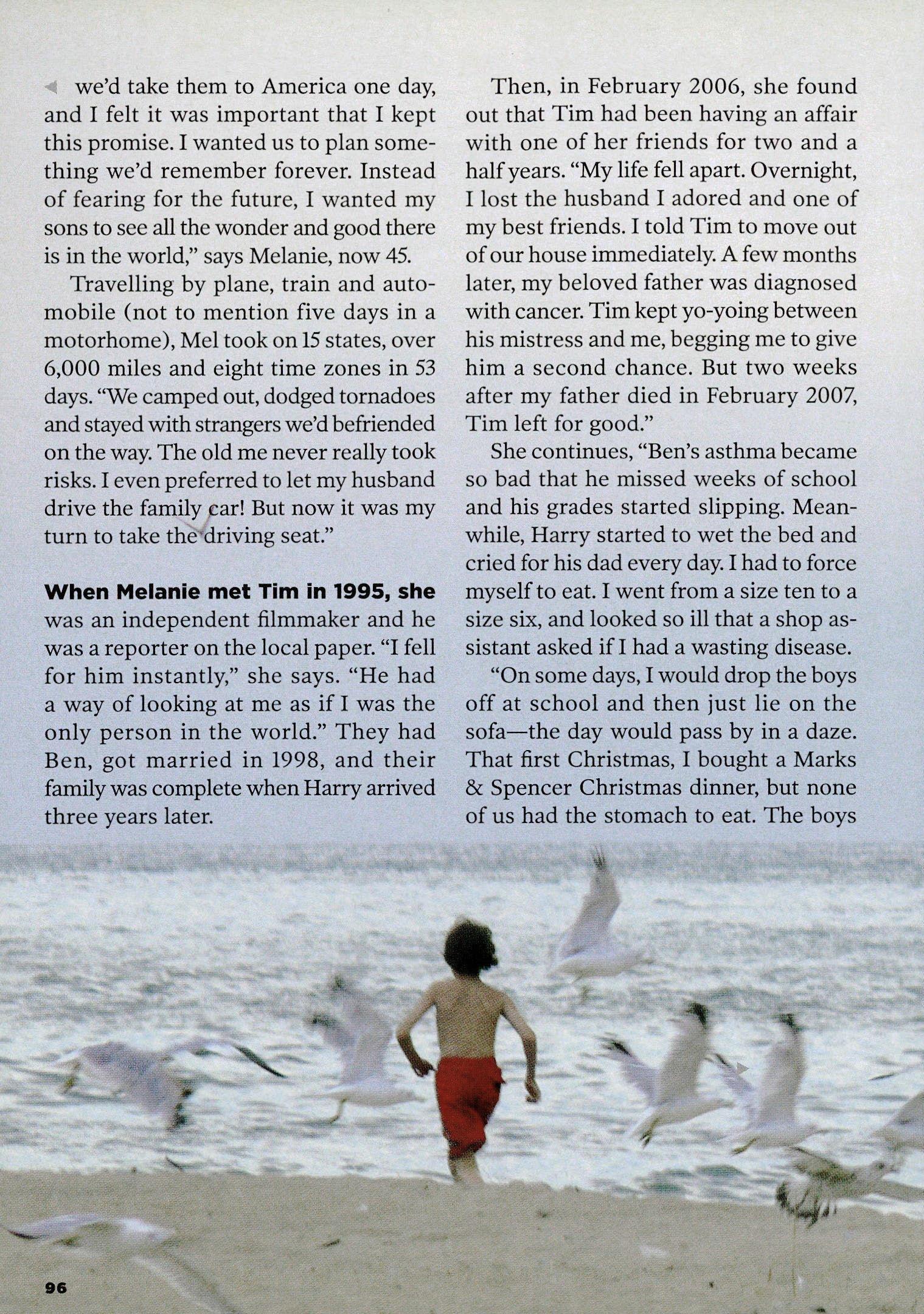
Then, in February 2006, she found out that Tim had been having an affair with one of her friends for two and a half years. "My life fell apart. Overnight, I lost the husband I adored and one of my best friends. I told Tim to move out of our house immediately. A few months later, my beloved father was diagnosed with cancer. Tim kept yo-yoing between his mistress and me, begging me to give him a second chance. But two weeks after my father died in February 2007, Tim left for good."
She continues, "Ben's asthma became so bad that he missed weeks of school and his grades started slipping. Meanwhile, Harry started to wet the bed and cried for his dad every day. I had to force myself to eat. I went from a size ten to a size six, and looked so ill that a shop assistant asked if I had a wasting disease.
"On some days, I would drop the boys off at school and then just lie on the sofa—the day would pass by in a daze. That first Christmas, I bought a Marks & Spencer Christmas dinner, but none of us had the stomach to eat. The boys
96
Setting eyes on the Grand Canyon glowing red
had popcorn and the food stayed on the table for two days, untouched."
Three weeks later, Mel went to a friend's birthday party, watched people laughing and celebrating, and realised she couldn't bear living in such misery. From that point, the three of them started poring over atlases and searching the internet, planning their big adventure.
The following summer, Melanie and her sons took up their backpacks and set off to Heathrow. Their route would take them from Los Angeles through Arizona, Illinois, Michigan, Cleveland, Pennsylvania, New Jersey, down to Tennessee and on to New York.
Melanie says: "Every day was a new challenge. What were we going to do? How would we do it? Would the budget allow it? Even taking charge of a huge motorhome in Mesa, Arizona, took some doing. The boys loved the idea of being in a house on wheels, but my marriage
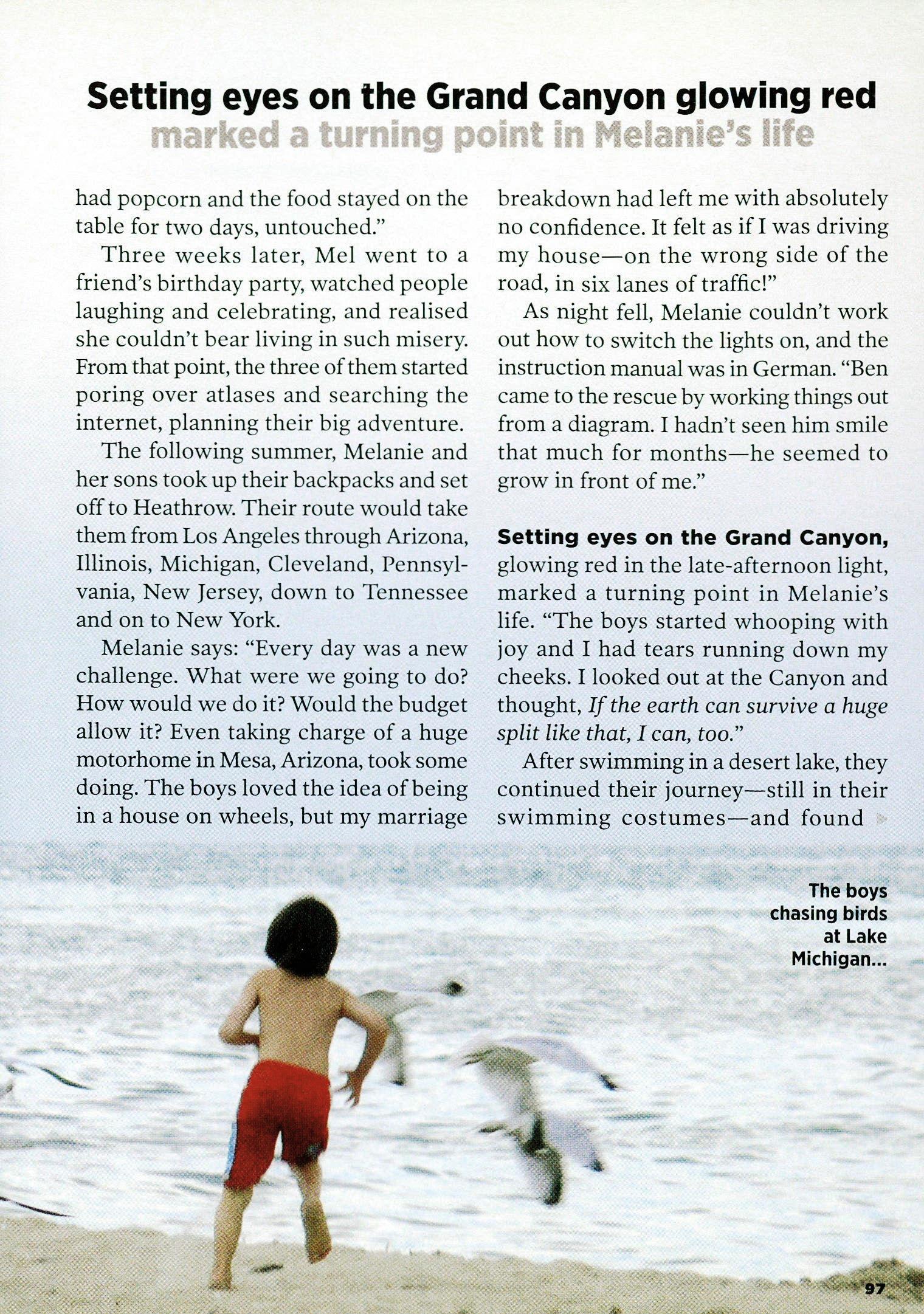
breakdown had left me with absolutely no confidence. It felt as if I was driving my house—on the wrong side of the road, in six lanes of traffic!"
As night fell, Melanie couldn't work out how to switch the lights on, and the instruction manual was in German. "Ben came to the rescue by working things out from a diagram. I hadn't seen him smile that much for months—he seemed to grow in front of me."
Setting eyes on the Grand Canyon, glowing red in the late-afternoon light, marked a turning point in Melanie's life. "The boys started whooping with joy and I had tears running down my cheeks. I looked out at the Canyon and thought, If the earth can survive a huge split like that, I can, too."
After swimming in a desert lake, they continued their journey—still in their swimming costumes—and found
The boys chasing birds at Lake Michigan...
themselves in the eye of a storm. "Suddenly, branches were flying past us, and cars were being swept away. The boys were terrified, and so was I. Harry said, `Mum, are we going to die?' but I kept smiling and said, 'No, we're going to pull over and have dinner!'
"I ran to a restaurant and knocked on the door. The waitress said they were shut because of a power cut. She was stunned to see me in my bikini and sarong, and asked, 'Where's your husband?' When I said I was alone with my children, she replied, 'Good for you, honey!' and invited us in."
As the restaurant was in darkness, the chef, Brian, used his cigarette lighter to talk them through the food choices. They feasted on steak and ice cream while the storm raged for another hour, and no one would let them pay. "Before we left, Brian said to me: 'Life isn't about waiting for the storm to pass. It's about learning
...and making a splash in Fallingwater Cascades, Virginia
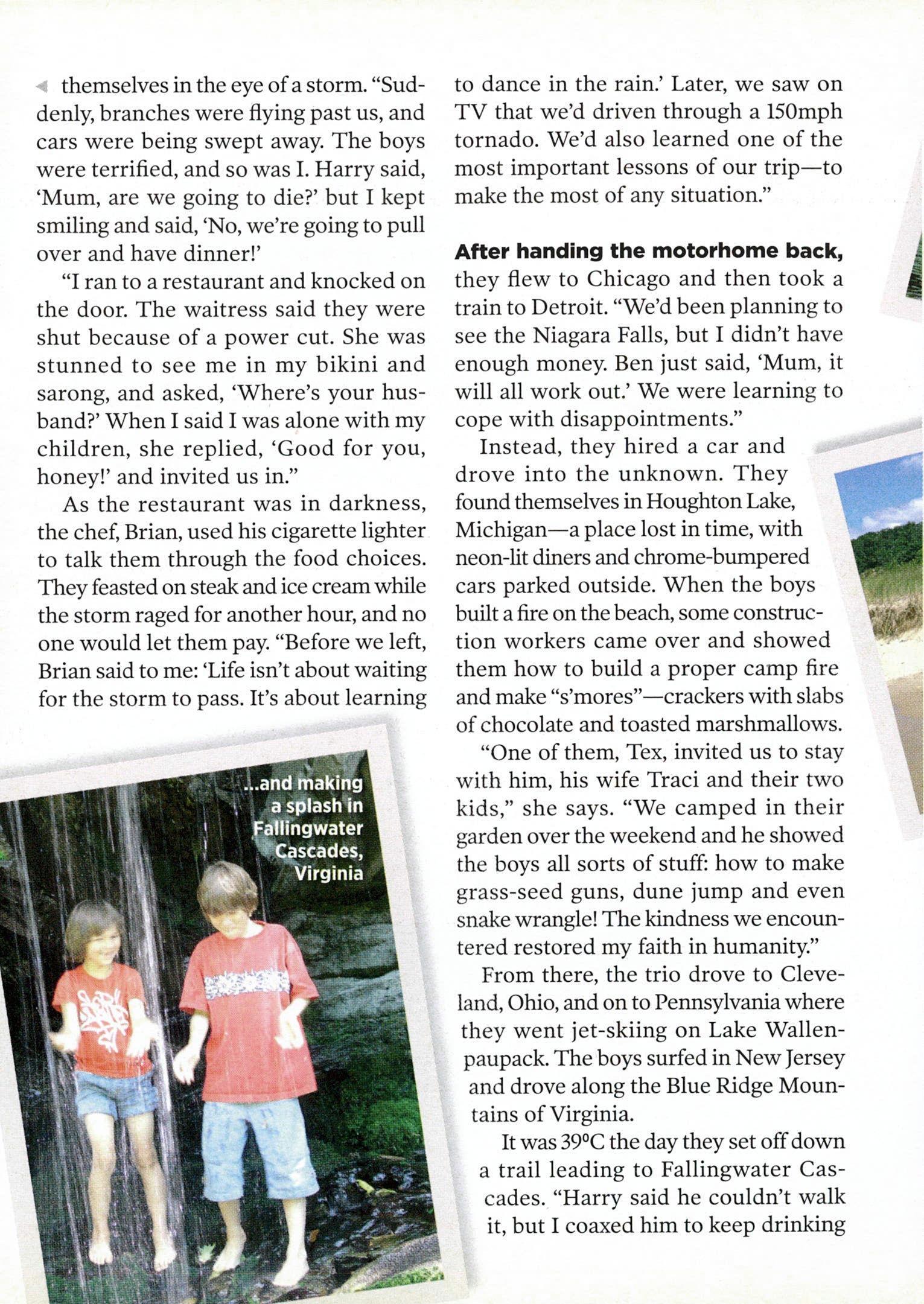
to dance in the rain.' Later, we saw on TV that we'd driven through a 150mph tornado. We'd also learned one of the most important lessons of our trip—to make the most of any situation."
After handing the motorhome back, they flew to Chicago and then took a train to Detroit. "We'd been planning to see the Niagara Falls, but I didn't have enough money. Ben just said, 'Mum, it will all work out.' We were learning to cope with disappointments."
Instead, they hired a car and drove into the unknown. They found themselves in Houghton Lake, Michigan—a place lost in time, with neon-lit diners and chrome-bumpered cars parked outside. When the boys built a fire on the beach, some construction workers came over and showed them how to build a proper camp fire and make "s'mores"—crackers with slabs of chocolate and toasted marshmallows.
"One of them, Tex, invited us to stay with him, his wife Traci and their two kids," she says. "We camped in their garden over the weekend and he showed the boys all sorts of stuff: how to make grass-seed guns, dune jump and even snake wrangle! The kindness we encountered restored my faith in humanity"
From there, the trio drove to Cleveland, Ohio, and on to Pennsylvania where they went jet-skiing on Lake Wallenpaupack. The boys surfed in New Jersey and drove along the Blue Ridge Mountains of Virginia.
It was 39°C the day they set off down a trail leading to Fallingwater Cascades. "Harry said he couldn't walk it, but I coaxed him to keep drinking
water and keep going. When we reached the waterfall, the boys loved standing behind the curtain of water—the proud look on Harry's face said it all."
They were learning to line-dance in a club in Nashville when Melanie stopped to take photos and realised how much better their lives had become. "We were sharing so many wonderful experiences. Instead of each day ending with the routine tea, homework and bedtime book, we were making our own story.
"On the last day, we ate at the Hard Rock Cafe in New York. I looked at my confident, tanned, happy boys and saw

how far they'd come. Harry cried as he boarded the plane, because he didn't want our adventure to end. I felt so empowered. I was flying back to my old home—but not my old way of life."
Looking back on it now, three years later, Melanie says, "Our road trip taught the children so many life skills: they're not afraid to speak to people they don't know, or to try something new It was the same for me. My world had shrunk to cleaning and the school run. But the trip showed me who I really am, and that I can do anything. The boys and I are not just surviving—we're thriving." •
Kayaking on the Au Sable River...
...loving the Motown Museum
%in Detroit...
...and going to the dance, 101hville-style!
...c ' •ea at Houghton Lake...
JULY 2011 READERSDIGEST.CO.UK 99

THE MAVERICK
"LET THE HIGH STREET DIE"
Residents and councils are desperate to prop up our old local shops. But, argues Patrick Grant, if not enough people want to use them, shouldn't we have a radical rethink?
"Save our town-centre shops" has become a familiar rallying call in dozens of places across Britain.
The Wigan Evening Post, for example, launched a "buy local" campaign in March, in response to one in five of the area's retail units falling empty. Hatfield in Hertfordshire has a Facebook campaign calling for government assistance for its ailing high street—and in Scarborough in February, a petition against a new suburban Tesco garnered 800 signatures in just four hours. Meanwhile, TV retail guru Mary Portas is leading a government-backed review aimed at halting the decline of the high street, and millions of pounds of local and national funding—the Scottish Government alone provided £60 million—have been given to towns in the last couple of years to spruce up shopping areas and attract new customers.
But it's all largely a waste of time.
According to research last year by retail analysts
The Local Data Company, 16.5 per cent of British highstreet shops are now empty, with the figures for towns such as Blackpool and Wolverhampton passing 25 per cent. There's been a recession, of course, but property *-
100 READERSDIGEST.CO.UK JULY 2011

ILLUSTRATED BY EDA AKALTUN/HEART JULY 2011 READERSDIGEST.CO.UK 101
Thinking differently!
consultant and former PricewaterhouseCoopers partner Professor Barry Gilbertson predicts that, even when the economy finally hots up, around a fifth of UK shops will never be reoccupied. With competition from outof-town shopping centres, supermarkets and internet retailing (where market share may rise from
ten to 50 per cent by 2020, according to the Interactive Media in Retail Group), no amount of cosmetic improvements to old high streets will keep most of their shops going.
It's time to let high-street shops die a natural death and rethink how we want our town centres to look. At present, many are just urban nightmares—a few dimly lit convenience stores, dodgy pop-up shops and boardedup windows. But imagine the scene if we abandoned our obsession with them being about buying things.
Other abandoned retail units could be knocked down and turned into community focal points, such as playgrounds and swimming pools, while still more could be replaced with affordable parking (the lack of which has hastened the demise of many town centres).
Council services, such as housing offices, playgroups,
Ifwe're so attached to our retail heritage, why are so many old shops struggling and new superstores thriving?
museums, drop-in centres, offices and even schools (in the smaller towns, at least) could be moved from their disparate locations and placed around smart new town squares. This would also increase footfall for the remaining shops, with people having a daily reason for being in the area that wouldn't be lost by a new Asda opening four miles away.

What if shops that fell empty were routinely converted into new houses or flats? This would ease the UK's chronic housing shortage (around 250,000 new households are formed each year, but only some 160,000 new homes are constructed), lessen the need for building on greenfield sites and give the remaining shops more local customers, for whom out-of-town shopping centres are not the most convenient option.
"But town-centre shops are traditional!" you may respond. Well, actually, most high streets don't date back past the 1870s—there simply weren't enough things to buy before then. And if we're so attached to our retail heritage, why are so many old shops struggling and new superstores thriving?
Of course, some business districts can successfully reinvent themselves. Shopkeepers in Ludlow, Shropshire, shrugged off the impact of new outlying developments by building a reputation for selling high-quality, independently
102 READERSDIGEST.CO.UK JULY 2011
produced food and drink, and working together on a nationally recognised annual culinary festival. Others, such as Plymouth city centre in Devon, are lucky enough to be the only shopping hub in a large catchment area—providing these stores are well maintained, the customers will come.
Some high-street shops are doing well, too. In Twickenham— the south-west London suburb where I live—a fishmonger does a roaring trade thanks to a produce range that far outstrips the local Sainsbury's. Poundland, no longer the preserve of poorer areas, is one of the big retail success stories of recent years.
such as boosting employment—even if they've been empty for years.
Should we put high-street shops out of their misery? Join the debate at facebook.com/ readersdigestuk or email readersletters a readersdigest. co.uk

But there are only so many shops and towns that can fill these niches, and residents, councils and central government have to realise that, in their present state, most town centres are not viable in the long term. At present, if a landlord wants to convert a shop into a home, he has to apply for "change of use" planning permission. This involves costly red tape and the application is usually rejected by local authorities who want to keep retail units intact—often for worthy but self-defeating policy aims,
In April, the Department for Communities and Local Government issued a consultation paper proposing that office buildings and certain light-industry sites could be converted into homes without planning permission. Wouldn't it be sensible if this was extended to shops that have been empty for, say, six months, too? The Government's new Localism Bill, which plans to give communities more control over the planning process, may also help. Either way, councils would retain considerable power over how their area looked, as firms would still need planning approval for the design and size of any new developments.
The decline of the British high street does not gladden many people's hearts. Long-established family businesses are vanishing, and more and more shop staff work in vast superstores. But the decline will continue. Instead of standing by and watching our town centres die slow deaths, why don't we act now and make them genuine, vital community hubs once again?
GOING STRAIGHT FOR THE JUGULAR
I recently found a legal website specialising in assistance for accident victims. Various harrowing problems were listed, such as road incidents and injury at work. The name of the solicitors? Slaughter & Slaughter. Submitted by Alan Dale, Walton-on-Thames, Surrey
JULY 2011 READERSDIGEST.CO.UK 103
HOW TO.. BY LINDA GRAY
1,001 THINGS EkYONE SHOULD KNOW
Welcome to the pages that help make life simpler, easier and—we hope—more fun!
How to TALK TO YOUR DOCTOR
MOST DOCTORS ARE APPROACHABLE AND CLUED UP, so how come we sometimes leave the surgery feeling dissatisfied or confused? Maybe we're to blame, because we're too stressed to get to the point in our seven-minute appointment. To make the most of it, try this minuteby-minute countdown.
"Hello, doctor. I've come about...lt started on....I've been doing...l've taken X medicine...lt's still not better." Stick to one problem per appointment, says RD's medical expert Dr Max Pemberton, and avoid the "door-knob

moment"—when patients come out with what's really worrying them as they leave.
"My symptoms are....They're better/worse in the morning/ evening or when I lie down/keep moving."
Mention anything new, however trivial—and if it's embarrassing, write it down.
"Since I last saw you I've started smoking again/ travelled to Nigeria/ been widowed."
c4),
104

Information like this could help diagnose leg pain, malaria or depression.
"What do you think is wrong?"
If GPs aren't sure and it could be serious, they'll recommend tests or a hospital referral. If they're consistently dismissive or tell you it's your age, it's time to change your doctor.
"What treatments are there?"
Ask about side-effects and success rates. If no treatment is recommended (and it may not be for back pain or a sore throat), ask your GP why.
"Could you repeat that?" "I'd be delighted if someone asked me that," says Max Pemberton. "Patients typically remember just two things from a consultation, so make notes or ask your doctor to explain it again."
"What would you do if you were me?" Here's your opportunity to get some inside information, because it gives your GP a chance to express an opinion outside NHS guidelines.
How to BREEZE THROUGH AIRPORT SECURITY
THAT PERFUME OR TENNIS RACQUET
could be binned if you break the rules, so it pays to find out what they are.
First, dress for success. Wear slip-on shoes and a shrug-on jacket, and avoid metal. Although scanner alarms come on at random, they pick up on jewellery, wired bras, belts and piercings.
Next, organise your carry-on, obeying the liquids limit of ten 100m1 containers in a transparent 20cm x 20cm resealable plastic bag. Lipstick, mascara, shaving foam, lighters and toothpaste all count as liquids—but you can stock up once you're through security. Baby food and milk are exempt, as is liquid medication (including inhalers), though you'll need to show a doctor's letter or prescription. Electrical goods are screened separately, so pack in your hold baggage. Hanging on to your laptop? It's easier to take it out of a sleeve than a bulky computer bag. Pushchairs, musical instruments and walking sticks all have to go through the scanner, too.
Guess you'll need that holiday...
DANIEL LAFL OR/GETTY IMAGES; IMAGE SOU RC E/ PHOTOL IB RARY. COM
JULY 2011 READERSDIGEST.CO.UK 105
•u

How to IT OUT
FOR MOST OF US IT'S A NECESSARY EVIL, but some hardly know that it exists. (No prizes for guessing that 20% of men never iron.) Those who do will welcome these tips for killing creases. Sort clothes by ironing temperature (check the label). Start with those that need the coolest, smoothing the fabric away from you and nosing into creases. Press the inside of collars, cuffs, sleeves and trousers before the outside, and turn clothes inside out for pockets, flies, seams and hems.
How to SOO, HE A STING'
OW!WHAT WAS THAT? Been stung? It's worth identifying the culprit to avoid making the situation worse. Bee stings need removing fast, as they release venom for up to a minute. Check if there's one in the centre of the bite, then scrape it out sideways with your nail or a credit card (don't use tweezers—they can squeeze more poison into the wound, say St John Ambulance).
Sharp pain but no sting? You probably annoyed a wasp. In
Shirts are best ironed in this order:collar, yoke, cuffs, sleeves, one side of the front back, rest of the front.
Trousers: fold legs lengthwise, keeping seams apart for jeans and casuals, together if you want to create a front crease. If trousers have pleats, the crease should line up with them.
Pleats:fix in place with paper clips. Hold the iron just above the pleats, push the steam button, then put it down at intervals on each pleat (mind the clips). Avoid dragging the iron over the fabric or the pleats may pucker.
Iron delicates inside out with a tea towel on top, and put a thick towel below to protect sequins or embroidery.
each case, clean the skin with soap and water, apply ice if it's on a limb, and raise it to prevent swelling.
A jellyfish sting? Scrape the tentacle off, rinse with salt water (not pee or fresh water) and apply ice for ten minutes. Jellyfish stings can be vicious, so get medical help if you start to feel worse.
If the itching's extreme, take an antihistamine tablet or apply 1% hydrocortisone cream for instant relief. Keep an eye on the swelling. More than four inches and you may be sensitised to the venom, so see a doctor. And if you're stung in the mouth and your throat starts to swell (or you wheeze, feel faint or come out in a rash), call 999—it's an emergency.
1,001 THINGS
z H ■ "9 ,. 9 C4 c0 cU 0 z cc 0 re re LL, 0 5: x to UI 0 co 0 0 UI 106
How to
ENJOY AN
EMPTY NEST

WHEN THE KIDS LEAVE HOME
you can go round the world,
start a new career and trade the people carrier for a Mazda MX-5. Empty-nest syndrome is a common cause of a midlife
crisis, though few parents expect it to bother them. But working outside the home, as two-thirds of mums and most dads do, is no protection from the loss you may feel when your chicks take flight. And if they boomerang back, you have to go through it all over again. So how do you survive?
Prepare for it as a family, says Celia Dodd, author of The Empty Nest (02.99). Teaching kids a practical skill such as budgeting stops you fretting about how they'll cope. At the same time, start thinking positively about your future without rushing to fill your time as soon as they leave. "You need to take stock first," Dodd advises.
It's also an idea to keep plans fluid in case they return. "Don't act on the assumption that you YOUR CHILDREN STILL can be totally 'me' based," warns psychologist NEED YOU, BUT YOU DON'T Terri Apter. "Your kids still need you, but you don't KNOW IN WHAT WAY" know in what way." (Though you might guess: 9% of 70-year-olds are still financing their adult kids.) If, in contrast, you never hear from them, keep up the contact. "It's not that they don't want to talk to you, they're just busy. They need to know you're thinking of them," says Dodd.
While your new life is on hold, check that your partner shares your dreams. If you've communicated more with your child than your significant other over the years, he or she may have very different ideas, hence the rise of the "silver" divorce. But for most couples, the child-free future looks rosy. According to one US study, marriages improve when quality time is something couples spend on each other, not the kids.
THOMA S BARWI CK/GETTY IM AGES
JULY 2011 READERSDIGEST.CO.UK 107
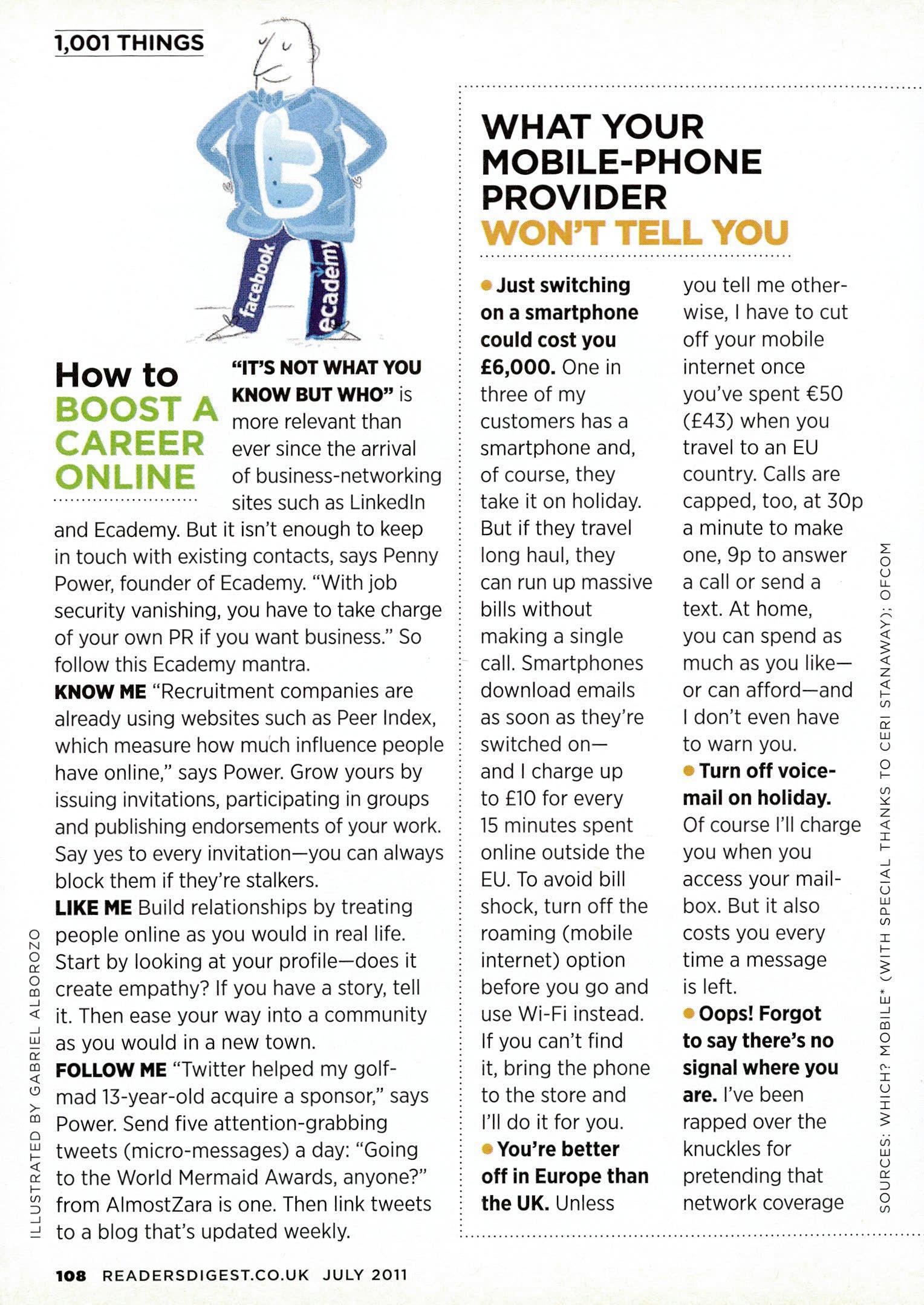
How to BOOST A CAREER ONLINE
"'vs
NOT WHAT YOU
KNOW BUT WHO"is more relevant than ever since the arrival of business-networking sites such as LinkedIn and Ecademy. But it isn't enough to keep in touch with existing contacts, says Penny Power, founder of Ecademy. "With job security vanishing, you have to take charge of your own PR if you want business." So follow this Ecademy mantra.
KNOW ME "Recruitment companies are already using websites such as Peer Index, which measure how much influence people have online," says Power. Grow yours by issuing invitations, participating in groups and publishing endorsements of your work. Say yes to every invitation—you can always block them if they're stalkers.
LIKE ME Build relationships by treating people online as you would in real life. Start by looking at your profile—does it create empathy? If you have a story, tell it. Then ease your way into a community as you would in a new town.
FOLLOW ME "Twitter helped my golfmad 13-year-old acquire a sponsor," says Power. Send five attention-grabbing tweets (micro-messages) a day: "Going to the World Mermaid Awards, anyone?" from AlmostZara is one. Then link tweets to a blog that's updated weekly.
WHAT YOUR MOBILE-PHONE PROVIDER WON' YOU
Just switching on a smartphone could cost you £6,000. One in three of my customers has a smartphone and, of course, they take it on holiday. But if they travel long haul, they can run up massive bills without making a single call. Smartphones download emails as soon as they're switched on— and I charge up to £10 for every 15 minutes spent online outside the EU. To avoid bill shock, turn off the roaming (mobile internet) option before you go and use Wi-Fi instead. If you can't find it, bring the phone to the store and I'll do it for you.
• You're better off in Europe than the UK. Unless
you tell me otherwise, I have to cut off your mobile internet once you've spent €50 (E43) when you travel to an EU country. Calls are capped, too, at 30p a minute to make one, 9p to answer a call or send a text. At home, you can spend as much as you like— or can afford—and I don't even have to warn you.
• Turn off voicemail on holiday. Of course I'll charge you when you access your mailbox. But it also costs you every time a message is left.
• Oops! Forgot to say there's no signal where you are. I've been rapped over the knuckles for pretending that network coverage
1,001 THINGS
SOURCES: WHICH? MOBILE ' ( WI TH SPECIAL TH ANKS TO CERI STAN AW AY); OFCOM ILLUSTRATE D BY GABRIEL ALB O RO ZO
1011 READERSDIGEST.CO.UK JULY 2011
is better than it is, so before you sign up, check out your home and work postcodes on Ofcom's website*. If you can't use your mobile where you want to, you have seven days to return it. But don't expect me to let you out of your contract if you move house and there's no reception. That's your problem.
• I dread it when your contract runs out. I'll throw everything at you —500 free minutes and texts a month, and a fancy phone —to persuade you to renew. And if you get a better deal elsewhere, I'll match it. But I'll try to lock you into a two-year contract and there are huge penalties for cancelling once you're in.
• I love Pay As You Go. There are no free minutes.

Calls often cost more and you pay upfront. Over half of my customers are on Pay As You Go, but many would be better off with a SIM-only contract. You pay for the service, not the phone, and as contracts often run for as little as a month, it's easy to swap.
A You think 0800 calls are free? Not from me they're not—and I charge top dollar for 0845 and 0890 numbers. And although calls to landlines should be free if you're on a contract, it's not always the case on Pay As You Go.
I'll cut you off if you don't use your phone. Please tell your mum to use her mobile every few months. If she doesn't, I'll think the phone's no longer in use and terminate the service, which
means she'll lose any credit on Pay As You Go.
• Don't buy insurance from me. You can get a far better deal on your homecontents insurance —£10 a year instead of £10 a month, say. You'll need to specify if you have a smartphone (they call them PDAs) and tell them the model number.
• You can get good money for your old phone. Want an extra £300? You can get as much as that for an old handset, provided it's in working order. Check out the best deals on MoneySaving Expert*, or sell it on eBay, where you can make up to 30% more. If you want to donate it to charity, sell it first and give them the cash. That cuts out the middleman and means they can reclaim tax through Gift Aid. ■
ICP/ AG E FO TOSTOCK/ PHOTOLIBRARY. COM
'SEE READERSDIGEST.CO.UK/LINKS FOR WEBLINK 109
MEDICINE. WITH MAX PEMBERTON
SAFE KEEPING
When did "the rules" ever come before the patient?
There are times when health-and-safety regulations make me sick. I'm sure this isn't what they're meant to do, but as with all things dreamed up by people in boardrooms wearing suits and drinking skinny lattes, they can end up harming the very people they intend to protect.
Mr Hazlit wanted to go outside. "You can't," came the reply from the nurse. The sudden glorious weather that week had seen patients flocking outside to escape the oppressive heat in the hospital. I was working in the psychiatry ward and had been asked to see Mr Hazlit because the medical staff were worried that he was depressed.
I wasn't surprised. He was going to die. His heart was beginning to fail. He couldn't walk and was confined to a side room. He
had no visitors. He knew he wasn't going to get better, but what he really wanted was to go out in the sun; to feel its warmth on his face, and to breathe fresh air.
Now that seems to me to be a pretty fair request. "It's against health and safety," said the ward sister when I suggested that this would be the best thing for his mood.
This is the blanket reply for anything that deviates from accepted protocol. I wondered exactly where the prohibition on taking sick men out into the sunshine was written.
The problem with health and safety is that it's applied to the wrong things. It's now a general idea rather than a defined protocol, and those working with patients live in its shadow. The ever-increasing litigious
The problem with health and safety is that it's applied to the wrong things
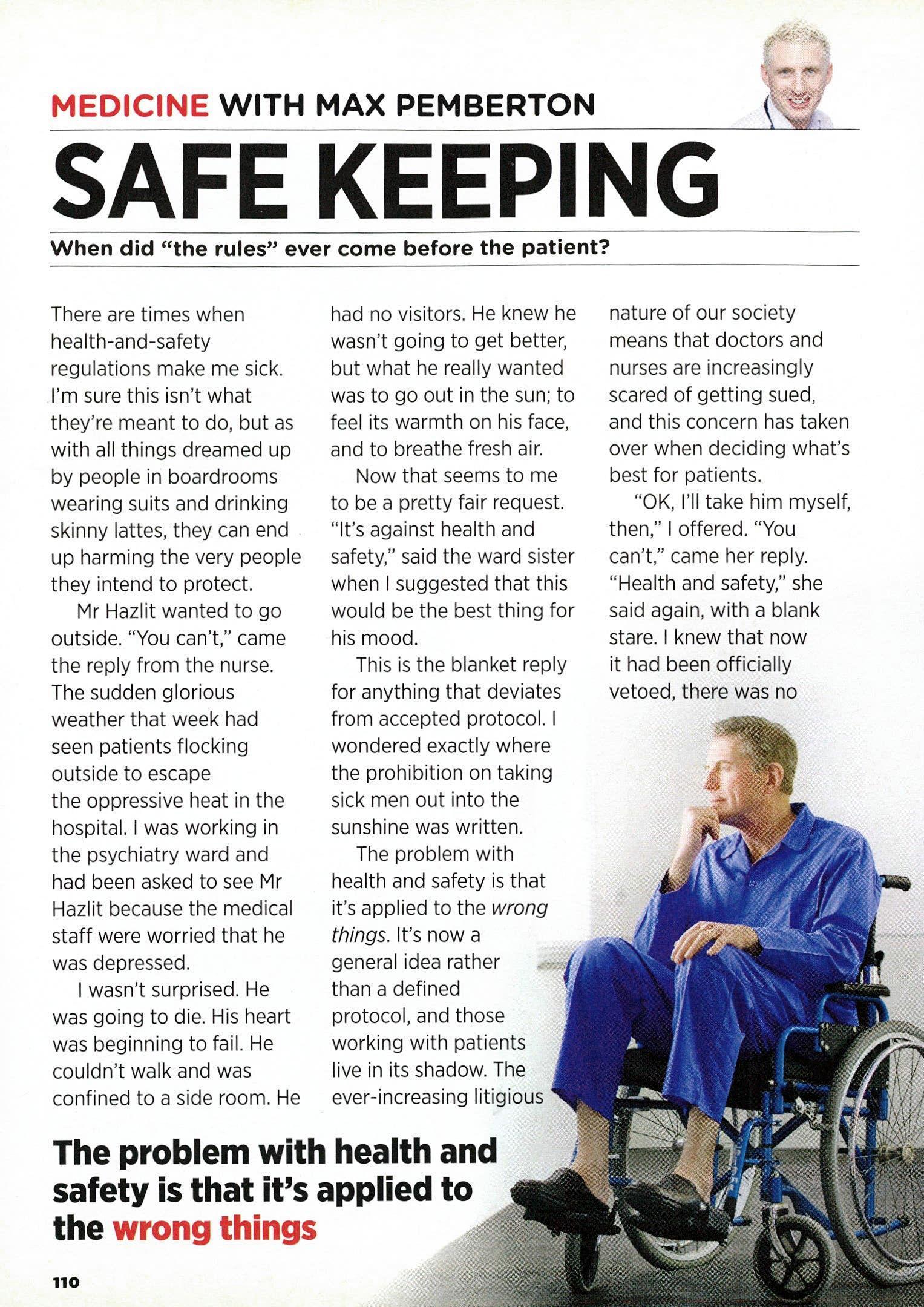
nature of our society means that doctors and nurses are increasingly scared of getting sued, and this concern has taken over when deciding what's best for patients.
"OK, I'll take him myself, then," I offered. "You can't," came her reply. "Health and safety," she said again, with a blank stare. I knew that now it had been officially vetoed, there was no
110
further discussion to be had.
"I'll take full responsibility for anything that happens," piped up Mr Hazlit, who'd been listening from his room. "No, it's against health and safety," the nurse said yet again. I wrote up the notes and left the ward. There was nothing that could be done for Mr Hazlit, and a few days later he died.
Officially, he never did get outside. But, of course, the thing about health and safety is that it can only be enforced while you're at work. I'm sure you can guess what happened, unofficially, at five past five when I wasn't officially working, and the nurse was on her break...
Max Pemberton is a hospital doctor, and the Mind Journalist of the Year 2010.
Max's new book
The Doctor Will See You Now will be published in August.
KNOW YOUR ORGAN

The pancreas is soft and squashy, shaped like the body of a fish and about six inches long. It stretches along the back of the abdomen, behind the stomach.
SOMETHING TO DIGEST
The pancreas produces digestive enzymes that break down fats, proteins and carbohydrates, and secretes these enzymes directly into the duodenum—the first part of the bowel after the stomach. It's controlled by hormones released by the stomach and bowels. The pancreas is clever and only produces inactive enzymes, so that it doesn't accidentally digest itself! (These inactive enzymes become active when in the bowels.) The secretions it produces also contain sodium bicarbonate—baking soda—to neutralise stomach acid as it enters the duodenum and prevent it from damaging the bowels.
The pancreas also releases
hormones directly into the blood, playing a vital role in controlling glucose levels. Glucose is an energy-rich molecule produced when sugars and carbohydrates are broken down by digestion. The pancreas releases insulin, which instructs cells to store excess glucose to ensure that blood-glucose levels stay stable, and that we have stores of energy when needed. The brain can use only glucose for energy, so this is essential.
The pancreas also releases glucagon, which does the opposite to insulin.
WHAT CAN GO WRONG?
Diabetes is the most common problem affecting the pancreas. Type 1 is when the cells stop producing enough insulin. It can affect younger people. Type 2 is when the body becomes less receptive to insulin, so the pancreas has to produce more to have the same effect. This tends to occur later in life.
Pancreatitis is when the pancreas becomes inflamed— gallstones and alcohol are the commonest causes of this.
Pancreatic cancer is hard to spot—read more about it on page 60.
NEXT MONTH:
the ovaries
S TU ART PEARC E/PHOTOLIBRARY. COM; ILLUSTRATED BY DAVI D HU MPHREYS
JULY 2011 READERSDIGEST.CO.UK 111
HEALTH WITH SUSANNAH HICKLING
GET YOUR SUNNY D
It's one of our most essential vitamins—and it's free!
Why do I need vitamin D?
According to Michael Holick, professor of medicine at Boston University and author of The Vitamin D Solution (£15.70), it can help prevent and treat a remarkable number of ailments, from obesity to arthritis, and from high blood pressure to back pain, diabetes, muscle cramps and upper-respiratory-tract infections. It even helps guard against cancer of the breast, colon, pancreas, prostate and ovaries.
OK, I'm interested. Anything else?
Vitamin D can also help support ideal-weight management, safeguard pregnancy and stave off infection and chronic diseases. In fact, it may be our most undervalued and misunderstood anti-ageing secret.
And let's not forget that it helps with depression, dementia, PMS and sleeping disorders as well.
Wow! How do I get some?
Good question. We don't get enough vitamin D in the UK, mainly because the best source is sunlight. This puts us more at risk of MS and osteoporosis, and could explain the resurgence of rickets.
Luckily, it's not too hard to take in some rays at this time of year, but they have to go directly onto exposed skin for about 15 minutes a day between April and September for

the effect to last all year.
You can take vitamin D as a supplement (don't take more than 25 micrograms a day), but it's also found in mushrooms, oily fish, fortified cereals, dairy and eggs. Diet rarely supplies enough, though— you'd have to eat 50-100 egg yolks to get your daily hit of vitamin D.
So, as long as you don't burn, why not put on a T-shirt, put down the suncream and go for a short walk in the sun?
MOST COMv EDICAL CONDITION IN THE WORLD
112
KEVIN ARNOLD/ ICONICA/ GETTY IM AGES

TREAT YOUR FEET
We women all know that wearing high heels causes damage to our feet (although when did that ever stop us?), but they might cause even more than we thought. According to Mike O'Neill, vice-president of the Society of Chiropodists and Podiatrists (SCP), heels are to blame for osteoarthritis, bunions, sciatica, a shortening of the Achilles tendon, and ankle, knee and hip-joint misalignment.
Not to mention the injuries you can get if you fall off them. But a little TLC goes a long way towards avoiding long-term problems. Try to:
■ Wear flats to and from work, and keep heels at the office or in your car for alternative wear during the day.
■ Change your shoes every day—both the height and style.
■ Swap heels for flats in summer as your feet may swell.
■ Get in touch with your inner hippy and walk barefoot occasionally! It allows feet to breathe.
■ Get down to the gym and tone up your feet and legs. Find out more from the SCP website*.
HEART-HEALTHY FOODS
Boost your intake of these:
FRUIT & VEG
Carrots, sweet potatoes, squash, dark leafy greens, asparagus, broccoli, apples, red grapes
DAIRY
Skimmed milk, low-fat yogurt
WHOLE GRAINS
Black rice, quinoa, unsweetened oatmeal
FISH
Rainbow trout, salmon, sardines
LEAN MEAT AND ALTERNATIVES
Tofu, lentils, beans
HEALTHY FATS
Extra-virgin olive oil, soya-bean oil, canola (rapeseed) oil
GOOD REASONS TO BE AN ORGAN DONOR
Organs traditionally come from people who die in road accidents or of a brain haemorrhage. Better road safety and treatment mean there are fewer donors. Is Surgeons can split livers, meaning that one organ can help several people.
Sign up to the Organ Donor Register by calling 0300 123 23 23 or going to readersdigest.co.uk/links.
JASON LAVERIS/FILMMA GIC/GETTY IMA GES; ( RIGHT) PHOTOLIBRARY. COM ( 5); ALAM Y ( 2)
"SEE READERSDIGEST.CO.UK/LINKS FOR WEBLINK JULY 2011 READERSDIGEST.CO.UK 113
THE DIET DOCTOR
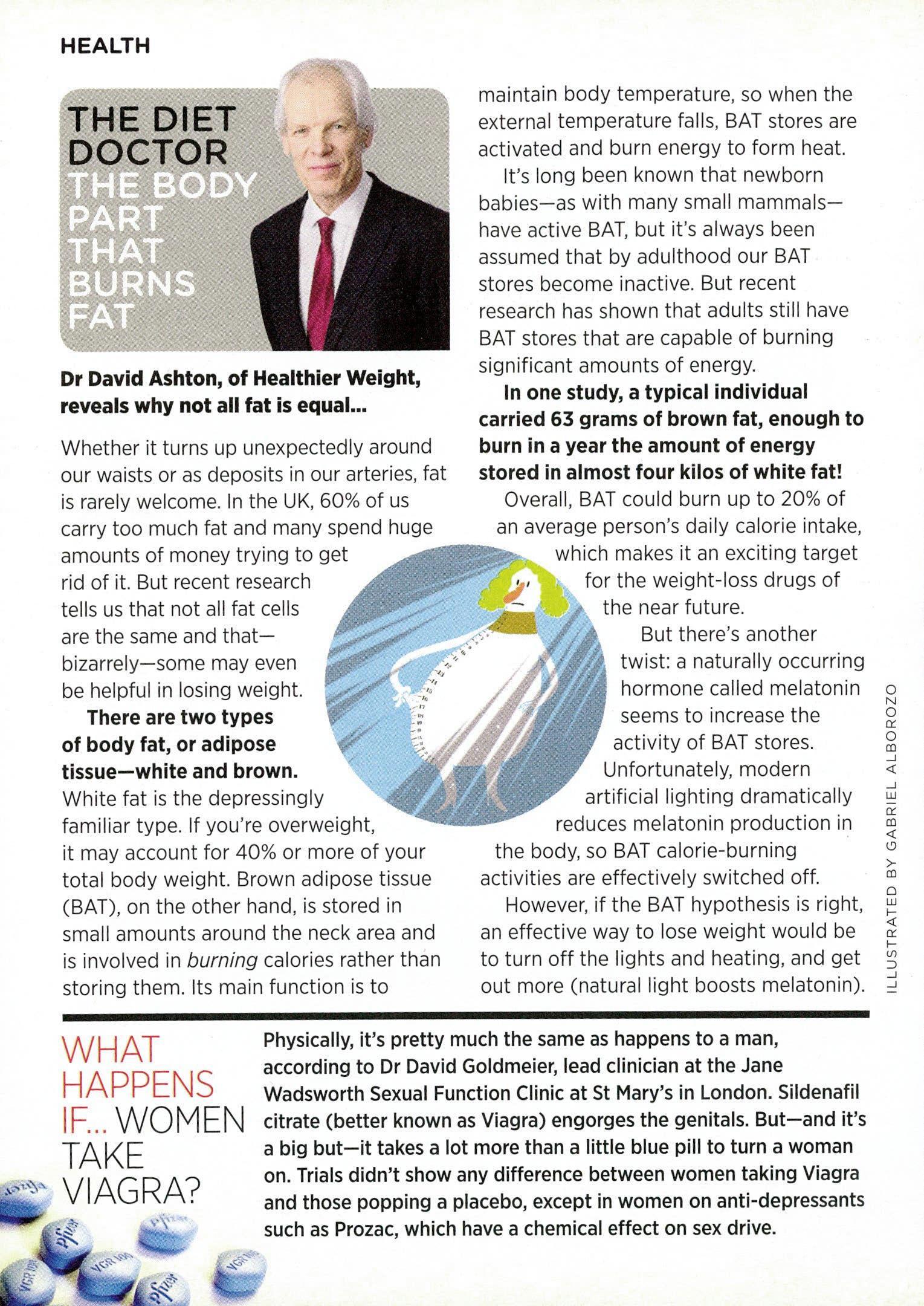
Dr David Ashton, of Healthier Weight, reveals why not all fat is equal...
Whether it turns up unexpectedly around our waists or as deposits in our arteries, fat is rarely welcome. In the UK, 60% of us carry too much fat and many spend huge amounts of money trying to get rid of it. But recent research tells us that not all fat cells are the same and thatbizarrely—some may even be helpful in losing weight. There are two types of body fat, or adipose tissue—white and brown.
White fat is the depressingly familiar type. If you're overweight, it may account for 40% or more of your total body weight. Brown adipose tissue (BAT), on the other hand, is stored in small amounts around the neck area and is involved in burning calories rather than storing them. Its main function is to
WHAT HAPPENS IF... WOMEN TAKE VIAGRA?
maintain body temperature, so when the external temperature falls, BAT stores are activated and burn energy to form heat.
It's long been known that newborn babies—as with many small mammals— have active BAT, but it's always been assumed that by adulthood our BAT stores become inactive. But recent research has shown that adults still have BAT stores that are capable of burning significant amounts of energy.
In one study, a typical individual carried 63 grams of brown fat, enough to burn in a year the amount of energy stored in almost four kilos of white fat!
Overall, BAT could burn up to 20% of an average person's daily calorie intake, which makes it an exciting target for the weight-loss drugs of the near future.
But there's another twist: a naturally occurring hormone called melatonin seems to increase the activity of BAT stores. Unfortunately, modern artificial lighting dramatically reduces melatonin production in the body, so BAT calorie-burning activities are effectively switched off.
However, if the BAT hypothesis is right, an effective way to lose weight would be to turn off the lights and heating, and get out more (natural light boosts melatonin).
Physically, it's pretty much the same as happens to a man, according to Dr David Goldmeier, lead clinician at the Jane Wadsworth Sexual Function Clinic at St Mary's in London. Sildenafil citrate (better known as Viagra) engorges the genitals. But—and it's a big but—it takes a lot more than a little blue pill to turn a woman on. Trials didn't show any difference between women taking Viagra and those popping a placebo, except in women on anti-depressants such as Prozac, which have a chemical effect on sex drive.
HEALTH
ST RATED BY GABRIEL AL BOROZO
ILLU

UK's No.1 support for eyes &Heart
"Visionace
tablets help to maintain my eye health and vision"
"I like to take ace' original to help maintain my heart health and circulation."
Looking after your heart and eye health with Vitabiotics is an investment for your future wellbeing.
Visionace® is a comprehensive, research based nutritional supplement designed to help maintain healthy eyes and vision. The research tested formula contains vitamins, minerals, antioxidants and lutein which are all vital for the health of the eye. Visionacee Plus dual pack contains the additional benefit of an Omega-3 capsule. (Recommended approved by leading UK optometrists
Cardioace's advanced formula includes essential heart health vitamins, antioxidants, omega-3 and garlic. New Cardioaceo Plus contains the contains the additional benefit of 1.3g of Phytosterols to help maintain healthy cholesterol levels and heart health.
Garlic UK's N°1 COMPREHENSIVE HEART HEALTH BRAND Cardioas& Original Britain's leading supplements for specific life stages - VITABIOTICS WHERE NATURE MEETS SCIENCE heart health Cardloace Plus Sterols
visionace® Visiones& Plus Omega-3 Visionace' Orig nal Visionace iona-do ealth y !us eye & goo V151.
Cardioace heagood Miy eyesvision rdioate ...war OYMInel, Plant sterols & h c eircautart o h n ealth From Boots, Superdrug, Holland & Barrett, GNC, pharmacies, supermarkets, health food stores & www.vitabiotics.com Vitamin supplements may benefit those with nutritionally inadequate diets. ProldmA.r.H.Beekett 111 Pr'''' Univerattyr,Andon' tablets capsules visionace Cardioge
BEAUTY
WITH JAN MASTERS
NOW FEEL THIS
Bringing you some hands-on advice for pampering your paws
Facial skincare is all very well, but don't forget your hands—they can flag up your age quicker than a neon sign flashing your birth certificate above your head.
"The skin ages faster on your hands due to daily exposure to water, soap, chemicals and UV rays. And, don't forget, UVA penetrates through the car windows when you're driving, even on cloudy days," says Dr Nick Lowe, consultant dermatologist at the Cranley Clinic. "It's important to keep hands fully moisturised and protected all year. Skin has and excellent capacity for repair, so it's never too late

to start caring for your hands."
Every morning, get into the habit of applying a sunscreen with UVA and UVB
Noella Gabriel recommends weekly hand treatments. 1, Wipe hands with a warm, damp flannel.
Massage with oil—try jojoba or almond.
Gently exfoliate with a
protection. Spraying the backs of your hands stops you from getting greasy palms—try Nivea Sun Invisible Protection Transparent Spray 30, £14.35.
For an all-round, daily hand cream, Dr Nick Lowe's Double Duty £13.27, and Clinique's new Derma White Brightening Hand Cream, SPF 18, £18.50, both have built-in UVA and B protection and are also designed to help smooth uneven skin tone. Avoid prolonged contact with water, and slather on a replenishing formula at night. But consider its scent. One of my friends said that the perfume of 8 a certain lotion kept waking her up. LShe swore it even affected her sex c i life because her partner turned up a his nose! Simple Derma Intensive "5 Relief Hand Cream, £4.07, is a good, no-perfume option.
According to Noella Gabriel, director of product and treatment development at L T, Elemis, the hand-care sector has become very sophisticated—Elemis Pro-Collagen i; Hand and Nail Cream, £29.70, contains a 2 cocktail of antioxidants and a marine alga to help hands look smoother and younger. zi t
scrub, working from wrists to fingertips. Rinse in a bowl of warm water (not hot), adding a softening splash of milk. 5. Dry, then apply a facial or body serum.
6. Massage in Elemis Pro-Collagen Hand and Nail Cream to seal in the serum.
Do this when you won't need to wash your hands for a couple of hours—the best time's just before bed.
116 READERSDIGEST.CO.UK JULY 2011

HOW TO Boost your career Iron properly Talk to your doctor Soothe a sting PLUS,contact us today and we'll sendyou a FREE BOOK worth Don't miss out on this great offer! Call FREEnow on 0800 316 1176 and quote code 254 * Go online visit www.readersdigest.co.uk/gift FREE BOOK The Seven Wonders of the 21st century "I was trapped in a floating coffin" What your mobile-phone provider won't tell you The best of British... picnic spots PLUS Dom Joly Deborah Meader Ed Stourton This could be heaven ...or this could behell REBECCA ARLINGTON'S OLYMPICS COUNTDOWN STARTS HERE PAGE 38 JULY EXTRACTS Eirerything Is Obwous by Duncan Watts The Art of CaMP1.9 by Matthew De Abaltua ADVERTISEMENT The perfect gift12issues for just £12! -save 71% on the full cover price only *1/2\ 0 per IsSUet Give someone a real treat this year and one that will last them all year round!
SCENTS OF HISTORY
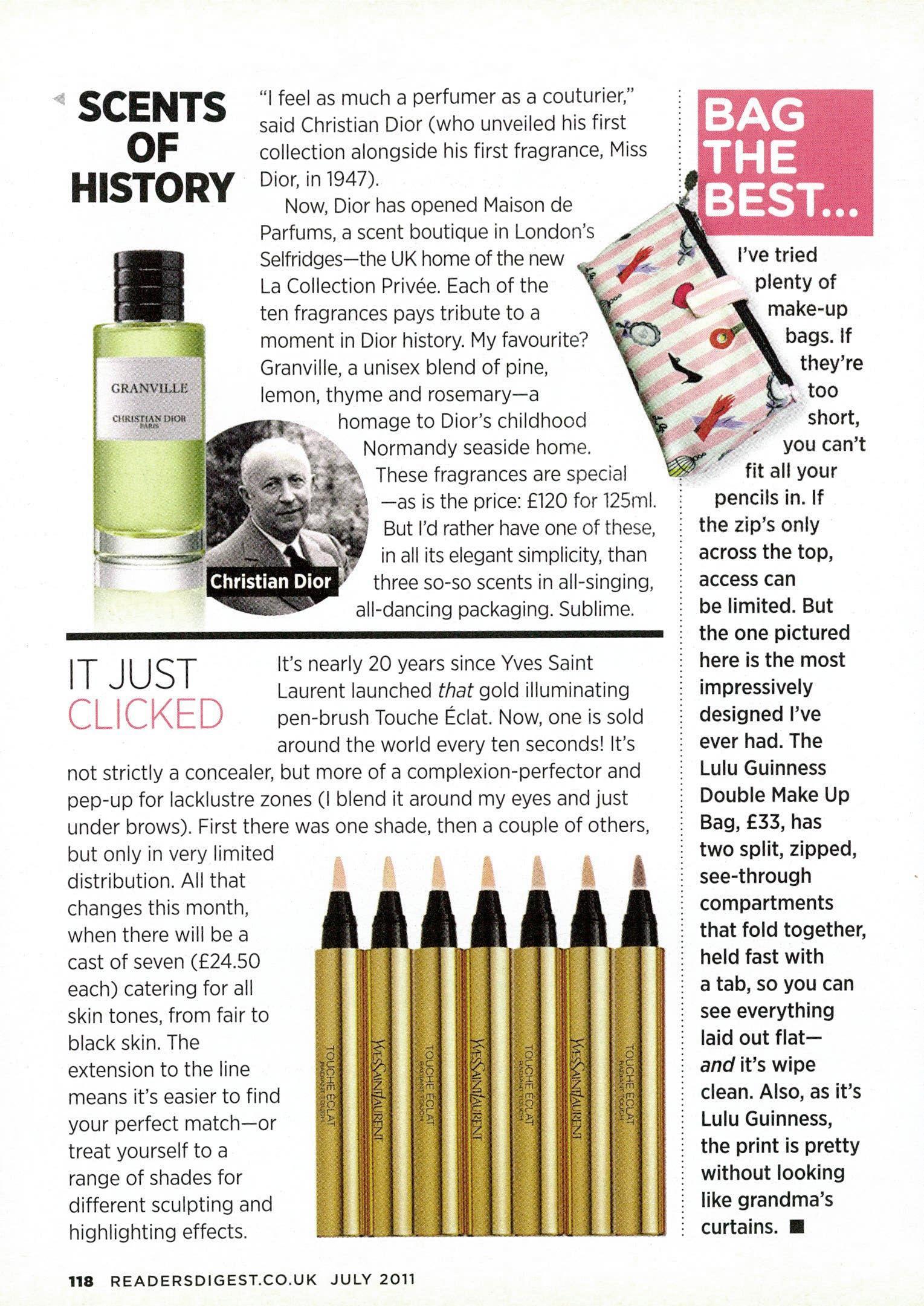
"I feel as much a perfumer as a couturier," said Christian Dior (who unveiled his first collection alongside his first fragrance, Miss Dior, in 1947).
Now, Dior has opened Maison de Parfums, a scent boutique in London's Selfridges—the UK home of the new La Collection Privee. Each of the ten fragrances pays tribute to a moment in Dior history. My favourite? Granville, a unisex blend of pine, lemon, thyme and rosemary—a homage to Dior's childhood Normandy seaside home. These fragrances are special —as is the price: £120 for 125m1. But I'd rather have one of these, in all its elegant simplicity, than three so-so scents in all-singing, all-dancing packaging. Sublime.
IT JUST CLIC'CE3
It's nearly 20 years since Yves Saint Laurent launched that gold illuminating pen-brush Touche Eclat. Now, one is sold around the world every ten seconds! It's not strictly a concealer, but more of a complexion-perfector and pep-up for lacklustre zones (I blend it around my eyes and just under brows). First there was one shade, then a couple of others, but only in very limited distribution. All that changes this month, when there will be a cast of seven (£24.50 each) catering for all skin tones, from fair to black skin. The extension to the line means it's easier to find your perfect match—or treat yourself to a range of shades for different sculpting and highlighting effects.
BAG THE 4BEST...
I've tried plenty of make-up bags. If they're too short, you can't fit all your pencils in. If the zip's only across the top, access can be limited. But the one pictured here is the most impressively designed I've ever had. The Lulu Guinness Double Make Up Bag, £33, has two split, zipped, see-through compartments that fold together, held fast with a tab, so you can see everything laid out flat— and it's wipe clean. Also, as it's Lulu Guinness, the print is pretty without looking like grandma's curtains. ■
118 READERSDIGEST.CO.UK JULY 2011

UK
shoppers reminded that guaranteeing a cheque by card will no longer be possible after 30 June
30 June sees the end of the Cheque Guarantee Card Scheme and the Payments Council is urging people that, although they can still use a cheque after this date, they may want to try out other ways to pay.
After 30 June, you will still be able to pay for goods and services by cheque and businesses will still be able to accept them, just not guaranteed by card.
Cheques guaranteed by cards have been in terminal decline as alternatives such as debit and credit cards, electronic transfers and online payment facilities have grown more popular.
The central processing system for cheques will not close until 2018. It will only close if, by 2016, alternatives are in place and acceptable to all who need them.
Gary Hocking, Acting Chief Executive of the Payments Council, said:
"The way we pay has changed beyond recognition. The decision to close the guarantee card scheme was taken so that people don't get caught out as fewer businesses choose to accept them. This is separate from our work to
set a target date for closing the central processing system for cheques in 2018. We will ensure that convenient, safe and efficient alternatives — including existing options — are in place. If the alternatives are not ready, or not acceptable, we won't go ahead.
"In the meantime customers can still use cheques, just not with the guarantee. Banks and building societies have all committed to continue providing cheque books for anyone who needs one. If and when a decision is taken about the future of cheques we will make sure customers are helped through any change."
Find out more about different payment methods by visiting the Payments Council's website www.payyourway.org.uk or contact your bank to find out how to get started with telephone and internet banking.
Advertisement
CONSUMER WITH DONAL MAcINTYRE
FIGHT THE SCAN
Defining the rights of a checkout detainee
Like it or loathe it, the self-service checkout is here to stay. It has always seemed to me to be a great testimony to shops' confidence in the honesty of their customers: there are no queues, you can do it at your own pace and, most importantly for me as a dad, you can keep the kids occupied scanning the items. Until the dreaded rescan, that is.
Now for those who haven't encountered this indignity, it involves unpacking all your finely scanned goods and enduring a "Revenue and Customs"-like reappraisal of the accuracy of your final bill. You feel like a drug dealer and, yes, everybody is watching. The stores uniformly tell you it's an automatic, random act by a computer and shouldn't be taken personally.
Certainly, the in-store staff don't get to pick their victims, but it's clearly not random. Two recent visits to a leading supermarket led to two immediate rescans for me and my wife.
I was furious: it added another 25 minutes to my shop and was acutely embarrassing. Subsequent investigation and complaint suggested that the store has adverse information linked to my loyalty and bank cards, which requires the computer to force a rescan every time.

This obviously defeats the purpose of easy self-checkout systems for me and other unlucky customers. If this has happened to you, let me know. You're entitled, under the Data Protection Act, to find out the information and to challenge it (and if you do complain, again, let me know how you get on).
After my complaint, the retailer sent me a parcel containing gin (not my drink), baby cream (why?), shortbread biscuits (thanks) and shower gel (I was smelling that bad?). Forget the mystery of the rescans: try to figure out the genuinely random basket of gifts by way of contrition. Bizarre!
120 READERSDIGEST.CO.UK JULY 2011
IL LU STRATED BY STEVE CAPLI N
IF YOU DON'T ASK...
Donal answers your questions. Please email queries to excerpts @readers digest. co.uk
QI handed my coat over to the assistant when I went to get my hair done, but when I got it back, my coat had a tear in it that definitely wasn't there before. Even though the closet carried an "All items left at owner's risk"

Donal Maclntyre is an investigative journalist and a former presenter of ITV's London Tonight
disclaimer sign, can I still claim money for my damaged coat?
AThe salon is required to take reasonable care of your coat, so if it's damaged you should be able to claim compensation. Similarly, if in the course of a treatment some liquid or dye spills on your clothes, you may also be entitled to claim a cleaning bill on the
basis that the service was not provided with reasonable care and skill.
QIn these straitened times, stores often sell damaged goods at a reduced cost. I'm only interested in making calls on a phone, and not taking photographs. But if I buy a discounted phone with a broken camera, and the fault is pointed out to me at the time, am I entitled to a refund if something else goes wrong once I've taken it home?
AIf another defect ,,,occurs then you are entitled to a refund or replacement. (Ignore any shop assistant who tells you otherwise.) In this circumstance shops may offer you a replacement that's better than your defective purchase (instead of a cash refund), so you may end up a very lucky punter!
FREE WHEELS
Ryanair don't make a habit of giving anything away for free*, so imagine the joy of three lucky passengers flying from Milan to Madrid who won a £12,000 car each because of a printing error on the airline's in-flight scratchcard competition! Fraudsters have since duped others into thinking they've won too, persuading them to pay £500 for the delivery of a non-existent car. The airline now warns passengers and others that you can only win if you fly. We trust it has tightened up its printing procedures to prevent too many onboard winners in the future, though! * Have you had something for nothing? Let us know and we'll share your joy.
IMAGE SOURCE/PHOTOLIB RARY. COM
JULY 2011 READERSDIGEST.CO.UK 121
WITH VICTORIA BISCHOFF
MAKING A CLAIM
Don't miss out on your chance of compensation for mis-sold PPI
Payment Protection Insurance (PPI) is sold alongside loans, credit cards and mortgages. It's supposed to cover your repayments in the event that you can't work. The main problem is not with the policies themselves, but with the way they've been sold.
For example, some people thought they were compulsory, or would improve their chances of getting the loan they wanted— neither of which is true. PPI policies also come with a long list of exclusions, and many people didn't have these properly explained at the time.
"YOUR MIS-SEWN6 CLAIM IS BEING HELD IN 4

As a result, some people—those with a pre-existing medical condition—might well have ended up with a policy they could never claim on.
THE PPI TIMELINE
2005-2008 The Financial Services Authority (FSA) fines some providers for poor selling practices.
MAY 200: The FSA bans single-premium PPI policies, where
If this applies to you, or you feel you
premiums are added to the cost of your loan up front.
OCTOBER 2009
The Competition Commission bans sale of PPI alongside other products.
SE— -
The FSA introduces new rules on how to handle PPI complaints.
OCR, 2010
The British Bankers' Association (BBA)
Queue A VERY, VERY, 1-ONG QUEUE
122 READERSDIGEST.CO.UK JULY 2011
were put under pressure by the seller, then it's likely you have a case.
Thanks to a High Court ruling in April, the onus is on the banks to contact you if they suspect you've been mis-sold a PPI policy. Likewise, if your complaint was put on hold during the court case, the bank should now deal with it without being prompted. But don't feel you have to wait —contact the company who sold you the policy and make a complaint.
Unhappy with how your complaint has been handled? Then go to the Financial Ombudsman Service (FOS). If it finds in your favour, it can order the provider to refund the premiums you've paid and award up to £1,000 in compensation. Just fill in a complaint form or call the FOS helpline*.
Can't find the terms and conditions or proof of purchase you need? Ask your provider for a copy (you may have to pay a small fee). But if it's for a policy that ended more than six years ago, it's unlikely your provider will still have a record of it. While you can still complain, your chance of success will be reduced.
Whatever you do, don't use a thirdparty reclaim company that promises to speed up your case in return for a cut of the money you get back. It won't boost your chances at all.
launches a judicial review, arguing that it's unfair to force banks to apply new rules retrospectively. The High Court rules against them the following April.
MAY 2011
Lloyds announces it has put £3.2 billion aside for claims and withdraws support for any appeal. Four days later, the BBA announces it won't appeal the ruling.
FOUR POTENTIALLY COSTLY PITFALLS 0 AVOID

1
If you have a long-term deal and you don't inform your provider you want to switch before your deal ends, you may be rolled over onto the same—or perhaps a more costly —deal. Most providers only give a couple of weeks' notice, so keep a note of when your contract ends. With National Savings & Investments certificates, for example, you get just ten days to decide what to do with your money next.
PI Leave your mobile unattended in iL a public area and it's unlikely your insurance will cover your claim if it gets stolen. Some say they pay out if you leave it unattended "accidentally", but it's hit and miss. Pay attention to the small print.
3
An authorised overdraft can be useful for avoiding charges if your balance drops below zero. But did you know your bank can legally withdraw your overdraft or lower your limit any time it wants? You usually get just 30 days' notice before having to pay the money back—and some people will have an overdraft of £1,000 or £2,000 (though most banks claim they'll "do all they can to help" if you're in financial difficulty).
4
Many people prefer to spread their insurance payments over the course of the year, but insurance companies usually charge interest. This could be anything from 6% to 29%, according to Which?—a huge sum if you consider an average APR of 18% would add around £126 to the cost of a £700 premium. ►
'SEE READERSDIGEST.CO.UK/LINKS FOR WEBLINK 123
GETTING THE BEST DEA ON ABROAD
If you're planning to travel abroad this summer, it's crucial you sort out your holiday money before you leave—or you risk being hit with some extremely costly charges.
"A good exchange rate probably isn't top priority when you're getting ready for a holiday, but it might shock you to learn that Brits visiting Europe will find the cost of goods around 30% higher than before 2008, simply because the pound isn't worth as much as it used to be," says Christina Weisz, director of foreign exchange specialists Currency Solutions.
"Although there's nothing you can do about the strength of the economy, you can make your holiday money go further by getting the very best rate available, and avoiding any fees or commissions on your currency."
USING PLASTIC
Banks often charge up to 3% commission, as well as transaction fees, when you use a debit or credit card abroad, and many also tend to offer a poor exchange rate. Then there's usually a fee for
using your card to withdraw cash—either a set charge or a percentage of the amount you withdraw. If it's the former, it makes sense to make one large withdrawal rather than several smaller withdrawals.
Fortunately, there are some specialist credit cards available—such as the Halifax Clarity and Sainsbury's Gold cards —that give good rates and don't charge you a penny to use their card abroad. The standard APR on spending can be pretty uncompetitive on this type of card, so you'll need to clear your debt in full each month to avoid being hit with a hefty interest charge.
If you prefer to use a debit card, some current accounts are much better than others. Norwich & Peterborough building society, for example, offers its customers 0% on overseas spending and doesn't charge for cash withdrawals. To make sure you're eligible to join the society, read the terms before you apply. Applications for credit cards and current accounts can take weeks to go through, so you have to be organised.
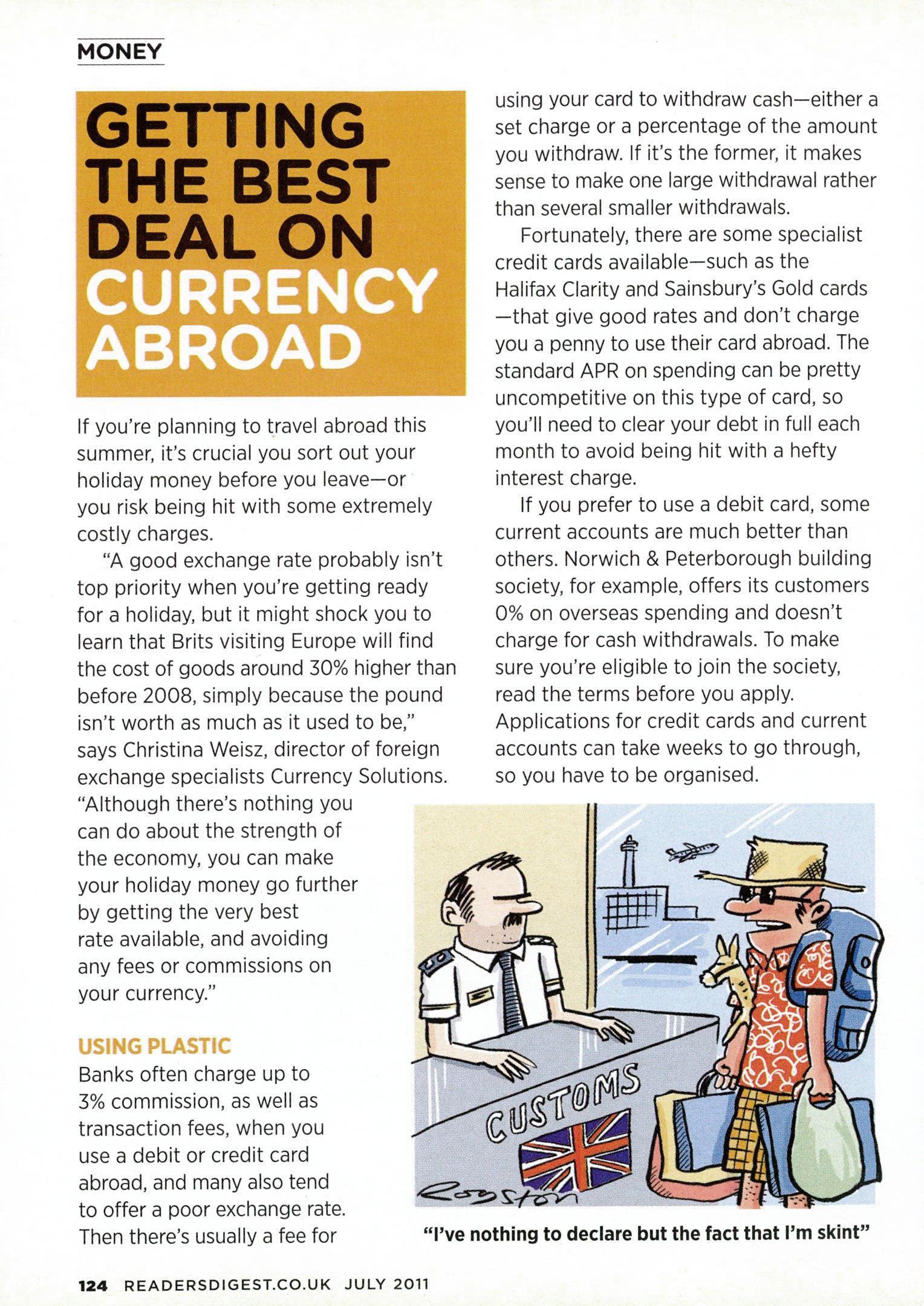
"I've
nothing to declare but the fact that I'm skint"
MONEY
124 READERSDIGEST.CO.UK JULY 2011
USING PREPAID CARDS
If you don't want to take out a new card or are worried your credit rating isn't strong enough to apply for one, you may want to consider opting for a prepaid card from the likes of Caxton FX, FairFX, Travelex and Currency Solutions.
"Prepaid currency cards, such as PocketCurrency, allow you to transfer your holiday money onto a Mastercard and withdraw cash or pay at point of sale, without exorbitant fees and with a good exchange rate," explains Christina Weisz. "The card is easy to load by SMS text or online, and can be topped up in seconds. Using a prepaid card also gives you a statement of what you've spent."
The beauty of this type of card is that you won't lose everything if it's stolen or mislaid—just what you put into that account. But you may have to pay a small charge to withdraw cash. And even though it only takes a few minutes to apply online, your card may take a couple of weeks to arrive.
USING CASH
Rates and fees can vary hugely, so it's always worth doing your homework. In many cases you'll get a better deal if you preorder your currency online. What's more, you'll have a chance to monitor what the exchange rate is doing, rather than being forced to pay whatever the rate is on that day.
Be wary of firms that advertise as "commission free"—you may well find the exchange rate is terrible—and watch out for expensive "handling charges". Finally, whatever you do, never exchange your money at the airport—they tend to offer the worst rates.
THE GROUPON EFFECT
"Groupon deals" sound great. Just register with a group-buying website—Groupon, Groupola, Living Social or Wahanda, for example—and get sent special offers every day for everything from mini-breaks to meals out.
Group-buying deals use their "collective power" (and your data) to bargain with businesses and score discounts. This means that, in some cases, you'll only get the deal if enough people sign up.
Are these websites just too good to be true? Well, not exactly... but keep an eye on the small print. What's the refund policy? When does the deal expire? Do you have to use

your voucher at a certain time?
There have also been complaints from people struggling to book because the deal is oversubscribed, so it's worth finding out how long you'll have to wait. Websites often advertise discounts of up to 90%, but this isn't always strictly true —you might get a better deal by going direct. You can then also check if the company itself is reputable. Finally, be strong —it's all too easy to buy treats you don't really need. ■
Victoria Bischoff is a personal finance reporter at Citywire Money, an independent website that helps people make the most of their money. See readersdigest.co.uk/links.
JULY 2011 READERSDIGEST.CO.UK 125
FRENCH FANCY
Here's a really easy way to turn a salad into a class act
Simple cooking is what I now love more than anything. Yes, I accept that I've come full circle, but there's no harm in that. I'm interested in dishes that are easy to prepare, but still have a sense of occasion in these times of austerity, cutbacks and general apprehension.
So let's hear it for salade Lyonnaisea fancy title for a no-bother starter or a tasty main course that looks great on the plate and can readily be passed off as healthy. In fact, you can make it as healthy or otherwise as you like by adjusting the ingredients. Add some more bacon, if you want, or just go with a few crispy bits, but whatever you do, don't skimp on the egg! Then simply serve with a crisp dry white wine and some crunchy bread.
Lyon is something of a gastronomic Mecca in France, with loads of Michelinstarred restaurants. And the chances are that most of them will have salade Lyonnaise on their menus, even if it's languishing in the small print.
But quite why anyone wants to go anywhere in the world other than Britain at this time of year is beyond me. So why not stay here and invite a bit of France to your dining table? ■
Marco Pierre White, the "godfather" of modern British cooking, is a restaurateur and TV personality.
SALADE LYONNAISE
(serves 2)
2 rashers of good-quality bacon, diced Extra-virgin olive oil, for frying and dressing
One whole frisee salad (also known as curly endive), heart only White-wine vinegar 2 eggs Croutons
Fresh parsley or chervil (or fresh herbs of your choice) to garnish Maldon sea salt
1. In a non-stick frying pan, fry the diced bacon until it's perfect for you.
MARCO'S
2. Don't bother making a vinaigrette dressing. Just splash the frisee leaves with olive oil and then white-wine vinegar. Using your hands, toss the salad so that the oil and vinegar coat the leaves. 3. Poach the eggs. 4. In a bowl, assemble the salad like this: frisee, then croutons, perch the poached egg on top of the croutons, then sprinkle over the bacon and the parsley or chervil. x Top with a splash of olive oil and a
pinch of sea salt.

Flick half a pinch of black pepper onto the white of the egg. It will add taste but, more importantly, make the salad look irresistible.
WITH MARCO PIERRE WHITE ‘11-111„t
8
LL 0 w cc 0 0 0 a.
126 READERSDIGEST.CO.UK JULY 2011

DRINK WITH NIGEL BARDEN
ALE AND HEARTY
Think beer's boring? Prepare to challenge your taste buds
Even if you're not a regular imbiber, you're sure to know the basic beers: lager, bitter and stout. Then there's brown ale (dark and nutty), mild (mahogany or bronze and lower in alcohol, around 3.5%), IPA (India Pale Ale—dry and punchy enough to withstand a rough passage when exported to India) and Pilsner (the golden lager named after the Czech city, Pilsen.)
But there's a whole world of intriguing, tasty beers out there that could attract new drinkers.
Long before hops were used as a flavouring, the Scots were picking heather to make Fraoch Ale.
Then there's Grozet Ale—its name comes from the Gaelic for the gooseberries that are mixed with bog myrtle (an
aromatic moorland bush, good for keeping midges at bay) and meadowsweet (an almond-flavoured herb) to produce this unusual beer. More recent British beers use equally exotic ingredients: Meantime Brewery's caffeinepacked coffee beer uses Rwandan Arabica k' beans; Young's Double Chocolate Stout combines bitter chocolate with dark roasted-chocolate malted barley (it's great at the end of a meal); and Waggle Dance, brewed in Bedford, uses honey to enhance the flavour.
Across the Channel, Belgium's Liefmans
Kriekbier (cherry beer) is fruity, dry and grown-up. Then there's German Rauchbier, or smoked beer, from Bamberg. Aecht Schlenkerla is a brilliant version— match it with smoked meats, cheese and fish.
MIGHTY MAGNUM
Winemakers love a magnum. At 150c1, the liquid-to-glass ratio lets the wine age perfectly. Champagne and Red Bordeaux 0 are commonly sold in larger bottles, as is Burgundy and some 0 Aussie reds. But H 0 winemakers aren't so keen on quarter- or half-size bottles— 0 the wine matures 0 H too fast and is 0 less predictable. •
Nigel Barden is the food rl and drink presenter on Simon Mayo's show on BBC Radio 2, and chairman a , of the Great Taste Awards. t,
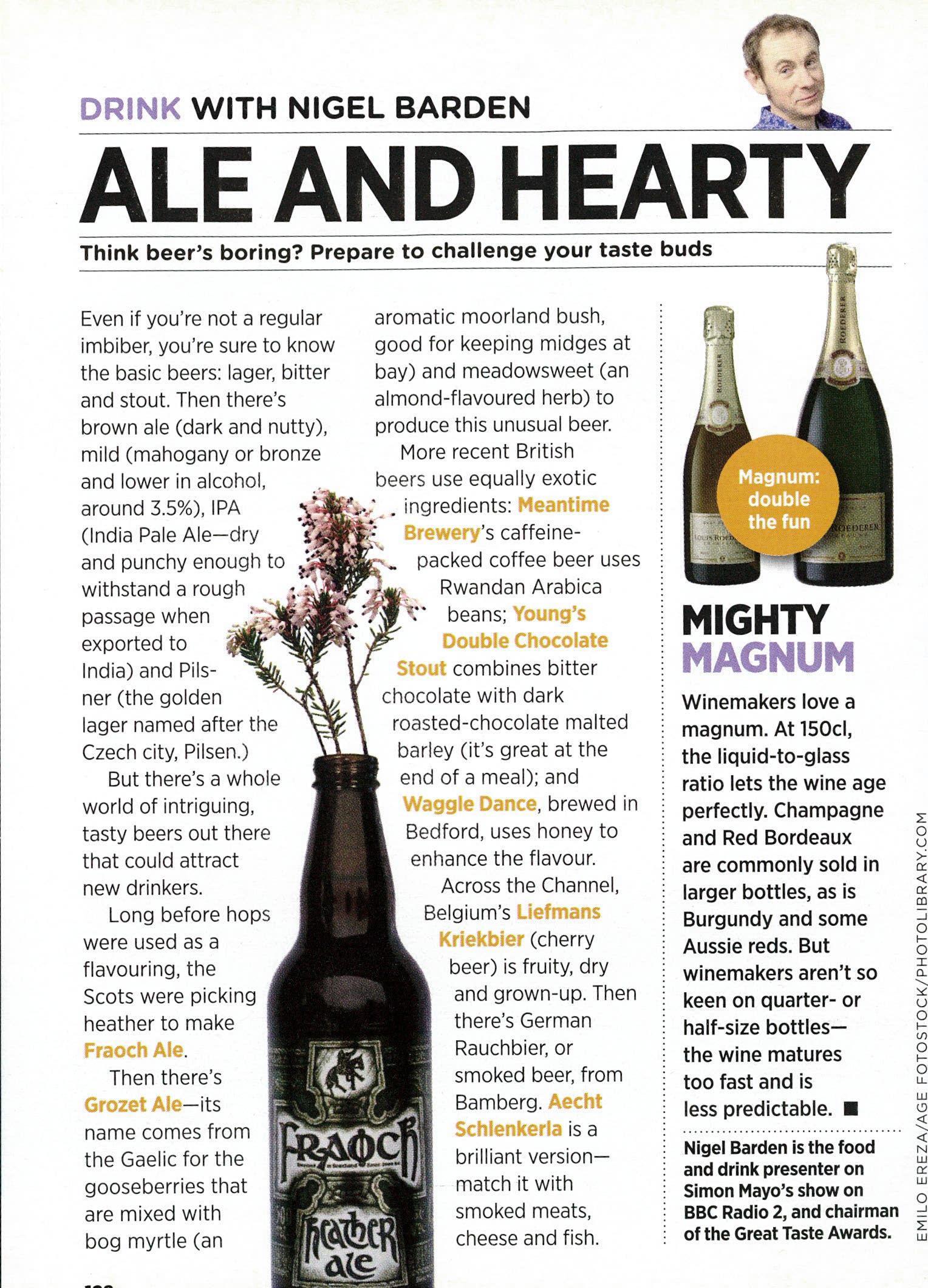

MONEYCORP commercial foreign exchange SENDING MONEY OVERSEAS? Our experts will help you make the most of your funds - which is why 99% of our customers would recommend our services To get the best exchange rates Call 0800 910 1845 or visit www.moneycorp.com/ReadersDigest
GARDENING WITH BOB FLOWERDEW atikk
AN APPLE A DAY
Keep your kitchen supplied with a steady crop of eaters and cookers
I "inherited" three apple trees. One does well, though the fruits don't keep; another is failing and rarely fruits; the third is much bigger and crops hugely, but the fruits are cracked, hard and scabby. Would you replace the poorer two with better trees?
AIt's never a good idea to put new trees near where others have been—they rarely do well. I suspect your problem trees are the frequently found combination of James Grieve—a tasty, early Cox's Orange Pippin, which is notoriously difficult but classic— and a Bramley's Seedling, a rather vigorous cooker. Rather than replace them, try giving the iffy Cox plenty of well-rotted manure (or compost) and water regularly with seaweed solution. Give the Bramley wood ashes and plenty of water, and in winter make sure you remove all mummified apples and fruitlets.
I'd also recommend thinning the Bramley fruits, removing the
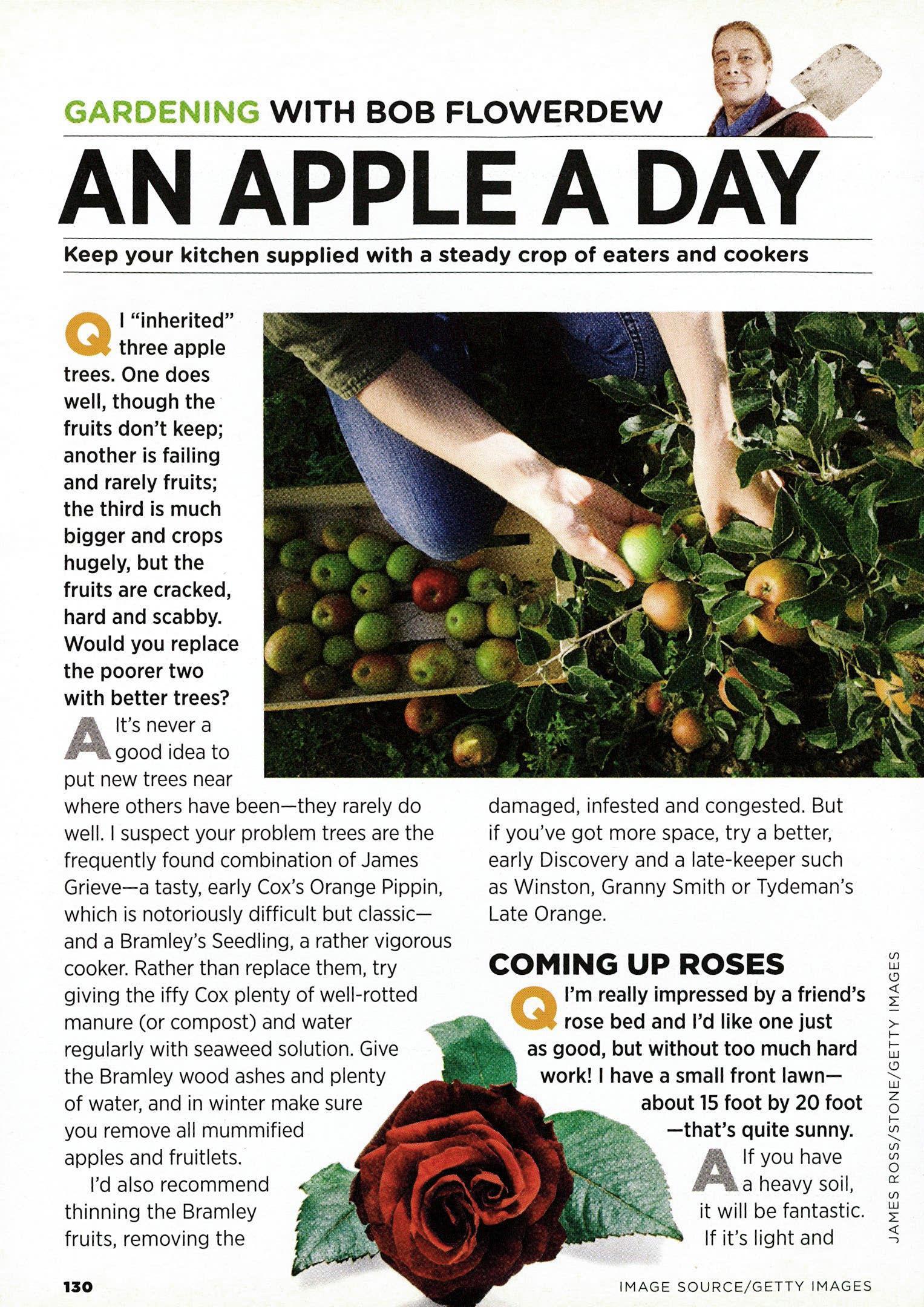
damaged, infested and congested. But if you've got more space, try a better, early Discovery and a late-keeper such as Winston, Granny Smith or Tydeman's Late Orange.
COMING UP ROSES
I'm really impressed by a friend's rose bed and I'd like one just as good, but without too much hard work! I have a small front lawn— about 15 foot by 20 foot —that's quite sunny.
If you have a heavy soil, it will be fantastic. If it's light and
JAMES ROSS/ STO NE/ GETTY IMAGES 130 IMAGE SOURCE/GETTY IMAGES
dry, you'll need to mix in more wellrotted manure or compost first, add more mulches and water more often to get the best display. In any case, strip off the turf (stack this under a plastic sheet to rot and use later), and dig over the area to remove weed roots and rubbish. In autumn, plant a couple of dozen barerooted roses (not too many varieties, but several each of four or five sorts). They'll flower next summer and be glorious the one after that.
I'd strongly recommend Buff Beauty, as it's so reliable with masses of apricot blooms. Iceberg is an excellent white. Mme Isaac Pereire is, to my nose, one of the finest scents—a double pink. Kazanlik (or Isfahan and other names), an old pink Persian rose once used for perfume, is still a good choice. But there are so many, it's best to visit a rose nursery and choose yours when they're in bloom.
SHORT AND SWEET
When do you cut courgettes, especially the round ones? I think I'm leaving it too late as mine seem tougher than shop-bought ones, though not really that much bigger.
AYou may be growing them a bit dry. More water will help, as will extra liquid feed if your soil is light and not well fed. But most important is to cut them smaller and sooner, as soon as they're just big enough to use—fat-finger sized. They're nice and tender, and the plants can make many more of them. If you leave any to get bigger, they soon get less palatable and also stop others forming.
Bob Flowerdew is an organic gardener and a regular on BBC Radio 4's Gardeners' Question Time. Send your gardening questions to Bob at excerpts@readersdigest.co.uk.
Dead-head flowers, especially the roses as they begin to wilt, then give them a feed and water so they can bloom again.
Clean water butts when they get near empty, and clean your gutters as well.
Thin your apples and pears, getting
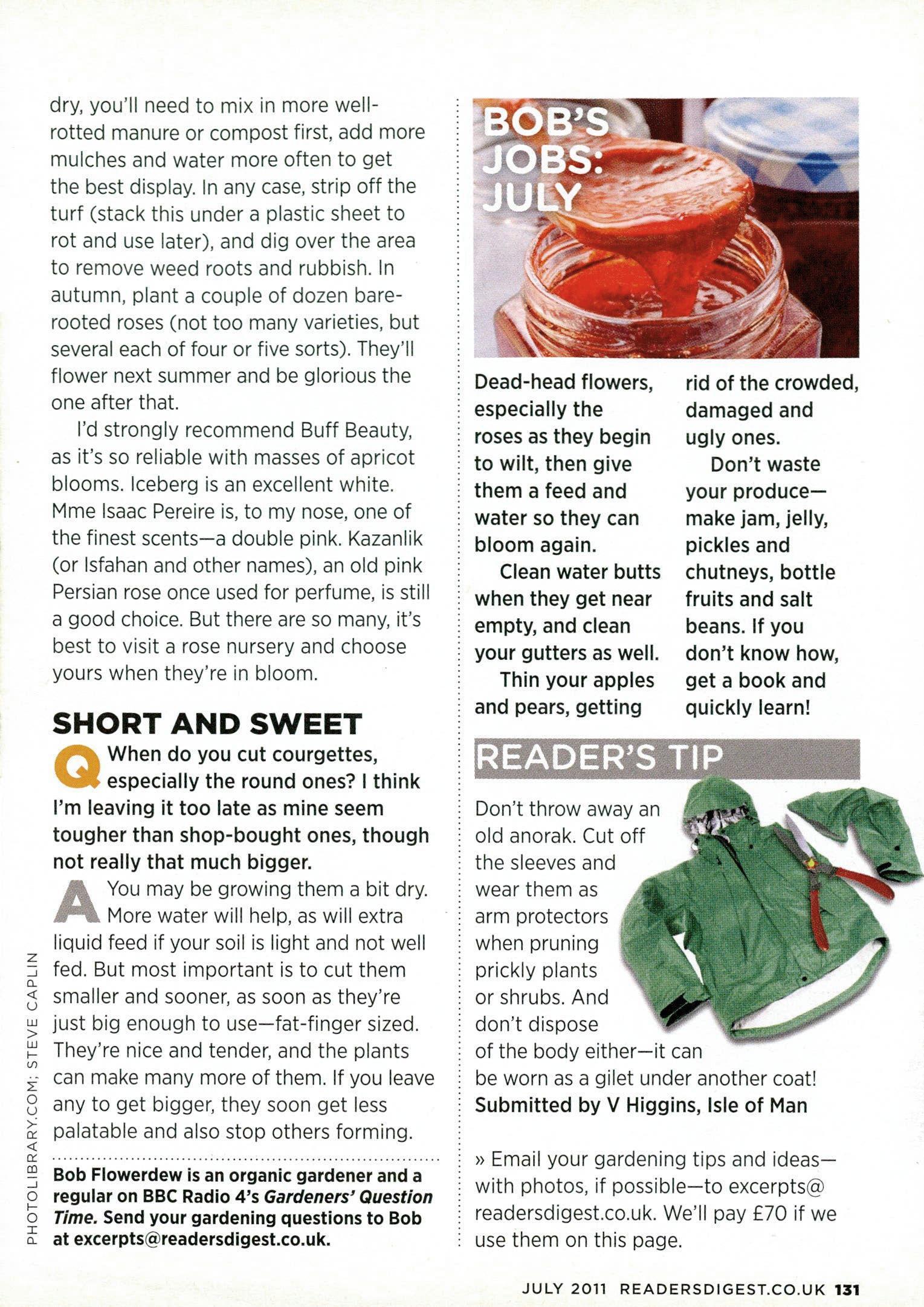
rid of the crowded, damaged and ugly ones. Don't waste your produce— make jam, jelly, pickles and chutneys, bottle fruits and salt beans. If you don't know how, get a book and quickly learn!
READER'S TIP
Don't throw away an old anorak. Cut off the sleeves and wear them as arm protectors when pruning prickly plants or shrubs. And don't dispose of the body either—it can be worn as a gilet under another coat! Submitted by V Higgins, Isle of Man
» Email your gardening tips and ideas— with photos, if possible—to excerpts@ readersdigest.co.uk. We'll pay £70 if we use them on this page.
PHOTOLIBR AR Y. COM; STEVE CAPLIN
JULY 2011 READERSDIGEST.CO.UK 131
WILDLIFE WITH MARTIN HUGHES-GAMES HERE BE DRAGONS
A mainstay of the summer, dragonflies are both beautiful and deadly
July is the best time to witness one of our most fearsome predators. Every stage of the dragonfly's life is designed to dispense death. The larva lives underwater and terrorises the pond with alien-like mouthparts, which shoot out and impale its victims. The adults are superb aerial predators: they can accelerate at a phenomenal rate, stop suddenly, hover and even fly backwards, their wings rustling. Their eyes are so big they meet up at the top of its head, and each eye has up to 15,000 lenses.
This combination enables the dragonfly to pluck prey out of the air, its long, bristly legs acting like a net, sweeping up its victim—perhaps a tasty bluebottle— before landing and devouring its meal.
THE GREAT LIZARD ESCAPE
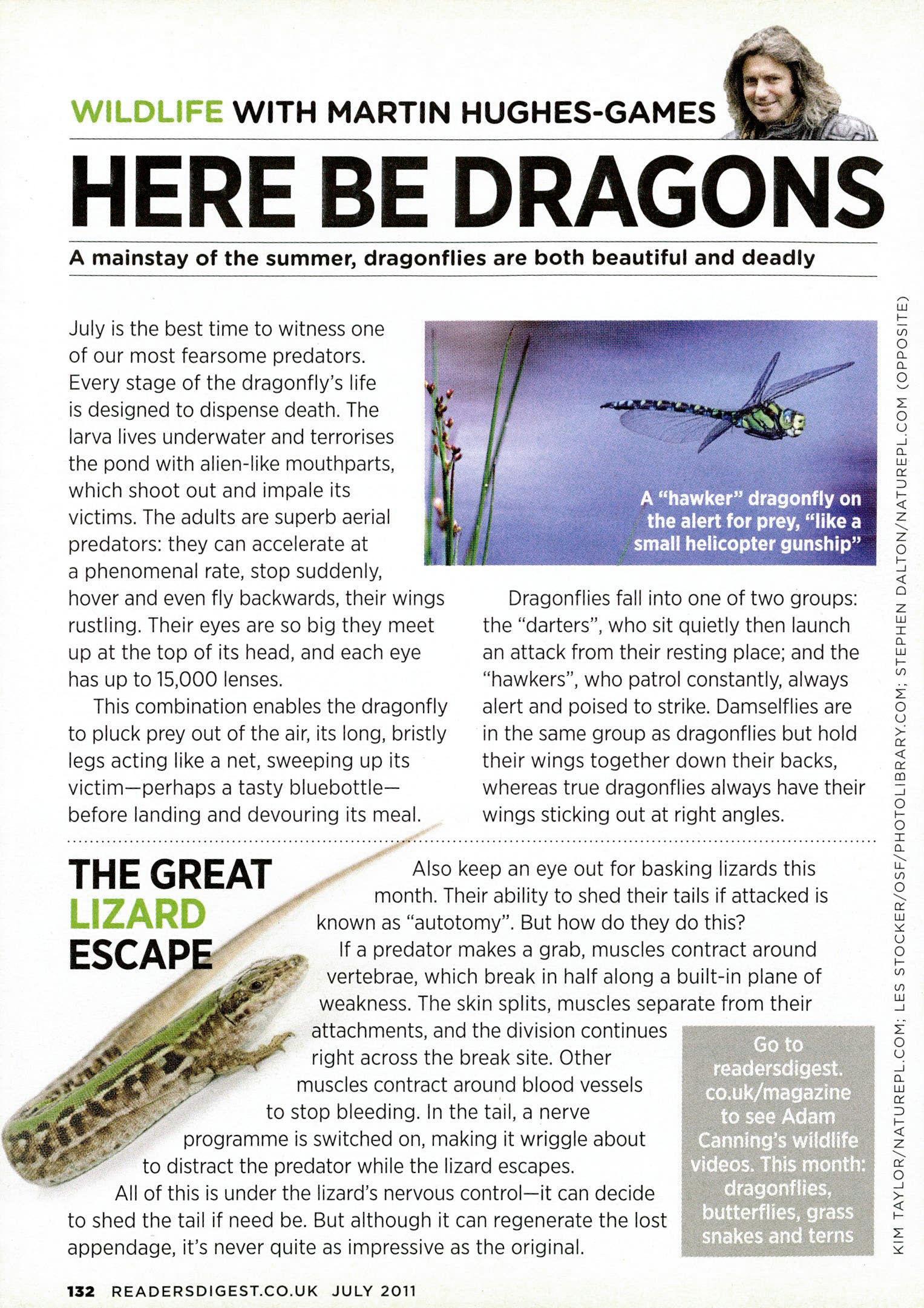
A "hawker" dragonfly on the alert for prey, "like a small helicopter gunship"
Dragonflies fall into one of two groups: the "darters", who sit quietly then launch an attack from their resting place; and the "hawkers", who patrol constantly, always alert and poised to strike. Damselflies are in the same group as dragonflies but hold their wings together down their backs, whereas true dragonflies always have their wings sticking out at right angles.
Also keep an eye out for basking lizards this month. Their ability to shed their tails if attacked is known as "autotomy". But how do they do this?
If a predator makes a grab, muscles contract around vertebrae, which break in half along a built-in plane of weakness. The skin splits, muscles separate from their attachments, and the division continues right across the break site. Other muscles contract around blood vessels to stop bleeding. In the tail, a nerve programme is switched on, making it wriggle about to distract the predator while the lizard escapes. All of this is under the lizard's nervous control—it can decide to shed the tail if need be. But although it can regenerate the lost appendage, it's never quite as impressive as the original.
0 u magazine
Go to re o adkiersdige to see Adam Canriirig's wildlife videos. 'his gr his month: snakes and terns st. c
OPPOSITE) KIM TA YLOR/ NA TUREPL. COM; LES STOCK ER/ OSF/ PHOTOLIBRARY. COM; STEPHEN DALTON/ NATUREPL. COM
132 READERSDIGEST.CO.UK JULY 2011
HOW TO
ATTRACT
A BAT

"Bat stoning" sounds rather cruel, but it's actually a trick Chris
Packham (my co-host on Springwatch) taught me. And it's a great thing to try on a warm July evening.
Find a clearing, by a wood or perhaps just out in your back garden, and as darkness falls, watch out for bats occasionally flitting across the sky. (If you have a bat detector, you can hear the bat approaching— this makes what happens next a lot easier.) Have a supply of small pebbles in your hand. As the bat comes close, use your thumb to flick the pebble up near the bat (but obviously don't hit it). With luck (and practice) the bat will instantly divert and come towards your pebble, thinking it's something interesting to eat.
Again, if you have a bat detector—and everyone should have one!—you can hear the bat's echo-locating clicks speed up as it homes in on your pebble. If you have it exactly right, the bat will follow the pebble down almost to where you're standing, and you can get a close-up view. I'm not quite sure why, but it's incredibly satisfying. You could try with some mealworms or something that the bat would eat and appreciate, but pebbles are easier.
So, bat stoning—a thrilling, if slightly esoteric, pursuit. •
Martin HughesGames is a host of BBC2's Springwatch and Autumn watch
133
DIGITAL WITH MARTHA LANE FOX
ONE'S NEW MEDIA
If Her Majesty can master modern technology, then so should we all
This year, two of Britain's oldest institutions have quietly gone digital. First, in February, came news that the nation's peers would be allowed to take their smartphones, e-book readers and tablets into the House of Lords. Then in May—to gasps from the tabloids—it was revealed that the Queen's minions had nipped out to pick up an iPad for Her Maj.
That the old guard was getting into new media was no big surprise to me. The first trip I made as "digital champion", two years back, was to a community centre in west London. I found it packed with 50-somethings and over-65s, Skyping their grandkids and waving Nintendo Wiis aloft.
We'd like to suggest a new line in accessories, ma'am
That was when the penny dropped for me: the reason so many older people were offline-5.7 million at the last count— was not because of age or infirmity. It was simply because, with all the bamboozling talk of megabytes and hard drives, nobody had taken the time to explain the many ways the web could make life easier or more fun for them.
By 2066, half a million of us will be living beyond the age of 100. By then,
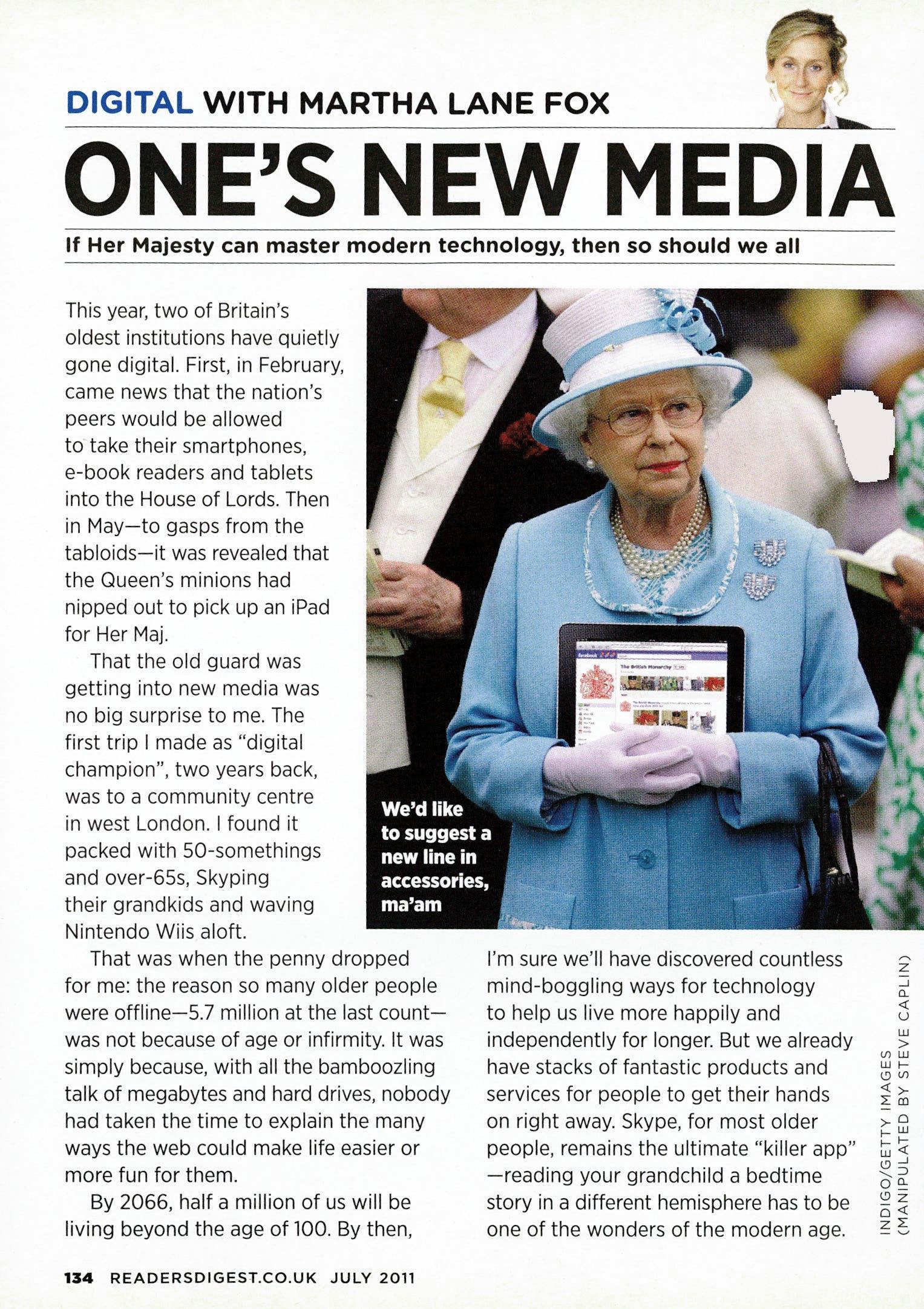
I'm sure we'll have discovered countless mind-boggling ways for technology to help us live more happily and independently for longer. But we already have stacks of fantastic products and services for people to get their hands on right away. Skype, for most older people, remains the ultimate "killer app" —reading your grandchild a bedtime story in a different hemisphere has to be one of the wonders of the modern age.
134 READERSDIGEST.CO.UK JULY 2011
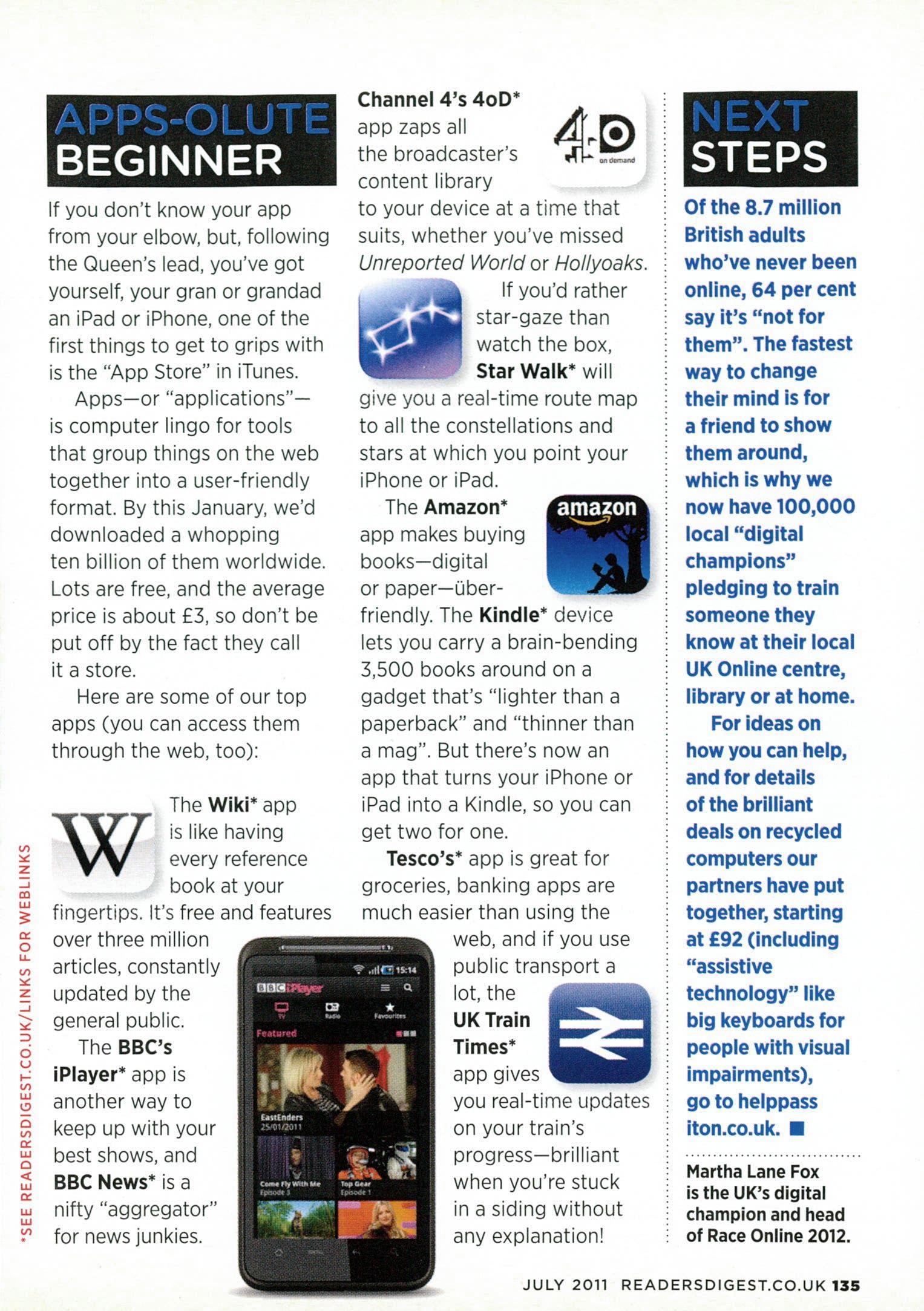
BEGINNER
If you don't know your app from your elbow, but, following the Queen's lead, you've got yourself, your gran or grandad an iPad or iPhone, one of the first things to get to grips with is the "App Store" in iTunes.
Apps—or "applications"— is computer lingo for tools that group things on the web together into a user-friendly format. By this January, we'd downloaded a whopping ten billion of them worldwide. Lots are free, and the average price is about £3, so don't be put off by the fact they call it a store.
Here are some of our top apps (you can access them through the web, too):
The Wiki* app is like having every reference book at your fingertips. It's free and features over three million articles, constantly updated by the general public.
The BBC's iPlayer* app is another way to keep up with your best shows, and BBC News* is a nifty "aggregator" for news junkies.
Channel 4's 4oD* app zaps all the broadcaster's content library to your device at a time that suits, whether you've missed Unreported World or Hollyoaks. If you'd rather star-gaze than watch the box, Star Walk* will give you a real-time route map to all the constellations and stars at which you point your iPhone or iPad.
The Amazon* app makes buying books—digital or paper—Oberfriendly. The Kindle* device lets you carry a brain-bending 3,500 books around on a gadget that's "lighter than a paperback" and "thinner than a mag". But there's now an app that turns your iPhone or iPad into a Kindle, so you can get two for one.
Tesco's* app is great for groceries, banking apps are much easier than using the web, and if you use public transport a lot, the UK Train Times* app gives you real-time updates on your train's progress—brilliant when you're stuck in a siding without any explanation!
STEPS
Of the 8.7 million British adults who've never been online, 64 per cent say it's "not for them". The fastest way to change their mind is for a friend to show them around, which is why we now have 100,000 local "digital champions" pledging to train someone they know at their local UK Online centre, library or at home. For ideas on how you can help, and for details of the brilliant deals on recycled computers our partners have put together, starting at £92 (including "assistive technology" like big keyboards for people with visual impairments), go to helppass iton.co.uk. •
Martha Lane Fox is the UK's digital champion and head of Race Online 2012.
-'4" .111(715:14 *S EE READ ERSDI GE ST. CO. UK/ LIN KS FOR WE BLINK S
JULY 2011 READERSDIGEST.CO.UK 135
MOTORING WITH CONOR McNICHOLAS
SIGN 0' THE TIMES
Have you ever stopped to ponder the genius of British road signs?
Aylesbury
Edgware St Albans
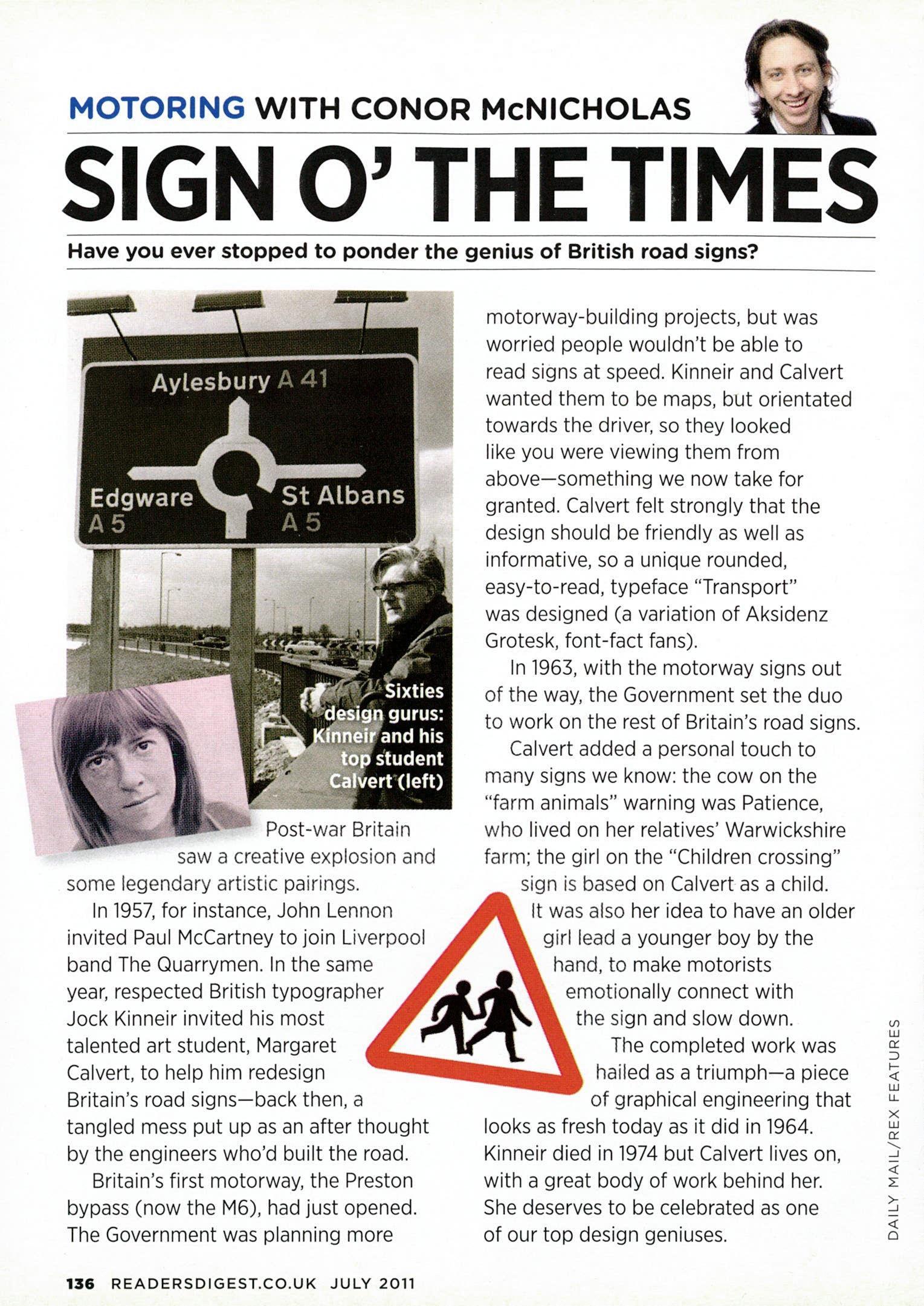
dfr Sixties design gurus: Kinneir and his top student Calvert (left)
Post-war Britain
saw a creative explosion and some legendary artistic pairings.
In 1957, for instance, John Lennon invited Paul McCartney to join Liverpool band The Quarrymen. In the same year, respected British typographer Jock Kinneir invited his most talented art student, Margaret Calvert, to help him redesign Britain's road signs—back then, a tangled mess put up as an after thought by the engineers who'd built the road.
Britain's first motorway, the Preston bypass (now the M6), had just opened. The Government was planning more
motorway-building projects, but was worried people wouldn't be able to read signs at speed. Kinneir and Calvert wanted them to be maps, but orientated towards the driver, so they looked like you were viewing them from above—something we now take for granted. Calvert felt strongly that the design should be friendly as well as informative, so a unique rounded, easy-to-read, typeface "Transport" was designed (a variation of Aksidenz Grotesk, font-fact fans).
In 1963, with the motorway signs out of the way, the Government set the duo to work on the rest of Britain's road signs. Calvert added a personal touch to many signs we know: the cow on the "farm animals" warning was Patience, who lived on her relatives' Warwickshire farm; the girl on the "Children crossing" sign is based on Calvert as a child. It was also her idea to have an older girl lead a younger boy by the hand, to make motorists emotionally connect with the sign and slow down. The completed work was hailed as a triumph—a piece of graphical engineering that looks as fresh today as it did in 1964. Kinneir died in 1974 but Calvert lives on, with a great body of work behind her. She deserves to be celebrated as one of our top design geniuses.
136 READERSDIGEST.CO.UK JULY 2011
DAILY MAIL/ REX FEATURES
ONE TO BUY
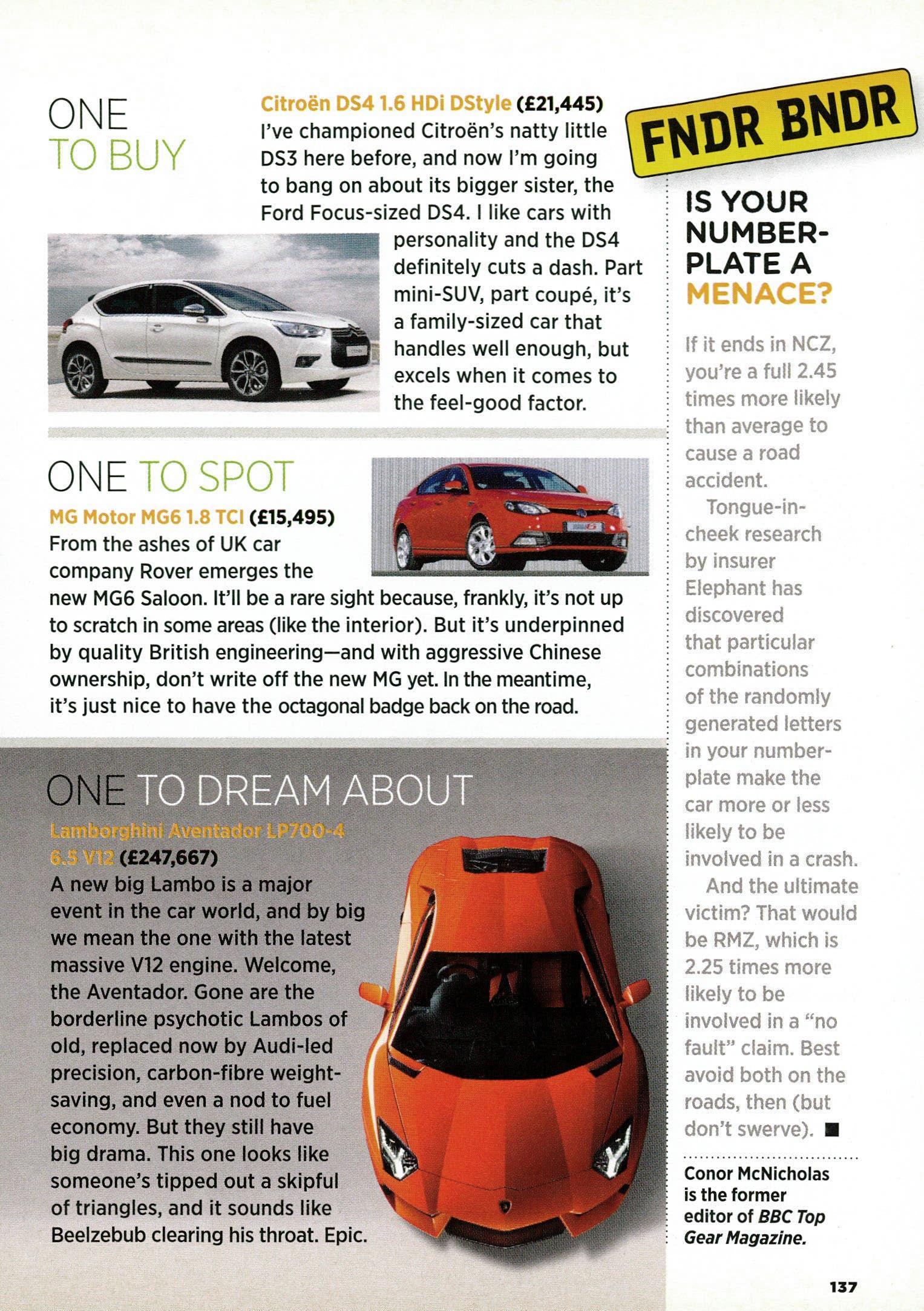
Citroen DS4 1.6 HDi DStylc (£21,445)
I've championed Citroen's natty little DS3 here before, and now I'm going to bang on about its bigger sister, the Ford Focus-sized DS4. I like cars with personality and the DS4 definitely cuts a dash. Part mini-SUV, part coupe, it's a family-sized car that handles well enough, but excels when it comes to the feel-good factor.
ONE TO SPOT
(05,495)
From the ashes of UK car company Rover emerges the new MG6 Saloon. It'll be a rare sight because, frankly, it's not up to scratch in some areas (like the interior). But it's underpinned by quality British engineering—and with aggressive Chinese ownership, don't write off the new MG yet. In the meantime, it's just nice to have the octagonal badge back on the road.
FOR 111011
IS YOUR NUMBERPLATE A MENACE?
(£247,667)
A new big Lambo is a major event in the car world, and by big we mean the one with the latest massive V12 engine. Welcome, the Aventador. Gone are the borderline psychotic Lambos of old, replaced now by Audi-led precision, carbon-fibre weightsaving, and even a nod to fuel economy. But they still have big drama. This one looks like someone's tipped out a skipful of triangles, and it sounds like Beelzebub clearing his throat. Epic.
If it ends in NCZ, you're a full 2.45 times more likely than average to cause a road accident. Tongue-incheek research by insurer Elephant has discovered that particular combinations of the randomly generated letters in your numberplate make the car more or less likely to be involved in a crash. And the ultimate victim? That would be RMZ, which is 2.25 times more likely to be involved in a "no fault" claim. Best avoid both on the roads, then (but don't swerve). •
Conor McNicholas is the former editor of BBC Top Gear Magazine.
137
TRAVEL WITH KATE PETTIFER II A MY GREAT ESCAPE
The Edinburgh Fringe? Unmissable, says reader Hannah Van Den Bergh
On long August days, sitting in the grounds of the Udderbelly comedy venue, enjoying cold beers and Nutella crêpes, my family and I watch the world of the Edinburgh Festival Fringe scurry past, and savour the entertainment to come.
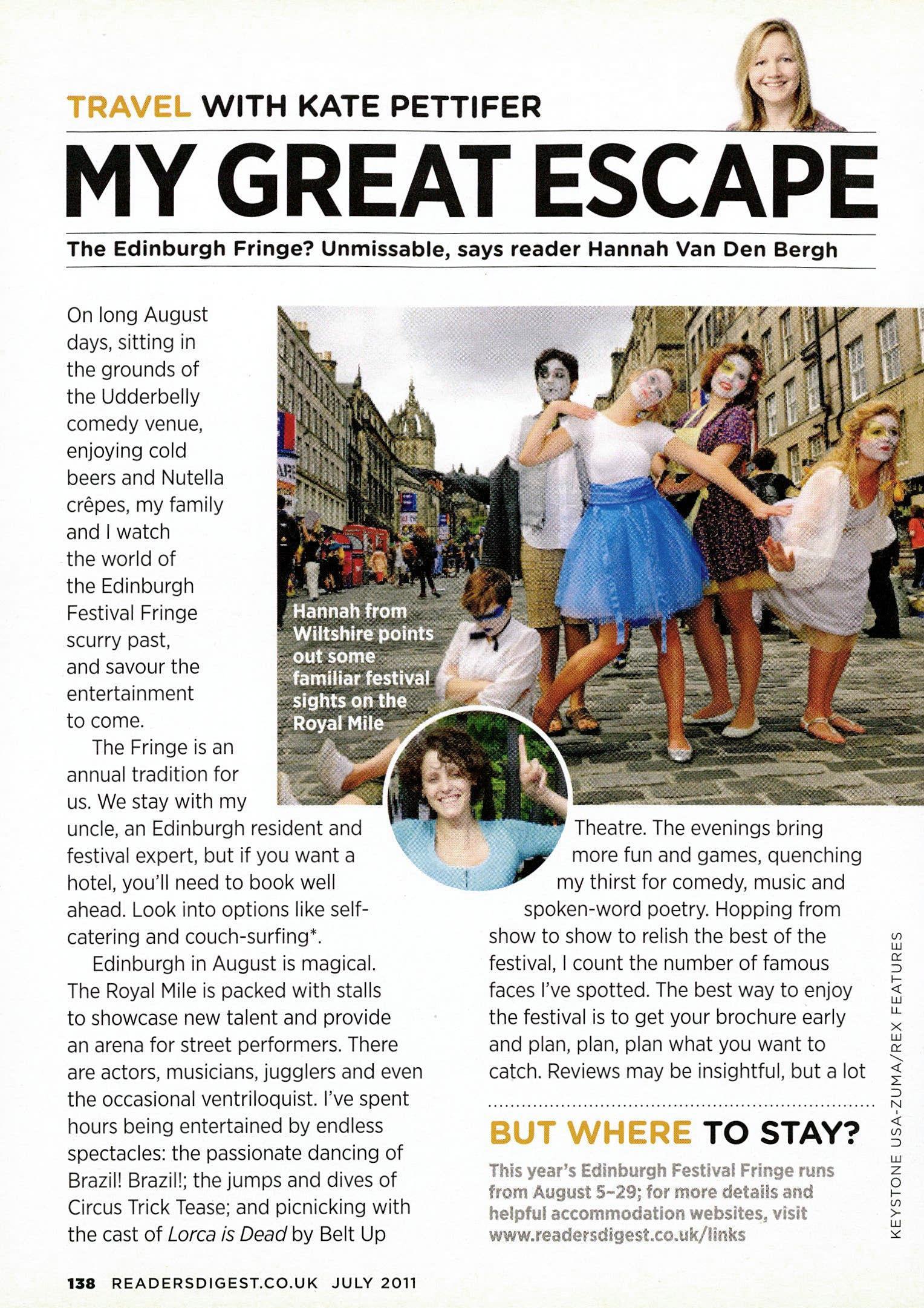
Hannah from Wiltshire poin out some familiar festival sights on the Royal Mile
The Fringe is an annual tradition for us. We stay with my uncle, an Edinburgh resident and festival expert, but if you want a hotel, you'll need to book well ahead. Look into options like selfcatering and couch-surfing*.
Edinburgh in August is magical. The Royal Mile is packed with stalls to showcase new talent and provide an arena for street performers. There are actors, musicians, jugglers and even the occasional ventriloquist. I've spent hours being entertained by endless spectacles: the passionate dancing of Brazil! Brazil!; the jumps and dives of Circus Trick Tease; and picnicking with the cast of Lorca is Dead by Belt Up
Theatre. The evenings bring more fun and games, quenching my thirst for comedy, music and spoken-word poetry. Hopping from show to show to relish the best of the festival, I count the number of famous faces I've spotted. The best way to enjoy the festival is to get your brochure early and plan, plan, plan what you want to catch. Reviews may be insightful, but a lot
BUT WHERE TO STAY?
This year's Edinburgh Festiva; Fringe runs from August 5-29; for more details and helpful accommodation websites, visit www.readersdigest.co.uk/links
138 READERSDIGEST.CO.UK JULY 2011
KEYSTONE USAZUMA/R EX FEATURES
of the shows I see are recommended by fellow festivalgoers. What I love about the fringe is that everyone's there for the same reason: to enjoy the arts, have a break and see something new. Everywhere you go people want to chat: I've met journalists, critics, actors, singers and playwrights, many of whom I'm still in touch with and looking forward to seeing again. Hopefully, come August, I'll be back with my family pulling apart the fringe brochure and reminiscing about how quickly the past year has gone!
Send us a photo of your favourite holiday, tell us briefly what made it so special, and if we include it on this page we'll pay you £75. See address on p6.
GO NOW STAY NOW BOOK

The Tien Shan mountain range in Central Asia is one of the few high-altitude areas that's summer-holiday friendly for intrepid walkers. Tour company Explore runs a 13-day walking trip to the Kyrgyz-Alatau mountains, taking in breathtaking valleys and glaciers. From £1,929 with flights (0845 013 1537*). Nature Trek also offers a selection of Kazakhstan itineraries especially geared towards wildlife enthusiasts (from £1,895; 01962 733051*).
In scenes akin to an episode of Doctor Who, the East Sussex town of Battle is gearing up for its annual Scarecrow Festival (July 4-24). Community group Beautiful Battle first came up with the idea two years ago: for the third festival of its kind, there's an arts theme to the locals' straw-stuffed creations, complete with colourful displays. See them for yourself and explore 1066 country while you're in the area*.
For a memorable way to see Sweden's key cities, take a three-night canal cruise from Stockholm to Gothenberg: the luxurious trip runs from now until September. Board the 135-year-old M/S Juno for a journey through rivers, lakes, sea and the historic GOta Canal. The trip is full board, with top-notch cuisine all the way, and the ship is kitted out with Orient-Express-style nostalgic luxury. From £950pp; 00 46 (0)31 80 63 15*.
NOW COURTES Y O F 1066 COUN TRY MARKE TIN G ( SCAREC ROW)
WEBSITE
TRAVEL
'rustedhousesitters.com This is the place to find vetted individuals to look after your house while you're away. Refine your search by experience with pets, references, police
`SEE READERSDIGEST.CO.UK/LINKS FOR WEBLINKS JULY 2011 READERSDIGEST.CO.UK 139
check, and more, and get an instant summary of sitters' credentials. For an affordable way to travel, with some babysitting responsibilities, create your own listing (from £9 a month). There's also an assignments board with specific "sitters wanted" ads.
RAC to the rescue Breakdown Cover with 35% OFF*
Whether it's a trip to the shops or a cross-country drive, a breakdown can ruin your day.
But with RAC Breakdown Cover, there's always a happy ending. Because wherever you are in the UK, we aim to get to you within 40 minutes. Every 7 seconds, someone, somewhere, calls RAC Breakdownt, and we fix four out of five vehicles at the roadside°.
As a Reader's Digest customer, you can get a massive 35% OFF Breakdown Cover. That means cover starts from as little as £34.78*.

• Priority response if you are in a vulnerable situation
• Five call-outs a year (or more for joint or family cover or multiple vehicles)
• If we replace a part at the roadside, fitting costs are included in your membership
Breakdown Cover is easy!
DiRgea:atryces
Call today on 0800 433 4736 and quote reference RDO1PM, or visit rac.co.uk/join/readersdigest Lines open Sam-9pm Monday to Friday, 8.30am-5pm Saturday, and 10am-4pm Sunday. Rac the driving people
Provided
RAC Motoring Services and/or RAC Insurance Limited RAC Motoring Services (Registered No: 01424399 Registered Office: 8 Surrey Street, Norwich NR1 3NG) and RAC Insurance Limited (Registered No: 2355834 Registered Officer as above) are authorised and regulated by the Financial Services Authority.
RAC
Discount applies to single personal based cover with payment on a continuous annual basis on all levels of cover. £34.78 is the price for single personal based Roadside cover. Prices correct at time of print and are subject to change. Offer cannot be used in conjunction with any other offer and may be withdrawn at any time, This offer is not available to existing RAC customers. Full RAC Terms and Conditions apply, available on request Source: Based on 4.34 million calls received in 2009. RAC measurement and Insight, Feb 2010. Source RAC Measurement and Insight, Feb 2010. Excludes accidents and extreme failures.
by

T Reaheders Digest
JULY FICTION REVIEWED BY A N WILSON EXTRACTS FROM OUR FAVOURITE NEW RELEASES THE STRANGE HISTORY OF CAMPING AND WHY COMMON SENSE IS OVERRATED BOOKS THAT CHANGED MY LIFE: ED STOURTON
July fiction
A N Wilson finds delight and horror in the month's new novels
The Stranger's Child
by Alan Hollinghurst (Picador, £20)
Hollinghurst's comedy about the Thatcher years, The Line of Beauty, won the 2004 Man Booker prize. His latest is surely another potential award winner. It begins with Cecil Valance, an Edwardian poet who captures the hearts of the middle-class Daphne and George Sawle—and writes a poem about their garden that becomes one of those
anthology pieces summing up Britain at a particular moment in its history. Valance then goes off to the First World War, while Daphne marries his brother. By the 1960s, Valance's poetry is out of fashion, but biography is not. As the century progresses, his bisexuality and exactly what did happen in that garden become of great interest to literary sleuths. This is a rich brew, with plenty of amusing parody. But is it really a novel or just five interconnected short stories?
What They Do in the Dark
by Amanda Coe (Virago, £12.99)
They used to warn people "of a nervous disposition" if a TV programme was going to be tough viewing.
CLASSICS CORNER: VANITY FAIR
Summer holidays are traditionally a time for tackling longer novels than usual—and this month sees the 200th anniversary of William Thackeray's birth. So why not try his hugely readable and very funny Vanity Fair? The novel famously stars Becky Sharp,

As a responsible critic, I have to say the same about this brilliant novel.
At first it's a gentle comedy about childhood in Yorkshire. Gemma is nicely brought up and used to home comforts. Fat, smelly Pauline is a bully from a "problem" home, who's sometimes Gemma's friend, and sometimes a very unwanted sidekick.
The first half of the book is pure delight, with the Yorkshire speech and the atmosphere of the school playground captured to perfection. But in the
the minxy social climber whose story was based on the life of Eliza Frances Robertson (pictured left). Becky, in fact, is often credited with transforming the British novel—by showing that we like our characters to be vivid and fun rather than virtuous.
142 READERSDIGEST.CO.UK JULY 2011
second half, you gradually realise this is not a gentle comedy at all. Indeed, the last 20 pages are among the most horrifying I have ever read.
A Death in Summer
by Benjamin Black (Mantle, £16.99)
Under the name of Benjamin Black, Booker-prize winner John Banville has begun a series of crime novels set in 1950s Dublin. Featuring a police pathologist called Quirke —pot-bellied, amorous and a wine-lover—they're the best thing in crime fiction. In this latest one, the
murder of a newspaper magnate takes Quirke into the murky world of Irish child abuse. He also finds himself falling in love with the tycoon's lovely French widow. It's all beautifully crafted. Every sentence counts, every epithet is well chosen.
The only trouble with the plot is that the identity of the murderer is quite easy to guess. Fortunately, this doesn't really matter, because the real pleasure of the book lies in its superb characterisation and the wonderful evocation of that misty, pre-EU Dublin.
You
by Joanna Briscoe (Bloomsbury, £11.99)
A good old-fashioned chunky novel, with an absorbing plot, loads of characters and a proper denouement. The setting is the West Country, and three generations of drippy hippies who dropped out
QUICK QUIZ
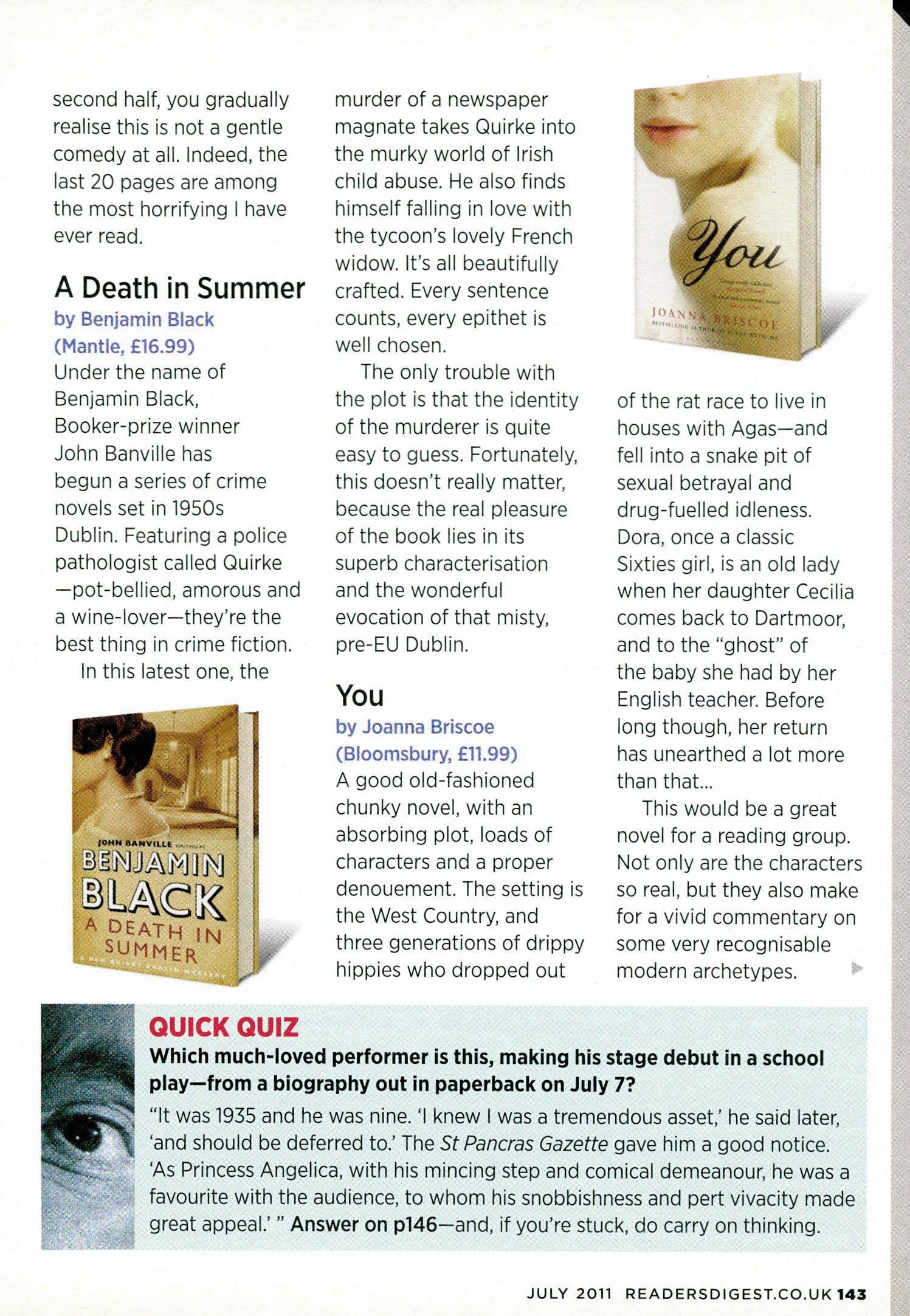
of the rat race to live in houses with Agas—and fell into a snake pit of sexual betrayal and drug-fuelled idleness. Dora, once a classic Sixties girl, is an old lady when her daughter Cecilia comes back to Dartmoor, and to the "ghost" of the baby she had by her English teacher. Before long though, her return has unearthed a lot more than that...
This would be a great novel for a reading group. Not only are the characters so real, but they also make for a vivid commentary on some very recognisable modern archetypes.
Which much-loved performer is this, making his stage debut in a school play—from a biography out in paperback on July 7?
"It was 1935 and he was nine. 'I knew I was a tremendous asset,' he said later, 'and should be deferred to.' The St Pancras Gazette gave him a good notice. 'As Princess Angelica, with his mincing step and comical demeanour, he was a favourite with the audience, to whom his snobbishness and pert vivacity made great appeal.' " Answer on p146—and, if you're stuck, do carry on thinking.
PM LE '13LINIAPJ].N1 i23LA A DEATH IN SUMME R
JULY 2011 READERSDIGEST.CO.UK 143
I i Scouts,hi ppies, suffragettes
How our strangely persistent desire for a more rugged life has shaped the British holiday—and forged some odd alliances along the way
THE ART OF CAMPING to.
If you're the sort of person who reckons there's no finer holiday than one spent miles from a proper bed or decent toilet, then Matthew De Abaitua is definitely your man. For him, it's precisely because camping is such a "perverse and wilful abandonment of an easy life" that it's much more fun than a boring old beach resort or Tuscan villa. Or at least it sometimes is. Given that De Abaitua and his wife heroically travel with three small children, The Art of Camping is able to mix his infectious love of the whole business with plenty of stories about things going wrong.
But, as the subtitle (The History and Practice of Sleeping Under the Stars) suggests, the book is a lot more than one bloke's anecdotes. We also get a highly knowledgeable and often surprising history of what camping has meant through the ages. Human beings, it seems, have been sleeping in mobile tents since around 6000Bc. Luckily, De Abaitua picks up the story a bit later than that, with the first Victorian campers: a fearsomely macho bunch whose only modern equivalent, he suggests, would be Bear Grylls. Francis Galton's The Art of Travel, for example, is a guide to camping in 19th-century South Africa, complete with a section called "Proceedings in Case of Death". (On a cheerier note, Galton does reassure his readers that "savages rarely murder newcomers".)
Even so, it wasn't until the Edwardians, and the coming of the bike, that camping became popular in its recognisably modern form. This, of course, was also the time when Robert BadenPowell founded the Scouts—although, according to De Abaitua, only by both ripping off and sanitising Ernest Thompson Seton's Woodcraft movement in America. Seton's ideal was the American Indian—which Baden-Powell replaced "with the militarism of the fading empire, and with Christianity usurping Seton's nature-

RD Exclusive: Matthew De Abaitua's choice of the four best camping scenes in fiction
From Three Men in a Boat by Jerome K Jerome A trio of liverish young men and their dog float up the Thames in a camping skiff. They pitch their tent under a great elm tree at a spot called Picnic Point, near Runnymede. Yanking the hooped canvas over the boat almost defeats them, but the effort of camping is rewarded. They
RD RECOMMENDED READ: 1
MATTHEW DE ABAITUA
144 READERSDIGEST.CO.UK JULY 2011
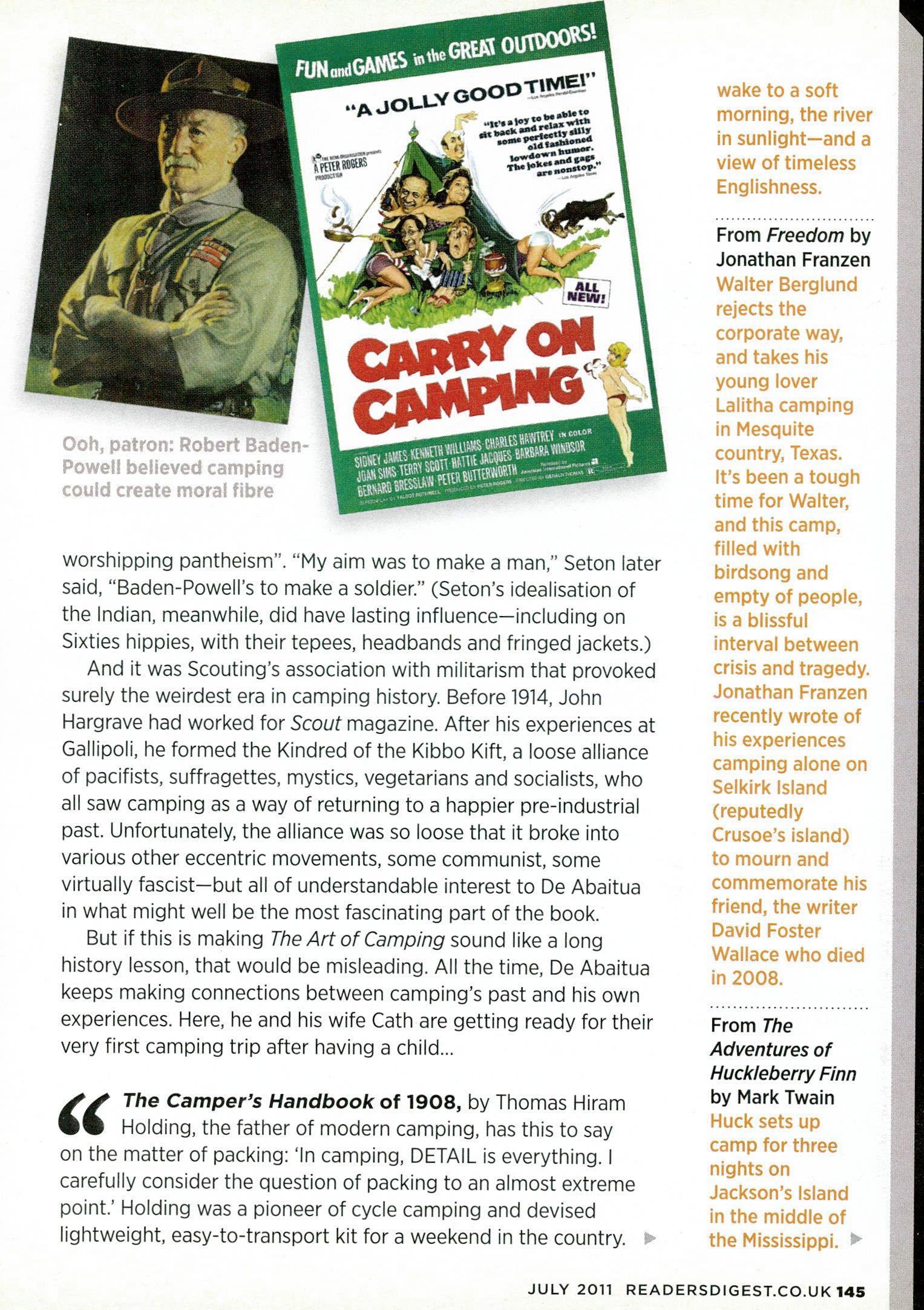
Ooh, patron: Robert BadenPowell believed camping could create moral fibre
worshipping pantheism". "My aim was to make a man," Seton later said, "Baden-Powell's to make a soldier." (Seton's idealisation of the Indian, meanwhile, did have lasting influence—including on Sixties hippies, with their tepees, headbands and fringed jackets.)
And it was Scouting's association with militarism that provoked surely the weirdest era in camping history. Before 1914, John Hargrave had worked for Scout magazine. After his experiences at Gallipoli, he formed the Kindred of the Kibbo Kift, a loose alliance of pacifists, suffragettes, mystics, vegetarians and socialists, who all saw camping as a way of returning to a happier pre-industrial past. Unfortunately, the alliance was so loose that it broke into various other eccentric movements, some communist, some virtually fascist—but all of understandable interest to De Abaitua in what might well be the most fascinating part of the book.
But if this is making The Art of Camping sound like a long history lesson, that would be misleading. All the time, De Abaitua keeps making connections between camping's past and his own experiences. Here, he and his wife Cath are getting ready for their very first camping trip after having a child...
, The Camper's Handbook of 1908, by Thomas Hiram
• Holding, the father of modern camping, has this to say on the matter of packing: 'In camping, DETAIL is everything. I carefully consider the question of packing to an almost extreme point.' Holding was a pioneer of cycle camping and devised lightweight, easy-to-transport kit for a weekend in the country. 6,
wake to a soft morning, the river in sunlight—and a view of timeless Englishness.
From Freedom by Jonathan Franzen Walter Berglund rejects the corporate way, and takes his young lover Lalitha camping in Mesquite country, Texas. It's been a tout time for Walter, and this camp, filled with birdsong and empty of peop is a blissful interval between crisis and tragedy. Jonathan Franzen recently wrote of his experiences camping alone on Selkirk Island (reputedly Crusoe's island) to mourn and commemorate hi, friend, the writ( David Foster Wallace who died in 2008.
From The Adventures of Huckleberry Finn by Mark Twain Huck sets up camp for three nights on Jackson's Island in the middle of the Mississippi.
SIGIO
MISIIE 01101111.00 PISMONSIR IMO WOO PU1011111E1011
CIVAESIIMAILI
dr
JULY 2011 READERSDIGEST.CO.UK 145
® Prior to his advocacy of packing light, the British embarked upon a camping trip as if colonising another part of Africa: on a trip to the Lakes, one 19th-century camping party took two tons of kit packed on horse-drawn carts, including a harmonium and a separate pantry tent.
My system of packing followed Holding's spirit, being so detailed and highly strung that an item as small as a spatula could throw it off whack. It surprised me how much pride and enjoyment I took in it. During the long period of stupefied indolence otherwise known as our twenties, Cath and I never planned or prepared for anything. Preparation is the opposite of cool. Making it up as you go along, improvisation, youthful spontaneity, these are the values of the hip. Nature demands preparation. The city hates it...
Packing requires compression, too, which requires anger. Over time, I've come to regard this as Dad-anger, the red energy required to haul a complaining family through the British transport system. The rucksack's neck swelled with last-minute towels and jumpers. I garrotted it, then covered it with a hood, under which sleeping bags were crammed. Into the pockets of netting I slipped bin bags and water bottles, and, after two hours, I was done. Cath popped her head around the bedroom door. 'Don't forget the tent.'
I had forgotten the tent.
The book also has plenty of practical tips for happy camping— from what kind of tent you should buy to the ticklish question of how much booze to take. Sadly, though, it contains no advice whatsoever about how to conquer the camper's greatest enemy of all. "There is no secret," De Abaitua writes, "to surviving the misery of a rainy day."
...AND THE QUICK QUIZ?
More camping—and proof that the nineyear-old Kenneth Williams already had most of the talents that would make him famous. From Born Brilliant the Life of Kenneth Williams (John Murray, £8.99) by Christopher Stevens, the fullest biography of the man so far.
He picks grapes and strawberries, lands catfish and roasts them over a campfire. Islands are lonesome places; Huck smokes, counts the stars, and inspires generations of boys to follow him outdoors.
From Swallowdale by Arthur Ransome
With their raft shipwrecked, the Swallows climb over a waterfall and discover the perfect valley campsite. With steep sheltering sides, a stream running through, a pool for the washing up and a secret cave, the craggy landscape of Swallowdale offers handholds for the imagination of children and adults alike.

The Art of Camping by Matthew De Abaitua is published by Hamish Hamilton at £14.99
148 READERSDIGEST.CO.UK JULY 2011
It's time to think again... EVERYTHING
lu ScEpousylous
ANSWER
rri,:741?
How
Common
Sense
Faits
DUNCAN"WATTS
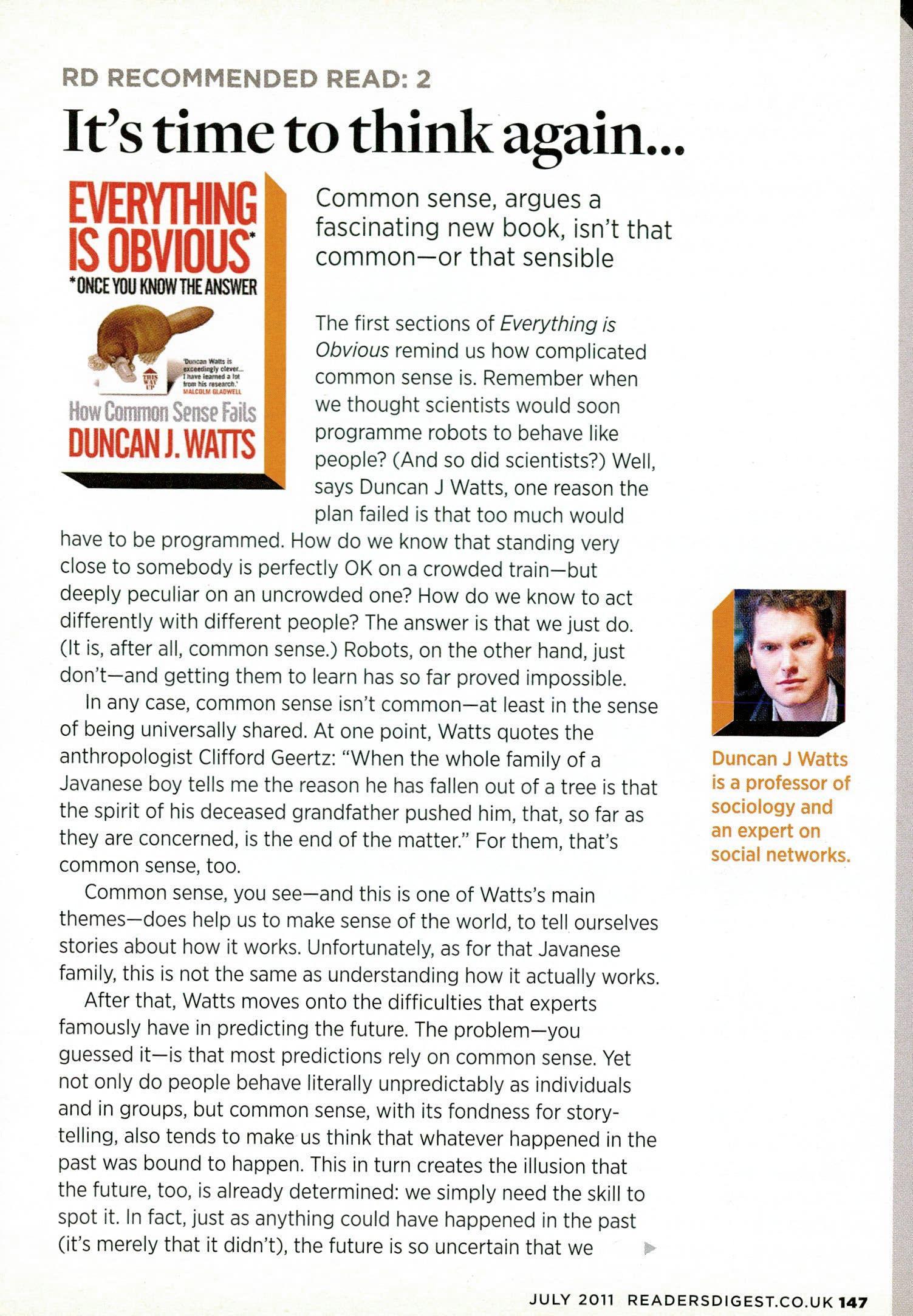
Common sense, argues a fascinating new book, isn't that common—or that sensible
The first sections of Everything is Obvious remind us how complicated common sense is. Remember when we thought scientists would soon programme robots to behave like people? (And so did scientists?) Well, says Duncan J Watts, one reason the plan failed is that too much would have to be programmed. How do we know that standing very close to somebody is perfectly OK on a crowded train—but deeply peculiar on an uncrowded one? How do we know to act differently with different people? The answer is that we just do. (It is, after all, common sense.) Robots, on the other hand, just don't—and getting them to learn has so far proved impossible. In any case, common sense isn't common—at least in the sense of being universally shared. At one point, Watts quotes the anthropologist Clifford Geertz: "When the whole family of a Javanese boy tells me the reason he has fallen out of a tree is that the spirit of his deceased grandfather pushed him, that, so far as they are concerned, is the end of the matter." For them, that's common sense, too.
Common sense, you see—and this is one of Watts's main themes—does help us to make sense of the world, to tell ourselves stories about how it works. Unfortunately, as for that Javanese family, this is not the same as understanding how it actually works.
After that, Watts moves onto the difficulties that experts famously have in predicting the future. The problem—you guessed it—is that most predictions rely on common sense. Yet not only do people behave literally unpredictably as individuals and in groups, but common sense, with its fondness for storytelling, also tends to make us think that whatever happened in the past was bound to happen. This in turn creates the illusion that the future, too, is already determined: we simply need the skill to spot it. In fact, just as anything could have happened in the past (it's merely that it didn't), the future is so uncertain that we
Duncan J Watts is a professor of sociology and an expert on social networks.
RD RECOMMENDED READ: 2
JULY 2011 READERSDIGEST.CO.UK 147
4 don't even know what our predictions should be about...
'CWhat we don't appreciate is that hindsight tells us more than the outcomes of the predictions we made in the past. It also reveals what predictions we should have been making. In November of 1963, how would one have known that it was important to worry about snipers, and not food poisoning, during JFK's visit to Dallas? Or in the late 1990s that the small startup company called Google would one day grow into an internet behemoth?
If this book only confirms what you already thought, I have not donenu job
But if we tried to state our predictions for everything that might conceivably happen, we would immediately drown in the possibilities. Should we worry about what time the garbage truck will show up tonight? Probably not. On the other hand, if our dog gets off the leash and runs out on the street at exactly that time, we'll have wished we'd known before we went for a walk. Should we attempt to predict whether our flight will be cancelled? Again, probably not. But if we get bumped onto another flight and sit next to the person that we will one day marry, that event will seem tremendously significant.
Everything is Obvious does require a bit of concentration, but the image of Watts lashing away at any number of lazy (if convenient) ideas is definitely a bracing one. In the preface, he says that "If reading this book only confirms what you already thought about the world, then I apologise...I will not have done my job." By the end, it's clear that he has nothing to be sorry for. And the next time you hear a politician demanding "a return to common sense", you'll find yourself wondering which common sense he means. That of the 1950s? The 1850s? The Middle Ages? In short, you'll know he's talking nonsense.
HtJW anybody have known that this would change the world?
An early test site for Google

Everything Is Obvious by Duncan J Watts is published by Atlantic at £18.99
148 READERSDIGEST.CO.UK JULY 2011
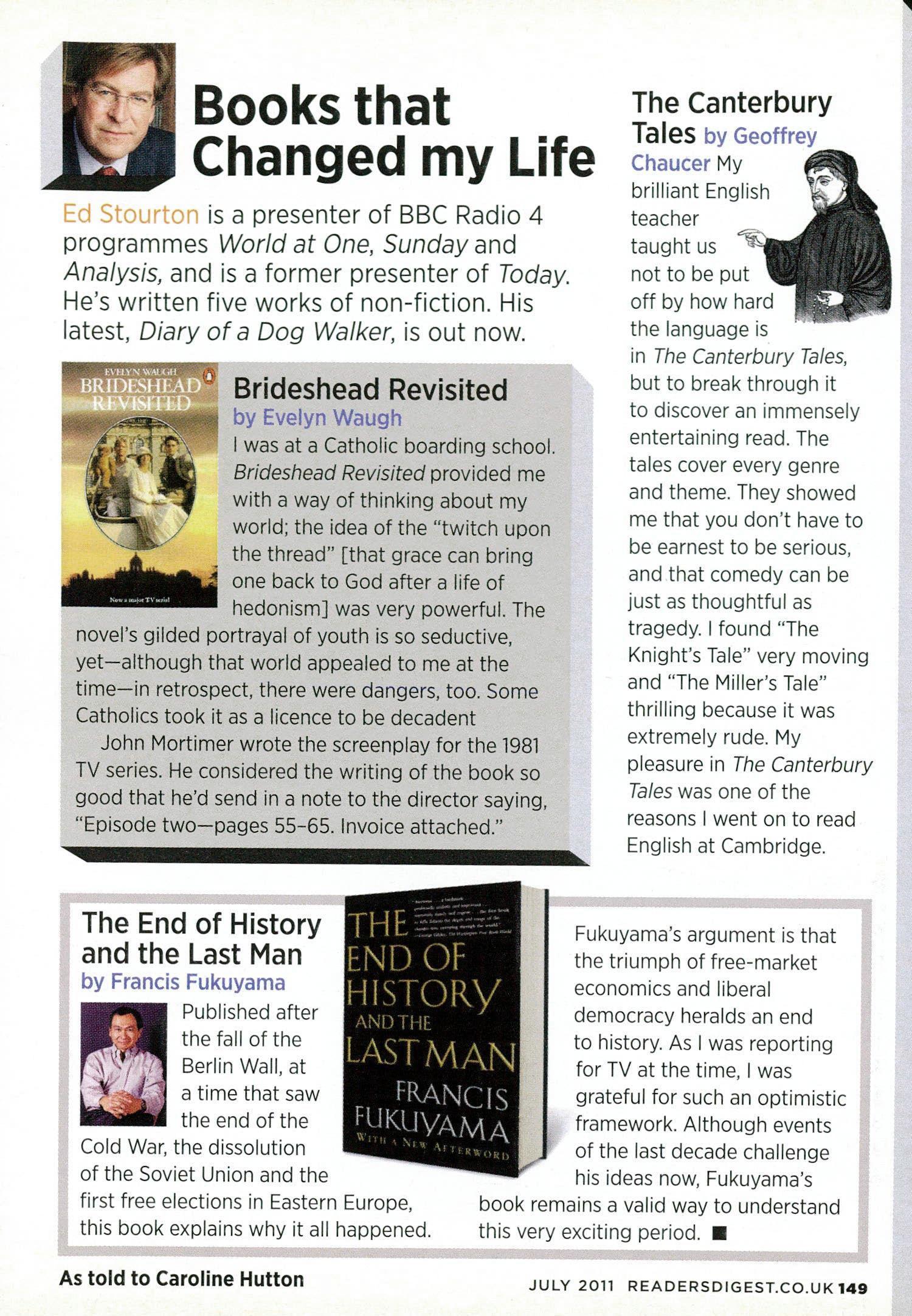
Books that Changed my Life
Ed Stourton is a presenter of BBC Radio 4 programmes World at One, Sunday and Analysis, and is a former presenter of Today. He's written five works of non-fiction. His latest, Diary of a Dog Walker, is out now.
Brideshead Revisited by
Evelyn Waugh
I was at a Catholic boarding school. Brideshead Revisited provided me with a way of thinking about my world; the idea of the "twitch upon the thread" [that grace can bring one back to God after a life of hedonism] was very powerful. The novel's gilded portrayal of youth is so seductive, yet—although that world appealed to me at the time—in retrospect, there were dangers, too. Some Catholics took it as a licence to be decadent John Mortimer wrote the screenplay for the 1981 TV series. He considered the writing of the book so good that he'd send in a note to the director saying, "Episode two—pages 55-65. Invoice attached."
The End of History and the Last Man
by Francis Fukuyama
Published after the fall of the Berlin Wall, at a time that saw the end of the Cold War, the dissolution of the Soviet Union and the first free elections in Eastern Europe, this book explains why it all happened.
The Canterbury
Tales by Geoffrey Chaucer My brilliant English teacher taught us not to be put off by how hard the language is in The Canterbury Tales, but to break through it to discover an immensely entertaining read. The tales cover every genre and theme. They showed me that you don't have to be earnest to be serious, and that comedy can be just as thoughtful as tragedy. I found "The Knight's Tale" very moving and "The Miller's Tale" thrilling because it was extremely rude. My pleasure in The Canterbury Tales was one of the reasons I went on to read English at Cambridge.
THE END OF HISTORY AND THE LAST MAN
Fukuyama's argument is that the triumph of free-market economics and liberal democracy heralds an end to history. As I was reporting for TV at the time, I was grateful for such an optimistic framework. Although events of the last decade challenge his ideas now, Fukuyama's book remains a valid way to understand this very exciting period. ■
FRANCIS FLIK1IVAMA I 1 li' t}Rt, As told to Caroline Hutton JULY 2011 READERSDIGEST.CO.UK149
BOOK PUBLISHING
Authors invited to submit manuscripts all types including poetry New Authors Welcome
A.H. STOCKWELL LTD, Dept. 937 Ilfracombe, Devon, EX34 8BA. Tel: 01271 862557 www.ahstockwell.co.uk
Publishers for 100 Years

AUTHORS
Synopses and sample chapters welcome, please send to: Austin & Macauley Publishers CGC-33-01, 25 Canada Square, Canary Wharf, London, E14 5LQ 0207 0388212 editors@austinmacauley.com www.austinmacauley.com
All genres welcome
Girlings 55+? Retired or semi-retired Why not rent private retirement property on a life long tenancy which gives you the right to live in the property for as long as you wish? Summer 'super sale' now on! 0800 52 51 84 www.girlings.co.uk Your home, your life, your choice Our breathtaking venues, in the heart of Devon, boast a range of craft, sport & leisure facilities that we believe are without equal anywhere in the UK! Offering a unique craft centre, stunning golf courses, bowls, racket sports, target sports, leisure facilities including swimming pools and snooker - You will be spoilt for choice! All facilities are free to residents with the exception of material costs in the Craft Centre. The Manor House Hotel A break the tvzo/hcr can 'f spoil 4 night breaks Ginn C249. person Full Board AUTHORS Let me find you the BEST publisher for your book. Former book publishing chairman offers FREE advice. Tel: 07766 239752 E: bibex©ymail.com
Marketplace
To advertise in this section please call Haley Willmott on 020 7878 2313 FIND YOUR DESTINY LIVE 1-2-1 READINGS \I 0800 067 2320 FOR JUST 29P PER MINUTE `0906 176 2320 For a complimentary brochure call now on 0800 975 5757 www.appealshading.com ISO

Marketplace To advertise in this section please call Haley Willmott on 020 7878 2313 For details of our new and used quality conversions www.brotherwood.com or ring 0844 371 7820 ®TEN ALPS V V MEDIA Email:mail@lightmagazine.org orwriteto LightBiblePublications,P.OBox760, Bexley,Kent, To advertise here please contact haley.willmott@tenalps.com you said you wanted more cottages with sea views. all sorted. Cornwall I Devon I Somerset I Dorset ilk Brotherwood Wheelchair Cars pit Stephen Fry — The perfect valet. Every morning. Like clock Ns ork. I'mso.son,ytodis youbutaappeantor mornmg.Veryinconvenient lagree,Sir. 125+ fortifying messages for Sir or Madam. Visit www.voco.uk.com 111 holidaycottages.co.uk 01237 459878 Light Afreebimonthlymagatne onBiblebasedtopics Topicsinclude: ProphecyandFulfilment BasicBibleTeaching CurrentWorldEvents 151

B J SheCving
We design, manufacture and install bespoke shelving and study arrangements for the home and office, with a combination of cupboards, drawers, file drawers etc. Offering a comprehensive and friendly service, installation within 2 to 4 weeks from our visit, all fitted in one day. Visit our web site for more information. www.bjshelving.co.uk For an immediate quotation phone Brian On 01344 483 632 / Free call 0800 030 4119 A Rural Retreats cottage F. as been carefully chosen for its beautiful well as 1.5 idyllic setting 01386 701177 www.ruralretreats.co.uk Marketplace To advertise in this section please call Haley Willmott on 020 7878 2313 To advertise here please contact haley.willmott@tenalps.com or telephone on 020 7878 2313 rioTEN ALPS / MEDIA Di e Qaes SOFTOP ELASTIC FREE SOCKS H3 Hall's elastic free stay up socks exert no pressure and leave so irritationsigns or marks. tloaranteed! Available in shoe sires 4-7. 7-9. 6-11.11-13 and 13-15 We otTer a very wide selection at cotton and wool rich. plain or patterned socks. 3 pairs from C13.99 inc PAP To order or request a brochure. please call: 111179742788 1101'WoODS 152

• online shop offers from £5,000 TO BE WON TODAY as little as £3.99
• fun and prizes, including cash prizes of £5,000, big-money bingo, freeto-play games and more
• great money-saving tips
• expert health and gardening advice
• hundreds of food and cooking ideas
• easy-to-follow DIY tips
Go online for all this and more!
... and more for you! w
readersdigest.co.uk Digegt
yyln eloo
Beat the Puzzler!
Few dare to challenge the Puzzler—he can do
these five questions in 20 minutes. But maybe
you could take him on? The floor is yours...
1 On each row place a five-letter word that will link the two given words (eg LUNCH - BREAKTHROUGH). When completed, the centre letters of the added words will give another word reading downwards. What is it?
EACH WISE SHOP BOARDS SIDE CREAM SPRING RING SUPER VILLAGE SMOKE CLOCK HAIR ICON
2 A certain month has five Mondays and the second Tuesday of the month is the 9th.
a) On what day does the 14th fall? How many Thursdays are there in the month? What is the date of the third Friday of the month? On what day does the 27th fall?
3 Look at the meanings of the following words. Which word is the odd one out?
INITIATE PRIMARY LAUNCH ACTIVATE INSTIGATE
Here is a riddle: My first is in DAISY but not in CHAIN. My second is in POURING but not in RAIN. My third is in BATHE and also in WASH. My fourth is in CHIC but not in POSH. My last is in GRANDEST but not in POOREST. I'm popular with the British tourist. Where am I?
5 Place the following words in pairs so that three longer words are formed (the words must not be hyphenated). One of the words will not be used. Which is it?
APPLE BALL POINT BLANK PARK NEEDLE PINE
So how did you score? A point for every correct answer
The Puzzler's verdict:
0-2 "You're clearly not in my league yet."
3-4 "Impressive, but your challenge has just fallen short."
5 "A worthy competitor for my crown!"
The first correct answer we pick on July 6 wins £50!* Email excerpts@ readersdigest.co.uk.
is

(answer will be published in the August issue)
Answer to June's question: Spaniels and painless. And the winner is... Berney Baughen from Sevenoaks, Kent
The small print " Entry is open only to residents of the UK, Channel Islands, Isle of Man and Republic of Ireland aged 18 or over. It is not open to employees of Vivat Direct Limited (t/a Reader's Digest), its subsidiary companies and all other persons associated with the competition.
1N10d31033N ONV >idVd11V9 '31ddV3N1d 321V SOEOM 839N01 3H1—NNV1O S 'NlVdS Adtaqleld £ RVOanivs Co 'HAL CD "anoJ Ce 'AvaNns CV z 31AlS ONV VI3V1V '1300W 'NOINO 'INNS '210013 'd3H10 3EV SadOM 831131-3AIA 3H1—AVOI1OH l :553PASNY
e-e illtia_
ik
Which number
the odd one out? 325 634 145 279 347 628 PRIZE lUESTION
ILLUS TRATED BY BRE TT R YDER 154 READERSDIGEST.CO.UK JULY 2011
1 In a slumber (6)
5 Free-and-easy (6)
8 Burned remains (3)
9 Decorative (10)
11 Scheme (4)
12 Burrowing animal (6)
13 Widespread outbreak of disease (8)
16 Competent (4)
18 Shudder involuntarily (7)
20 Islamic fast (7)
23 Genuine (4)
25 Fall down, as in a heap (8)
28 Revolve (6)
29 Knock senseless (4)
30 Permanent resident (10)
32 Light mid-afternoon meal (3)
33 Former name of the Indian city of Chennai (6)
34 Fluid in the mouth (6)
33 DOWN
1 Dictatorial (10)
2 Sicilian volcano (4)
3 Support for a statue (8)
4 Spendthrift (7)
5 Hot, tapering pepper (6)

6 Summons to a court (8)
7 Compound that turns litmus blue (6)
10 Stately (5)
14 Country, capital Lima (4)
15 Musical instrument played like an accordion (10)
17 Makes a wager (4)
19 Feign sickness in order to avoid duty or work (8)
21 Exercise that increases the need for oxygen (8)
22 Theatrical entertainment (5)
24 Person with bright auburn hair (7)
26 Capital of Canada (6)
27 Indicates the direction of (6) Rear part (4) •
Find the answers in next month's issue, or online now at readersdigest.co.uk/magazine
i2318 £Z leefli0 lZ !euasIV 6L alcienleA LI aDriPmiul 91 siuuai 6 canal AeH 8 puaij AelDiDeid 9 Alle401 b lamuE-
1!PLP Ase3 Z 01D-1 /)0 :SSOEIDV pqan18 8Z alels3Lz asnuiv 9Z umopicaisi SZ .1!omasad qZ eaqu n zz sl!PAAV OZ leqoADv 8l au051S Sl Anwed Pt @fiPnN £1. 1-10141e030 Z1 Anippaat. ll annul 01 4J1e41 S a11G1311i0 1 :NMOC1
TEST-YOUR-KNOWLEDGE CROSSWORD ACROSS
6
CROSSWORD SUPPLIED BY PUZZLE PRESS LTD, QUESTIONS SUPPLIED BY MENSA. FOR FURTHER DETAILS OF MENSA I0 TESTING, VISIT READERSDIGEST.CO.UK/LINKS JULY 2011 READERSDIGEST.CO.UK 155
Laugh!
SEND YOUR JOKES TO EXCERPTS@READERSDIGEST.CO.UK OR GO TO FACEBOOK.COM/READERSDIGESTUK
A survey says the top role model for boys is Alan Sugar, and for girls it's Cheryl Cole. I can see why—sexy, great body and nice bum. I also like Cheryl. Comedian Jimmy Carr
1 So Microsoft bought Skype for £5.2 billion. Idiots—they could have downloaded it for free!
Stephanie Caplen, Pembrokeshire
I It's now 50p to pump up your tyres at my local garage. I suppose that's inflation. Comedian Matt Rudge
1 A man in a court case asked his lawyer if it would help to send the judge a bottle of Scotch.
"Certainly not!" replied the lawyer.
When the case was over the man told his lawyer, "I knew I'd win, I sent him 12 bottles of Scotch."
"You did what?" gasped the lawyer.
"Yes," said his client, "I sent a case with the other guy's name on it!"
Charlie Joseph. Cornwall

"But we agreed on terracotta—you liked terracotta. I'm not sending them back!"
1 WHAT I WANT TO KNOW IS WHY POOR PEOPLE'S RUBBISH IS SO MUCH MORE EXPENSIVE THAN EVERYONE ELSE'S. Let me just qualify that. Outside a rich person's house, you rarely see any rubbish. If there is any rubbish, it's a discarded butler, it's an unwanted fountain. Outside middle-class people's houses, there are wheelie bins full of crisps and slippers, things like this. Outside the poorest people's houses, at the poorest end of the scale, there are fridges, cookers, car chassis, three-piece suites. I think I know why you're poor—you're throwing all your stuff away! Comedian Daniel Rigby
1 Where do I get one of these so-called "battery hens"? Mine only lays eggs. Comedian Gary Delaney
156 READERSDIGEST.CO.UK JULY 2011
1 Two men are out for a walk in a forest when they're confronted by a huge grizzly bear.
"Stay calm," says Tom to Jim. "Don't move a muscle."
Jim takes off his rucksack and starts to put on a pair of trainers. Tom says, "Get real Jim, there's no way you can outrun a grizzly bear."
"That's true," Jim replies, "but all I have to do is outrun you!"
J W Stokoe, Durham
L1TTLEPIF
7 MY MOTORHOME IS NOT WHERE MY HEART IS
 BY ALUN COCHRANE
BY ALUN COCHRANE
Pritt isn't the best lip salve I've ever used...but I couldn't complain Comedian
Milton Jones
I My family once called me a failure, but I proved them wrong by inventing the invisibility cloak. If only they could see me now!
Seen on the internet
I At last, some good news for Nick Clegg: his Ocado order is arriving on time, and there are no substitutions.
Comedy writer Simon Blackwell, by Twitter tr.
I've just returned from my first ever motorhome holiday, and I'm not interested in another. I like my own house too much. I don't need to pack it all into a massive and unwieldy-oncountry-lanes box on wheels, take it to a countryside campsite and unpack it all, just so I can say I've been camping.
These people aren't camping; they're packing and unpacking, and then packing up again then unpacking, and repeat until you have the right number of packings and unpackings to cover the length and number of sites of your "holiday"—and then you get back home, where all your stuff should've been all along!
There's no point going camping with everything you own.
The man I watched slowly remove a hammer from bubblewrap and carefully assemble a TV and internet aerial next to his camper van, then carefully replace the hammer in the bubble-wrap, then make a makeshift kitchen area, then painstakingly make tea and slowly fry a breakfast is—in my humble and non-qualified opinion—clinically insane.
If I ever get into packing and unpacking (that is, camping) so much that I transport a hammer around in bubble-wrap, I hope I have the good sense to carefully remove it and bludgeon myself to death with it.
Other motorhomers wave as you drive by them—a flick of the wrist that's meant to say, "We know how much fun you're having!" I've never felt more certain I was a loser in my life.
JULY 2011 READERSDIGEST.CO.UK 157
EVERYDAY EMBARRASSMENTS
On this humour blog, web contributors chip in to share their uncomfortable— and often all-toofamiliar—moments. Such as when...
• You're naked, trying to get dressed, and your pet is staring at you
You sit on the remote and become convinced a ghost turned on the TV
You ask someone what they're wearing to an event and they respond,
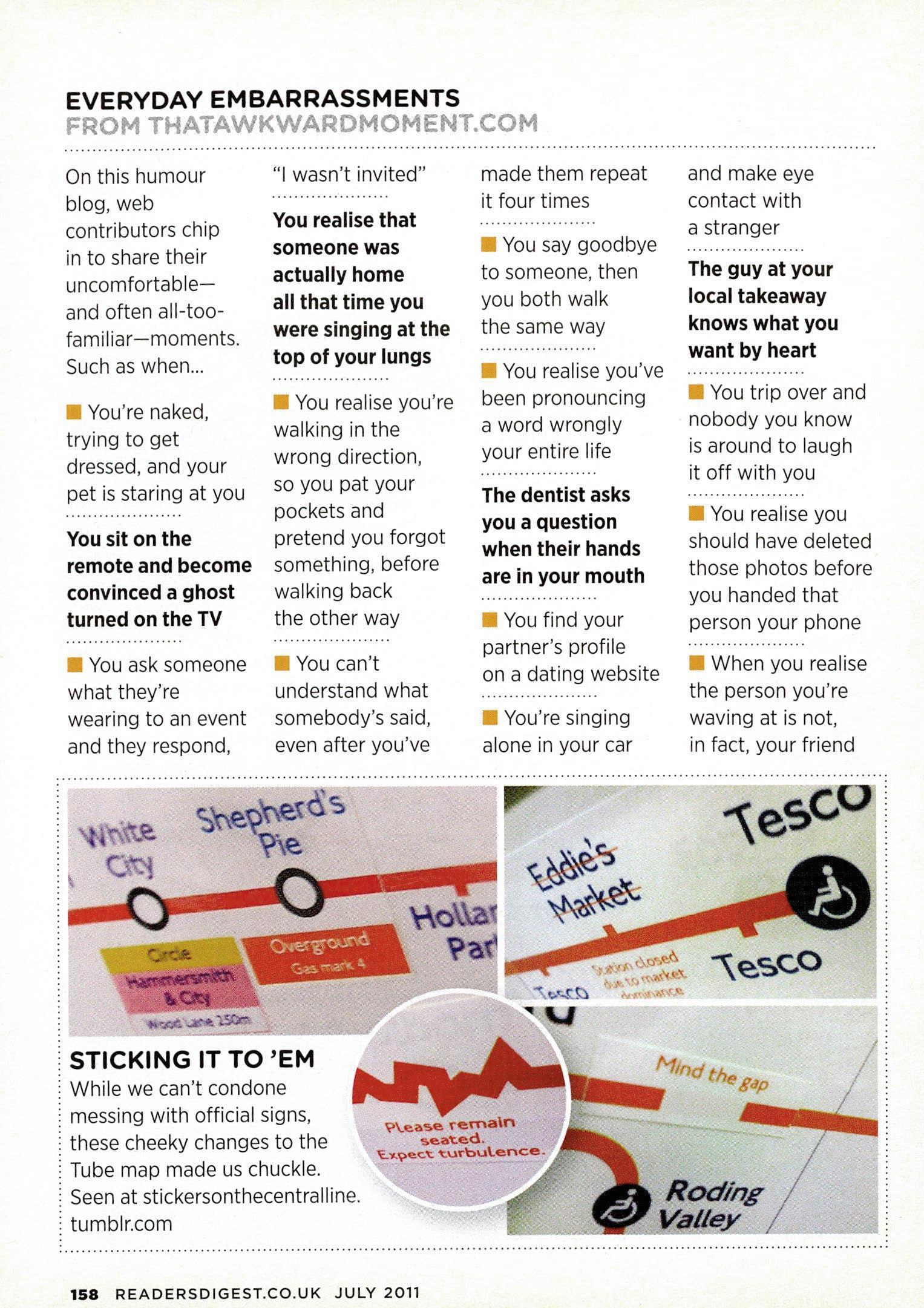
"I wasn't invited"
You realise that someone was actually home all that time you were singing at the top of your lungs
• You realise you're walking in the wrong direction, so you pat your pockets and pretend you forgot something, before walking back the other way
• You can't understand what somebody's said, even after you've
et
STICKING IT TO 'EM
While we can't condone messing with official signs, these cheeky changes to the Tube map made us chuckle. Seen at stickersonthecentralline. turnblr.com
made them repeat it four times
II You say goodbye to someone, then you both walk the same way
• You realise you've been pronouncing a word wrongly your entire life
The dentist asks you a question when their hands are in your mouth
• You find your partner's profile on a dating website
• You're singing alone in your car
and make eye contact with a stranger
The guy at your local takeaway knows what you want by heart
• You trip over and nobody you know is around to laugh it off with you
• You realise you should have deleted those photos before you handed that person your phone
• When you realise the person you're waving at is not, in fact, your friend
q0'S N.kolW Mar e\* ?at' ds VF Why
\-\ " 0?\e. "N
V,Mr ?lease remain seated. t_r.bert. turbulence. Boding Vor Valley
158 READERSDIGEST.CO.UK JULY 2011
1 Q: Why should you divide sin by tan?
A: Just cos. Seen on the Internet
1 Q: What do you call a lion wearing a stylish hat?
A: A dandy lion. Byron Callaway, Newport
CI: What's the Mexican president's favourite book?
A: Tequila Mockingbird.
David Drummond, from our Facebook fan page
1 Don't say I'm not hip. I'm very hip—in fact, I had a new one put in, and it's made me even hipper.
John Cleese, by Twitter
FOR EVERY
READER'S JOKE
WE PUBLISH, WIN EITHER £70 OR OUR SPECIAL GOODY BAG WORTH UP TO £150. SEE readersdigest. co.uk/magazine FOR DETAILS
60-Second Stand-Up
Ladies and gentlemen, please welcome David Walliams
WHAT'S YOUR FAVOURITE JOKE?
One episode of [the 1950s radio comedy] Hancock's Half Hour is a pastiche of the movie 12 Angry Men. There's a line where Tony Hancock says to other jurors, "Does the name 'Magna Carta' mean nothing to you? Did she die in vain?"
WHICH OF YOUR COMEDY CREATIONS IS YOUR FAVOURITE?
We [Walliams and comedy partner Matt Lucas] absolutely love Vicky Pollard—she's a winner, she's funny, and we hope viewers like spending time with her.
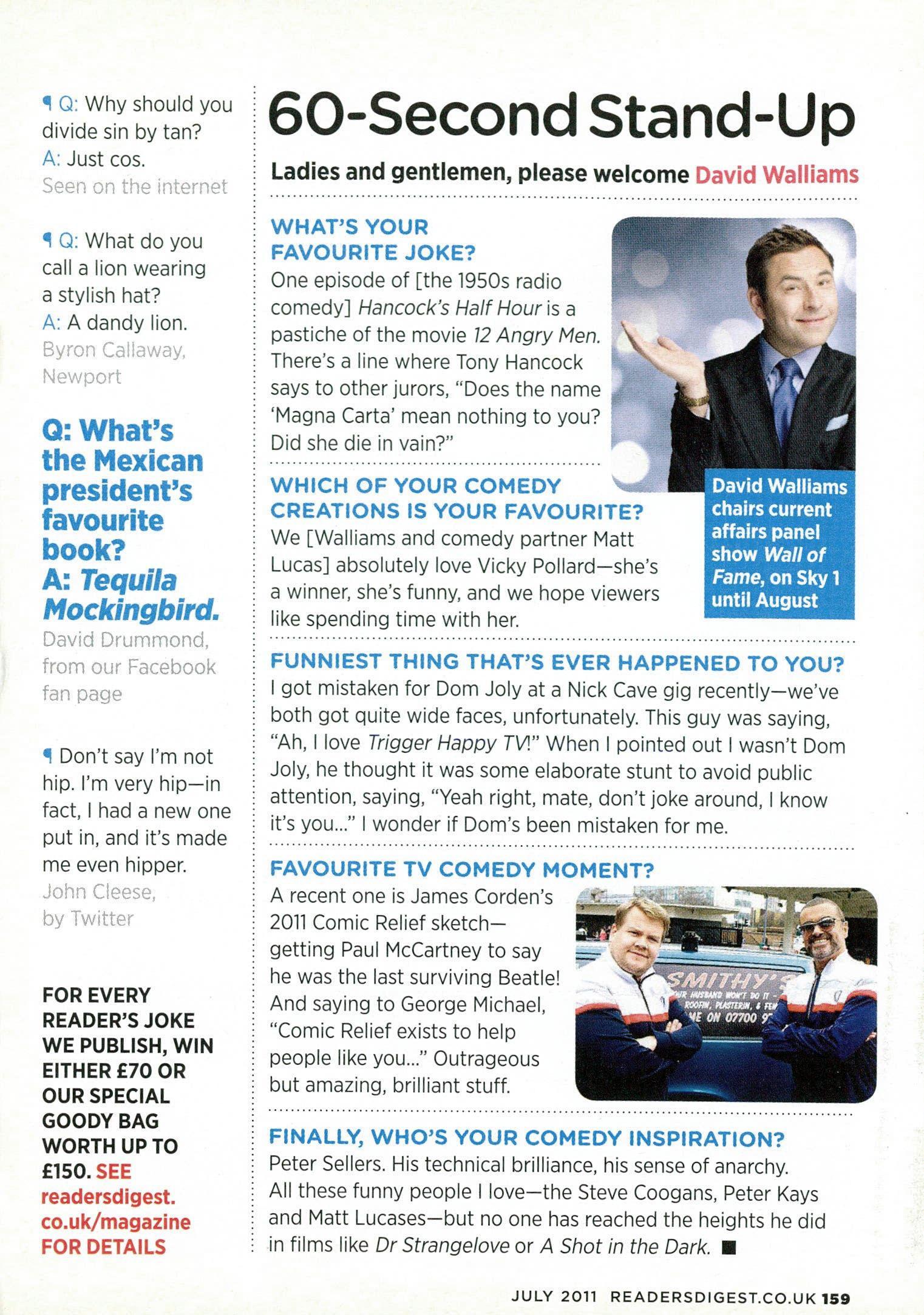
affairs panel
Wall of Fame, on Sky 1 until August
FUNNIEST THING THAT'S EVER HAPPENED TO YOU?
I got mistaken for Dom Joly at a Nick Cave gig recently—we've both got quite wide faces, unfortunately. This guy was saying, "Ah, I love Trigger Happy TV!" When I pointed out I wasn't Dom Joly, he thought it was some elaborate stunt to avoid public attention, saying, "Yeah right, mate, don't joke around, I know it's you..." I wonder if Dom's been mistaken for me.
FAVOURITE TV COMEDY MOMENT?
A recent one is James Corden's 2011 Comic Relief sketch— getting Paul McCartney to say he was the last surviving Beatle! And saying to George Michael, "Comic Relief exists to help people like you..." Outrageous but amazing, brilliant stuff.
FINALLY, WHO'S YOUR COMEDY INSPIRATION?
Peter Sellers. His technical brilliance, his sense of anarchy. All these funny people I love—the Steve Coogans, Peter Kays and Matt Lucases—but no one has reached the heights he did in films like Dr Strangelove or A Shot in the Dark •
M/THY' 110.7 .0ROOM. ?WM., I no YE ON *7700
JULY 2011 READERSDIGEST.CO.UK 159
David Walliams chairs current
show
Beat the Cartoonist!
WIN £100 AND A SIGNED ILLUSTRATION MAY'S

Think of a witty caption for this picture and you could beat the experts at their own game. The three best suggestions will be posted on our website in mid-July alongside an anonymous caption from our professional cartoonist. Visitors can choose their favourite—and if your entry gets the most votes, you'll receive £100 and the original, signed drawing. Submit to captions@ readersdigest.co.uk or the address on page 6 by July 10. Enter and vote online at readersdigest.co.uk/caption. We'll announce the winner in our September issue.
There was strong competition from all quarters this month, but cartoonist Len Hawkins' caption "You two take advantage of him. You know that, don't you?" eventually emerged as the voters' choice by a whisker (pun intended).
SCOREBOARD READERS IS CARTOONISTS 10
ou wait ages for a Royal Wedding, and then.... Meet England rugby star Mike Tindall—and the Royal Family's latest recruit - The Best of British...beaches Music—on prescription!
MAGES FOR AVIV (.9
/ 4__ JO
WINNER
160 READERSDIGEST.CO.UK JULY 2011

C--11STIirriTIC Relaxation mss
Feel it to believe it...
Containing our unique, built in, class 2a medically certified Cyclo-Massage® system, Adjustamatic Beds and Chairs help to ease away aches and pains, and reduce daily stresses.
Experience Total
Our products have been manufactured in North Wales for over 50 years. During that time, thousands of customers have benefited from our expertise, craftsmanship and renowned customer service
Enjoy soothing comfort from a range of medical conditions and enjoy a great night's sleep, all at the touch of a button
Our range of beds & chairs can offer relief from:
• RESPIRATORY PROBLEMS
• ARTHRITIC & RHEUMATIC PAIN
• STRESS & TENSION
'After
• POOR CIRCULATION
• LACK OF MOBILITY
• BACK PAIN
—
weeks using the bed, it has relieved the pain in my back and hips and reduced the swelling in my ankles. I now consider it the best investment I have ever made." T B, Leicestershire For more details and a FREE brochure call: 0800 037 0660 or visit our website: Quoting EXT:Bl 310 www.adjustablebeds.com
several

AGE RE-PERFECT Pro-Calcium Because you're worth it. Your experience. Our skincare expertise. AGE RE-PERFECT Pro-Calcium + SPF15 Trust science for skin that feels toned, smoother, more resilient.
Jane Fonda


















































































 Fresh haddock from St)Ves
Peter Lawrence of Lizard Leaf inspects his crop
Mandy Pearce delivers meals that have patients asking for the recipe
Locally grown organic bull's blood leaves
Fresh haddock from St)Ves
Peter Lawrence of Lizard Leaf inspects his crop
Mandy Pearce delivers meals that have patients asking for the recipe
Locally grown organic bull's blood leaves





 BY LOLA BORG
BY LOLA BORG






































































 BY ALUN COCHRANE
BY ALUN COCHRANE




